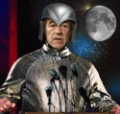|
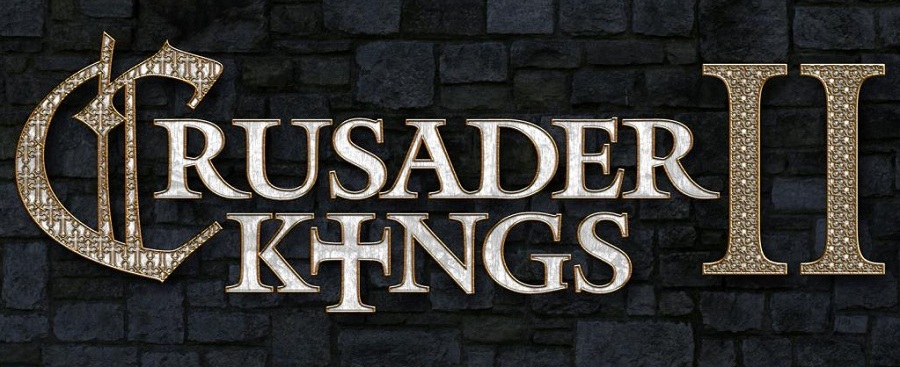 Hello and welcome to another Paradox Grand Strategy Let's Play! What is this? Crusader Kings 2 is a grand strategy game developed and published by Paradox interactive. It lets you pick basically anyone that owned a chunk of land with an army attached to it in Europe, North Africa, Middle East, the Steppes or India from 769 to 1454, and play as them. You scheme against other nobles, fight wars over religion/blood/money/someone loving your wife, build up your holdings, and watch everything go up in flames about once a century. We will be playing with all the DLC If this LP gets enough traction, we will export the game into Europa Universalis 4, and then Victoria 2, which cover later time periods (1454-1836 and 1836-1936), but that's quite far away. Didn't I see these kinds of LPs before? You probably have! There have been several really good ones, including Wiz's Azerbaijan LP, Thanqol's Denmark LP, Grey Hunter's Ghana LP and ZearothK's Hansa LP. These are all very good, and I highly recommend reading through them. So how will this any different? We're going to take a slightly different approach to this. As I've mentioned, I tend to run into massive problems of some sort about once every century, whether it be huge civil wars, a massive crusade against your holdings, or the Mongols existing. So I think it would be fun to switch countries once every hundred years or so. It will showcase how the AI handles keeping a player-created empire together (usually either really well or really poorly), and give us a look at the different mechanics that the game has to offer. Every new country you goons will pick will have its own century-long goal that I will try to achieve. I would prefer to avoid massive empires like the Byzantines, Abbasids or anything the Karlings have ever touched, because I don't find endless blobbing to be all that fun. So, I'm going to veto any of those options, unless someone comes up with an interesting take on it, like Charlemagne converting to Catharism, or creating a Mongol Egypt. In addition to the century swap, I'm going to add a little history lesson on the region with every update, since hopefully we're going to be playing mostly smaller nations scattered throughout. This will either cover the time period we're dealing with, history of religion in the area, or just an interesting tidbit from nearby. On top of that, since this is going to be a mostly narrative-driven LP, I'm going to recommend a film to go along with every update. The film will be either thematically appropriate, take place in the region, or just be something I've seen recently that I just think works well in tandem with the update. I will try to vary the films by country, so it won't just be American/British cinema. Hope you like subtitles! So what are we starting with? 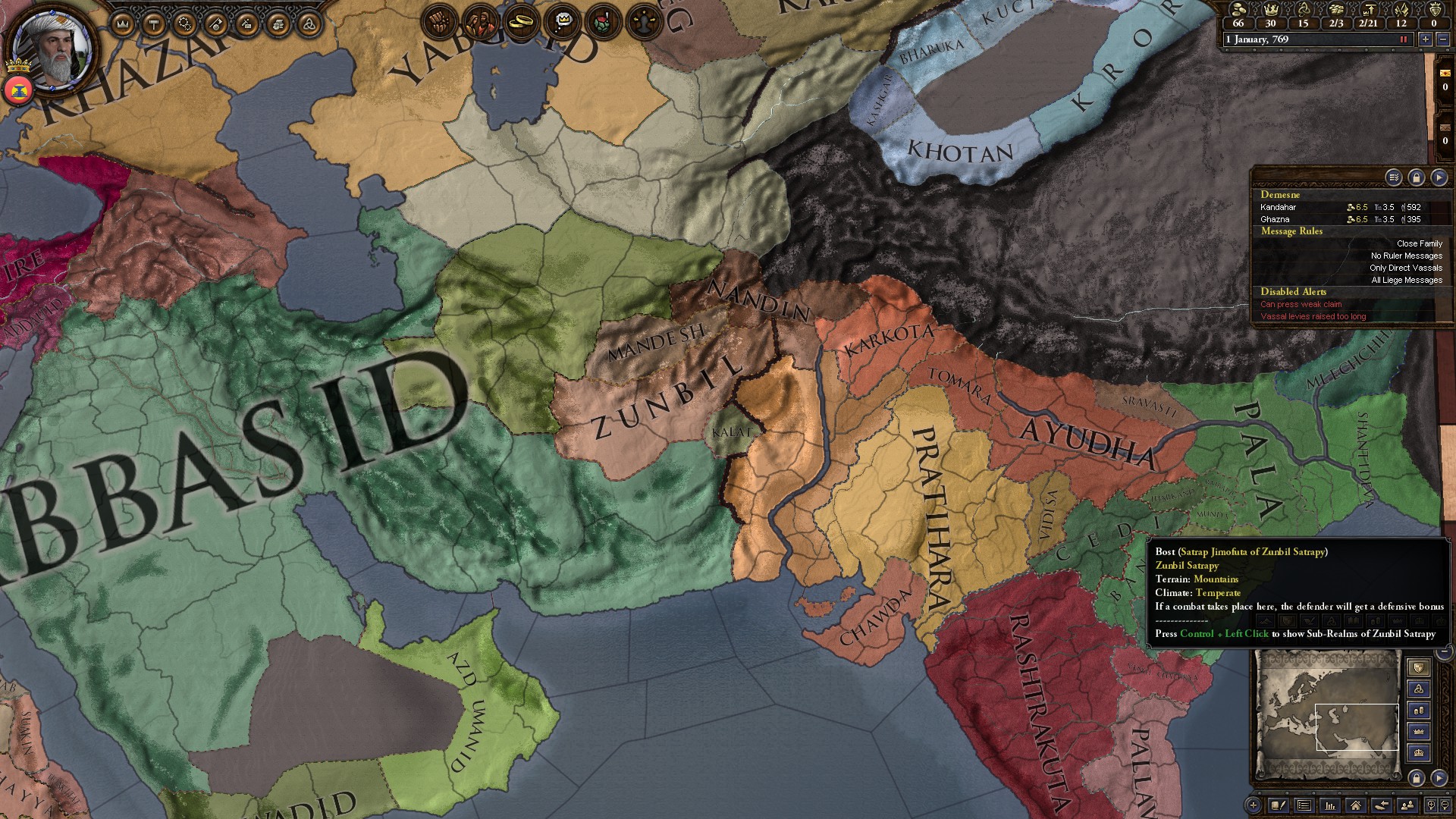 We will start with the Zunbil Satrapy, a duchy with a unique religion that's not quite your usual pagan. Our immediate goal will be to form the kingdom of Afghanistan and try to reform the faith. This will generally mean a lot of war against a lot of neighbours. We're in a decent position to expand north and east, as long as we keep praying that the Abbasids look literally anywhere else. Our biggest problem, besides inbreeding and pagan limits on inheritance laws, is the fact that two of our holy sites (of the five we need to reform) are Baghdad and Cairo. Which means wars with the entire Sunni Muslim world. We'll manage, or crash and burn spectacularly! Updates  The First Century - Praise the Sun! (769-869) The First Century - Praise the Sun! (769-869)  *Game Update 1 - Fathers and Sons ----History Update 1 - What the hell is Zunism? ----Film Update 1 - Don't Trust Your Children *Game Update 2 - The Brothers' Wars ----History Update 2 - The Zunbil Sunset ----Film Update 2 - The Family Business *Game Update 3 - Crossing the Indus ----History Update 3 - A Cavalcade of Rulers ----Film Update 3 - The Third Temple *Game Update 4 - The Boy Kings of Afghanistan ----History Update 4 - And then the Mongols Showed Up ----Film Update 4 - What is Jerusalem Worth? *Game Update 5 - Sunrise, Sunset ----History Update 5 - The Road to a Nation State ----Film Update 5 - Faith and Trust *State of the World in 869  The Second Century - Les Bons Hommes (869-969) The Second Century - Les Bons Hommes (869-969)  *Game Update 6 - You Can't Say No to Family ----History Update 6 - Crusades and Inquisitions ----Film Update 6 - Forever is a Long Time *Game Update 7 - Vive La France! ----History Update 7 - Looking for Raid ----Film Update 7 - Marriage is a Sham *Game Update 8 - Uneasy Lies the Head that Wears the Crown ----History Update 8 - House of Normandy ----Film Update 8 - Roadtrip in a Coach *Game Update 9 - The French Crusade ----History Update 9 - Relics and Pilgrimages ----Film Update 9 - Saints and Sinners *Game Update 10 - Nothing Beside Remains ----History Update 10 - Anarchy in the UK ----Film Update 10 - Pleasure and Love *Game Update 11 - The Wolves Grow Hungry ----History Update 11 - The Angevins ----Film Update 11 - God's Right Hand *Game Update 12 - Vivat Imperatrix in Aeternum ----History Update 12 - gently caress England ----Film Update 12 - French New Wave *State of the World in 969  The Third Century - The Spice Raiders (969-1069) The Third Century - The Spice Raiders (969-1069)  *Game Update 13 - The Pirate Lords ----History Update 13 - Eastern Christians ----Film Update 13 - Flynnin' It *Game Update 14 - Going Legit ----History Update 14 - From Greece to India ----Film Update 14 - A Bad Intro to Soviet Film *Game Update 15 - The Eastern Nests ----History Update 15 - To the Shores of Tripoli ----Film Update 15 - Adaptation *Game Update 16 - The Whispers of the Nester Gods ----History Update 16 - Running Down to Cuba ----Film Update 16 - Cousteau and his Cronies *Game Update 17 - Nasr's Mirror ----History Update 17 - I'm the Captain Now ----Film Update 17 - Challenge God *Game Update 18 - The Messenger ----History Update 18 - The Real Pirate Lords of Socotra ----Film Update 18 - Holy War *State of the World in 1069  The Fourth Century - The Endless Steppe (1069-1169) The Fourth Century - The Endless Steppe (1069-1169)  *Game Update 19 - Atop the Ashes ----History Update 19 - The Greatest and Oldest ----Film Update 19 - Happy New Year! *Game Update 20 - The Kundur ----Film Update 20 - Your Highness, Lady Fortune *Game Update 21 - Devoted Husband ----Film Update 21 - Tears for Fears *Game Update 22 - Children of the Horseman God ----Film Update 22 - lovely Parenting *Game Update 23 - Kubrat Returns ----Film Update 23 - The Price of Polite Society *Game Update 24 - Chasing Ghosts ----Film Update 24 - I Love My Fake Son *Game Update 25 - Khan of Khans ----Film Update 25 - Recidivism *State of the World in 1169  The Fifth Century - Ragnarok (1169-1254) The Fifth Century - Ragnarok (1169-1254) *Game Update 26 - The Calm Before the Storm ----Film Update 26 - Trolling Your Audience *Game Update 27 - It's the End of the World as We Know It ----Film Update 27 - gently caress This Gay Earth *Game Update 28 - The Wellspring ----Film Update 28 - Danse Macabre *State of the World in 1254  The Sixth Century - Prester Jane (1254-1354) The Sixth Century - Prester Jane (1254-1354) *Game Update 29 - The Kind Old Lady ---- *Game Update 30 - Serial Monogamy ---- *Game Update 31 - Spreading the Word ---- *Game Update 32 - Death Throes ---- *State of the World in 1354  The Seventh Century - The Partisans The Seventh Century - The Partisans *Game Update 33 - The Northerner Lords ---- *Game Update 34 - The Other Side ---- *Game Update 35 - The Peasant Wars ---- *Game Update 36 - Interference Kayten fucked around with this message at 07:56 on Apr 15, 2017 |
|
|
|

|
| # ? Apr 25, 2024 19:54 |
|
Talking poo poo About History We've got a podcast! To make my life easier, we've switched up from history updates to a history podcast. Russia: Episode 1 - Slavic Paganism Episode 2 - Rurik and Friends Kayten fucked around with this message at 08:40 on Mar 24, 2016 |
|
|
|
Update 1 - Fathers and Sons The desert winds blow across a small group of pilgrims. The sun is slowly setting on the horizon. The men have been walking for hours, and they grow weary. The oldest man stops, and raises his hand. The rest breathe a sigh of relief and set up camp. They set up a small fire and some tents. The oldest man stares into the sunset, the only time the sun lets us see it all of its glory without hurting us for it. Once it finally sets, the fire is started, and the group sits in a circle, enjoying their meager rations. They eat in silence, just glad that the journey is over for a day. The youngest finishes his meal first, and looks at the old Afghan.  : Tell us a story, old man. Tell us of the land you come from. : Tell us a story, old man. Tell us of the land you come from.He looks at the old man with reverence in his voice. If you look at the Afghan, you see a strong, brave man of no more than fifty. His beard is neatly trimmed, his wrinkles playful. But his eyes, his eyes betray his age. The Afghan is older than anyone the youngest man has ever met, and will ever meet The old man smiles. He likes the attention and respect the others show him. But not too much, for pride is the purview of the Darkness.  : My land is far, young one. It is a harsh land of mountains and deserts, and it makes harsh men. : My land is far, young one. It is a harsh land of mountains and deserts, and it makes harsh men. : You must go through the Muslim lands, and search for the sun until you can no longer hear people speak the name of the Prophet. You go further still, and you will see the land of men that praise the Sun. It had many names throughout the ages: Zabulistan, Kabulistan, Afghanistan. : You must go through the Muslim lands, and search for the sun until you can no longer hear people speak the name of the Prophet. You go further still, and you will see the land of men that praise the Sun. It had many names throughout the ages: Zabulistan, Kabulistan, Afghanistan.  : Those are not our names. Our name is the name of our stewards through the Darkness, our rulers: Zunbil. : Those are not our names. Our name is the name of our stewards through the Darkness, our rulers: Zunbil. : The desert teaches us that the Justice-Giver is harsh and merciless. Such is the only way for men to keep the Darkness away. And the Zunbils had to be as harsh as the burning sun in mid-day. : The desert teaches us that the Justice-Giver is harsh and merciless. Such is the only way for men to keep the Darkness away. And the Zunbils had to be as harsh as the burning sun in mid-day. : I do not know much of the origins of my land but for the stories I've heard in my youth. Time plays tricks on you with age, and you forget the important parts, and remember the empty ones. : I do not know much of the origins of my land but for the stories I've heard in my youth. Time plays tricks on you with age, and you forget the important parts, and remember the empty ones.  : I remember stories of the Satrap Jimofuta. A good man, and a worthy ruler. A warrior of Zun. He has ruled for quite some time when I cried my first word. : I remember stories of the Satrap Jimofuta. A good man, and a worthy ruler. A warrior of Zun. He has ruled for quite some time when I cried my first word.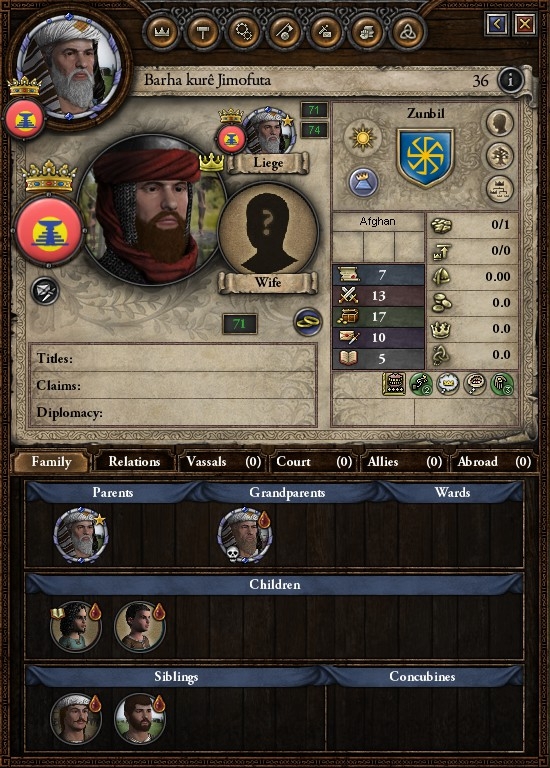  : Jimofuta had four sons. His eldest, Barha, was the greatest of them all. As noble as his father, he had great plans for Zunbil. He wished to bring it to glory. : Jimofuta had four sons. His eldest, Barha, was the greatest of them all. As noble as his father, he had great plans for Zunbil. He wished to bring it to glory.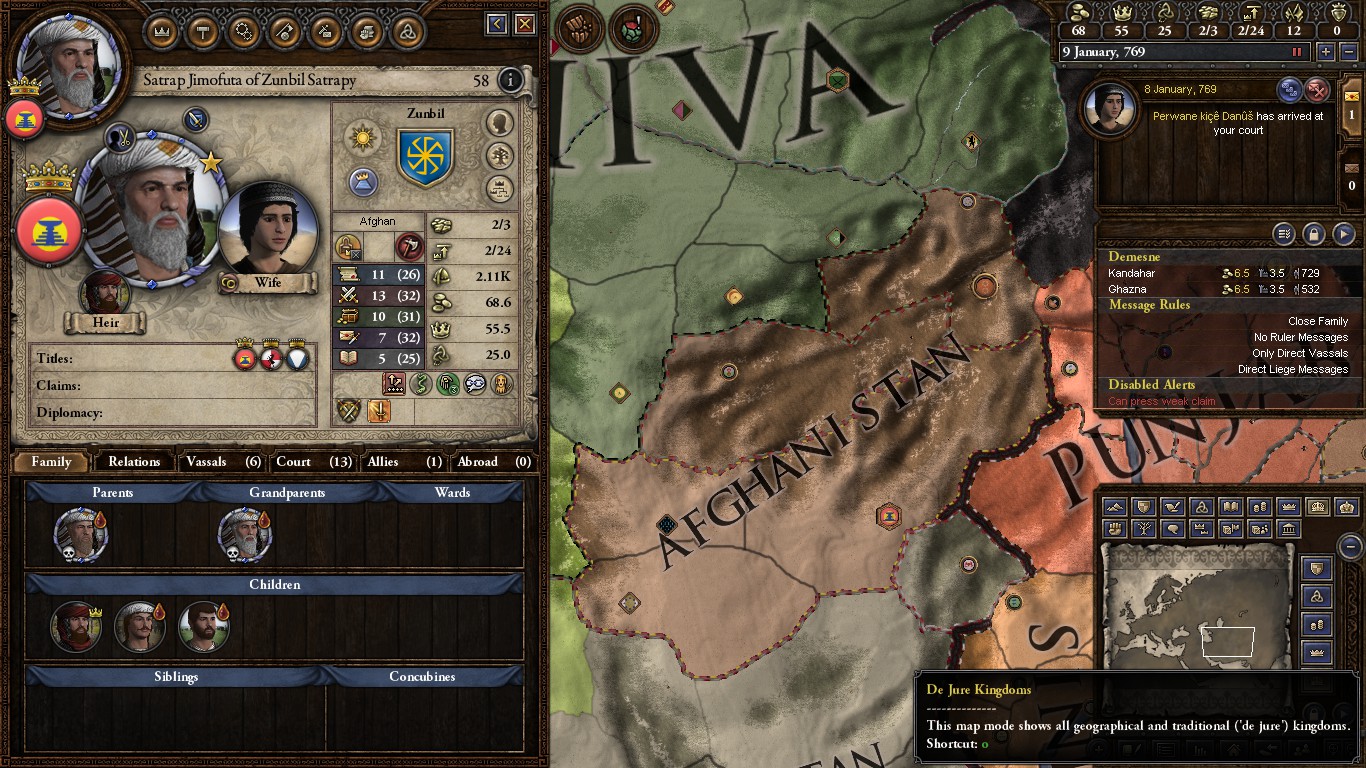  : Jimofuta was no stranger to glory. He wanted one thing: to be the king of the land of the Sun. All the Afgans would see Zun's glory and praise him. : Jimofuta was no stranger to glory. He wanted one thing: to be the king of the land of the Sun. All the Afgans would see Zun's glory and praise him.  : For he was in the midst of enemies. Heretics. Heathens. Even in his own land, there were those that praised the Indian wheel god, Buddha. : For he was in the midst of enemies. Heretics. Heathens. Even in his own land, there were those that praised the Indian wheel god, Buddha. : And so, Jimofuta did what the Sun told him. He went East, to Zun's second great temple, to take it from the wheelmen. : And so, Jimofuta did what the Sun told him. He went East, to Zun's second great temple, to take it from the wheelmen.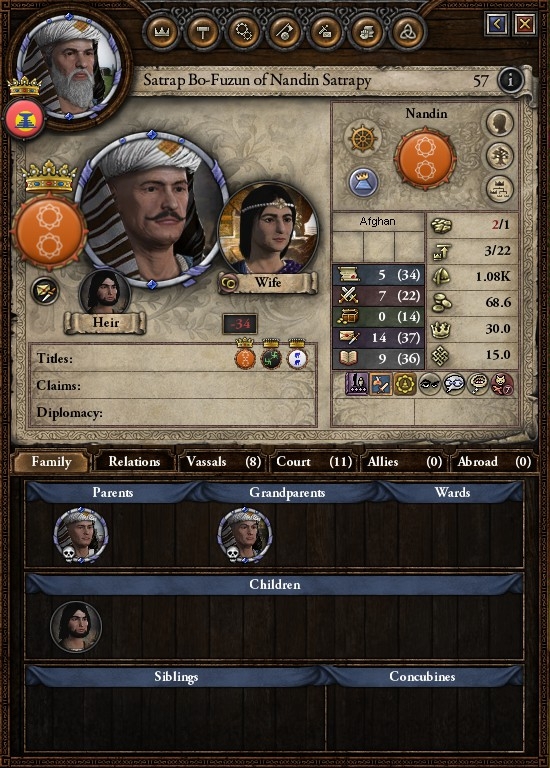  : The wheelmen to the east were ruled by a snake with honeyed words and venomed teeth. But for all their sweetness, his words could not sway enough men to his cause. And so, the armies of the Sun went to free Zun's temple in Kabul. : The wheelmen to the east were ruled by a snake with honeyed words and venomed teeth. But for all their sweetness, his words could not sway enough men to his cause. And so, the armies of the Sun went to free Zun's temple in Kabul.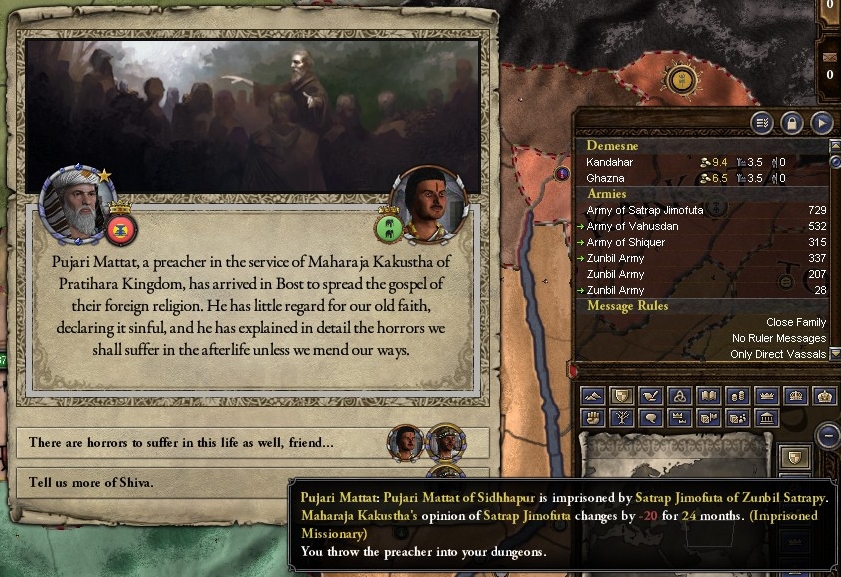  : The wheelgods were not the only gods to come from the great river to the east. Many men worshipped the many gods of the Hindus, and many tried to bring these servants of the Darkness to our lands. But all the Zunbils knew to beware these servants, from Jimofuta to all his children. None walked the lands freely. Not the Hindu priests, not the wheelgod men, and not the men of the prophet. Zunbil knew only Zun. : The wheelgods were not the only gods to come from the great river to the east. Many men worshipped the many gods of the Hindus, and many tried to bring these servants of the Darkness to our lands. But all the Zunbils knew to beware these servants, from Jimofuta to all his children. None walked the lands freely. Not the Hindu priests, not the wheelgod men, and not the men of the prophet. Zunbil knew only Zun.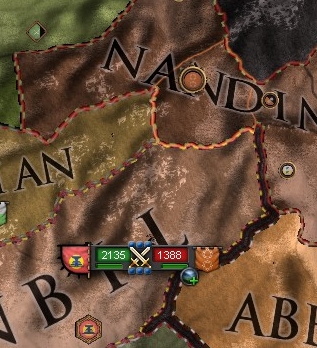  : And so, the armies of the righteous clashed with the wheelmen. The righteous had the might of Zun with them, and their Buddha was no match. : And so, the armies of the righteous clashed with the wheelmen. The righteous had the might of Zun with them, and their Buddha was no match.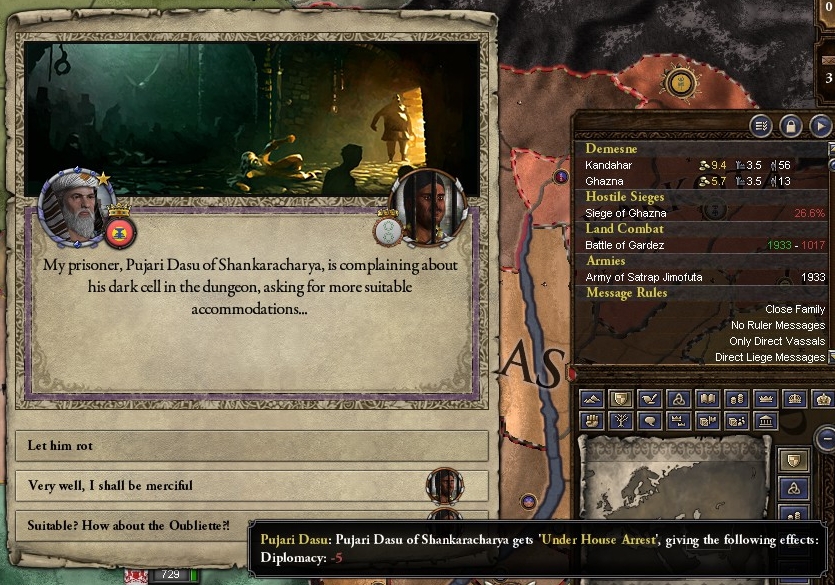  : Jimofuta did not let the foreign preachers speak, but he was a kind man. He gave them rooms at his palace, for Zun blesses those that show charity to their enemies. Old men and their words were no threat. : Jimofuta did not let the foreign preachers speak, but he was a kind man. He gave them rooms at his palace, for Zun blesses those that show charity to their enemies. Old men and their words were no threat.  : And so, the Buddhists did not hold Zun in their dungeon for a moment longer. The sun shone on the temple of Zun. The Darkness lost another battle. : And so, the Buddhists did not hold Zun in their dungeon for a moment longer. The sun shone on the temple of Zun. The Darkness lost another battle. : But how did the Buddhists hold a god in their dungeon? : But how did the Buddhists hold a god in their dungeon? : You are young, I know. You must forgive an old man for speaking in riddles and flowered words. We know little else in our sunset years. : You are young, I know. You must forgive an old man for speaking in riddles and flowered words. We know little else in our sunset years. : The Darkness is all around us. In every wrong word, in every wrong thought. What would you then call the wheelmen's idols and priests in Zun's temple? If this is not the Darkness keeping him in chains, mocking him with her very presence? : The Darkness is all around us. In every wrong word, in every wrong thought. What would you then call the wheelmen's idols and priests in Zun's temple? If this is not the Darkness keeping him in chains, mocking him with her very presence?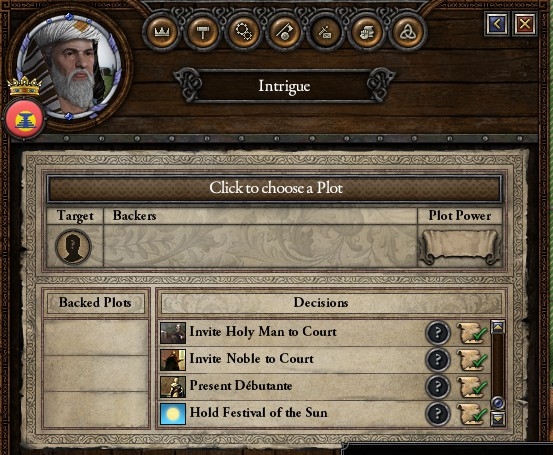  : But Zun was freed. There were other temples, other castles, but for now, Zun would let us bask in his glory. And so Jimofuta called for months of celebration of this great victory! : But Zun was freed. There were other temples, other castles, but for now, Zun would let us bask in his glory. And so Jimofuta called for months of celebration of this great victory!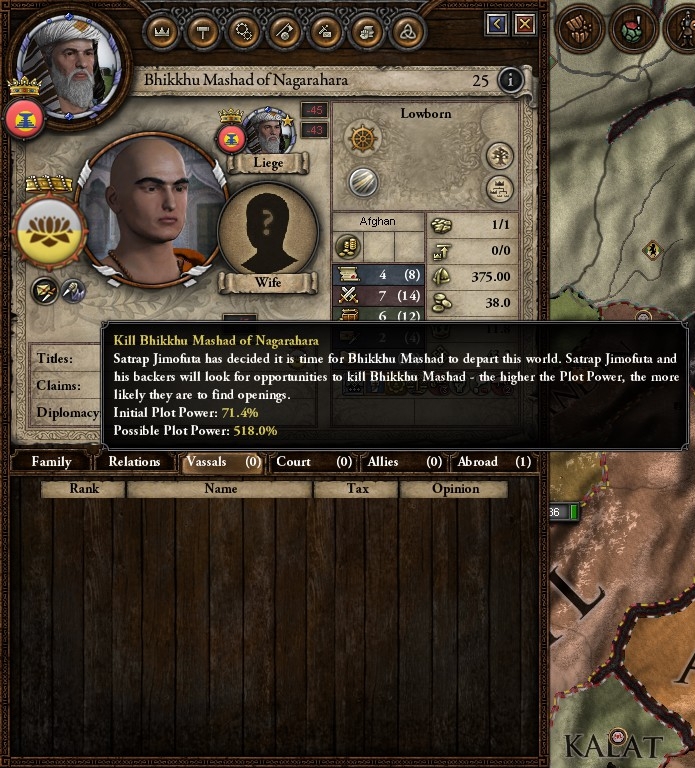  : But as I said, not all who lived in Zunbil praised the Sun. Some were treacherous snakes, just waiting for a moment to strike. And the snakes needed cleansing. : But as I said, not all who lived in Zunbil praised the Sun. Some were treacherous snakes, just waiting for a moment to strike. And the snakes needed cleansing.  : Sometimes, using the Darkness' tricks against her serves the Sun. Sometimes we must do what is necessary. : Sometimes, using the Darkness' tricks against her serves the Sun. Sometimes we must do what is necessary.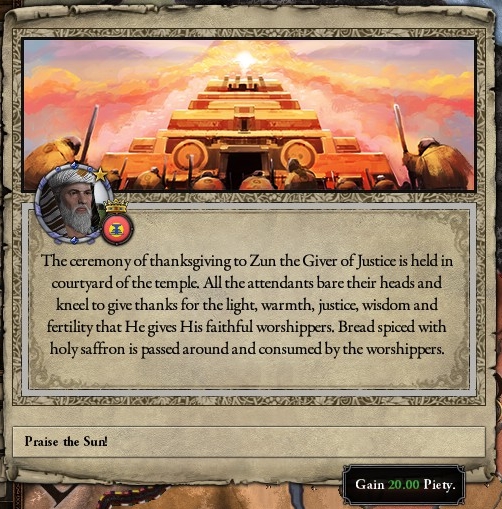  : And we all thanked the Justice-Giver, and he blessed us with his light and his flame. : And we all thanked the Justice-Giver, and he blessed us with his light and his flame.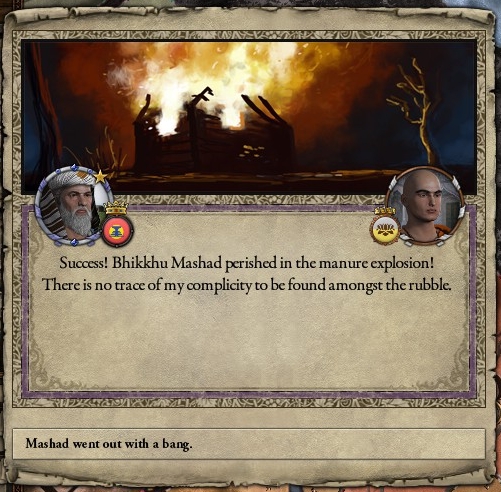  : And his flame cleansed his temple. : And his flame cleansed his temple.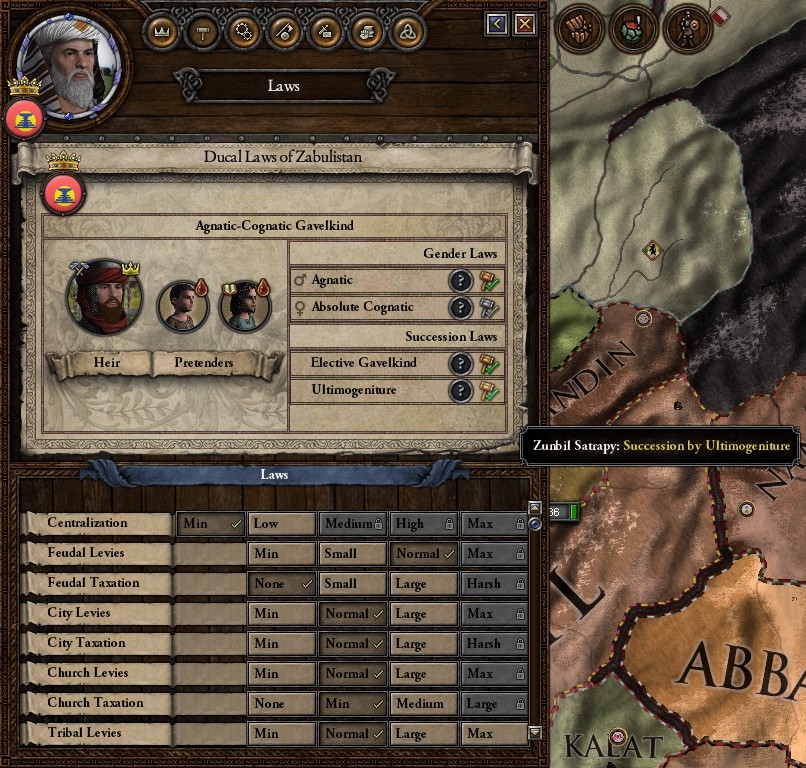  : With his temple secured, Jimofuta spoke to Zun. After days of meditation at the temple, heproclaimed that only the youngest of his sons had the blessing of Zun. He claimed that his eldest would no longer be Satrap on his death, but his youngest would. And his youngest, and so on until the Darkness swallows the land. : With his temple secured, Jimofuta spoke to Zun. After days of meditation at the temple, heproclaimed that only the youngest of his sons had the blessing of Zun. He claimed that his eldest would no longer be Satrap on his death, but his youngest would. And his youngest, and so on until the Darkness swallows the land.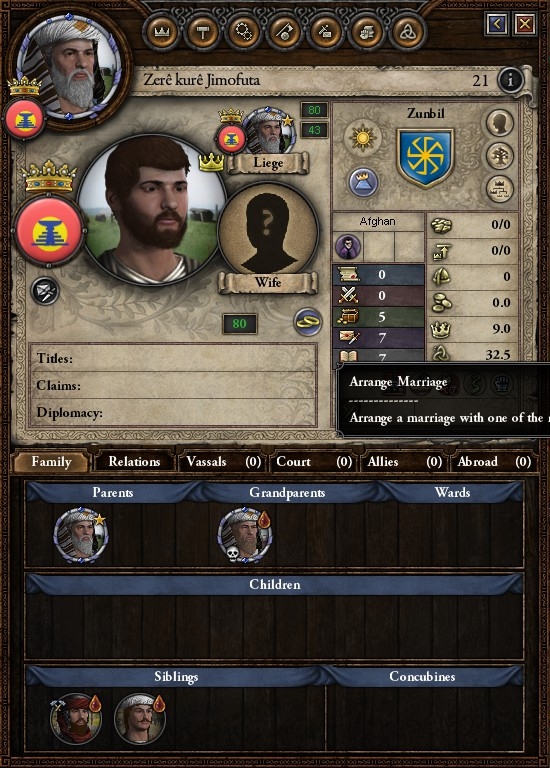  : I am not a ruler, nor am I a wise man. But I have seen Zere, his then youngest, seen what he became, and I do not understand Jimofuta. His youngest was not a good man. Why choose him? : I am not a ruler, nor am I a wise man. But I have seen Zere, his then youngest, seen what he became, and I do not understand Jimofuta. His youngest was not a good man. Why choose him?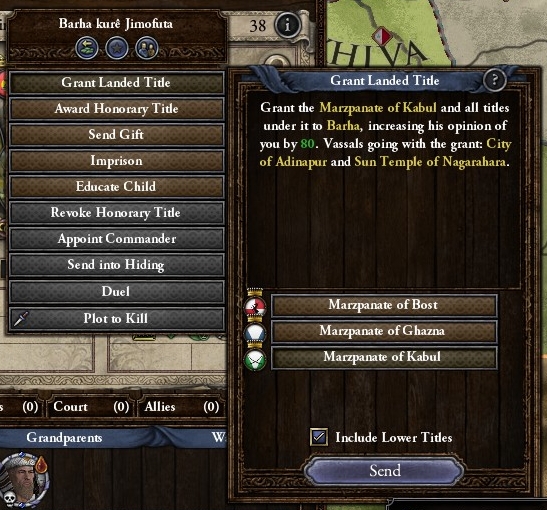  : Many others at the Sun Palace court though the same. His oldest, Bahra, had fury in his eyes. To sate his son's bloodlust, Jimofuta placed him in charge of Kabul, and of the second great temple. : Many others at the Sun Palace court though the same. His oldest, Bahra, had fury in his eyes. To sate his son's bloodlust, Jimofuta placed him in charge of Kabul, and of the second great temple. : Jimofuta next set his gaze to the north, to the lands of other Afghans. They too, worshipped the Buddha, yet had no courage in battle. : Jimofuta next set his gaze to the north, to the lands of other Afghans. They too, worshipped the Buddha, yet had no courage in battle.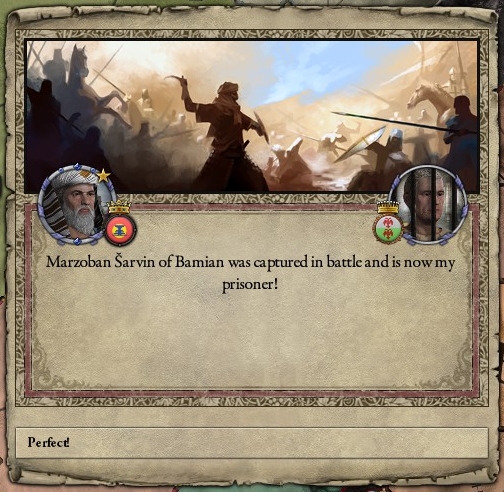  : Their leader, Sarvin, turned tail in battle and ran. Jimofuta caught him himself, and demanded his land on the spot. : Their leader, Sarvin, turned tail in battle and ran. Jimofuta caught him himself, and demanded his land on the spot.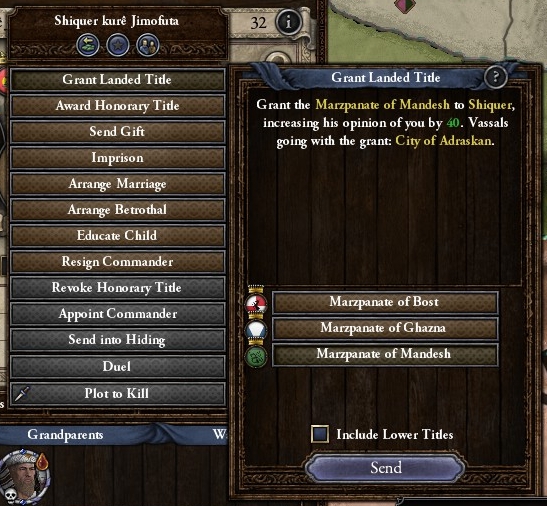  : His other sons were nervous of the new inheritance. To keep them happy, He gave the new lands to his second son, Shiquer. : His other sons were nervous of the new inheritance. To keep them happy, He gave the new lands to his second son, Shiquer.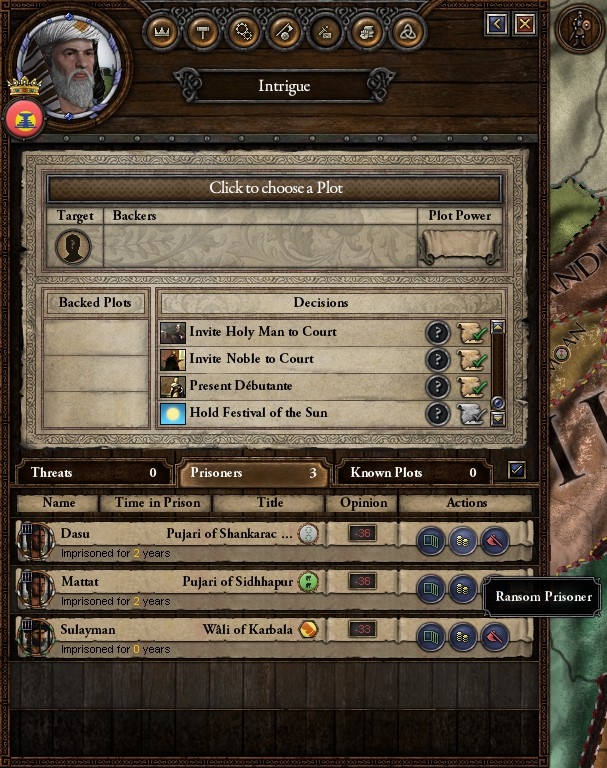  : He went to his dungeons, and freed all the foreign priests, asking for nothing but the cost of their stay from them. Zunbil grew, and all was great. : He went to his dungeons, and freed all the foreign priests, asking for nothing but the cost of their stay from them. Zunbil grew, and all was great.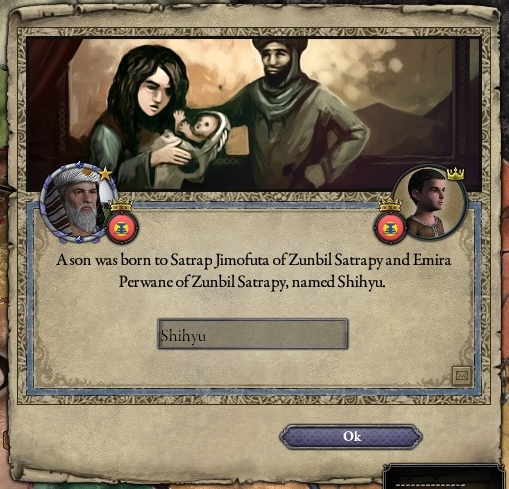  : Until the Darkness tricked Jimofuta, with the tricks of the light. She gave him a son. A son who was now his youngest, and his true heir. : Until the Darkness tricked Jimofuta, with the tricks of the light. She gave him a son. A son who was now his youngest, and his true heir.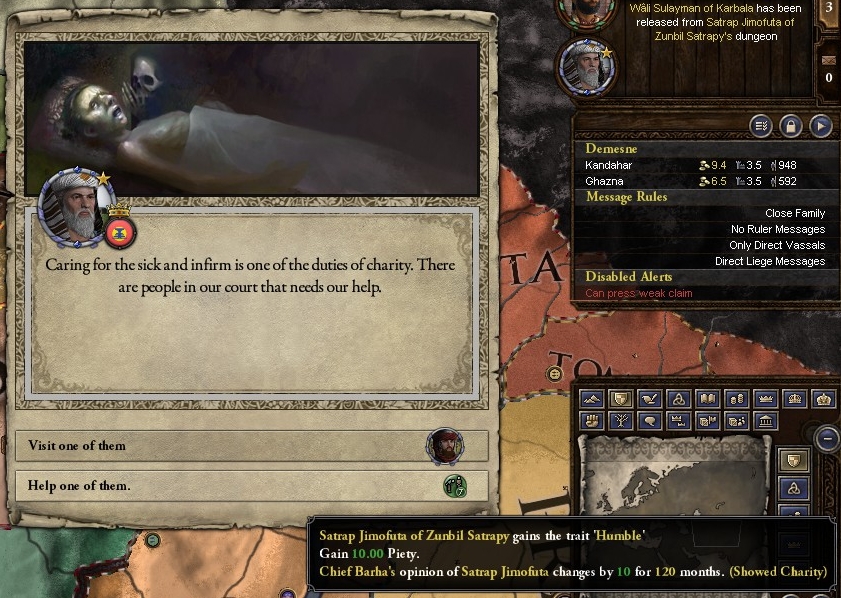  : He tried to not think of what he had done to Zun to deserve this. He knew what this would mean on his death. He threw himself in charity work, to appease the Justice Giver. : He tried to not think of what he had done to Zun to deserve this. He knew what this would mean on his death. He threw himself in charity work, to appease the Justice Giver.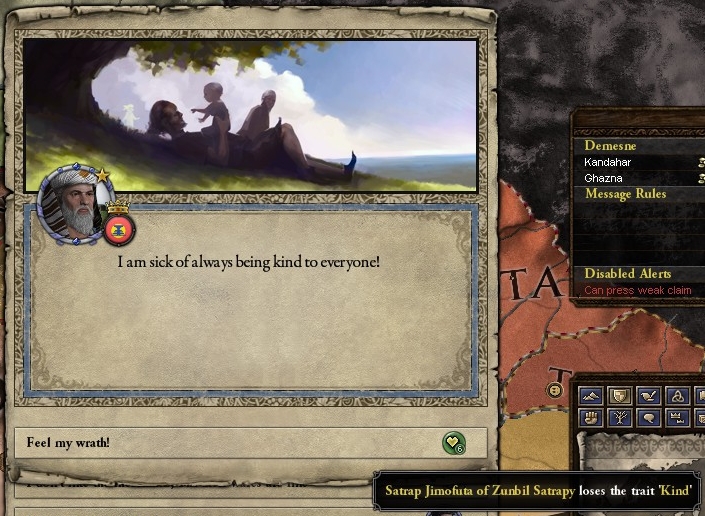  : But Zun spoke to him no more. Without his light, how could he be kind? : But Zun spoke to him no more. Without his light, how could he be kind?  : How could he be fair to his subjects? : How could he be fair to his subjects?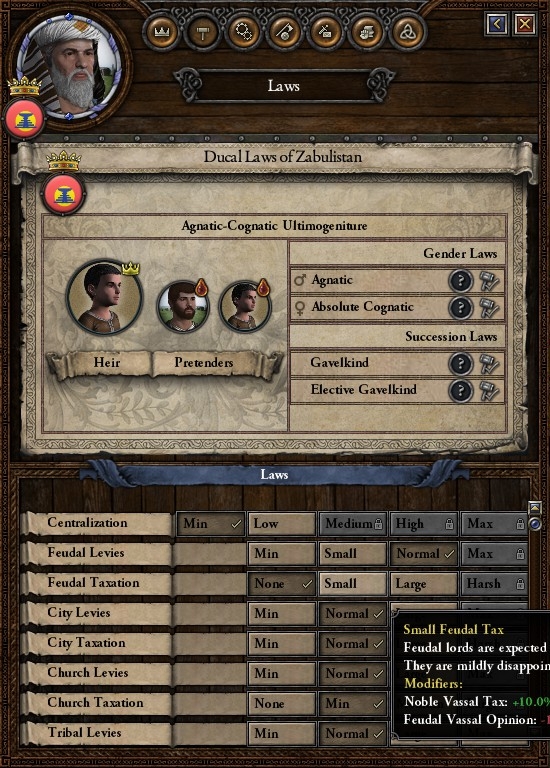  : How could he not demand more of his people, more than any Zunbil ever had? : How could he not demand more of his people, more than any Zunbil ever had? : How could he not see the grieving son of the Bamian king, and not march his men into his cities before they had buried the old man? : How could he not see the grieving son of the Bamian king, and not march his men into his cities before they had buried the old man?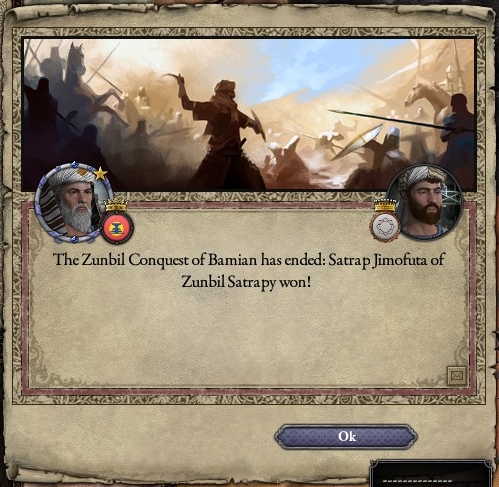  : The poor man could not even ask for his father's burial according to their customs. He was banished from the Zunbil lands. : The poor man could not even ask for his father's burial according to their customs. He was banished from the Zunbil lands.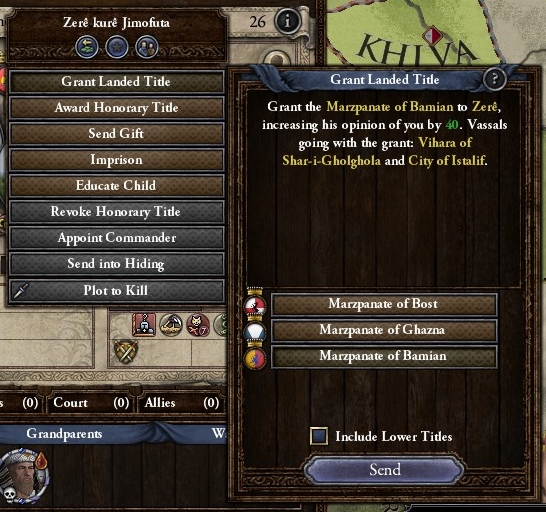  : So he gave the new realm to his heir, the cruel, harsh Zere. : So he gave the new realm to his heir, the cruel, harsh Zere.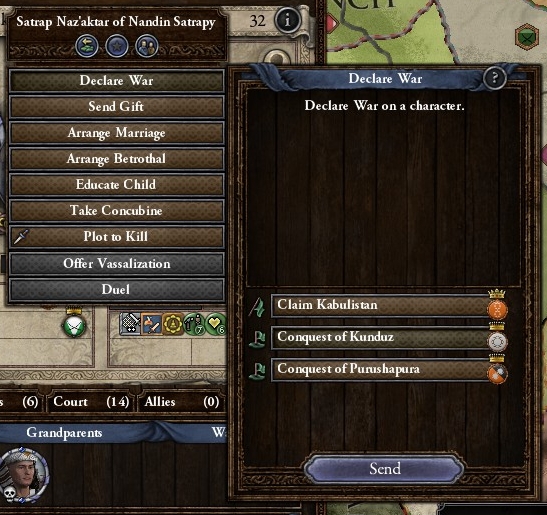  : He saw the same grief on the face of the new Nandian king, and he marched his great armies east once again. : He saw the same grief on the face of the new Nandian king, and he marched his great armies east once again.  : But the Nandin prince was not alone. He called on other worshippers of the Buddha god, and they answered his call. : But the Nandin prince was not alone. He called on other worshippers of the Buddha god, and they answered his call.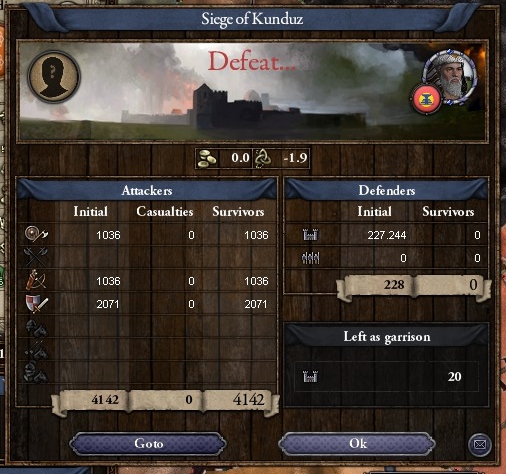  : Their fury was unparalleled. : Their fury was unparalleled. 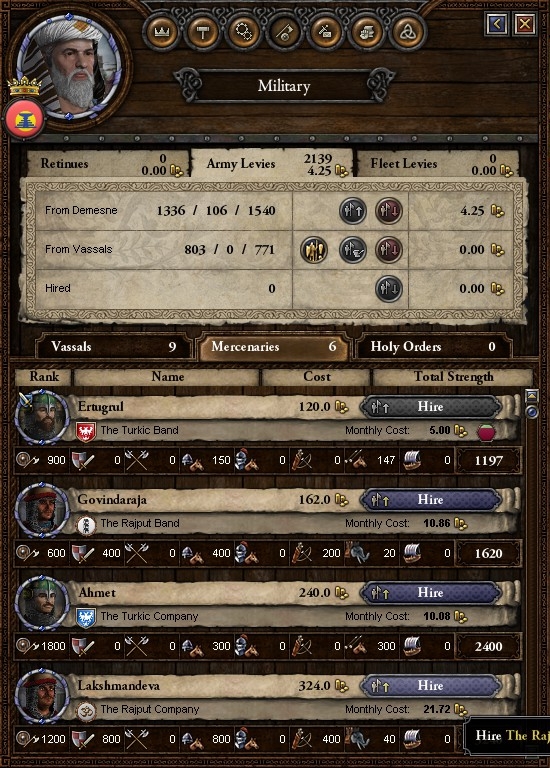  : And so, Jimofuta called on every brigand that would heed his call, and he promised them gold and rubies, saffron and silks from the Buddhist. : And so, Jimofuta called on every brigand that would heed his call, and he promised them gold and rubies, saffron and silks from the Buddhist.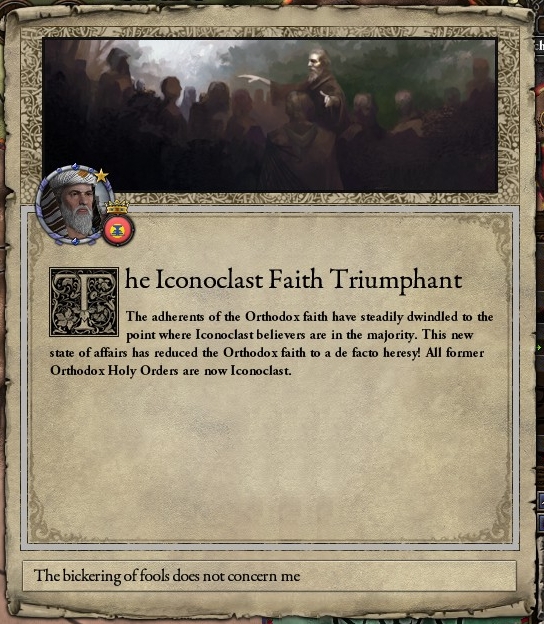  : The brigands brought with them rumours of the Greek Christians, who were no longer Christians. I do not know if they remained Greek. : The brigands brought with them rumours of the Greek Christians, who were no longer Christians. I do not know if they remained Greek.  : Zun grants his strength to all strong men, whether they know it or not. The brigands walked with the righteous, and they broke the wheel god's swords. : Zun grants his strength to all strong men, whether they know it or not. The brigands walked with the righteous, and they broke the wheel god's swords. 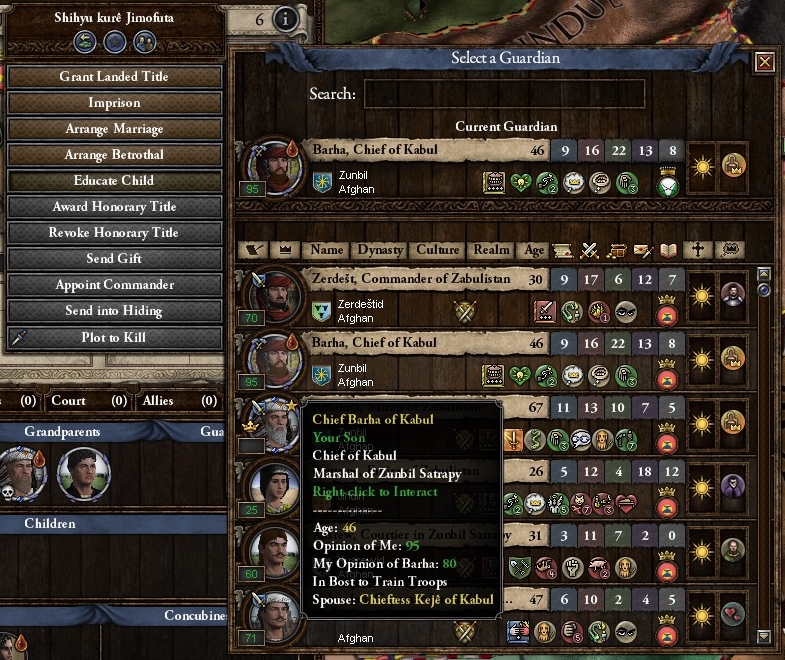  : Jimofuta called his sons together, and gave them his youngest. "Teach him as I have taught you", he said. How can you say no to your father? : Jimofuta called his sons together, and gave them his youngest. "Teach him as I have taught you", he said. How can you say no to your father?  : The brigands, having had their fill of the Nandin rubies scattered, and the righteous fought the heathens in Kabul. : The brigands, having had their fill of the Nandin rubies scattered, and the righteous fought the heathens in Kabul.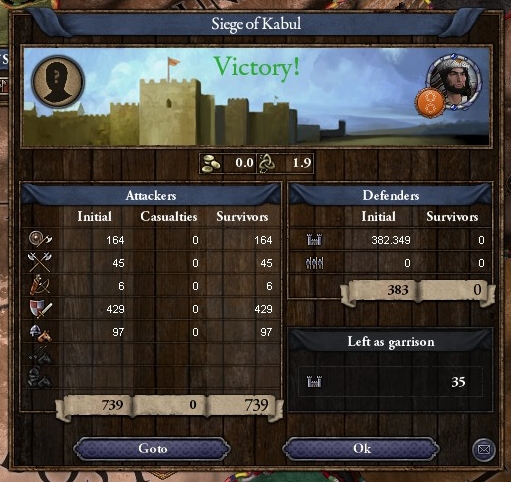  : The war went on. Kabul was free of the Buddhists yet again. : The war went on. Kabul was free of the Buddhists yet again.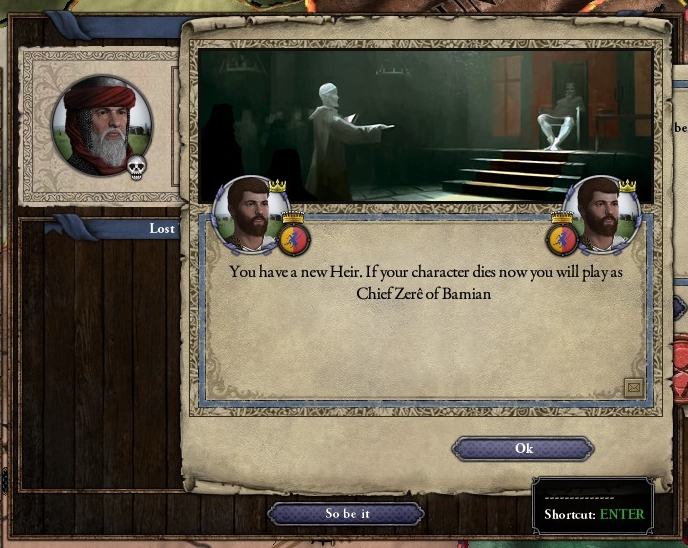  : And so, with Zun's temple free again, Jimofuta looked at the sun, and went to speak with him for all time. : And so, with Zun's temple free again, Jimofuta looked at the sun, and went to speak with him for all time.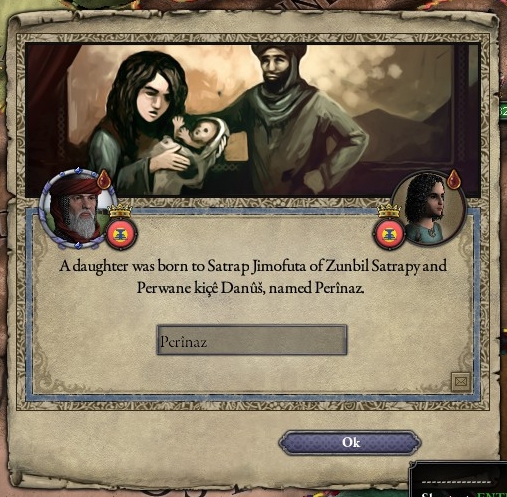  : And from the Sun's throne, he blessed his wife, and she had a daughter, to remind her of his gentle side always. : And from the Sun's throne, he blessed his wife, and she had a daughter, to remind her of his gentle side always.  : But now, the realm was in the hands of a nine-year old. A child my age. : But now, the realm was in the hands of a nine-year old. A child my age.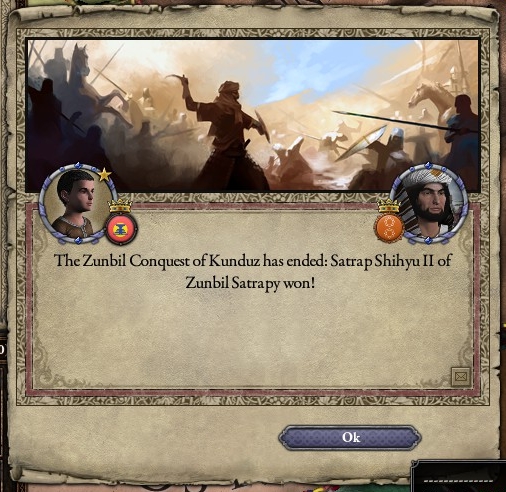  : He had his brother's guidance, of course, in matters of war. : He had his brother's guidance, of course, in matters of war.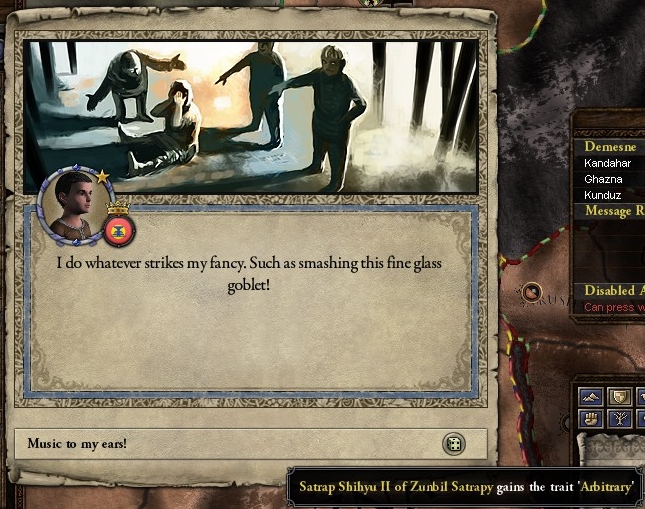  : But not in the matters of peace. These was no respect in the Great Sun Palace any more. No love in the family. : But not in the matters of peace. These was no respect in the Great Sun Palace any more. No love in the family.  : Brother against brother. : Brother against brother.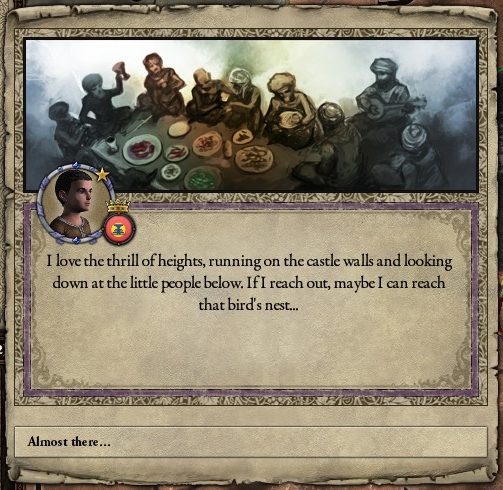  : Young against old. : Young against old.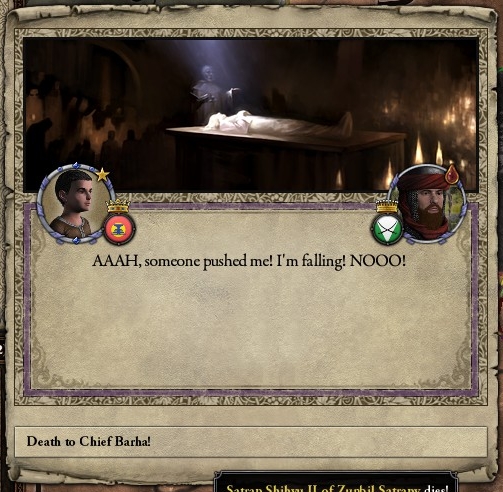  : Old against young. : Old against young.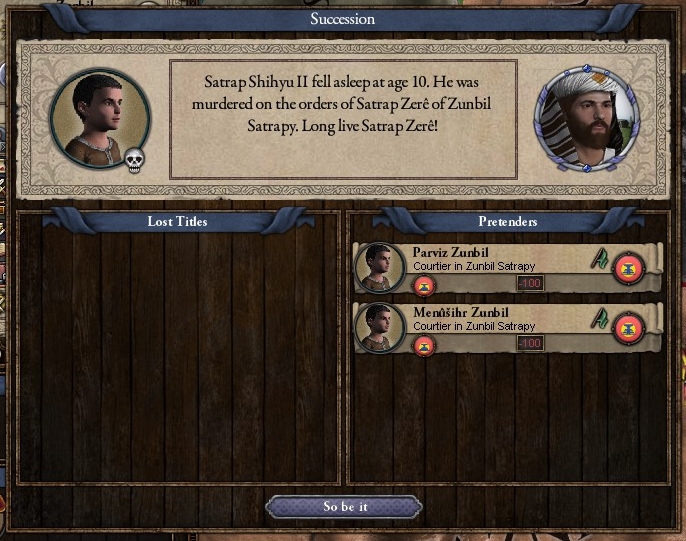  : The new laws were odd. The little Shihyu had no sons, so Zere claimed the throne as his. : The new laws were odd. The little Shihyu had no sons, so Zere claimed the throne as his.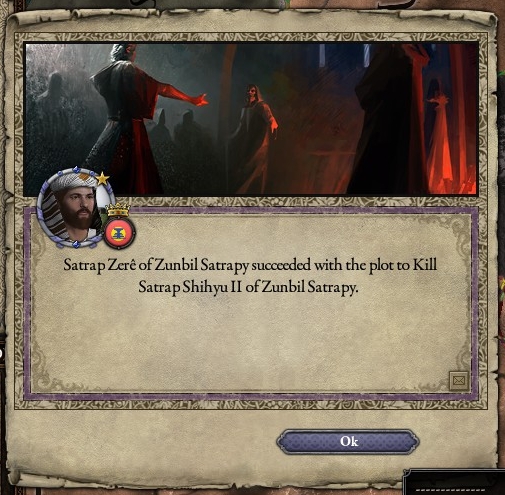  : I do not know if he chased his opportunities with ruthless determination, or built them for himself. I only know that Shihyu's death served him and no other. : I do not know if he chased his opportunities with ruthless determination, or built them for himself. I only know that Shihyu's death served him and no other.  : Zere, like his father, wished to be the king of all the Afghans. : Zere, like his father, wished to be the king of all the Afghans.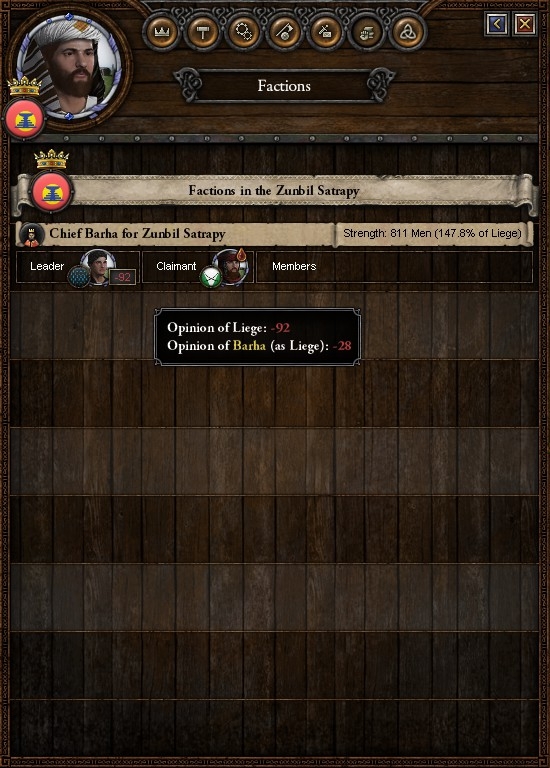  : And yet, he was not the only one. Barha, his oldest brother, had friends in court. : And yet, he was not the only one. Barha, his oldest brother, had friends in court.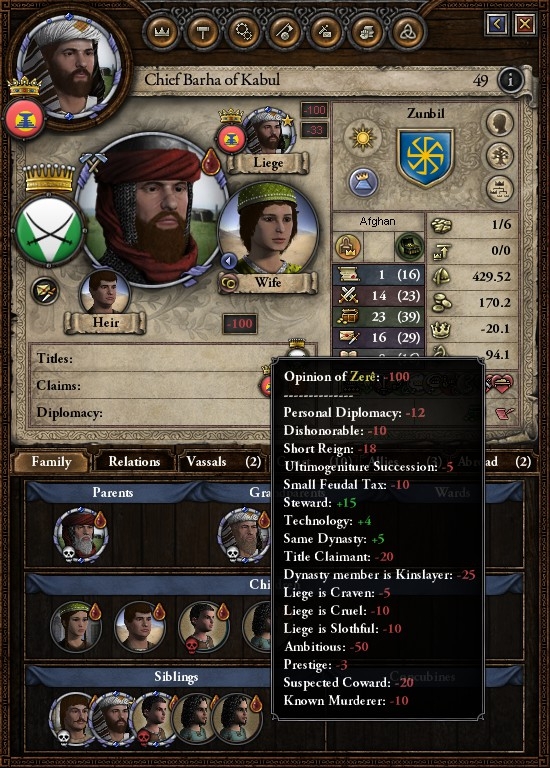  : His friends saw him as a better man. A stronger man. A braver man. : His friends saw him as a better man. A stronger man. A braver man.  : And they did not wait. They brought armed men to fix the errors of the old Jimofuta. : And they did not wait. They brought armed men to fix the errors of the old Jimofuta.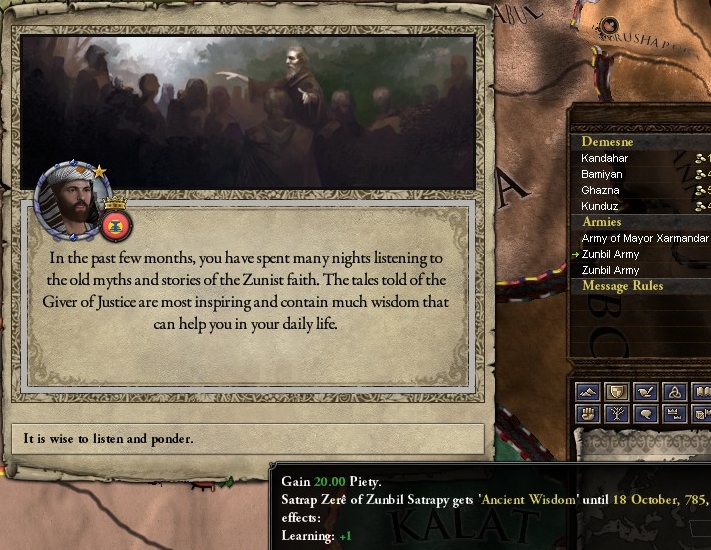  : Zere did not listen to them. He only listened to the tales of Zun. Zun would help him stay the course. : Zere did not listen to them. He only listened to the tales of Zun. Zun would help him stay the course.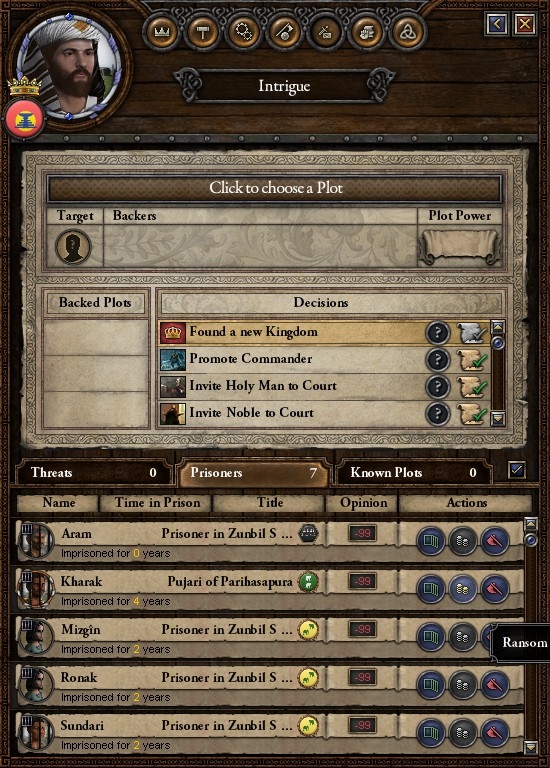  : I have not spoken to Zun myself in some time. I have not heard the warm notes in his voice. But even when I did, I did not hear the desert wisdom that Zere has heard. : I have not spoken to Zun myself in some time. I have not heard the warm notes in his voice. But even when I did, I did not hear the desert wisdom that Zere has heard.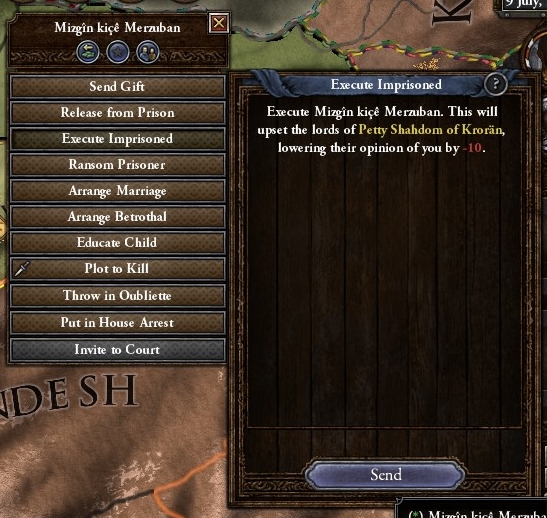  : Gold or blood. That's what Zere heard, and that's what he demanded. Men, women, children. All those that could not pay were sacrificed to Zun. : Gold or blood. That's what Zere heard, and that's what he demanded. Men, women, children. All those that could not pay were sacrificed to Zun.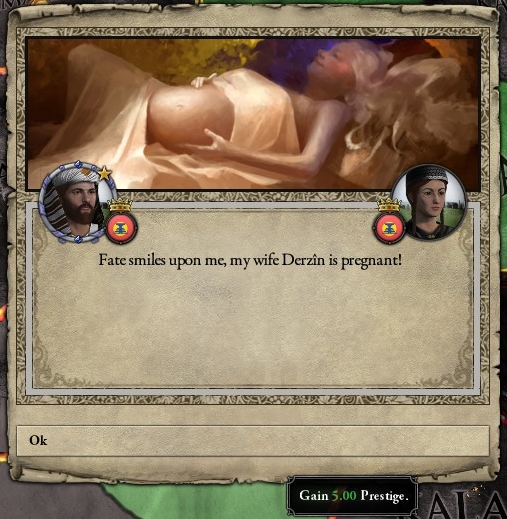  : And it worked. Zere's wife was with child. A small life in the dunes of death. : And it worked. Zere's wife was with child. A small life in the dunes of death. 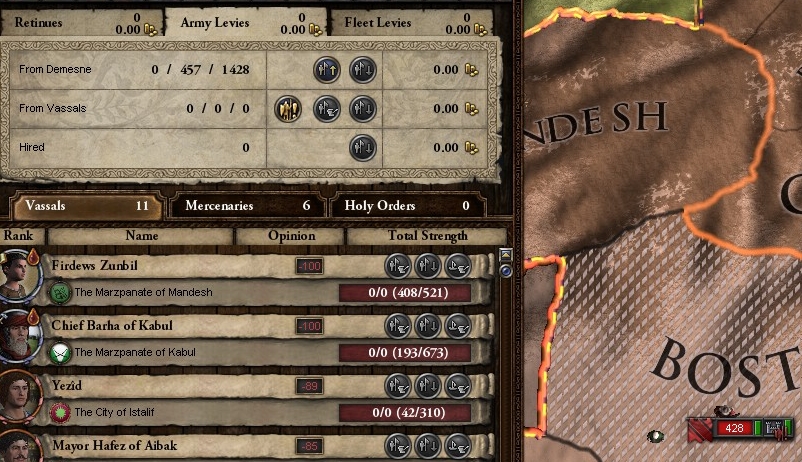  : For two years the brothers fought. For two years, our temples ran red with the blood of the righteous. The brothers danced their dance of death, both too tired to land a killing blow. : For two years the brothers fought. For two years, our temples ran red with the blood of the righteous. The brothers danced their dance of death, both too tired to land a killing blow.The old Afghan stops speaking and stares in the fire. He eyes look at the dancing lights, a poor imitation of the Sun in the desert night. He thinks of his home, and the pain it had suffered.  : Come. It is late. We must rest before our journey. We will speak later. There is always a tomorrow. : Come. It is late. We must rest before our journey. We will speak later. There is always a tomorrow.He heads to his tent, whispering a prayer to help the Sun rise again in the morning. The others shuffle to their tents, thinking on the old man's story, and of their own homelands. But that's for another time. There is always a tomorrow.
|
|
|
|
History Update 1 - Why is Zunism even in this? So, Zunism is a relatively new addition to the game. It was added in the Charlemagne expansion, and only exists in the 769 start. It feels like a strange religion to add, from a gameplay perspective, since only three counties ever follow Zunism, and only at one start date. They have some interesting gameplay quirks, which I will talk about in more detail later, but they just seem so limited compared to the other pagans. 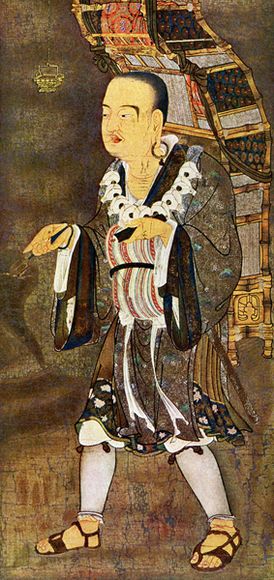 However, let's try to find what this whole thing was about. What is Zun worship? Well, as far as I can find, there was a shrine in what is today the Helmand province of Afghanistan, which roughly corresponds to the Bost province in the game. The shrine and its worshippers were described by a Chinese Buddhist monk Xuanzang, a pilgrim whose travels would later inspire Journey to the West. He wrote: "They worship principally the [deity] Kshuna. This [deity] spirit formerly came from Mount Aruna in Kapisa [near Kabul], and took his abode here in the southern districts of this kingdom, in the mount Sunagir. He is severe or good, causing misfortune or exercising violence. [...] The princes, nobles and people of this as well as of foreign countries assemble every year at a season of rejoicing which is not fixed, and offer gold and silver and precious objects of rare value, with sheep, and horse, and domestic animals" 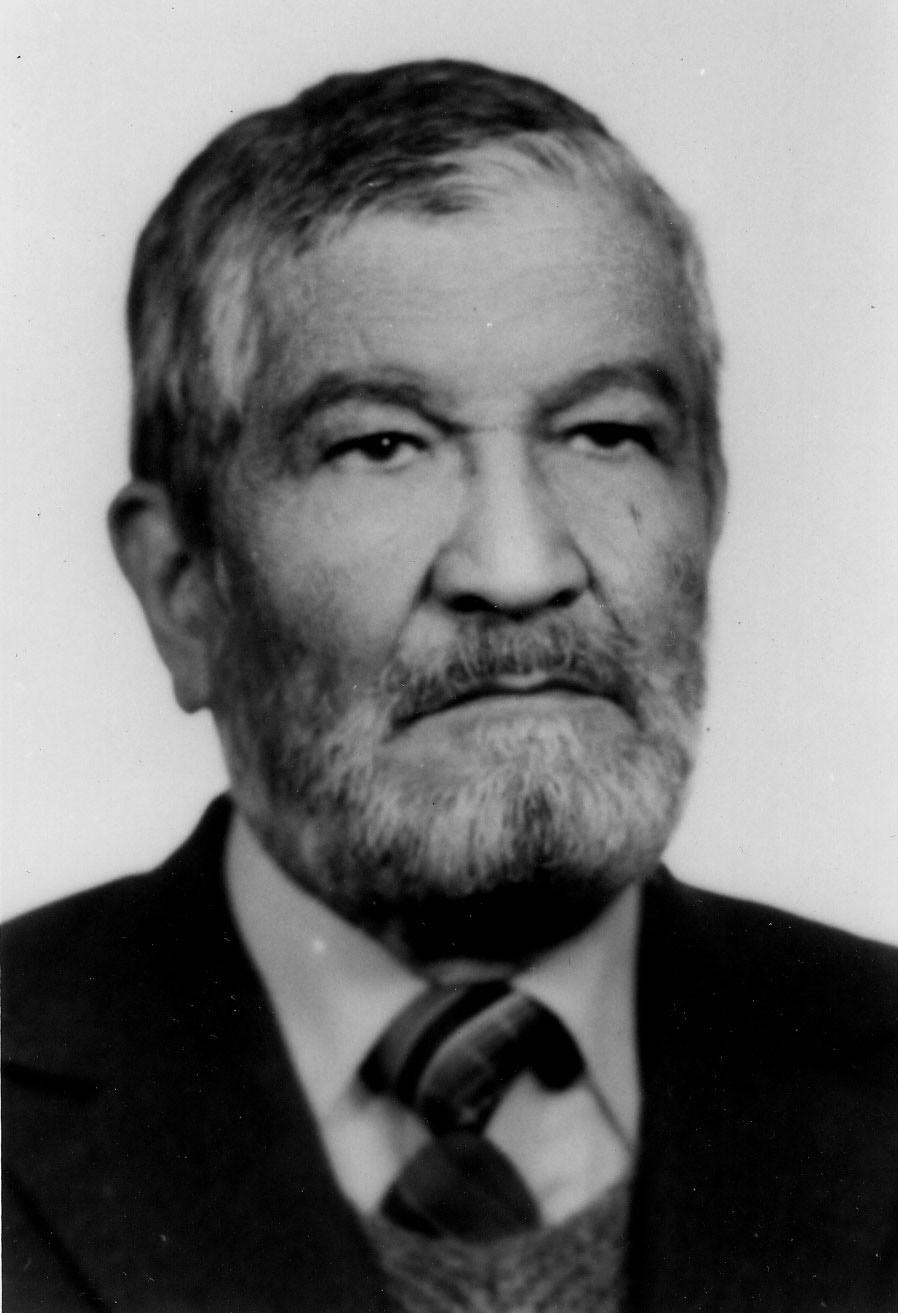 Abdul Hai Habibi, an Afghan historian, places this Sunagir mountain in southern Zabulistan, where we started this game. He postulates that the idol in the temple of Zun, Zoon or Zoor (clerical errors) was broken by a Muslim general bin Samara. In 650, he snapped off its hands and plucked the rubies out of its eyes, giving them to the temple keeper with the words "My intention was to show an idol cannot help or harm anyone". 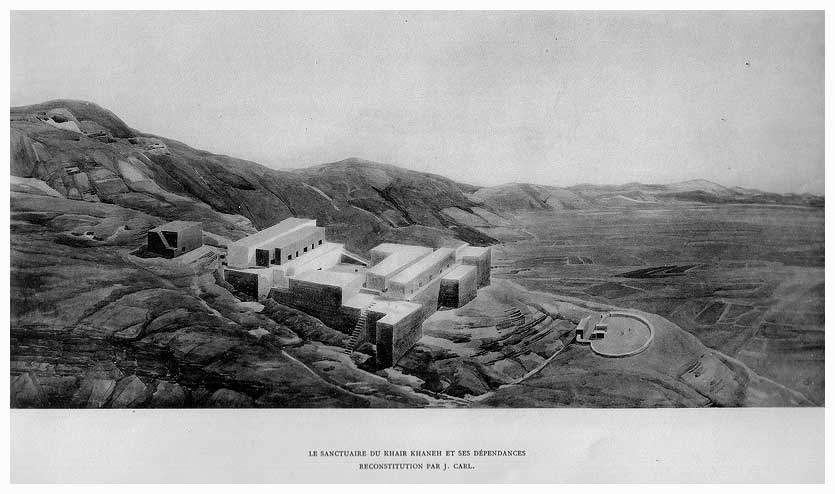 The temple itself has several images of Surya, a Hindu sun god, which Habibi believes is what turned into Zun: 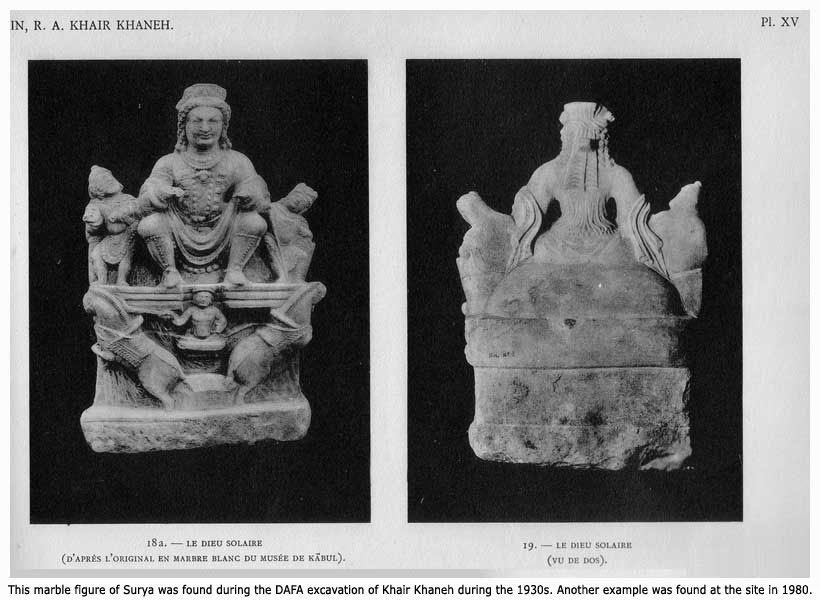 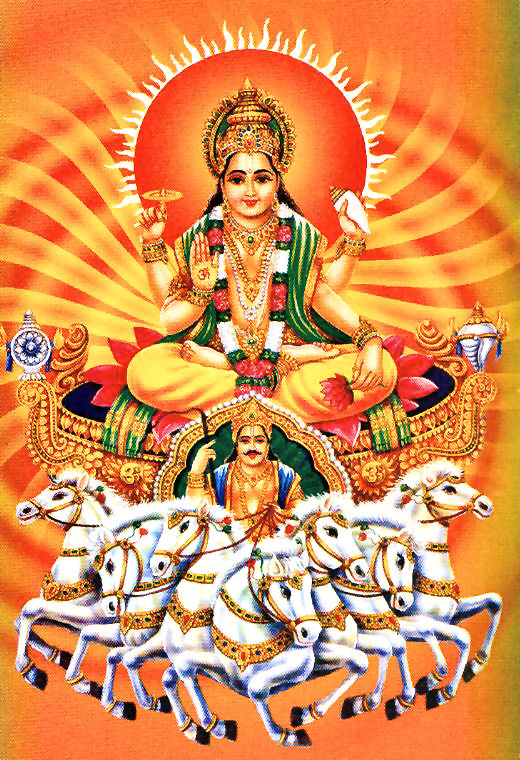 Interestingly enough, temples of Surya pop up all over the place in India, including one in Multan, which is our third holy site. TL;DR: The Hephthalites settled in southern Zabulistan, worshipped a Hindu sun god Surya, who ended up becoming Zun, who our ruling family named themselves after. Further Reading: The Temple of Zoor or Zoon in Zamindawar by Abdul Hai Habibi
|
|
|
|
Film Update 1 - Don't Trust Your Children As you may have noticed, our first update dealt with succession crises, and the problem of conflicting ambitions between family. Jimofuta was a pretty decent ruler, all things considered. He loved his kids, and his kids loved him. He provided for his family, and they supported him in his endeavours. His endeavours, however, required some sketchy dealings, including literally exploding a priest because he was inconvenient, and attacking grieving sons mere days after their fathers have passed. After he died, his realm went to poo poo very quickly. His successor, little Shihyu, already attempted murder for shits and giggles at the age of 10. He probably would've turned out awful, if it wasn't for the fact that he got in the way of his brothers. What's a little fratricide between friends? The kid had to go one way or another, real men were fighting for the throne. lovely brothers doing lovely brother things to each other out of ambition, dragging thousands of men to death over a family squabble. 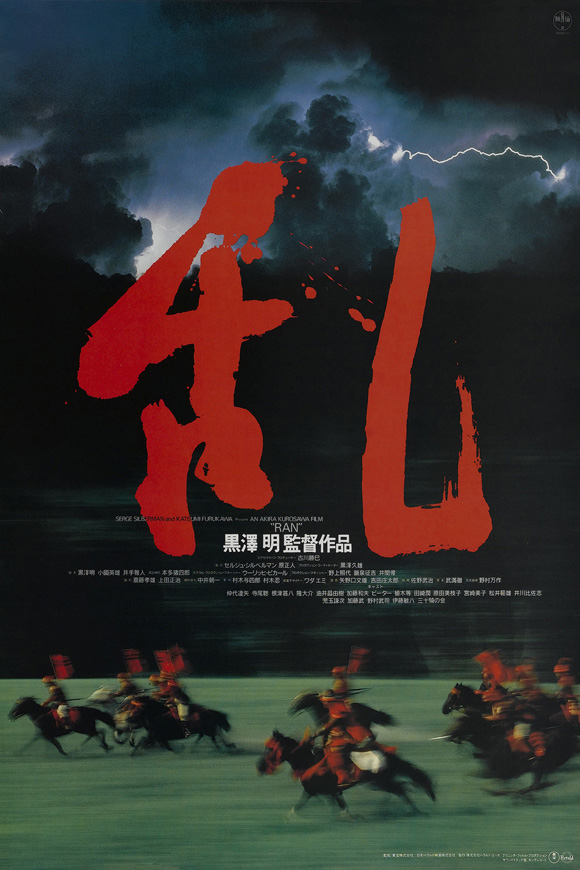 So, when approaching this week's film, I cheated a bit, and decided to go with a movie that deals with a feudal succession crisis: Akira Kurosawa's Ran. It tells a story of a king with three sons, who tried to ensure they each have their own little fief by dividing his land among them. Playing the ever wise and benevolent ruler, he tells them a parable (it's the fasces. you know it) to try to get them to get along. This backfires spectacularly: one of his sons calls him out on his bullshit, listing the awful things he did in order to secure the kingdom in the first place. He gets banished for speaking out, and a powerplay that grows into a civil war begins. There's blindings, betrayals and ritual suicides. It's pretty great. 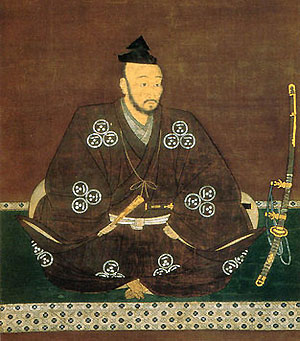 As you can probably tell by that description, it's sort of an adaptation of King Lear. I say sort of, because there is a story of Japanese ruler Mori Motonari. He had three sons, all of them devoted to him. One day, he showed them that they are stronger together by demonstrating how easy it is to break one arrow, and how hard it is to break three. Given the fact that Ran is set roughly in the same time period as Mori lived in, it's safe to assume that this is a kind of mix of both of these stories, as seen by Kurosawa.  Ran is absolutely gorgeous. Kurosawa storyboarded the whole thing himself, by literally painting every single shot. It cost $12 million to make, the most expensive film made in Japan at the time of its release. It's sad, it's beautiful, and pretty in sync with the update. You should check it out. Next week, I'll cheat less and find something a bit less direct. Kayten fucked around with this message at 05:41 on Jul 27, 2015 |
|
|
|
This is a pretty interesting way to spice up the hackneyed CK2 LP. It will be interesting to see where this goes!
|
|
|
|
|
Good writing so far, plus the history updates have me interested. Will you be trying out the horde mechanics later?
|
|
|
|
Thanks! I haven't gotten around to Horse Lords yet, plus I've heard people mention some interesting bugs already. I'll wait for a patch or two, maybe switch over to a horde by the time we get to the 12th-13th century. Update within 25 hours.
|
|
|
|
Update 2 - The Brothers' Wars It's midday. The travellers, wrapped in white, walk on through the dunes. The old Afghan marches on in the front, avoiding the blazing sun with his eyes. The younger man follows him closely. Finally, he gets the courage to ask his question.  : Elder, tell me more of the cruel Zere. : Elder, tell me more of the cruel Zere.The old man tosses a scared glance at the sun. He stops in his tracks and stares the younger one down.  : Watch your tongue! You boredom will not dictate my histories! : Watch your tongue! You boredom will not dictate my histories!The younger man prattles off apologies, and shuffles off to the back of the Caravan. ... Eventually, the sun hits the horizon, and the old Afghan makes the call to set up camp. As the others pitch their tents and make food, the Afghan stares at the sun, moving his lips in a prayer. He reaches into his robes, and pulls out a small copper amulet, a facsimile of the sun, and kisses it. The sun has set. The group huddles around the campfire, eating in silence. The Afghan finishes his meal, sighs, and turns to the younger man.  : Forgive an old man for his temper. I was rash earlier. : Forgive an old man for his temper. I was rash earlier. : It's quite alright, Elder. : It's quite alright, Elder. : I will tell you more of Zere, now that Zun can no longer hear us. Where did I last leave off? : I will tell you more of Zere, now that Zun can no longer hear us. Where did I last leave off? : The Brother War, Elder. : The Brother War, Elder. : Ha! Which one? There were many, for Zere had many brothers, and little love for any of them. : Ha! Which one? There were many, for Zere had many brothers, and little love for any of them.  : Zere was a strange man. He did not care for his family. Even his children were more of a distraction to him than anything else. : Zere was a strange man. He did not care for his family. Even his children were more of a distraction to him than anything else.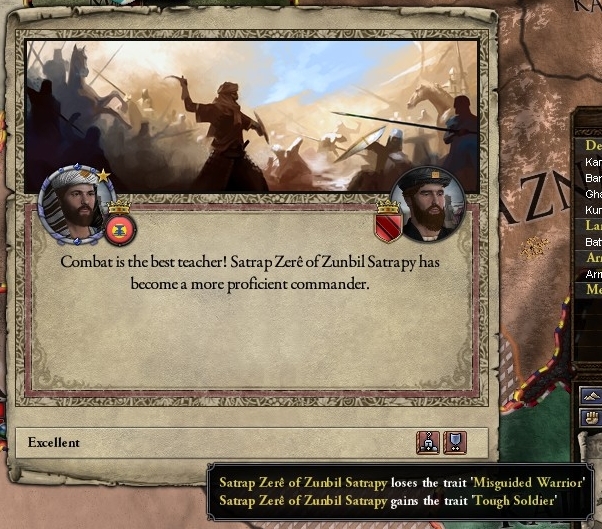  : They got in the way of conquest, you see. And Zere loved his conquests. : They got in the way of conquest, you see. And Zere loved his conquests. : To break his brother's supporters, he once again sent runners to the scoundrels in the nearby nations. Like his father, he promised gold and rubies from lands of his enemies. And they answered the call, because what scoundrel does not love rubies? : To break his brother's supporters, he once again sent runners to the scoundrels in the nearby nations. Like his father, he promised gold and rubies from lands of his enemies. And they answered the call, because what scoundrel does not love rubies?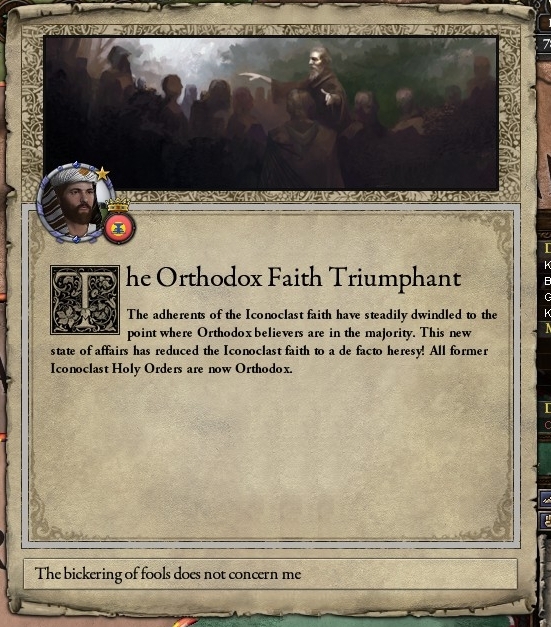  : They brought with them new rumours that the Greek Christians were the right kind of Christian again. The Greek Kaisers seemed to change their minds on the Christ quite quickly. : They brought with them new rumours that the Greek Christians were the right kind of Christian again. The Greek Kaisers seemed to change their minds on the Christ quite quickly.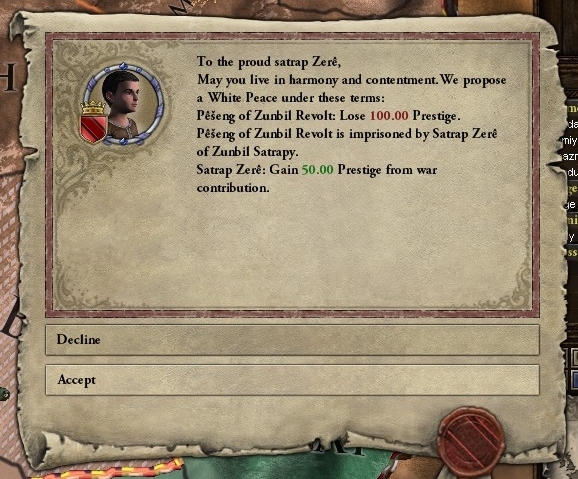  : With his scoundrel army behind him, Zere marched on his enemies. They knew they were no match for foreign swordsmen, and surrendered, hoping Zere would show the same mercy his father was famous for. : With his scoundrel army behind him, Zere marched on his enemies. They knew they were no match for foreign swordsmen, and surrendered, hoping Zere would show the same mercy his father was famous for.  : But Zere was not his father. He said that no man could judge such a traitor. Only the Justice-Giver could decide his fate. And so his men dug a hole in the desert, and threw the young Peseng in there. For days, the little boy spoke to Zun, and Zun deemed him unworthy. When Zere's men returned in a week, the boy was a dried-up corpse. : But Zere was not his father. He said that no man could judge such a traitor. Only the Justice-Giver could decide his fate. And so his men dug a hole in the desert, and threw the young Peseng in there. For days, the little boy spoke to Zun, and Zun deemed him unworthy. When Zere's men returned in a week, the boy was a dried-up corpse.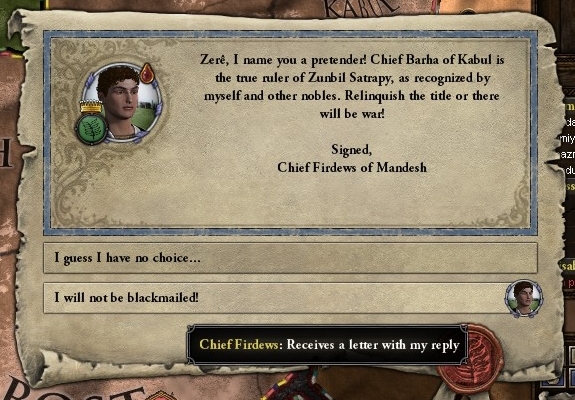  : This cruelty did not sit well with Zere's family. His nephew, Firdews, Shiquer's son, raised their banners and called for Barha's ascension to the Sun Throne. : This cruelty did not sit well with Zere's family. His nephew, Firdews, Shiquer's son, raised their banners and called for Barha's ascension to the Sun Throne.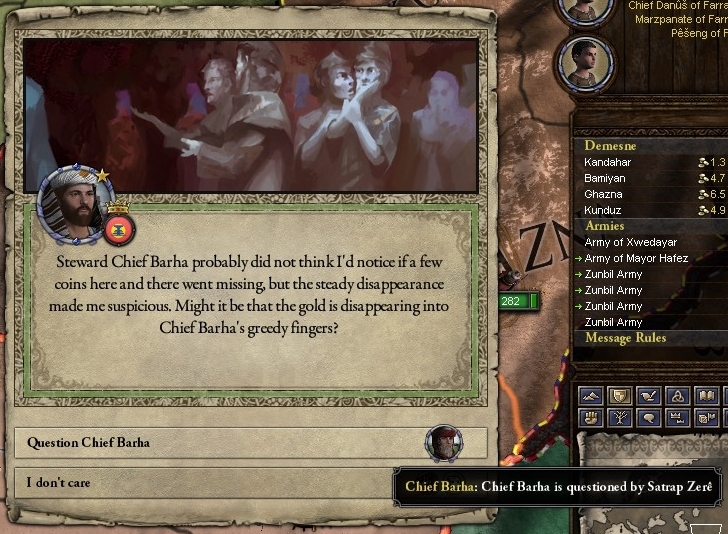  : Barha had always claimed that he had nothing to do with the family pressing his claims. He said he only wished to serve Zere as his steward, as was his duty. But Zere did not trust his brother. : Barha had always claimed that he had nothing to do with the family pressing his claims. He said he only wished to serve Zere as his steward, as was his duty. But Zere did not trust his brother.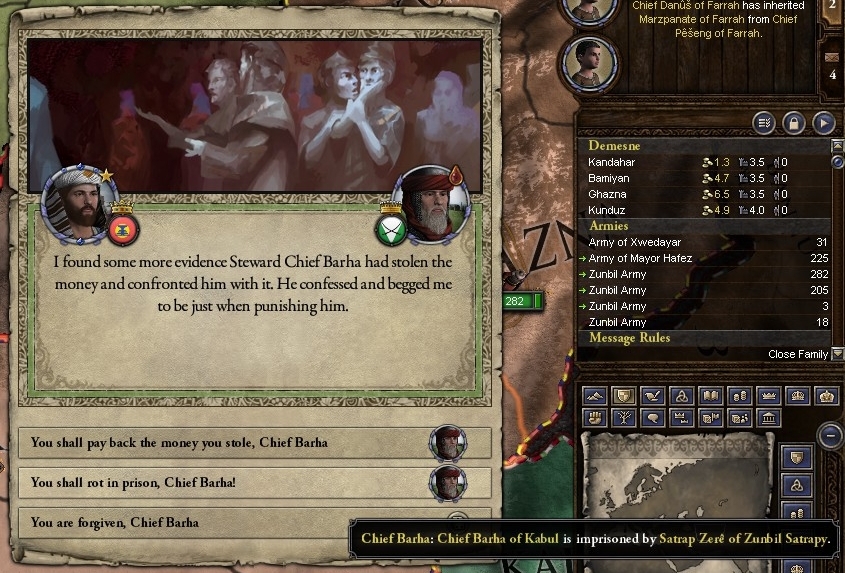  : "If you are so loyal to me, brother, then why do you dine on the fattest rams while my peasants starve? If you are so true, then why do your coffers overflow with gold while mine have no more silver than they did years ago?" This was enough for Zere to proclaim Barha a filthy thief, and thrown in the dungeon. : "If you are so loyal to me, brother, then why do you dine on the fattest rams while my peasants starve? If you are so true, then why do your coffers overflow with gold while mine have no more silver than they did years ago?" This was enough for Zere to proclaim Barha a filthy thief, and thrown in the dungeon.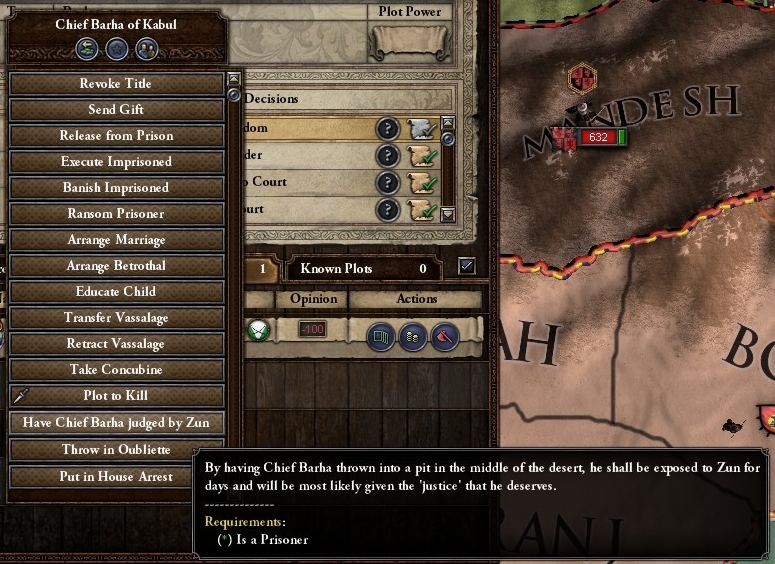  : And once again Zere's men dug a pit in the desert, and once again a frail man was thrown inside. I was not there, but I heard that Barha begged for mercy, and asked Zere what their father would say, had he seen them like this. And Zere answered: "He would praise the Sun". : And once again Zere's men dug a pit in the desert, and once again a frail man was thrown inside. I was not there, but I heard that Barha begged for mercy, and asked Zere what their father would say, had he seen them like this. And Zere answered: "He would praise the Sun".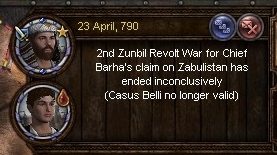  : On hearing Barha's fate, the young Firdews laid down his arms. After all, if Barha could not rule, how could he put him on the Sun Throne? : On hearing Barha's fate, the young Firdews laid down his arms. After all, if Barha could not rule, how could he put him on the Sun Throne?  : Zun judged Bahra to be unworthy. Who can say how much Zere helped in that judgement? All I know is that after a week, there was another dried body for the scavenger birds. : Zun judged Bahra to be unworthy. Who can say how much Zere helped in that judgement? All I know is that after a week, there was another dried body for the scavenger birds.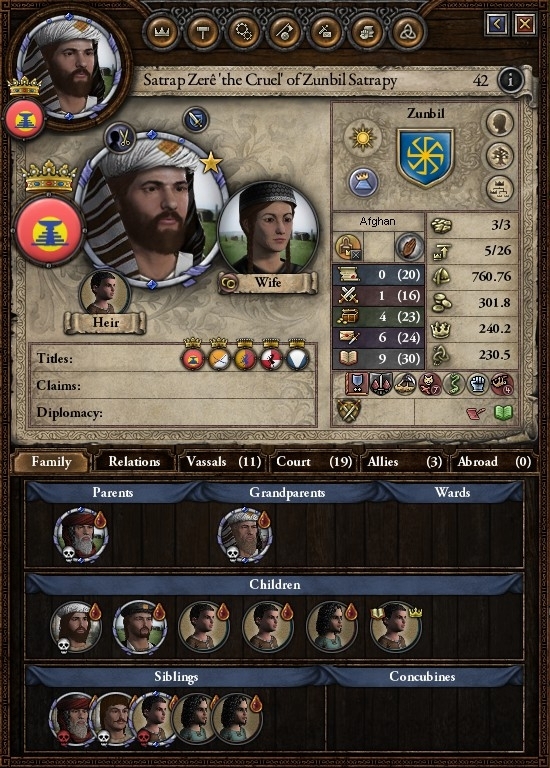  : Word of these judgements has reached the furthest ends of the Zunbil realm. Men were angry, but not angry enough to risk Zere's wrath. So in hushed whispers in the inns at night, they told tales of "Zere the Cruel", and drank bitterly. : Word of these judgements has reached the furthest ends of the Zunbil realm. Men were angry, but not angry enough to risk Zere's wrath. So in hushed whispers in the inns at night, they told tales of "Zere the Cruel", and drank bitterly.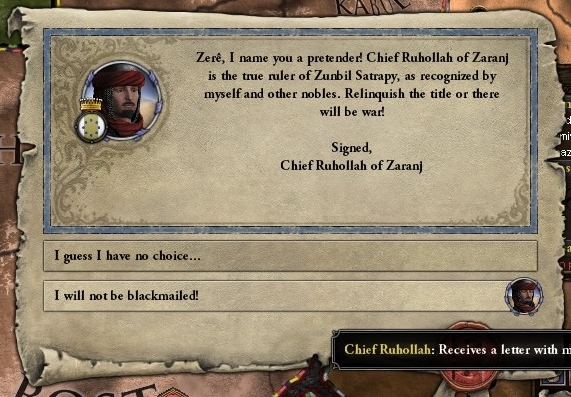  : Some did more than whisper. The chief of Zaranj, a young man named Ruholla, claimed that the Zunbils were a blight, slaves to the Darkness. He took up arms, and claimed himself to be the true owner of the Sun Throne. : Some did more than whisper. The chief of Zaranj, a young man named Ruholla, claimed that the Zunbils were a blight, slaves to the Darkness. He took up arms, and claimed himself to be the true owner of the Sun Throne.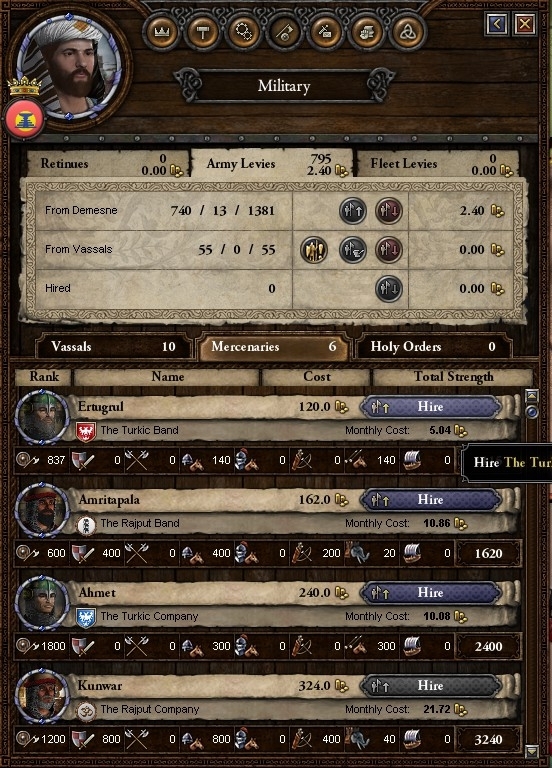  : Zere, so tired after another war, has called on more brigands to help him. More gold, more rubies. I did not even know there were rubies in Zaranj, but the Satrap would not lie, would he? : Zere, so tired after another war, has called on more brigands to help him. More gold, more rubies. I did not even know there were rubies in Zaranj, but the Satrap would not lie, would he? : This was when I took up arms for Zere. Zunbils were our rightful rulers, placed here by Zun himself. It has been so since before I was born, and it will be so after I die. I did not need rubies. His cause was just. : This was when I took up arms for Zere. Zunbils were our rightful rulers, placed here by Zun himself. It has been so since before I was born, and it will be so after I die. I did not need rubies. His cause was just.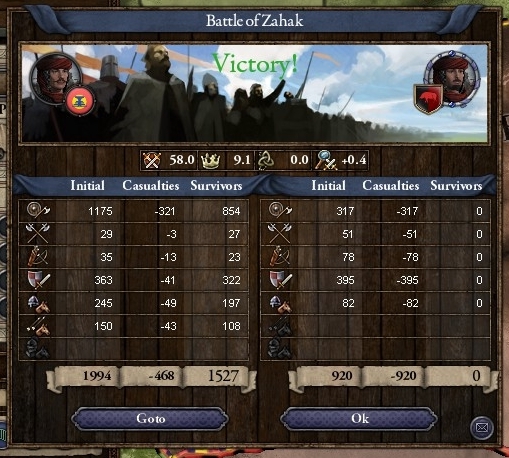  : I was at Zahak, where we finally caught up to Ruholla's army. We chanted the Sun Chant as we charged, and so did they. But there were more of us, and Zun heard our chant over theirs. We left none alive. : I was at Zahak, where we finally caught up to Ruholla's army. We chanted the Sun Chant as we charged, and so did they. But there were more of us, and Zun heard our chant over theirs. We left none alive.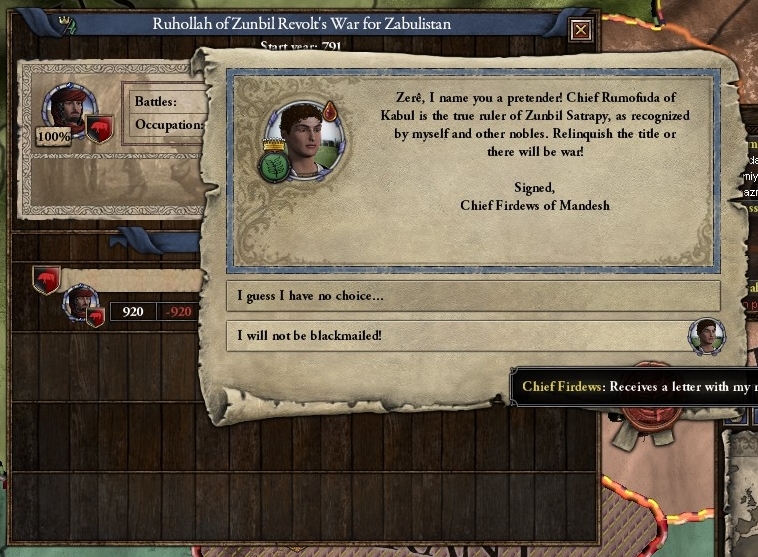  : But this show of strength was not enough. As we were marching to Zaranj to arrest Ruholla, a messenger caught up to us. It seems the young Firdews took up arms again, intent on pressing Barha's son's claim. We were to turn around and fight another Zunbil once more. : But this show of strength was not enough. As we were marching to Zaranj to arrest Ruholla, a messenger caught up to us. It seems the young Firdews took up arms again, intent on pressing Barha's son's claim. We were to turn around and fight another Zunbil once more.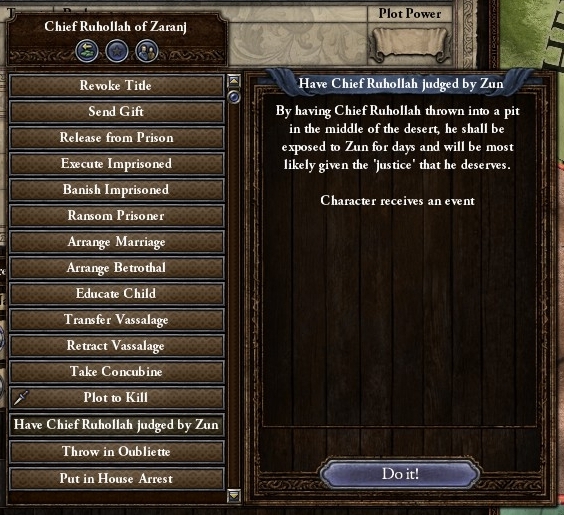  : More pits were dug. One for Ruholla, who submitted himself to Zere's mercy, and one for Firdews, a message to the young chief. : More pits were dug. One for Ruholla, who submitted himself to Zere's mercy, and one for Firdews, a message to the young chief.  : As we marched on Mandesh, some of the brigands with us told stories of the terrors of the north, the fearsome Vikings. Men in longboats, raiding and pillaging across the seas. We were safe from this new menace, of course. There were no rivers large enough for their ships to travel on in Zunbil. : As we marched on Mandesh, some of the brigands with us told stories of the terrors of the north, the fearsome Vikings. Men in longboats, raiding and pillaging across the seas. We were safe from this new menace, of course. There were no rivers large enough for their ships to travel on in Zunbil.  : The constant wars did not stop Zere from speaking with the Elders about Zun. I have heard him speak on the Justice-Giver's wrath, once. He spoke to the troops of the righteousness of our cause, us being the bulwark against the Darkness. None could speak of Zun's words better than he could. : The constant wars did not stop Zere from speaking with the Elders about Zun. I have heard him speak on the Justice-Giver's wrath, once. He spoke to the troops of the righteousness of our cause, us being the bulwark against the Darkness. None could speak of Zun's words better than he could.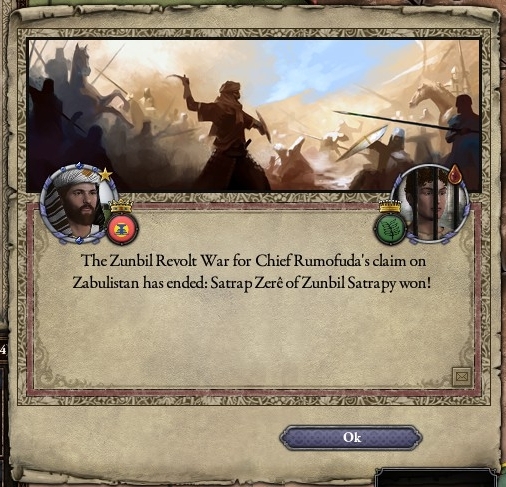  : Mandesh fell quickly, and Firdews was dragged to the Sun Palace in chains. : Mandesh fell quickly, and Firdews was dragged to the Sun Palace in chains.  : With holy fire in his eyes, Zere cursed his nephew and threw him in the pit. But something strange happened. : With holy fire in his eyes, Zere cursed his nephew and threw him in the pit. But something strange happened. : In a week, when the guards returned to check on the body, they saw Firdews, who greeted them with a smile. He told them of his long talks with Zun, and how his cause was just. He was brought before Zere, who said that the Justice-Giver has spoken, and proclaimed Firdews a free man. : In a week, when the guards returned to check on the body, they saw Firdews, who greeted them with a smile. He told them of his long talks with Zun, and how his cause was just. He was brought before Zere, who said that the Justice-Giver has spoken, and proclaimed Firdews a free man.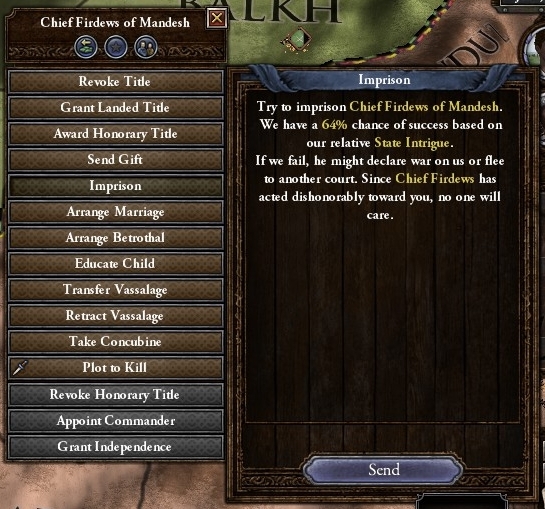  : In a month, we heard further news. Apparently, Firdews was involved in a plot to overthrow Zere yet again. Guards were sent to arrest the traitor. : In a month, we heard further news. Apparently, Firdews was involved in a plot to overthrow Zere yet again. Guards were sent to arrest the traitor.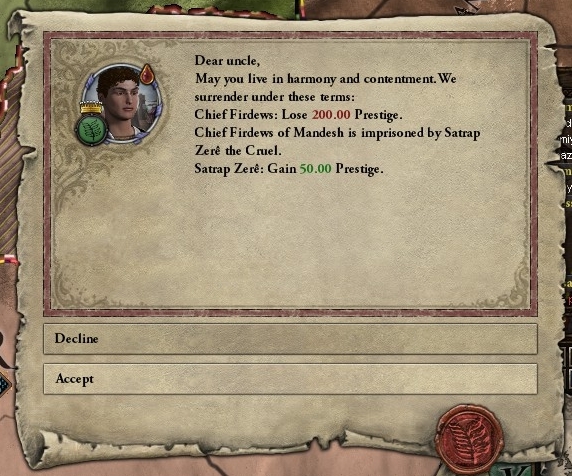  : They were slaughtered by Firdews' troops, and he marched on the Sun Palace yet again. His army was defeated a few miles north of Kandahar, and he was brought before Zere yet again. : They were slaughtered by Firdews' troops, and he marched on the Sun Palace yet again. His army was defeated a few miles north of Kandahar, and he was brought before Zere yet again.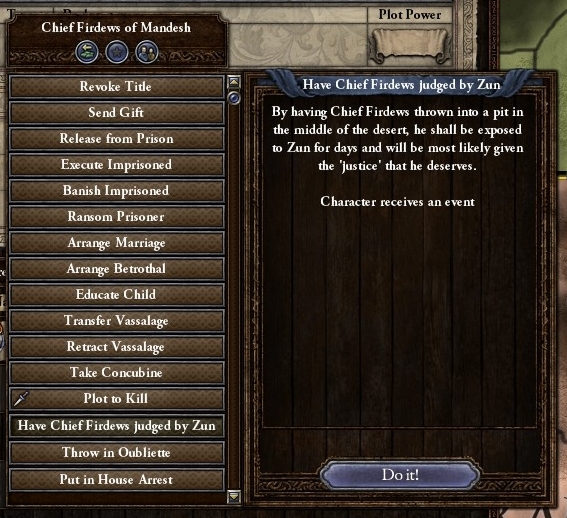  : Another pit was dug, a fresh one. Zere addressed us, and told us that the old pit was dug too early, poisoning Zun's judgement. The Justice-Giver looked into the man's soul as the pit was dug, not when he was tossed into it. This time, the rituals were properly observed. A number of Elders spoke of Zere's righteousness. It was very convincing. : Another pit was dug, a fresh one. Zere addressed us, and told us that the old pit was dug too early, poisoning Zun's judgement. The Justice-Giver looked into the man's soul as the pit was dug, not when he was tossed into it. This time, the rituals were properly observed. A number of Elders spoke of Zere's righteousness. It was very convincing. : But this was the first time I doubted my lord. : But this was the first time I doubted my lord.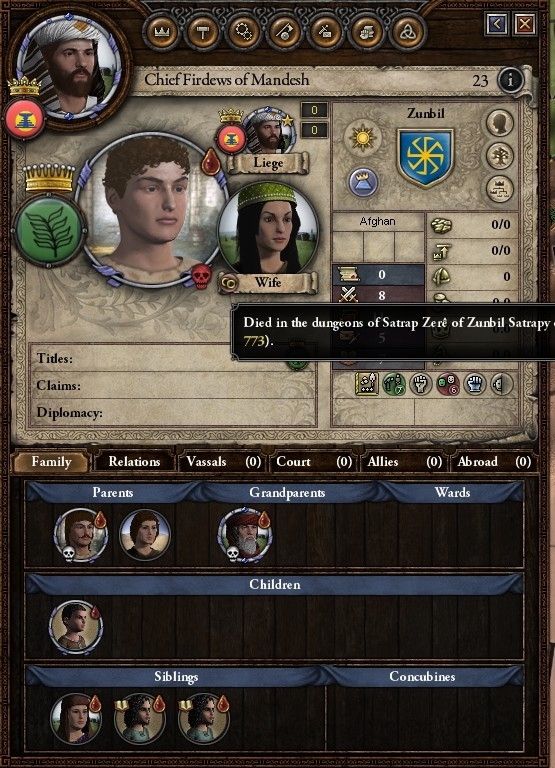  : The second pit worked far better than the first. There were no miracles this time. When the guards returned after a week, there was just another body for the birds. : The second pit worked far better than the first. There were no miracles this time. When the guards returned after a week, there was just another body for the birds.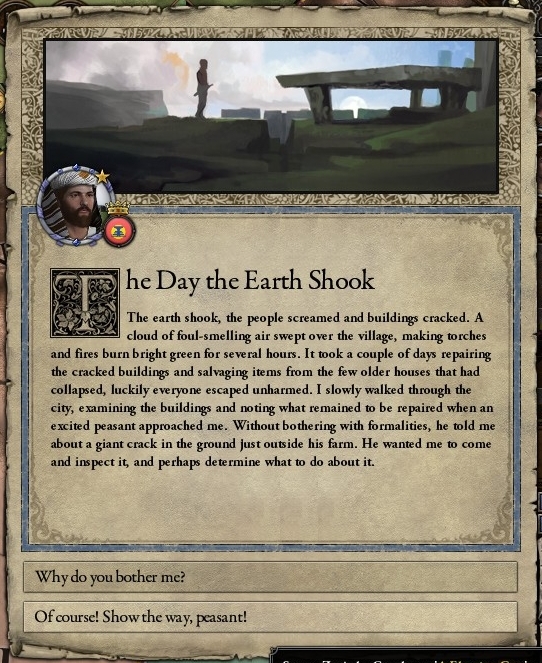  : The Justice Giver was not pleased. His justice denied, he withdrew his protection from a village not far from the capital. The Darkness did not miss her chance, and struck quickly. : The Justice Giver was not pleased. His justice denied, he withdrew his protection from a village not far from the capital. The Darkness did not miss her chance, and struck quickly.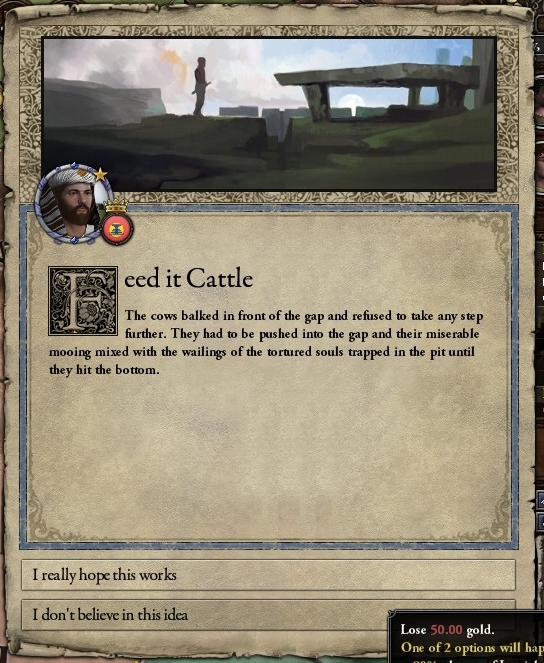  : Having angered the Gods, Zere knew he needed a sacrifice to bring Zun back. He took the fattest cow from every farm around the capital, and offered them all to Zun as vessels for his light. : Having angered the Gods, Zere knew he needed a sacrifice to bring Zun back. He took the fattest cow from every farm around the capital, and offered them all to Zun as vessels for his light.  : And Zun, it would seem, has heard Zere's pleas. He struck against the Darkness, and she was beaten back once more. : And Zun, it would seem, has heard Zere's pleas. He struck against the Darkness, and she was beaten back once more.  : Having proven his holiness to his people, Zere showed the power of the Zunbils throughout Afghani lands. He held a grand ceremony by the Sun Palace, and had the Elders proclaim him the Guardian of the Sun, and Shah of the Afghans. : Having proven his holiness to his people, Zere showed the power of the Zunbils throughout Afghani lands. He held a grand ceremony by the Sun Palace, and had the Elders proclaim him the Guardian of the Sun, and Shah of the Afghans. 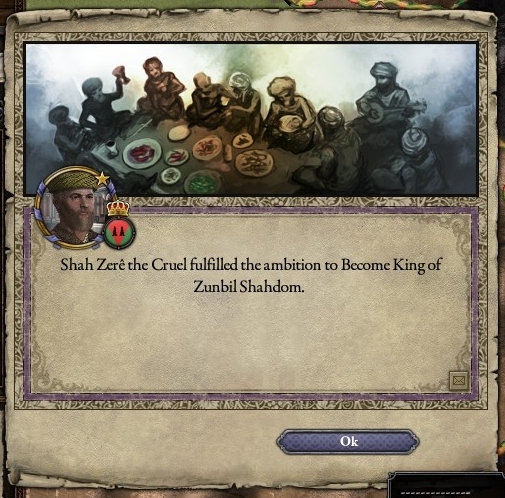  : It was all he ever wanted. He followed the dreams of his father, and took his rightful place as king. : It was all he ever wanted. He followed the dreams of his father, and took his rightful place as king.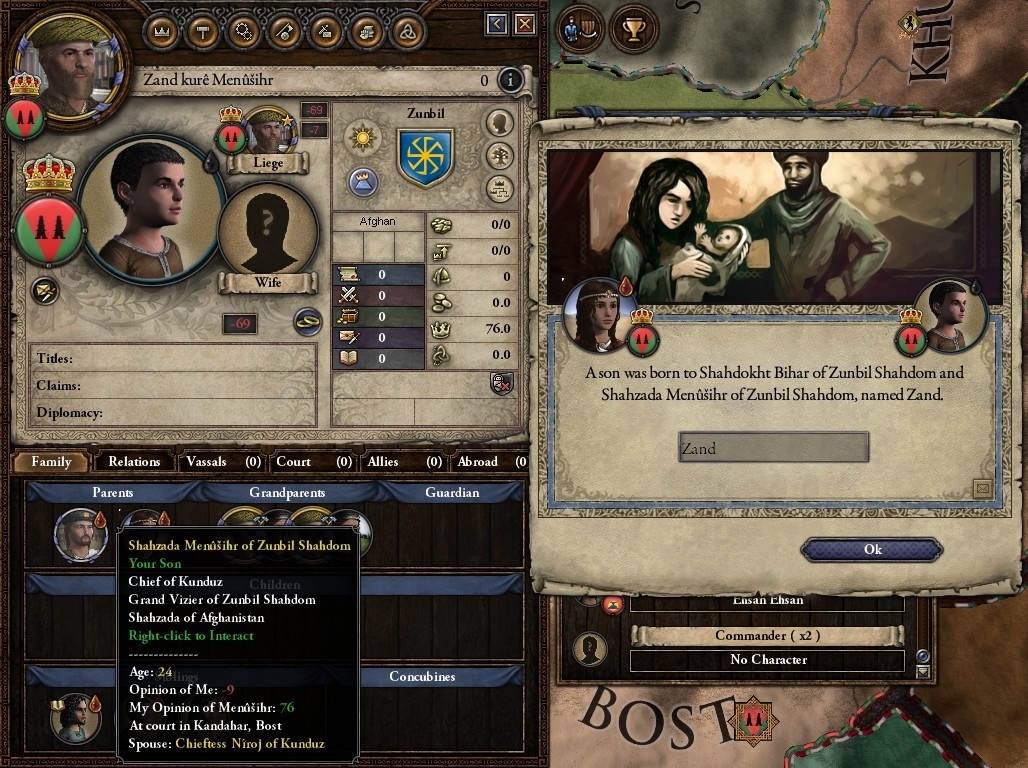  : But even as the people celebrated Zere's ascension, his family was reviled. His children were vile, filthy creatures, surrendering to their basest drives. : But even as the people celebrated Zere's ascension, his family was reviled. His children were vile, filthy creatures, surrendering to their basest drives.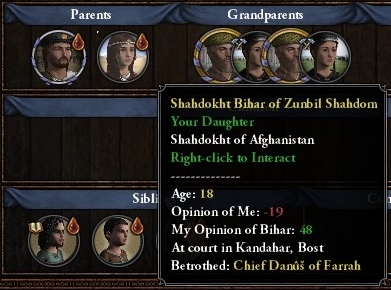  : I do not know the whole truth, but there were rumours in the barracks that Bihar, Zere's daughter, gave birth to a bastard. After all, her betrothed was only ten years old at the time. Evil tongues whispered that her brother, Menusihr, was the one to blame. It seems the lessons of the Zoroastrians of old took hold within the Zunbils. : I do not know the whole truth, but there were rumours in the barracks that Bihar, Zere's daughter, gave birth to a bastard. After all, her betrothed was only ten years old at the time. Evil tongues whispered that her brother, Menusihr, was the one to blame. It seems the lessons of the Zoroastrians of old took hold within the Zunbils.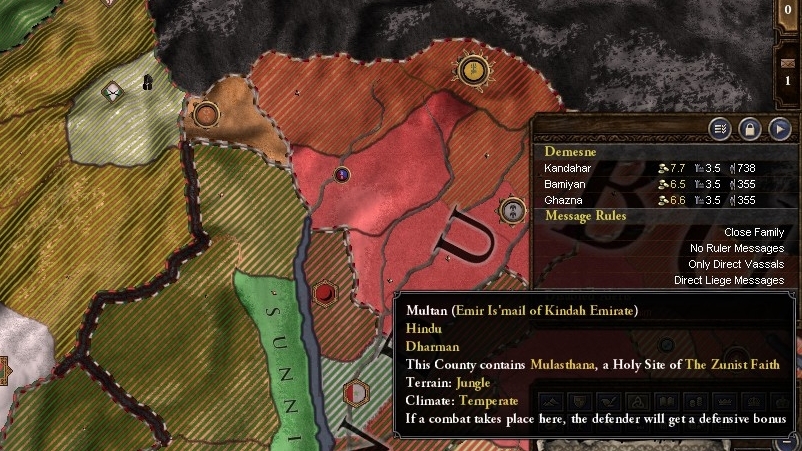  : Eager to distract us from his children's excesses, Zere looked to the east. There was a temple to Surya, the Hindu name for Zun, in Multan. Zere proclaimed that his great dynasty will give us a third Sun Temple by taking Multan, and teaching the Hindus there to praise Zun the right way. : Eager to distract us from his children's excesses, Zere looked to the east. There was a temple to Surya, the Hindu name for Zun, in Multan. Zere proclaimed that his great dynasty will give us a third Sun Temple by taking Multan, and teaching the Hindus there to praise Zun the right way.  : And so, he raised his armies, and we marched east. Our first aim was Purushapura, a small stretch of land, whose only value was that it was the gateway to the Indus. : And so, he raised his armies, and we marched east. Our first aim was Purushapura, a small stretch of land, whose only value was that it was the gateway to the Indus.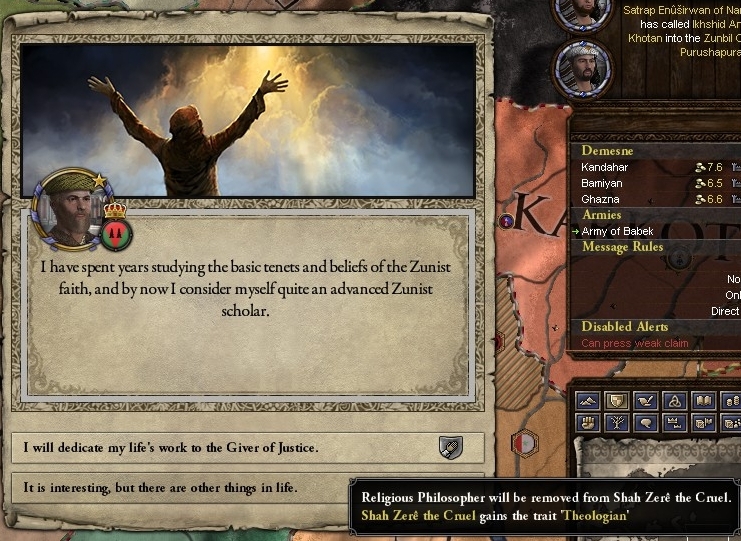  : Zere spoke at length on the need to go east, to search for the sun. The Elders listened, and named him an Elder, for he was wise in the ways of Zun. : Zere spoke at length on the need to go east, to search for the sun. The Elders listened, and named him an Elder, for he was wise in the ways of Zun.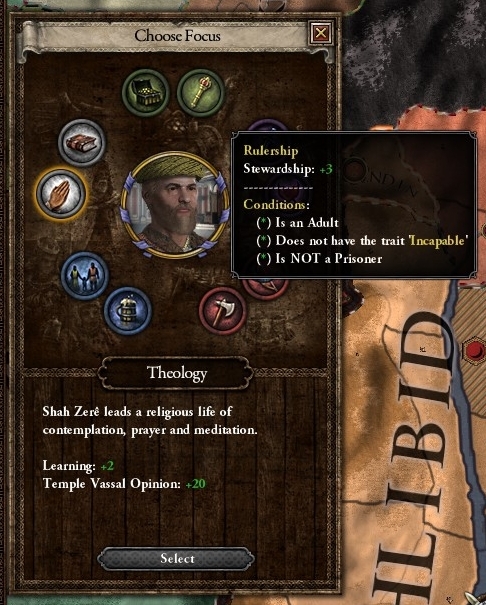  : Having won respect of the Elders, Zere set out to bring order to the Zunbil lands. : Having won respect of the Elders, Zere set out to bring order to the Zunbil lands.  : As we marched east, our reinforcements brought news from the capital. Another monster born in the Zunbil clan. : As we marched east, our reinforcements brought news from the capital. Another monster born in the Zunbil clan.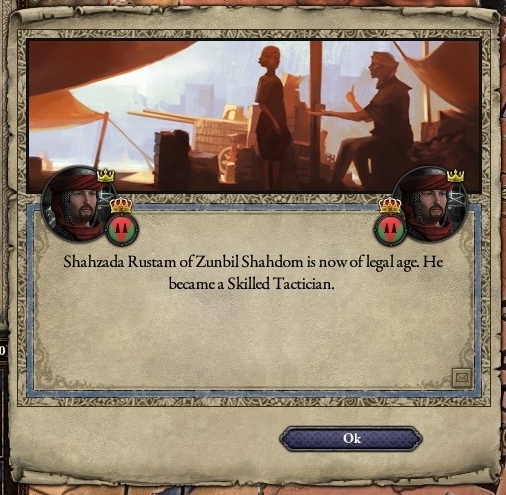  : At this point, Rustam, Zere's youngest, came of age. He was his rightful heir, unless Zere repeated the mistakes of his father. He was even more devoted to Zun, reciting his prayers twice daily, at sunrise and sunset. And yet, his father's cruel streak found his way into his heart. : At this point, Rustam, Zere's youngest, came of age. He was his rightful heir, unless Zere repeated the mistakes of his father. He was even more devoted to Zun, reciting his prayers twice daily, at sunrise and sunset. And yet, his father's cruel streak found his way into his heart.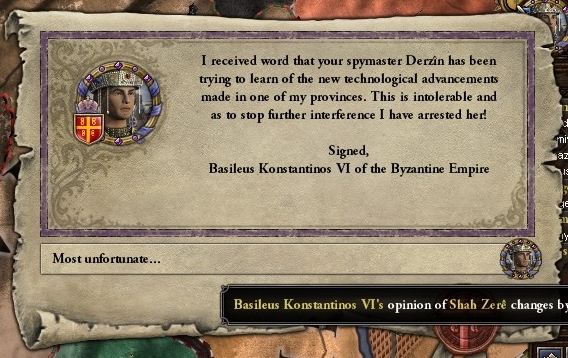  : Remembering his father's mistakes, Zere sent his wife away early on. He named her Master of Spies, and sent her to Constantinople, the second Rome, where she would study the Greeks' secrets and pass them to us. This prevented unwanted children, ensuring Rustam would not have to fight a war as bloody as Zere himself had to. : Remembering his father's mistakes, Zere sent his wife away early on. He named her Master of Spies, and sent her to Constantinople, the second Rome, where she would study the Greeks' secrets and pass them to us. This prevented unwanted children, ensuring Rustam would not have to fight a war as bloody as Zere himself had to.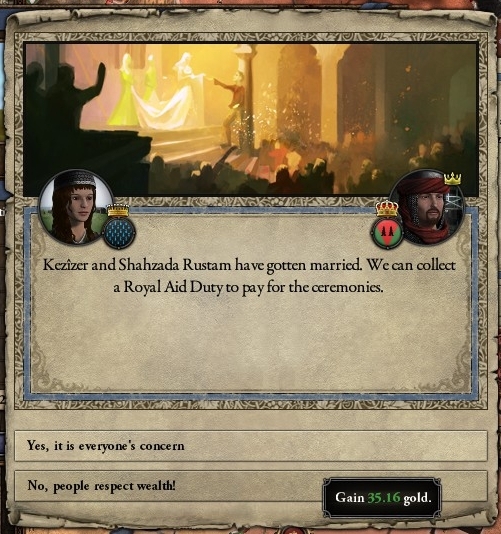  : Rustam married a local girl, bright and beautiful, a true Sun wife. The chiefs of the land gave many rubies, and much gold and saffron to the ceremony. : Rustam married a local girl, bright and beautiful, a true Sun wife. The chiefs of the land gave many rubies, and much gold and saffron to the ceremony.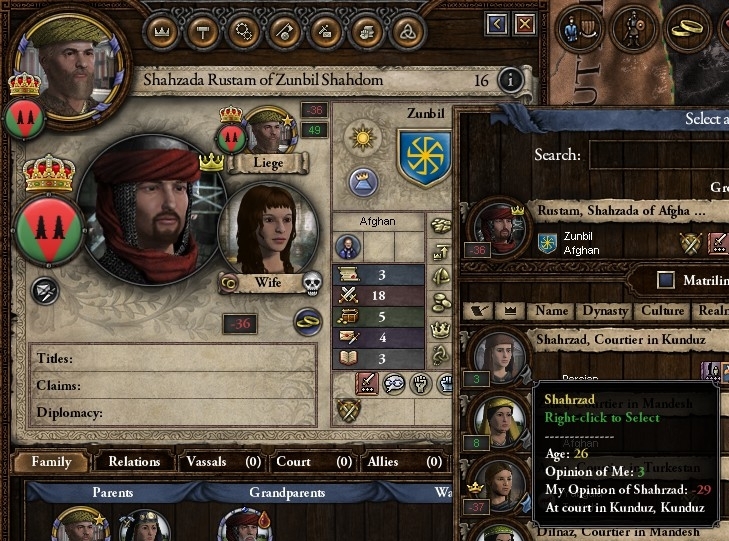  : But it did not last. Rustam's wife died soon after the wedding night. The servants claim they heard awful screams from their chambers on the night, and spoke of Rustam's fury in hushed whispers. Rustam remarried. There was no feast the second time. : But it did not last. Rustam's wife died soon after the wedding night. The servants claim they heard awful screams from their chambers on the night, and spoke of Rustam's fury in hushed whispers. Rustam remarried. There was no feast the second time.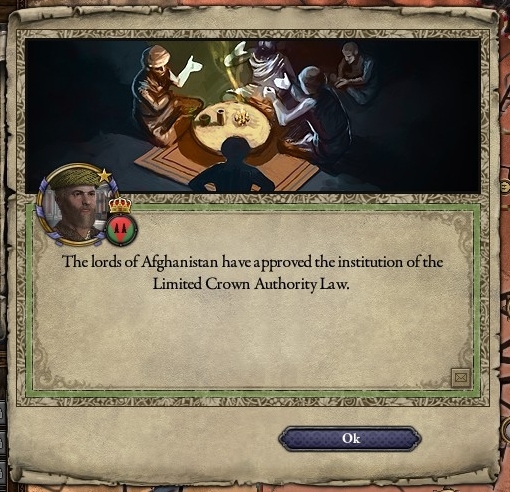  : Zere continued his reforms, forcing the chiefs to recognize him as the first among Satraps. : Zere continued his reforms, forcing the chiefs to recognize him as the first among Satraps.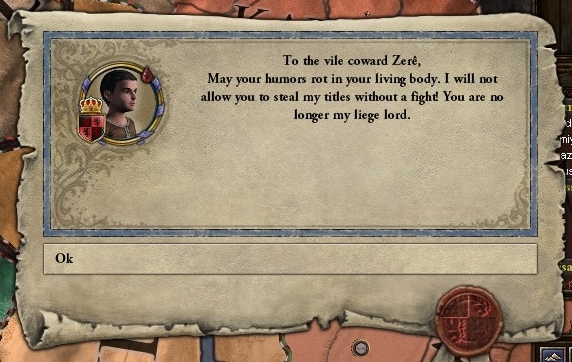  : Those that disagreed with him were punished, swiftly and harshly. : Those that disagreed with him were punished, swiftly and harshly.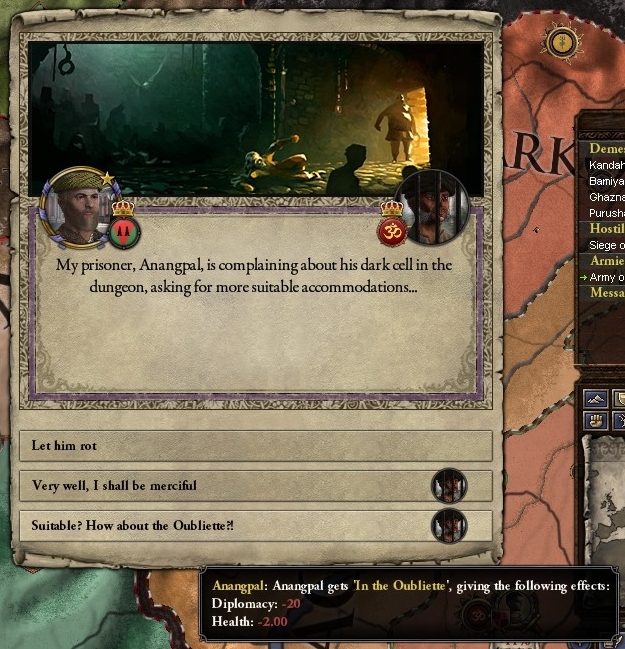  : I did not mention the sheer amount of foreign preachers that visited the Palace, because then I would be speaking until the sun rose and set again. Mahometans, Hindus and Buddhists, all came with their honeyed words and all learned of the depths of the dungeons of the Sun palace. Most quickly learned that their coming here was a mistake, but some assumed Zere would grant preachers the same clemency his father was famous for. They were reminded of their place. : I did not mention the sheer amount of foreign preachers that visited the Palace, because then I would be speaking until the sun rose and set again. Mahometans, Hindus and Buddhists, all came with their honeyed words and all learned of the depths of the dungeons of the Sun palace. Most quickly learned that their coming here was a mistake, but some assumed Zere would grant preachers the same clemency his father was famous for. They were reminded of their place.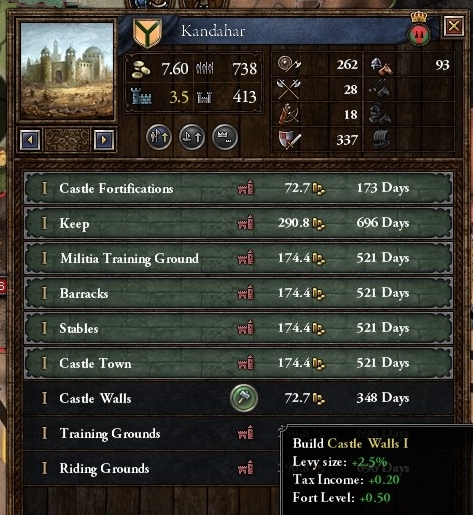  : Fighting two wars at once, Zere realized just how weak the capital was if it were to be attacked. So he brought masons from throughout the land, and had them build a great wall surrounding Kandahar. : Fighting two wars at once, Zere realized just how weak the capital was if it were to be attacked. So he brought masons from throughout the land, and had them build a great wall surrounding Kandahar.  : Eventually, the Greek Kaiser let Zere's wife go free. She made her way home with her guards, for she could not cross the mountains alone. Zere saw the horrors the sometimes-Christians did to his wife, and wept for her. She never forgave him, and they never slept in the same chamber again. : Eventually, the Greek Kaiser let Zere's wife go free. She made her way home with her guards, for she could not cross the mountains alone. Zere saw the horrors the sometimes-Christians did to his wife, and wept for her. She never forgave him, and they never slept in the same chamber again.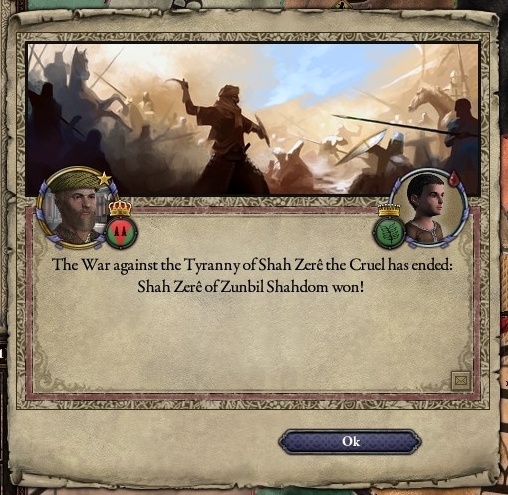  : With the march into a child's domain, Zere's rule over his vassals was secure. The child was stripped of his titles for disobedience, and then released. For once, no pit was dug. Zere was grieving for his wife's sight. She could no longer see Zun, and thus could no longer be blessed by him. : With the march into a child's domain, Zere's rule over his vassals was secure. The child was stripped of his titles for disobedience, and then released. For once, no pit was dug. Zere was grieving for his wife's sight. She could no longer see Zun, and thus could no longer be blessed by him.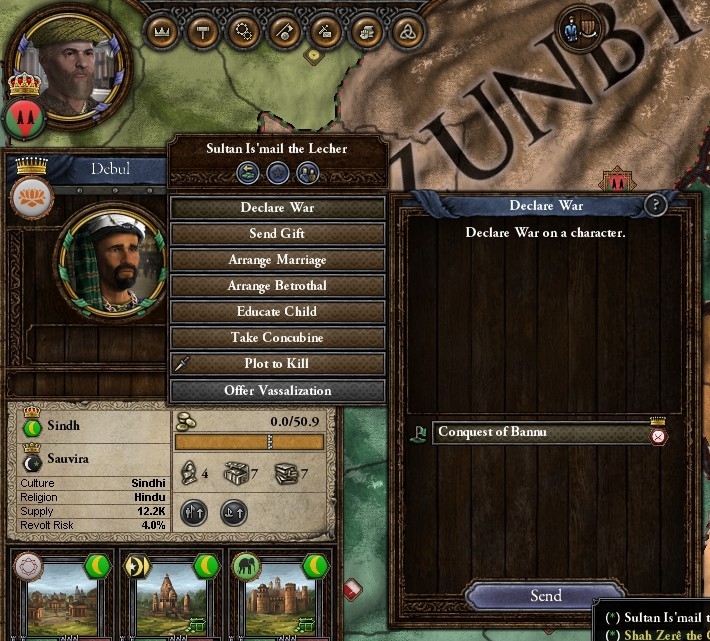  : It is around this time, the Buddhists to the east surrendered Purushapura to us, and Zere immediately challenged the southern Sultan for Bannu. It was a small stretch of land near Multan, important for a single reason: it was to become the first Zunbil domain east of the great Indus river. : It is around this time, the Buddhists to the east surrendered Purushapura to us, and Zere immediately challenged the southern Sultan for Bannu. It was a small stretch of land near Multan, important for a single reason: it was to become the first Zunbil domain east of the great Indus river.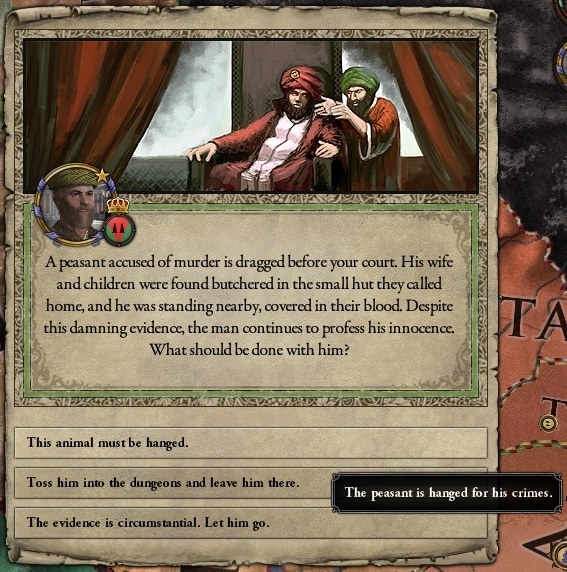  : Back home, Zere settled disputes in his domain, building a wall of laws to match his wall of stone. : Back home, Zere settled disputes in his domain, building a wall of laws to match his wall of stone.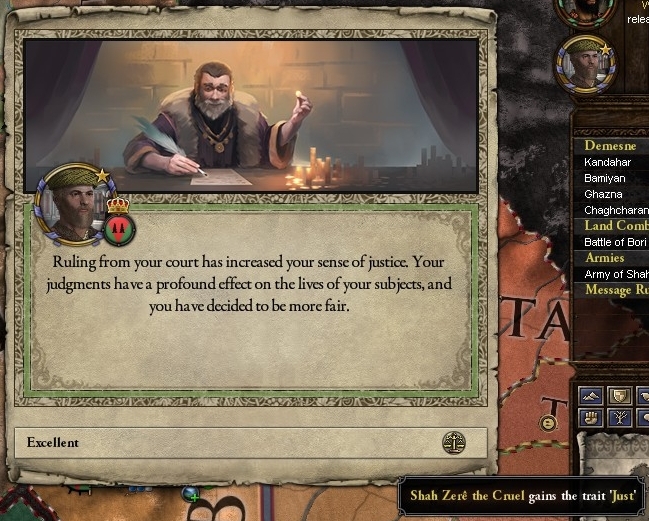  : And he was very good at it. His wall of laws was strong, stronger than the stone walls of Kandahar. : And he was very good at it. His wall of laws was strong, stronger than the stone walls of Kandahar.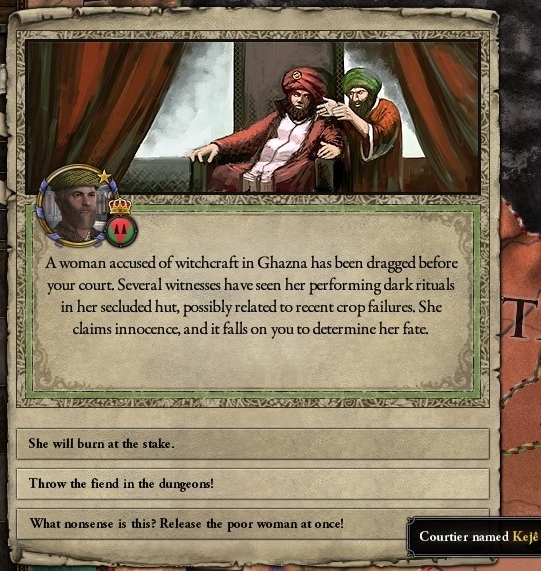  : It handled attacks from the servants of darkness again and again. : It handled attacks from the servants of darkness again and again.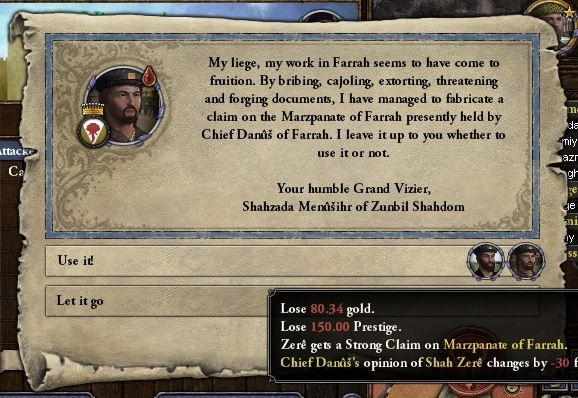  : And Zere thought: why not expand his walls? He was just, and thus, his claim for a nearby Marzpanate was just. He was a good administrator, and it would make administration easier. : And Zere thought: why not expand his walls? He was just, and thus, his claim for a nearby Marzpanate was just. He was a good administrator, and it would make administration easier.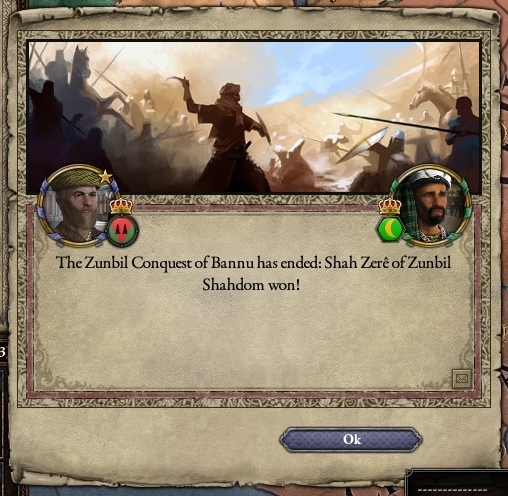  : As he contemplated this, we won another great victory in the east. Bannu was ours, and the southern Sultan defated. Multan was within his grasp. : As he contemplated this, we won another great victory in the east. Bannu was ours, and the southern Sultan defated. Multan was within his grasp.The old man sighs with a smile on his face. He is lost in his memories of a better time. A time when he could be proud of the Zunbil lands, a time when he spoke to Zun and Zun answered him, a time before the Darkness descended, devouring all in her path. The younger man waits patiently for the Afghan to continue. Eventually, the old man remembers where he is, and coughs, trying to conceal an embarrassed smile.  : I am sorry, young one, I was lost. Let us end here tonight, on a happier note. : I am sorry, young one, I was lost. Let us end here tonight, on a happier note. : Of course, Elder. There is always a tomorrow. : Of course, Elder. There is always a tomorrow.The old Afghan stands up, and heads to his tent. The others put out the fire, talking quietly among themselves about the night's story. Eventually they shuffle off to say their prayers to their gods in their languages, and get ready for the next day's journey. For the Caravan, there was always a tomorrow, after all.
|
|
|
|
History Update 2 - The Zunbil Sunset Last time we talked about Zunism as a religion, and where it came from. Today, we're going to look at how and why it disappeared. And to do that, we're going to need to see how Islam spread in the region. 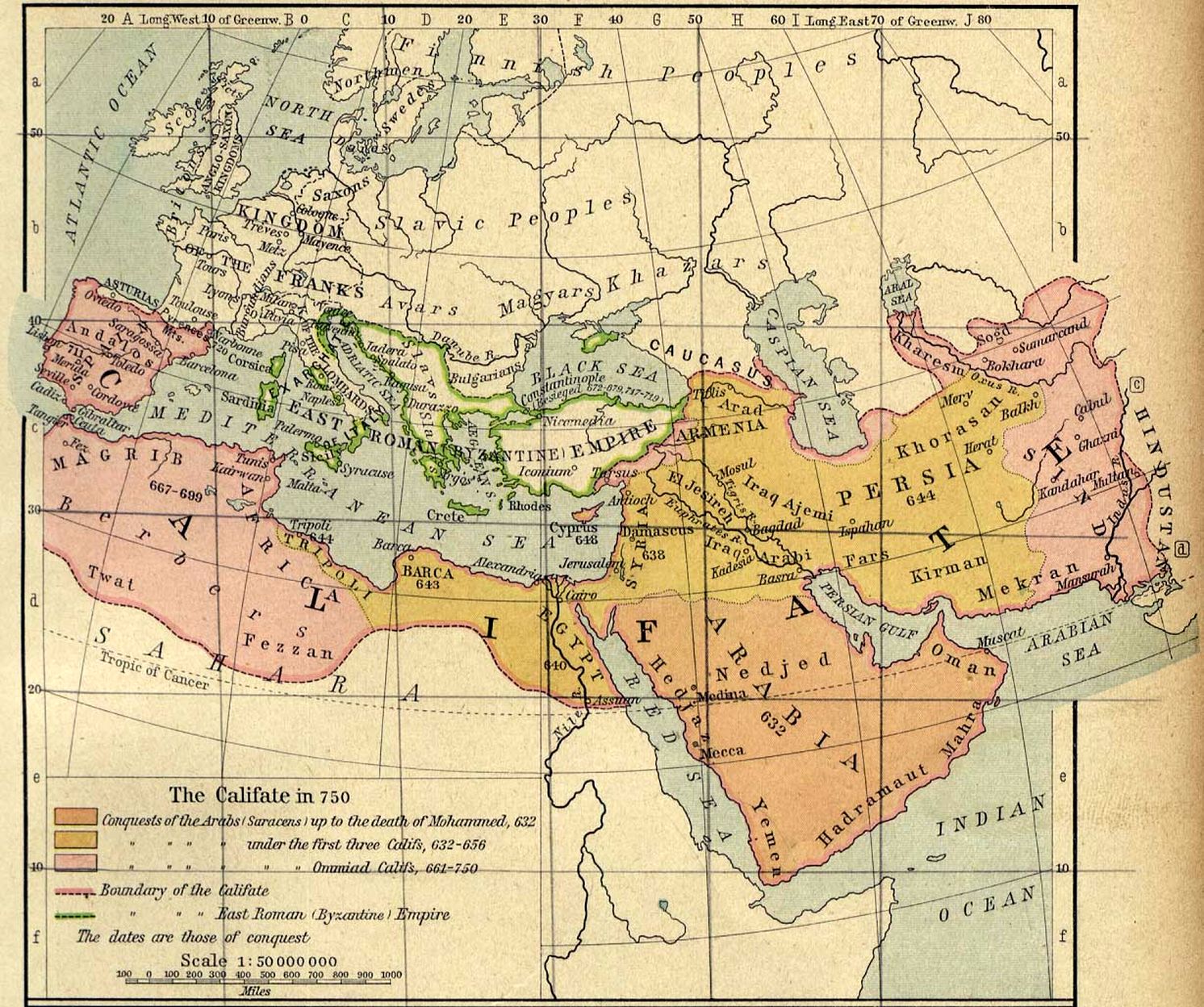 By the mid 600s, the first major change in Islamic caliphates happened: Ali, the last of the Rashidun Caliphs, was assassinated, and his son, Hasan, abdicated in favour of his father's rival, Muawiyah. The Umayyad Caliphs continued to expand the Caliphate, including our provinces of Afghanistan, coming from Khorasan to our west. 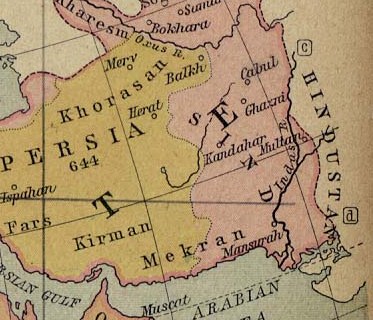 The Arab armies saw several military successes in the region, but didn't maintain a permanent presence. The Zunbils fought back against the Muslims in 698 and 700, leading to rousing successes both times. Upon seeing the Muslims push this far east, the Hindu ruler of Kabul, asked for help from the East and drove the Muslims as far west as Bost. The Ummayads, in turn, reconquered Kabul by 671, forcing the Kabul Shah to pay them tribute. As soon as the armies, having spent most of their time in the region raiding, left, the locals returned to worshipping local gods, including Zun in southern Afghanistan: "...in the east, in the mountains, cities submitted only to rise in revolt and the hastily converted returned to their old beliefs once the armies passed. The harshness and avariciousness of Arab rule produced such unrest, however, that once the waning power of the Caliphate became apparent, native rulers once again established themselves independent"  This was seriously the Abbasid banner. They had a revolution, and fought it under the black flag. While this back-and-forth continued in the east, in the west, the Umayyads lost enough control for the Abbasids, a dynasty that traced its lineage to one of Muhammad's uncles. This was pretty much a decadence revolt, with the Abbasids attacking the Umayyads' moral character. They had major support from non-Arab Muslims, who were considered second-class by the Umayyads. They won in 751. 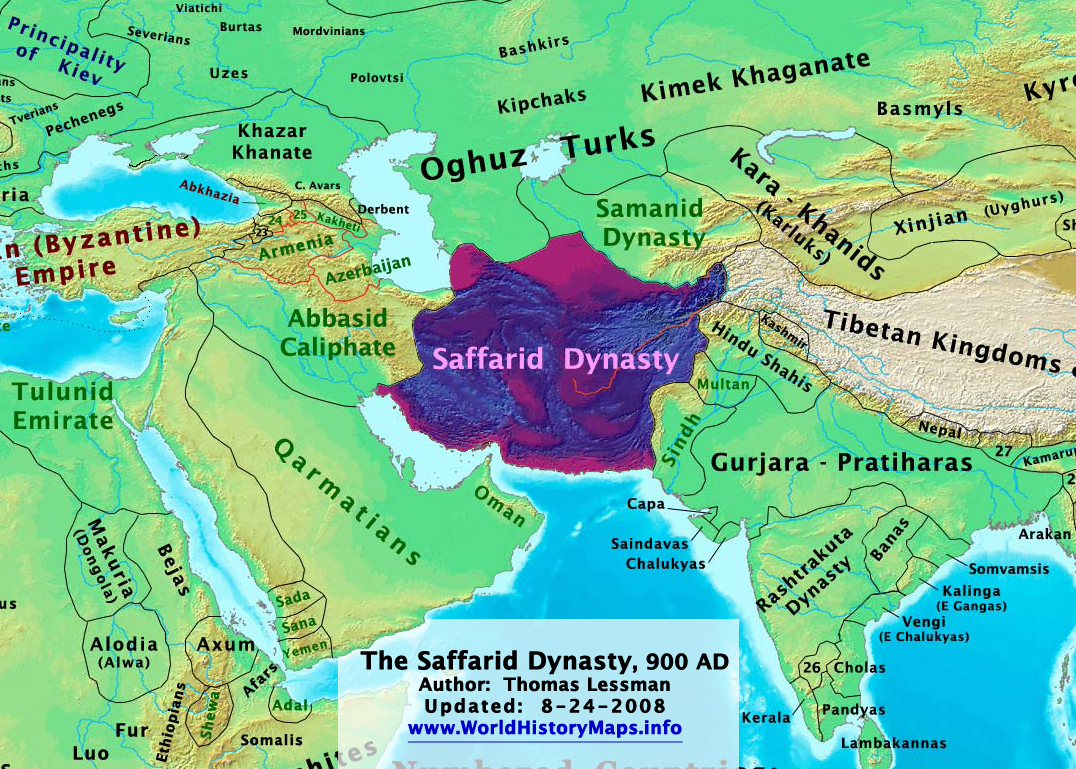 This show of weakness by the Caliphate gave rise to Ya'qub al-Saffar, a coppersmith. In mid-800s, he became the ruler of Zaranj, a city in western Afghanistan, and established the Saffarid dynasty. He was a pious Muslim, and renewed the Eastern conquest, taking both Zunbil territory and Kabul Shahs'. The Saffarids grew so bold that they attacked the Abbasid Caliphate, and marched on Baghdad. This was a big enough deal that the Caliph proclaimed the dynasty the rightful governors of the East. By this point, the Zunbils disappear as rulers, but sun-god worship remains. As before, holding territory does not mean converting the people. Sunni Islam spread, yes, but not enough so in what remained of Zunbil territory. The local religions stayed until at least the 11th century: "...it is said that various tribes of Afghans lived in the mountains in the west of India. Al Baruni adds that they were savage people and he describes them as Hindus." 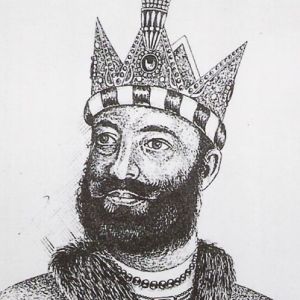 By this point, yet another local Sunni ruler built an empire. This time, it was Mahmud of Ghazni. He captured and held eastern Iran, Afghanistan and Pakistan. What's more important, is he that he worked on thoroughly Persianising the region. He encouraged mass conversions of all his subjects to Islam. He broke temples, including famously a temple in Somnath, western India, where he broke its lingam, and used it to built steps in front of his mosque. His dynasty was later displaced, of course, but the damage has been done. Although he maintained contracts with some Hindu rulers, at this point non-Muslims were a minority in Afghanistan. We will end today's vaguely historic ramblings here, on a bit of a downer note. But hey, although Zunism died, Afghan cultured absorbed Sunni Islam and survived, sometimes even thriving! TL;DR: After a lot of Muslim conquests by no less than four dynasties, Zunism disappeared after about 500 years of hiding in Southern Afghanistan mountains. It was a good run. Edit: Never mind! Turns out, if you squint really hard at a third-hand account of someone laying an ice burn on the Taliban, there are still Sun worshippers in Afghanistan! Now, I don't know if it's actually Zun or not, but hey, it just might be, and that's good enough for me narratively!
|
|
|
|
Film Update 2 - The Family Business In this update, Zere found himself in an interesting position. He was in charge of the family business: running Afghanistan, and he did a pretty drat good job of it, all things considered. He consolidated power in Kandahar, dealt with about 57 civil wars and minor threats, and continued his father's policy of expanding east. However, his biggest problem in running the family business was family. His nephew rebelled against him twice and his children tarnished the already lovely family name further. His brother stole from him, and two civil wars were started in his name. Zere had to figure out which part of "family business" was more important to him: the family or the business. His personal pride and ambition made him push towards keeping the dynasty power afloat, even if it meant pruning the family tree. For Zunbils to stay strong, Zunbils had to die.  So, at the suggestion of a friend of mine, the film recommendation for this update is The Godfather Part II, directed Francis Ford Coppola. The Godfather Part II deals with two simultaneous stories: Vito Corleone's rise to power after coming to the US; and Michael Corleone's struggle to keep his father's empire together and growing in a changing world.  Zere had to deal with people using Barha against him, and Michael had to deal with people using Fredo against him. Both have to make a choice about how to deal with the family getting in the way of business. Both are ruthless, pragmatic men. Both fulfil their fathers' dreams, and both outstrip them. As Hyman Roth said: "What we'll do in the next few months will make history. History. It's never been done before. Not even your father could dream that such thing is possible" The big difference is, of course, that The Godfather Part II is a fantastic movie, while this is an update of a mediocre LP. I do like the thematic coincidences like this, however, they're serendipitous. Plus, it tells two stories, separated by a long time, simultaneously, like this LP awkwardly tries to! Anyway, if you enjoy familial drama, crime movies, and just fantastic film in general, definitely check it out. Great acting all around, especially Al Pacino and Robert De Niro, and the direction is fantastic. Kayten fucked around with this message at 05:39 on Jul 27, 2015 |
|
|
|
Update 3 - Crossing the Indus The Caravan marches on, grim and silent. The old Afghan leads the way, their guide through this strange desert. After all, who else among them has been through a desert before? The rash younger man has learned his lesson. He sticks to the back of the group and keeps his mouth shut. He eyes the sun suspiciously. He doesn't know it like the Afghan does, but can see what he means by its wrath. In the distance, waves break on the shore. A young Frank sees some greenery to the north and yells "Water!" The Caravan picks up the pace, chattering in excitement, running as fast as they can in the mid-day sun in the desert. They settle around the oasis and decide to make camp early. The travellers chatter among themselves, filled with smiles as they refill their canteens and try desert fruit. ... Eventually, the sun inches its way to the horizon. The old Afghan faces the sunset, and holds his amulet, half-whispering in the old tongue. As soon as the sun is gone, he settles in with the others for his meal. The younger man can no longer wait.  : So, Elder, what happened to Zere? Did he take the east? : So, Elder, what happened to Zere? Did he take the east?The old Afghan laughs  : Not quite. Our people have a saying: If you wish to make Zun laugh, tell him about your plans. : Not quite. Our people have a saying: If you wish to make Zun laugh, tell him about your plans.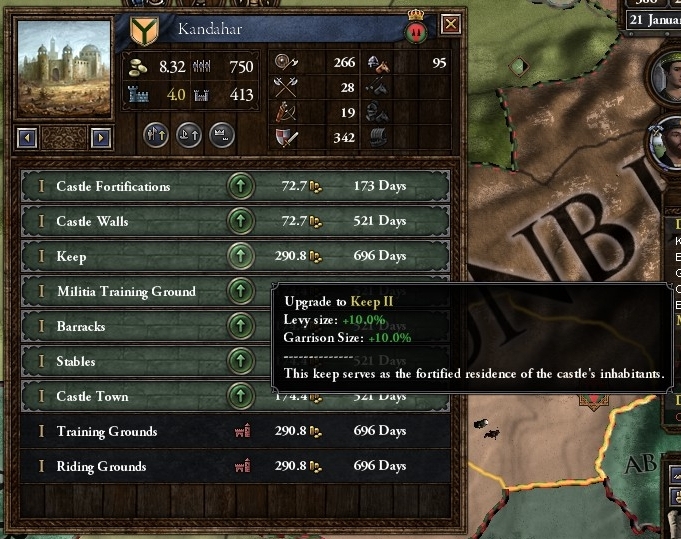  : Having grown the walls around Kandahar, Zere set out to work on the Sun Palace. The building itself was ancient. Even our fathers' fathers did not know when the first stones were laid. Zere decided it was time to make it grow in splendour like the palaces in Baghdad and Konstantinyye. : Having grown the walls around Kandahar, Zere set out to work on the Sun Palace. The building itself was ancient. Even our fathers' fathers did not know when the first stones were laid. Zere decided it was time to make it grow in splendour like the palaces in Baghdad and Konstantinyye.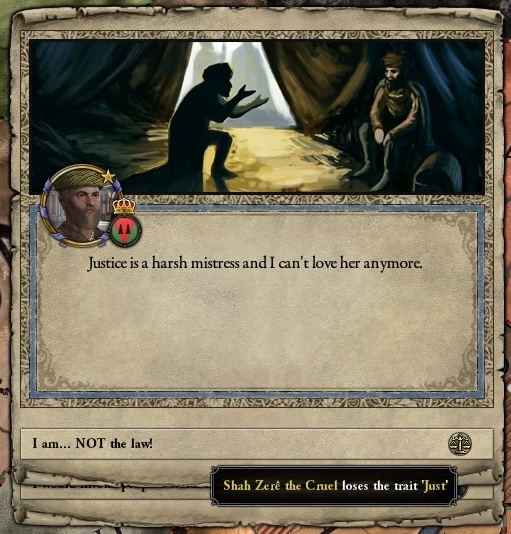  : The process was long and arduous. There were lying masons, and treacherous builders, and decorator assassins. After throwing the tenth one in the pits, Zere looked like he had lost the fire within him. : The process was long and arduous. There were lying masons, and treacherous builders, and decorator assassins. After throwing the tenth one in the pits, Zere looked like he had lost the fire within him.   : It was a difficult time for the Shah. You could see it in him when he cursed at his advisors, when his people were thrown in the pits. : It was a difficult time for the Shah. You could see it in him when he cursed at his advisors, when his people were thrown in the pits.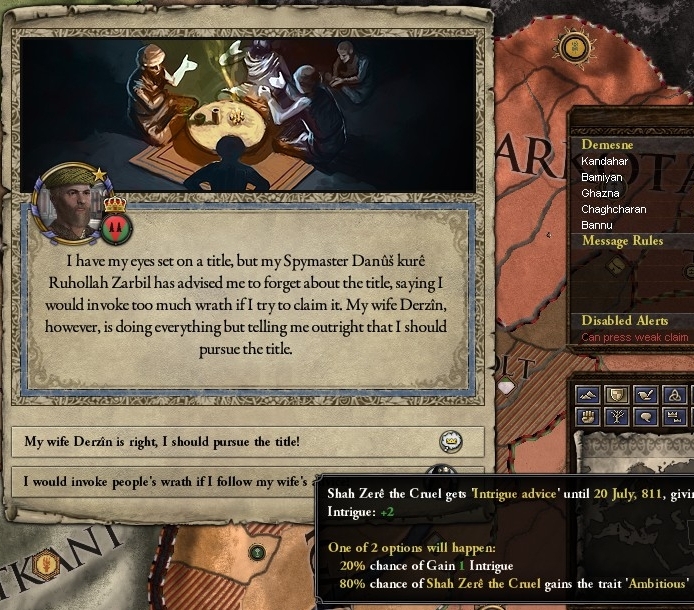  : He looked to the places in the realm not ruled by Zunbils - Farrah and Zaranj, and willed it not so. Was he not the Guardian of the Sun? Were Zunbils not the protectors of the Afghans? : He looked to the places in the realm not ruled by Zunbils - Farrah and Zaranj, and willed it not so. Was he not the Guardian of the Sun? Were Zunbils not the protectors of the Afghans? : His Spymaster, a great man of old age, talked to him much of the dangers of taking another noble's lands. His vassals had a right to their land, as they had for generations. : His Spymaster, a great man of old age, talked to him much of the dangers of taking another noble's lands. His vassals had a right to their land, as they had for generations.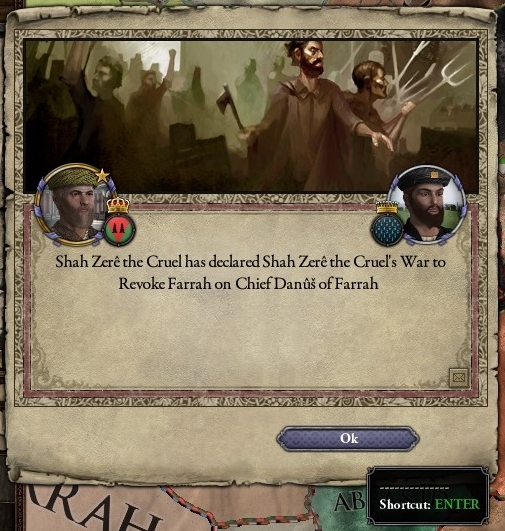  : He disappeared a week later. His wife, a frail blind woman, took up the post of Spymaster yet again. This time, she remained in Kandahar. Committed now, Zere marched us on our own lands as he did before. : He disappeared a week later. His wife, a frail blind woman, took up the post of Spymaster yet again. This time, she remained in Kandahar. Committed now, Zere marched us on our own lands as he did before.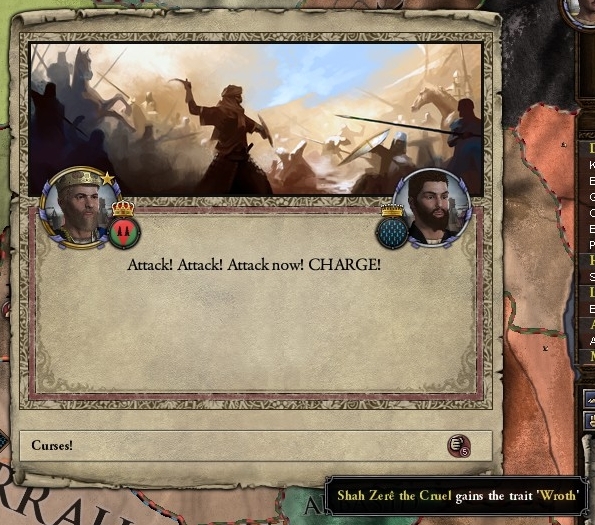  : The Shah lead us personally. He was the first one in the melee, and the last one to lay down his sword. We respected that in a man. You could see a new fire in him; and with every man he cut down, it grew ever bolder. : The Shah lead us personally. He was the first one in the melee, and the last one to lay down his sword. We respected that in a man. You could see a new fire in him; and with every man he cut down, it grew ever bolder.  : While in camps outside Farrah, we have heard rumours from the western sellswords. They said the people of Mohammed in the far west were locked in bitter battle, a holy war over reading their holy book. : While in camps outside Farrah, we have heard rumours from the western sellswords. They said the people of Mohammed in the far west were locked in bitter battle, a holy war over reading their holy book.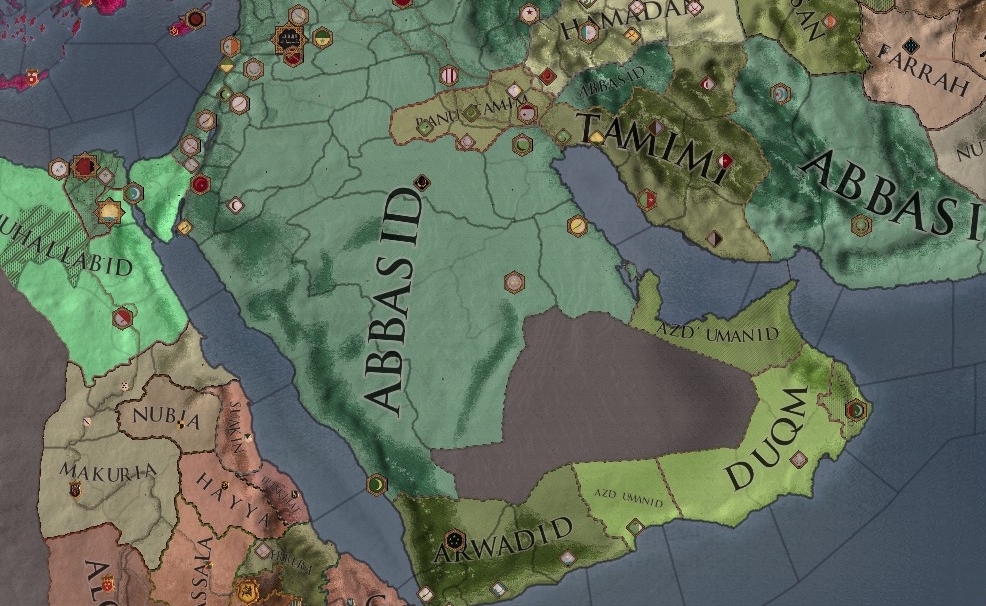  : The Muslims to the East were not faring much better. The Abbasid family has grown large and decadent. They dined on fine birds and let the wine flow as their people suffered. Many satraps far from Baghdad ruled themselves now, saying the Caliph had power over their souls, but not their realms. : The Muslims to the East were not faring much better. The Abbasid family has grown large and decadent. They dined on fine birds and let the wine flow as their people suffered. Many satraps far from Baghdad ruled themselves now, saying the Caliph had power over their souls, but not their realms.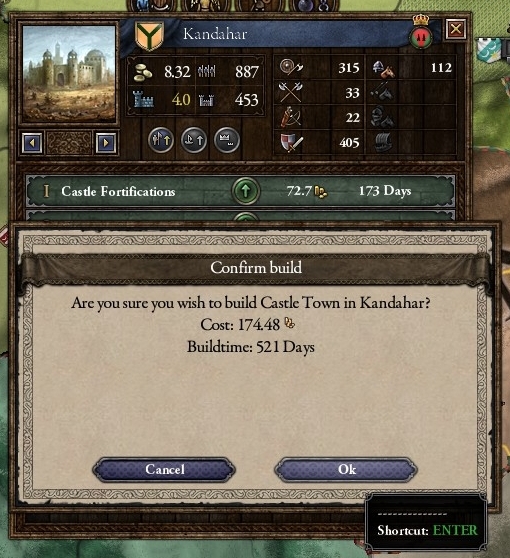  : So we saw many of these Muslims go East and settle in our cities. Many chose Kandahar for its splendour. So many, in fact, that Zere had to build more homes for the new Muslims. : So we saw many of these Muslims go East and settle in our cities. Many chose Kandahar for its splendour. So many, in fact, that Zere had to build more homes for the new Muslims.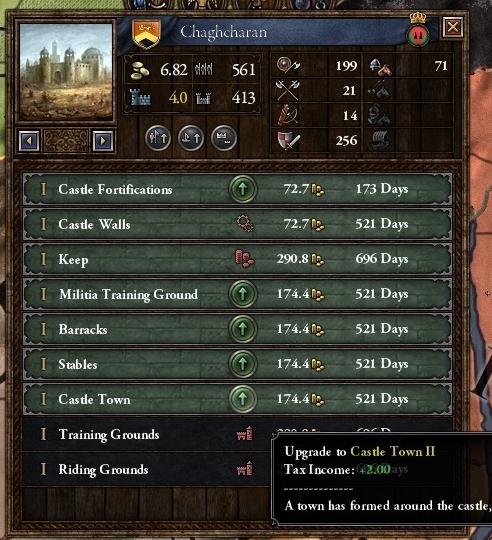  : Others settled in Chagcharan, where Zere gave them more homes still. : Others settled in Chagcharan, where Zere gave them more homes still.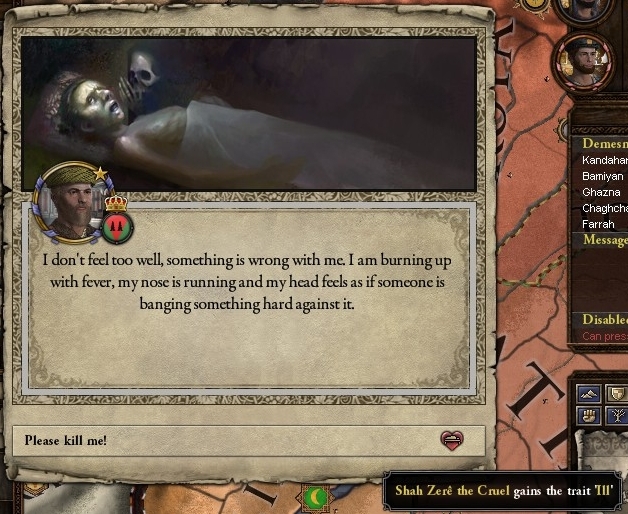  : But after Zere took Farrah for himself, he felt the wrath of the Justice Giver, as his father before him. He was struck by a sudden sickness, and stayed in his bed for weeks. : But after Zere took Farrah for himself, he felt the wrath of the Justice Giver, as his father before him. He was struck by a sudden sickness, and stayed in his bed for weeks.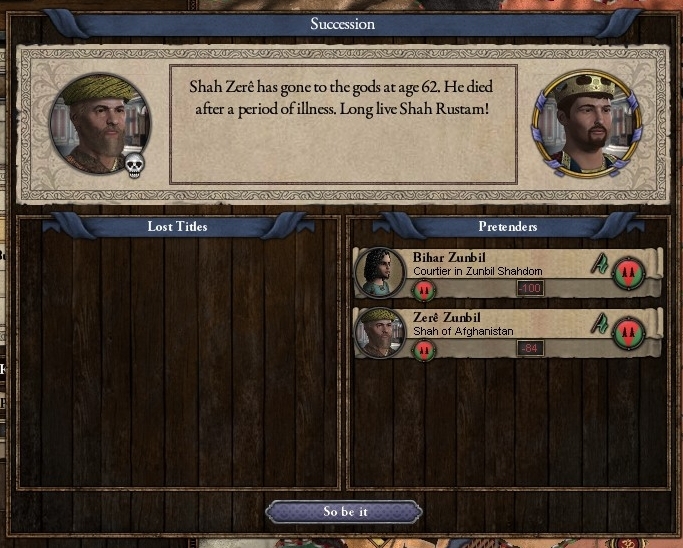  : The sickness did not let go. I do not know if Zere went on to sit by Zun's throne, or if he fell to the Darkness' domain, and breaks men with her now. Not even the Elders know that much. : The sickness did not let go. I do not know if Zere went on to sit by Zun's throne, or if he fell to the Darkness' domain, and breaks men with her now. Not even the Elders know that much.  : Rustam was Shah now. A cruel man, he killed his first wife. The castle guards spoke that they could hear his second wife's screams echo through the dungeons still. Yet none could deny that he gave his heart to the Justice Giver, and none prayed as often or as vigorously as him. : Rustam was Shah now. A cruel man, he killed his first wife. The castle guards spoke that they could hear his second wife's screams echo through the dungeons still. Yet none could deny that he gave his heart to the Justice Giver, and none prayed as often or as vigorously as him.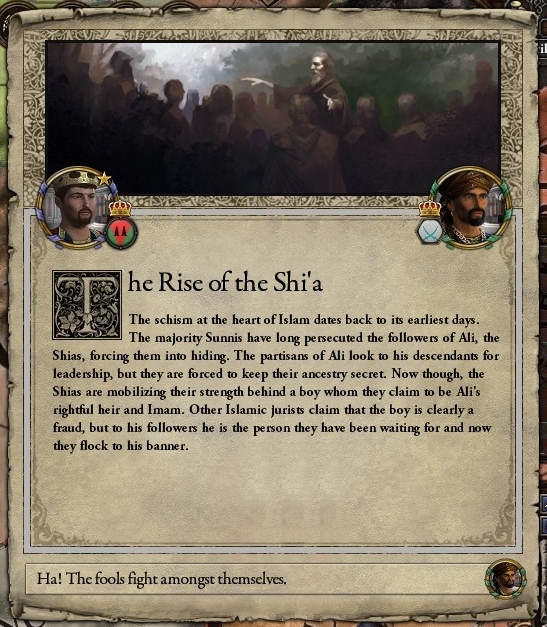  : As Rustam ascended to the Sun Throne, the Muslim holy war in the far west grew. Smaller kingdoms throughout Africa took up their arms for the boy Caliph that misread their books. : As Rustam ascended to the Sun Throne, the Muslim holy war in the far west grew. Smaller kingdoms throughout Africa took up their arms for the boy Caliph that misread their books.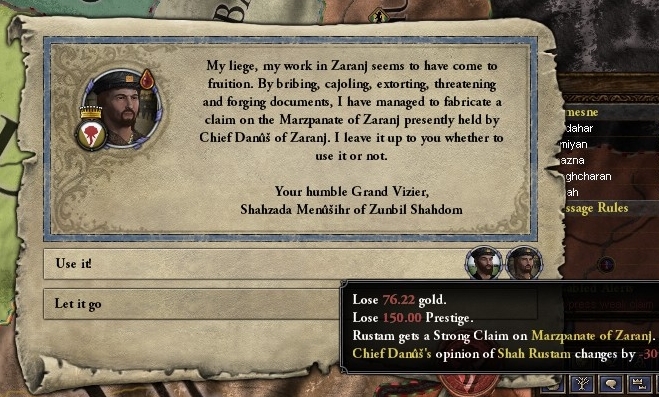  : In honour of his father, Rustam fought for Zunbil reign over Zunbil lands. He ordered a small army, a mere few hundred, west to Zaranj, where the last non-Zunbil sat in fear. : In honour of his father, Rustam fought for Zunbil reign over Zunbil lands. He ordered a small army, a mere few hundred, west to Zaranj, where the last non-Zunbil sat in fear.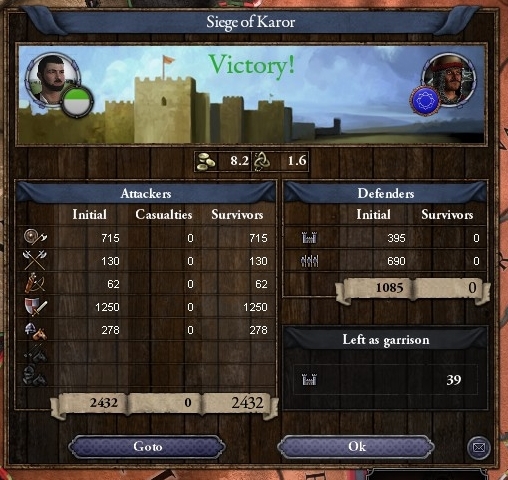  : But this was not the real war. The real war was in the east. The rest of the faithful took up arms and marched east, to Karor, a small castle on the great Indus river. Yet another castle that brought us ever closer to the Multan and its holiest of Sun Temples. : But this was not the real war. The real war was in the east. The rest of the faithful took up arms and marched east, to Karor, a small castle on the great Indus river. Yet another castle that brought us ever closer to the Multan and its holiest of Sun Temples.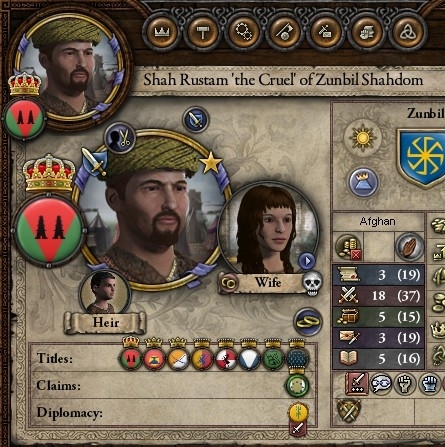  : A few weeks into our march, we got word that Rustam's second wife has passed. It seems she did not appreciate the desert as much as he had hoped. The pits were an awful place for even the strongest of young men, let alone a frail woman from the north. With this news, people once again drank in the inns at night, whispering about the cruel Zunbil on the Sun Throne. He was very much his father's son. : A few weeks into our march, we got word that Rustam's second wife has passed. It seems she did not appreciate the desert as much as he had hoped. The pits were an awful place for even the strongest of young men, let alone a frail woman from the north. With this news, people once again drank in the inns at night, whispering about the cruel Zunbil on the Sun Throne. He was very much his father's son.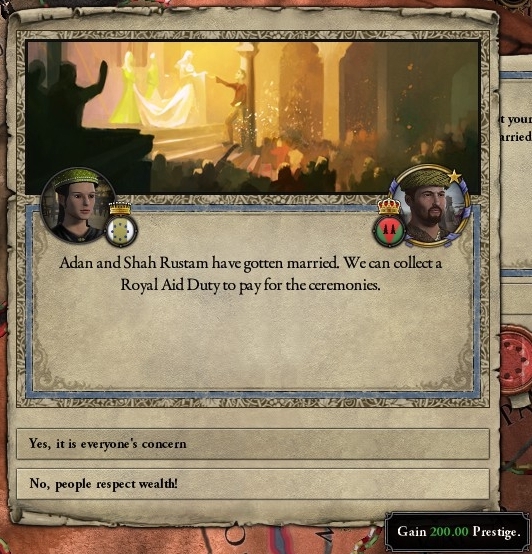  : Rustam quickly remarried to a beautiful girl from the Steppes. It was the greatest wedding I've ever seen from my post. I do not know how much it cost, but I do know that he paid for all of it. His name followed him, and he tried to cleanse it. : Rustam quickly remarried to a beautiful girl from the Steppes. It was the greatest wedding I've ever seen from my post. I do not know how much it cost, but I do know that he paid for all of it. His name followed him, and he tried to cleanse it.  : Cruel he was, yes, but, just like father, he spoke with fervour on the Justice Giver and his laws. : Cruel he was, yes, but, just like father, he spoke with fervour on the Justice Giver and his laws.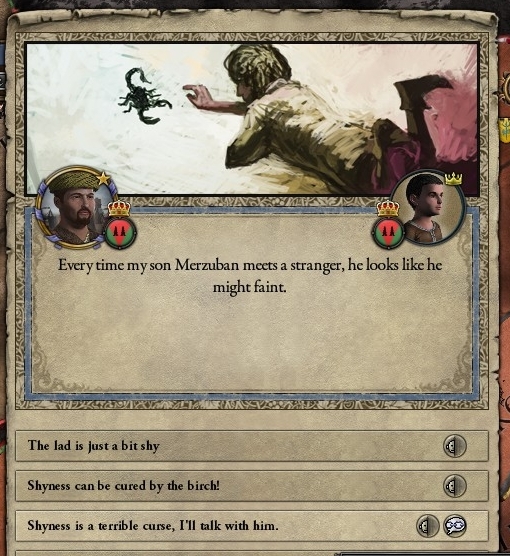  : Unlike his father, though, he took great interest in teaching his children to be better Zunbils. All of them, not just his heir. : Unlike his father, though, he took great interest in teaching his children to be better Zunbils. All of them, not just his heir.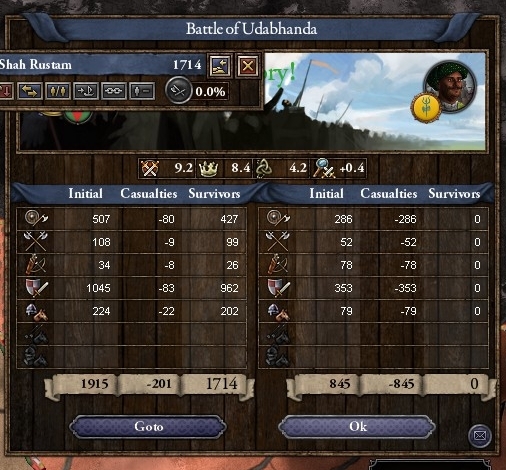  : Our march east was slowed down by the small force that the Hindus could muster. We left none alive. : Our march east was slowed down by the small force that the Hindus could muster. We left none alive.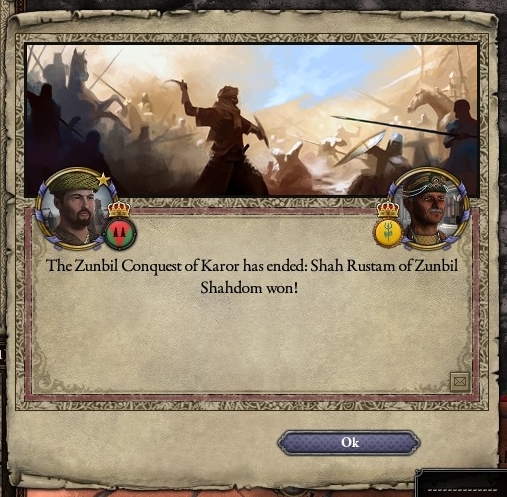  : With his forces broken, and Karor flying our banner, the Maharaja had no choice but leave the castle to us. Multan drew ever closer. : With his forces broken, and Karor flying our banner, the Maharaja had no choice but leave the castle to us. Multan drew ever closer. : There is something about Rustam I avoided speaking on. He was my lord, you see, like many before him, and many after, but I did not take well to him. He waged war, of course, all Zunbils did, but never from the front, never with a sword in his hands. His father, cruel as he was, was still a brave man, charging into battle with us. Rustam sent his commanders to do his bidding, and bark his orders, while he moved wood pieces on maps, hiding behind his walls. : There is something about Rustam I avoided speaking on. He was my lord, you see, like many before him, and many after, but I did not take well to him. He waged war, of course, all Zunbils did, but never from the front, never with a sword in his hands. His father, cruel as he was, was still a brave man, charging into battle with us. Rustam sent his commanders to do his bidding, and bark his orders, while he moved wood pieces on maps, hiding behind his walls.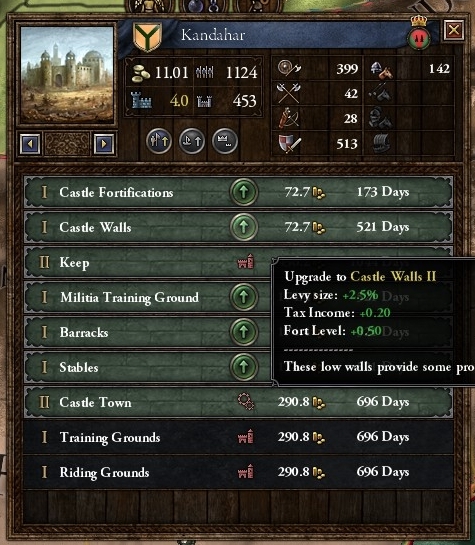  : Sometimes, his walls needed to grow bigger. Coward. : Sometimes, his walls needed to grow bigger. Coward.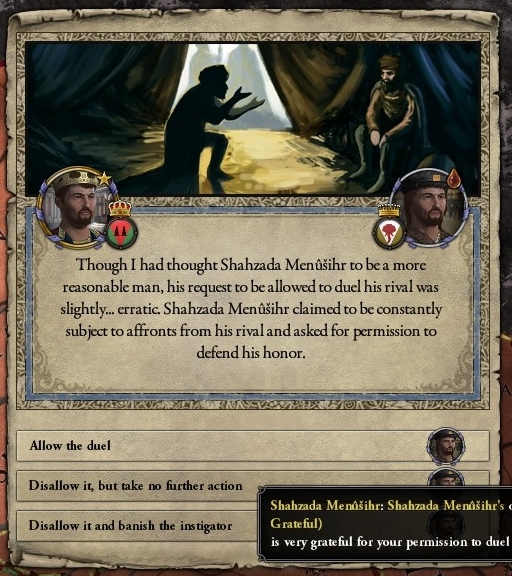  : He never fought himself, but he loved watching others do it for him. He attended a great many duels of his many cousins, nephews and uncles, watching with glee as cold steel carved up warm flesh. : He never fought himself, but he loved watching others do it for him. He attended a great many duels of his many cousins, nephews and uncles, watching with glee as cold steel carved up warm flesh.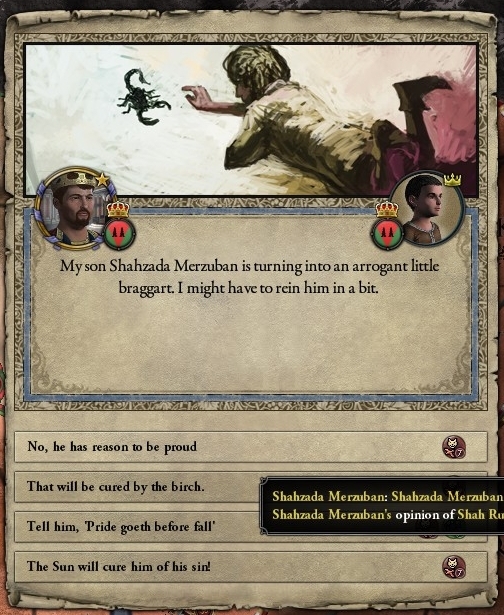  : He thought this pure. He thought this the height of Zunbil reign. He was proud, and taught his children to be proud as well. A blight on Zunbils! : He thought this pure. He thought this the height of Zunbil reign. He was proud, and taught his children to be proud as well. A blight on Zunbils!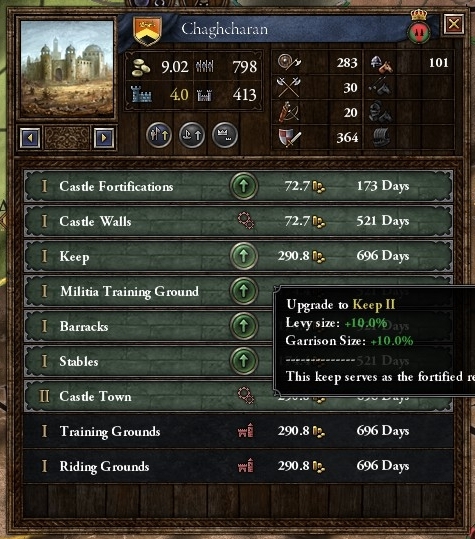  : Building walls while his men died in his name. : Building walls while his men died in his name.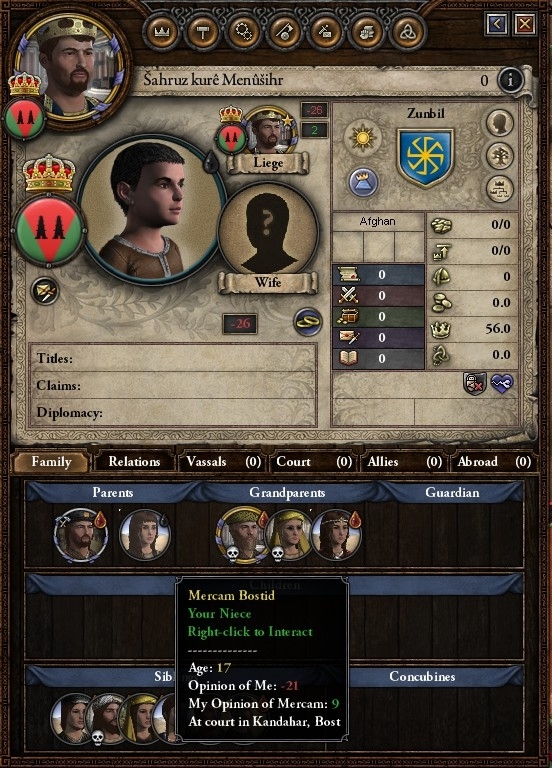  : And his blight spread to other Zunbils. Rustam's brother and sister had a daughter some years back. As we were sieging one Zun-forsaken castle or another, we heard that his brother, and his daughter-niece had a child. An awful boy, a disfigured monster, with Darkness coursing through his veins. : And his blight spread to other Zunbils. Rustam's brother and sister had a daughter some years back. As we were sieging one Zun-forsaken castle or another, we heard that his brother, and his daughter-niece had a child. An awful boy, a disfigured monster, with Darkness coursing through his veins.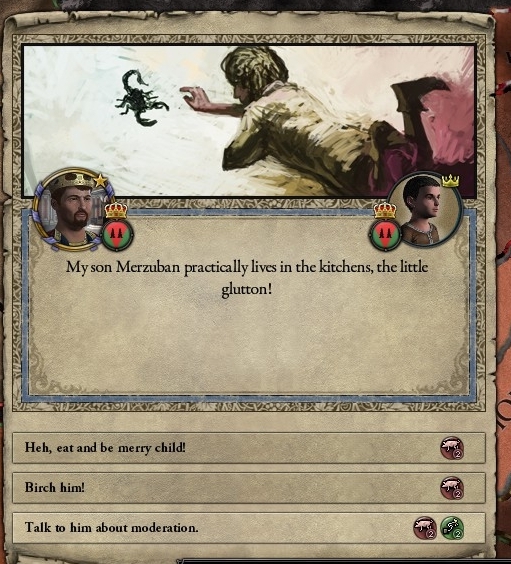  : I do not know if Rustam knew about this. He only had eyes for his own flesh and blood. : I do not know if Rustam knew about this. He only had eyes for his own flesh and blood.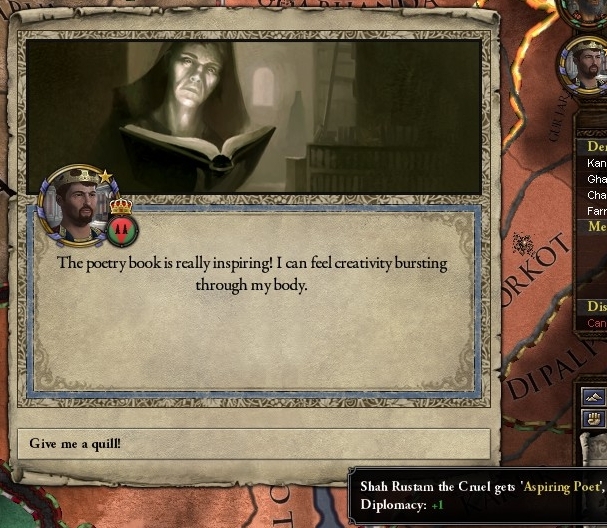  : It was then that he started writing about them. Poems about a father's duties, and Zun as our people's father, all that nonsense. : It was then that he started writing about them. Poems about a father's duties, and Zun as our people's father, all that nonsense.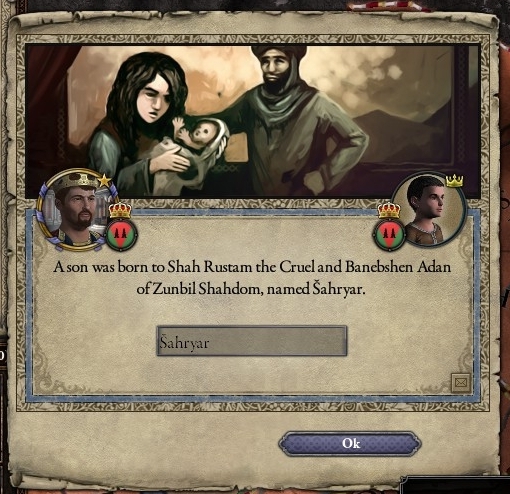  : He had more children to teach. More blighted Zunbils. : He had more children to teach. More blighted Zunbils.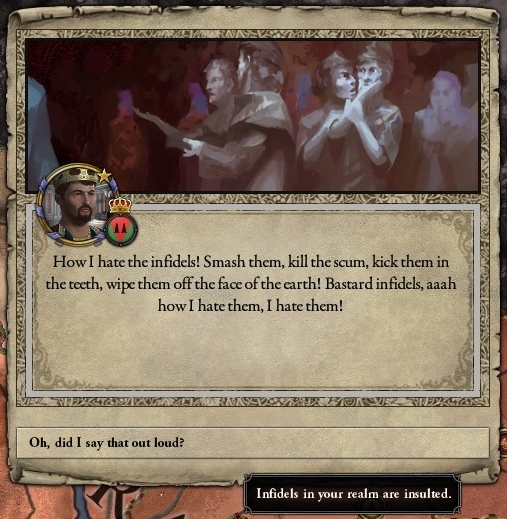  : A zealous man, Rustam. Wrote a great many speeches on the dangers of the infidel. Said them with infidels at court, too. : A zealous man, Rustam. Wrote a great many speeches on the dangers of the infidel. Said them with infidels at court, too.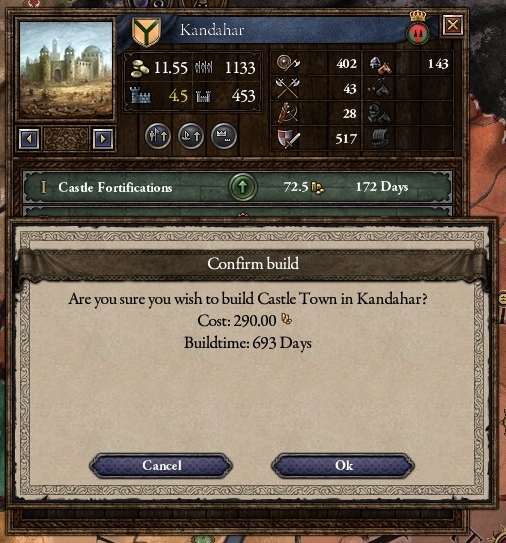  : But despite his babbling, the Muslims kept coming. Kandahar grew still. : But despite his babbling, the Muslims kept coming. Kandahar grew still.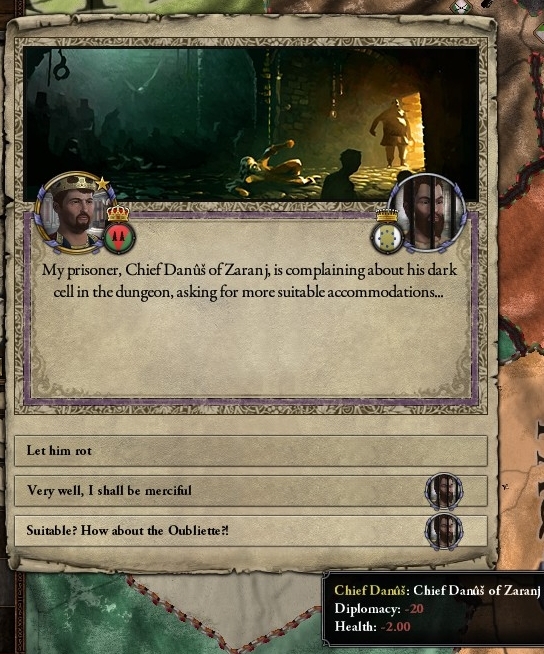  : Rustam, like Zere before him, enjoyed the small cells beneath the Sun Palace called oubliettes. He claimed it showed the face of Darkness to those that wronged him. : Rustam, like Zere before him, enjoyed the small cells beneath the Sun Palace called oubliettes. He claimed it showed the face of Darkness to those that wronged him. 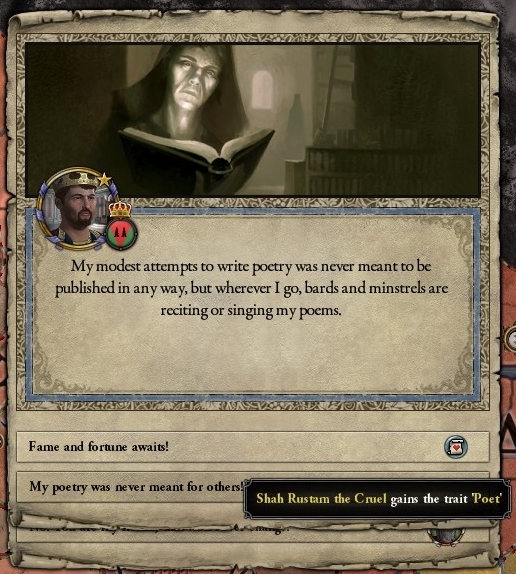  : Somehow, his verses on fatherhood eternal caught on. There was scarcely a bard in the land that did not sing his words. : Somehow, his verses on fatherhood eternal caught on. There was scarcely a bard in the land that did not sing his words.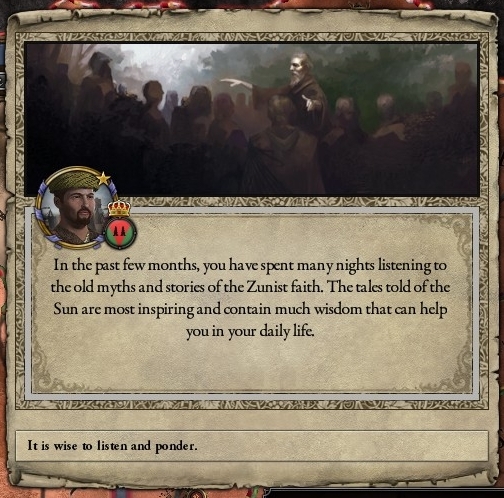  : And yet, he did not venture from Zun. His faith was strong. : And yet, he did not venture from Zun. His faith was strong.  : Those were his days. Teaching his children, writing verses, and whispering orders to pigeons. : Those were his days. Teaching his children, writing verses, and whispering orders to pigeons.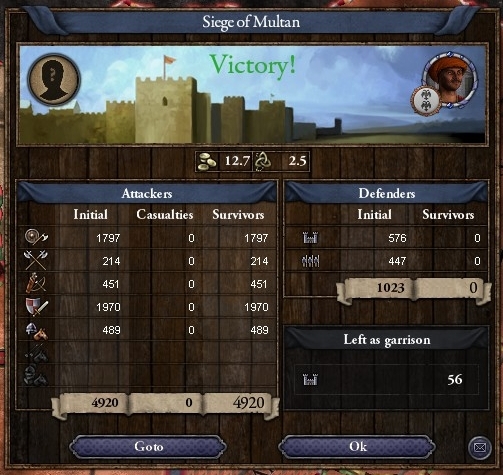  : So as this cowards wrote poems and preached of Zun to his children, we marched ever east. We marched east, and we took Multan as our own. : So as this cowards wrote poems and preached of Zun to his children, we marched ever east. We marched east, and we took Multan as our own.  : Finally, the third Sun Temple was ours. And it was beautiful, young one. : Finally, the third Sun Temple was ours. And it was beautiful, young one.  : You could step into the halls and feel Zun's presence. Feel his radiant glow, his nurturing warmth. If you closed your eyes, the many fires still burned, and you could not escape His light. The air smelled of saffron through the night, keeping the Darkness where she belonged. : You could step into the halls and feel Zun's presence. Feel his radiant glow, his nurturing warmth. If you closed your eyes, the many fires still burned, and you could not escape His light. The air smelled of saffron through the night, keeping the Darkness where she belonged.  : I stayed there. I surrendered my arms, and took the vows. : I stayed there. I surrendered my arms, and took the vows.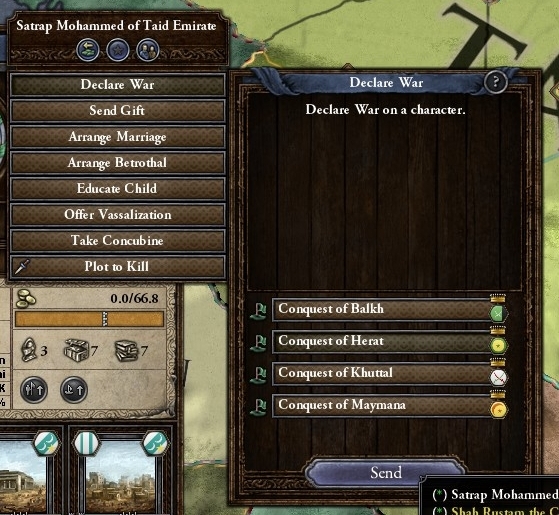  : When Rustam gave order to march north, to take lands from the Taids, I worked in the temple. I cleaned. I built. I learned the prayers of the Elders. : When Rustam gave order to march north, to take lands from the Taids, I worked in the temple. I cleaned. I built. I learned the prayers of the Elders.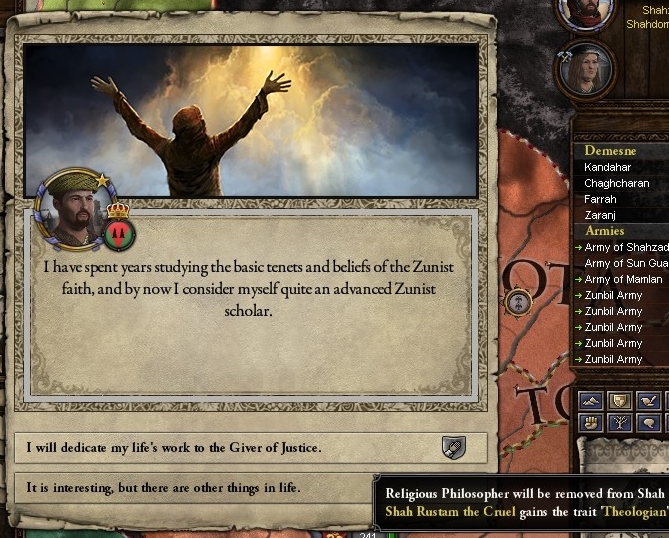  : As the Elders of the East named me one of their own, I have heard news from Kandahar. Rustam has written proclamations of a holy war eternal, and named all infidels the warriors of Darkness. The Elders of the West heard this, and for this they named him Elder. An Elder! After forty summers! : As the Elders of the East named me one of their own, I have heard news from Kandahar. Rustam has written proclamations of a holy war eternal, and named all infidels the warriors of Darkness. The Elders of the West heard this, and for this they named him Elder. An Elder! After forty summers!  : An Elder that marched to war, again and again. An Elder with Darkness in his family's blood! He was no preacher of the Justice Giver! He was no Blessed of Zun! He was nothing but a man blinded by ambition! : An Elder that marched to war, again and again. An Elder with Darkness in his family's blood! He was no preacher of the Justice Giver! He was no Blessed of Zun! He was nothing but a man blinded by ambition!The old Afghan shakes, lost in his memories, enraged at a man who's been dead for six hundred years. The younger man approaches him, and gently holds him by the shoulders.  : That's alright, Elder. That's enough stories for tonight. : That's alright, Elder. That's enough stories for tonight.The old Afghan stops shaking, and looks in the younger man's eyes. For a moment, he doesn't recognize his travelling companion. He does not know where he is. But he takes a breath, and comes back from his memories. He remembers the younger man, and the desert. He knows what he did. He knows why he wanders.  : Yes, of course. Come, let us rest. There is always a tomorrow. : Yes, of course. Come, let us rest. There is always a tomorrow.The old Afghan wanders over to his tent, reliving the pain with each step. He thinks of Rustam, and his sons, and the Third Temple, and the desert. And of Zun. He always thinks of Zun.
|
|
|
|
History Update 3 - A Cavalcade of Rulers Last time, we talked about how Islam finally spread to Afghanistan, and how Muhmad of Ghazni ensured it stayed that way. Today, we're gonna look at how Afghanistan fared since. By the time of Mahmud's death, several lasting reforms underwent his empire. It was pretty thoroughly Persianized, and his own people, the Nasher tribe, became nobility that lasted in some form until the Soviet invasion in 1979. During his conquests, he brought Islam to a small tribe called Ghurids, who embraced it, but not the Ghaznavid rule. After Mahmud died, he left his empire to his two sons. As usual, a civil war for the throne happened, after the younger brother, Mas'ud, asked for some land that he has rightfully conquered, and was refused. The winner imprisoned his brother, Mohammed, and blinded him soon after. He tried to hold on to all of his father's lands, and failed pretty miserably. To the west, the Seljuks were rising, and after a disastrous battle in 1040, they took the Persian land from him. This turn of events did not please his army, who declared his blind brother king, and threw Mas'ud in the dungeon, where later "died in suspicious circumstances". This kicked off a few succession crises that lasted until the last Ghaznavid king, who lost the kingdom to the Ghurids in 1186. The Ghurids lasted until 1215, when they were taken over by the Khwarezmids. Their biggest contribution in such a short reign was spreading Islam further east, into India. Interestingly enough for us, they captured and held Multan in 1175, strengthening Afghan rule over the Sun Temple. We're only 300 years early! The Khwarezmids were Turks (Mamluks, even) that started off as the Seljuk's vassals. They eventually took advantage of a succession crisis, and took over much of their territory, including western Afghanistan. They lasted until 1220, when the Mongols came. The Mongols need their own update,what with the IlKhanate, and the Timurids, so we will probably cover them next time. TL;DR: No one seems to be able to hold on to Afghanistan for more than 200 years.
|
|
|
|
Film Update 3 - The Third Temple So, for this and the next update, we're going to do something a little different. We're going to talk about one film over two updates, since it's pretty long, and the two updates will be thematically similar. So let's talk about Kingdom of Heaven. A quick notice, we will be discussing the Director's cut, it's much longer (45 minutes of extra footage), bringing the whole thing to a pretty long 194 minutes overall. Seriously, it's the only version worth watching, if you have the time. Kingdom of Heaven is a semi-historical epic directed by Ridley Scott that deals with the life of Baron Ibelin. A bastard son of a noble who was granted a barony in the Holy Land during the crusades, he travels to Jerusalem and gets involved with court intrigue and war with the Saracens. The film deals with loyalty, self-discovery, and the crossroads of faith and politics. It's got some great performances, notably Edward Norton, who plays a leper king and never once shows his face. As with most Ridley Scott films, it's visually gorgeous, with some slow, beautiful wide shots.  The first half deals with Balian discovering his true origins, and dealing with the consequences of being thrust in a world he doesn't understand. He does so in the holiest of holies to him (and much of Christendom). The film takes great pains to show the value of Jerusalem to the characters, both Muslim and Catholic: it is a holy city, worth far more than the stones it's built with. Our update deals with the Afghan realizing his place in the world. He is no longer a simple warrior, carrying a sword for the Zunbils. He has to figure out who he owes loyalty to: the Zunbils, or Zun, or whether those two could ever be truly separated. He's only able to figure out his doubts once he sets foot in a holy temple, where everything finally becomes clear for him. Stay tuned for the next update, when we will deal with proper holy wars, Muslim warriors, and grace in defeat.
|
|
|
|
This LP is amazing. I have nothing substantial to add. It's just excellent stuff.
|
|
|
|
DivineCoffeeBinge posted:This LP is amazing. I second this as well, I don't post, but I think it's quite good!
|
|
|
|
I really like the format of updates next to historical context and relevant film synopses.
|
|
|
|
Add me to the list of folks who think this is great. The updates are very cool and well-written, and then the history posts are also excellent, and of particular interest to me since you could drive a truck through the holes in my knowledge of central Asian history.
|
|
|
|
Thanks for the kind words, everyone! Any feedback is appreciated. I had some time to kill today, so the next update should be up in a few hours.
|
|
|
|
Another excellent CK2 LP. Wish I had something more to say.
|
|
|
|
Update 4 - The Boy Kings of Afghanistan The Caravan marches on, determined as ever. The Old Afghan leads the travellers towards the sound of the waves beyond the horizon. The travellers chat excitedly, reinvigorated after their stay at the oasis. The younger man stands on a dune and looks back. The oasis is invisible now, and nothing remains other than a slight glimmer close to the horizon. He is unsure if the glimmer is the water, or just another one of the desert's many tricks. He stands there for a few minutes, wondering if the oasis existed when no one was looking at it. He sighs, and falls in with the rest of the Caravan. ... The Old Afghan decides to set up camp, and the travellers get to work. He follows the sun with his eyes, but says no prayer this time. Just before it hides behind the horizon, he says one word.  : Why? : Why?... The fires are lit, and the travellers chat about their homelands in high spirits. The desert fruit they picked at the oasis are passed around and slowly savoured. The Old Afghan sits, staring into the fire, lost in his memories. He hears the young man sit down next to him, but looks straight ahead.  : How long have you travelled with us, young one? : How long have you travelled with us, young one? : Five years, Elder. : Five years, Elder.The Afghan sighs.  : I used to keep count like you, you know. A mark for every week. : I used to keep count like you, you know. A mark for every week.He rolls up his sleeve. There are thousands of small marks going down the old man's arms. They cover everything up to his wrists.  : One day, there was no room left. We came upon a mountain range that day, and made camp, as we do now. And on that day, I looked at the horizon as the sun set, and I spoke to the Justice Giver. For the first time in eighty years, I spoke to him. Do you know what he said to me that day? : One day, there was no room left. We came upon a mountain range that day, and made camp, as we do now. And on that day, I looked at the horizon as the sun set, and I spoke to the Justice Giver. For the first time in eighty years, I spoke to him. Do you know what he said to me that day? : Nothing. : Nothing.The Afghan looks at his amulet.  : I stopped counting that evening. : I stopped counting that evening.The two men stare into the campfire, thinking their travels.  : Forgive an old man his ramblings. Come, let me tell you more of Zunbils. : Forgive an old man his ramblings. Come, let me tell you more of Zunbils.  : The thrice-accursed Rustam, may The Darkness consume him, fed the ground soon after being named Elder. His son, the young Ferzad, sat upon the Sun Throne. : The thrice-accursed Rustam, may The Darkness consume him, fed the ground soon after being named Elder. His son, the young Ferzad, sat upon the Sun Throne.  : The coronation of the young Shah happened in winter. The mountains were harsh to the child, and he coughed blood for weeks after. : The coronation of the young Shah happened in winter. The mountains were harsh to the child, and he coughed blood for weeks after.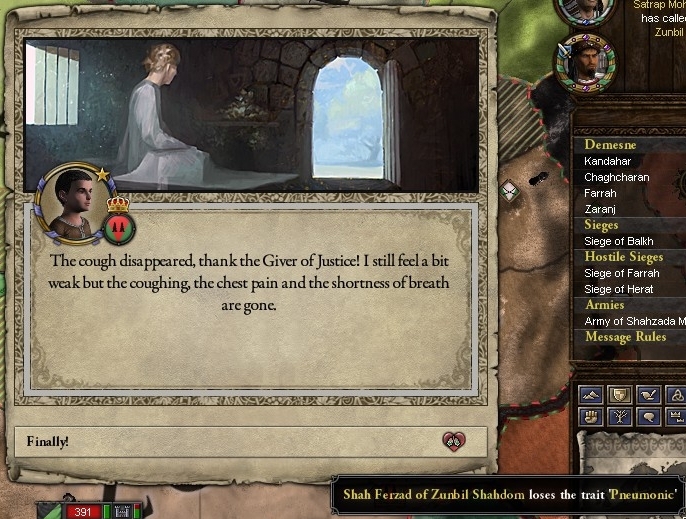  : But Zun was kind to the child. It was not yet his time. : But Zun was kind to the child. It was not yet his time. 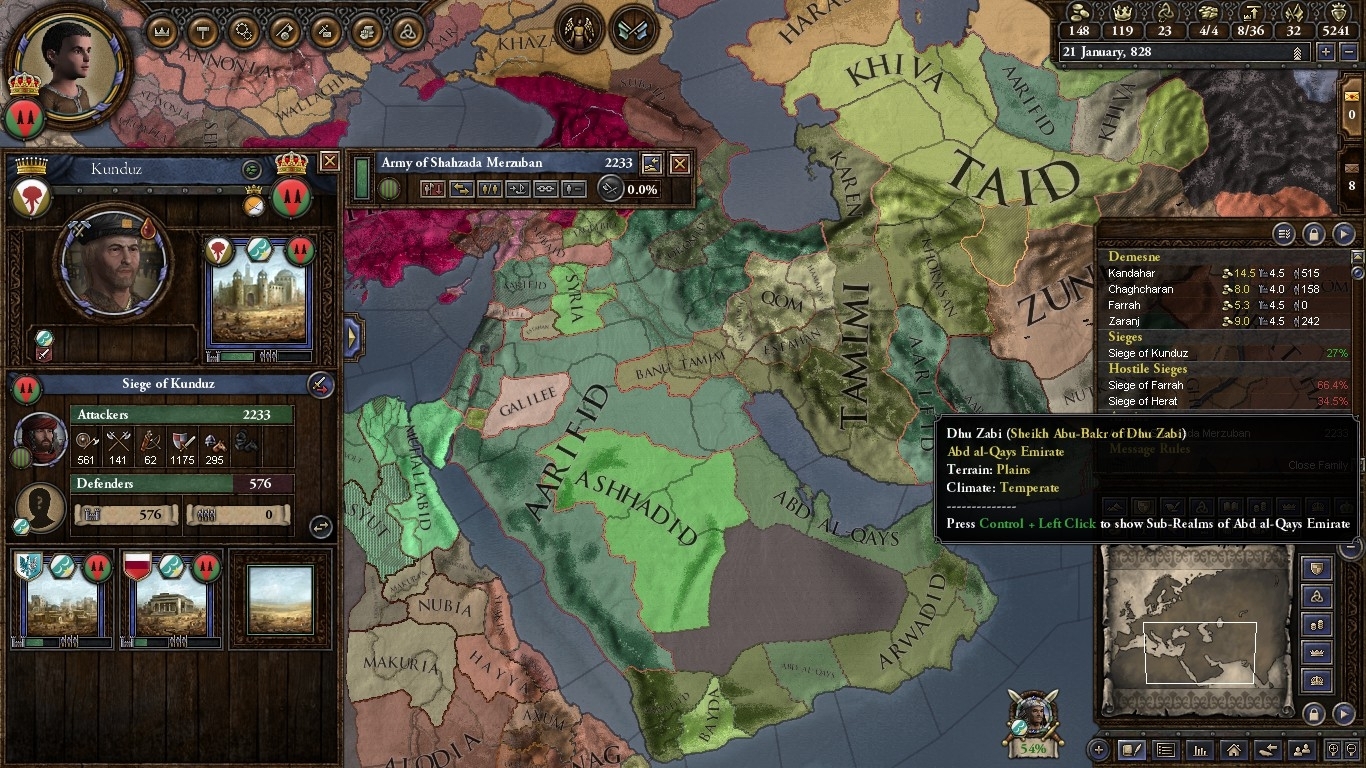  : Our eternal enemies, the dreaded Abbasid Caliphs drew their last breath. A new family ruled the Mohammetans, the Aarifids. The Elders at the Great Western Sun Temple at Bost proclaimed this a blessing from the Justice Giver. : Our eternal enemies, the dreaded Abbasid Caliphs drew their last breath. A new family ruled the Mohammetans, the Aarifids. The Elders at the Great Western Sun Temple at Bost proclaimed this a blessing from the Justice Giver.  : The Eastern Elders did not agree. The Buddha-worshippers gathered a great army, and swore to take Multan from the faithful. : The Eastern Elders did not agree. The Buddha-worshippers gathered a great army, and swore to take Multan from the faithful.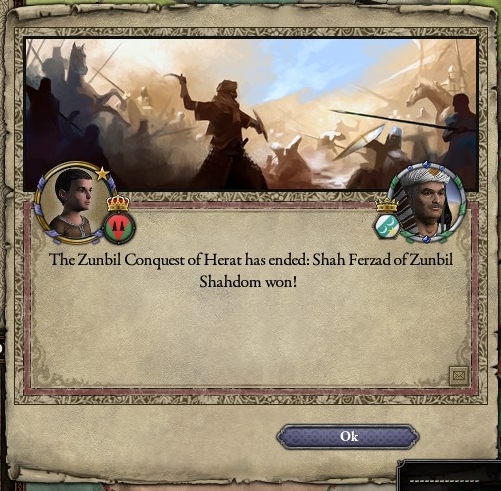  : The armies Rustam sent north returned victorious. We took more land from sons of Zarathustra, and sent the faithful there to spread the word of Zun. The armies had no more than two days' rest before they marched east, to face the Buddhists. : The armies Rustam sent north returned victorious. We took more land from sons of Zarathustra, and sent the faithful there to spread the word of Zun. The armies had no more than two days' rest before they marched east, to face the Buddhists.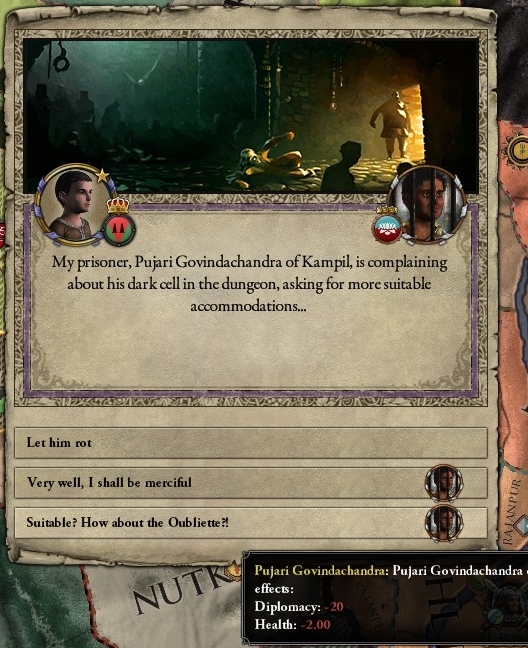  : The young Ferzad was his father's son in all things. A cruel boy, he loved his oubliettes, and his pits. : The young Ferzad was his father's son in all things. A cruel boy, he loved his oubliettes, and his pits.  : And like his father, he raised the walls in Kandahar. : And like his father, he raised the walls in Kandahar. : I have never again seen the great capital up close, but I have heard travellers' tales. They say that at mid-day, if a heathen looks at the Sun Palace, Zun scorches his eyes with his flames. : I have never again seen the great capital up close, but I have heard travellers' tales. They say that at mid-day, if a heathen looks at the Sun Palace, Zun scorches his eyes with his flames.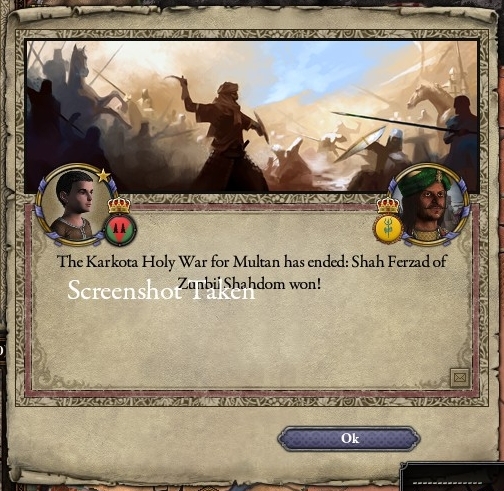  : It seems the Buddha was not with the armies of the heathens that day. The Great Eastern Temple stood strong, and Multan never fell to the unbelievers. : It seems the Buddha was not with the armies of the heathens that day. The Great Eastern Temple stood strong, and Multan never fell to the unbelievers.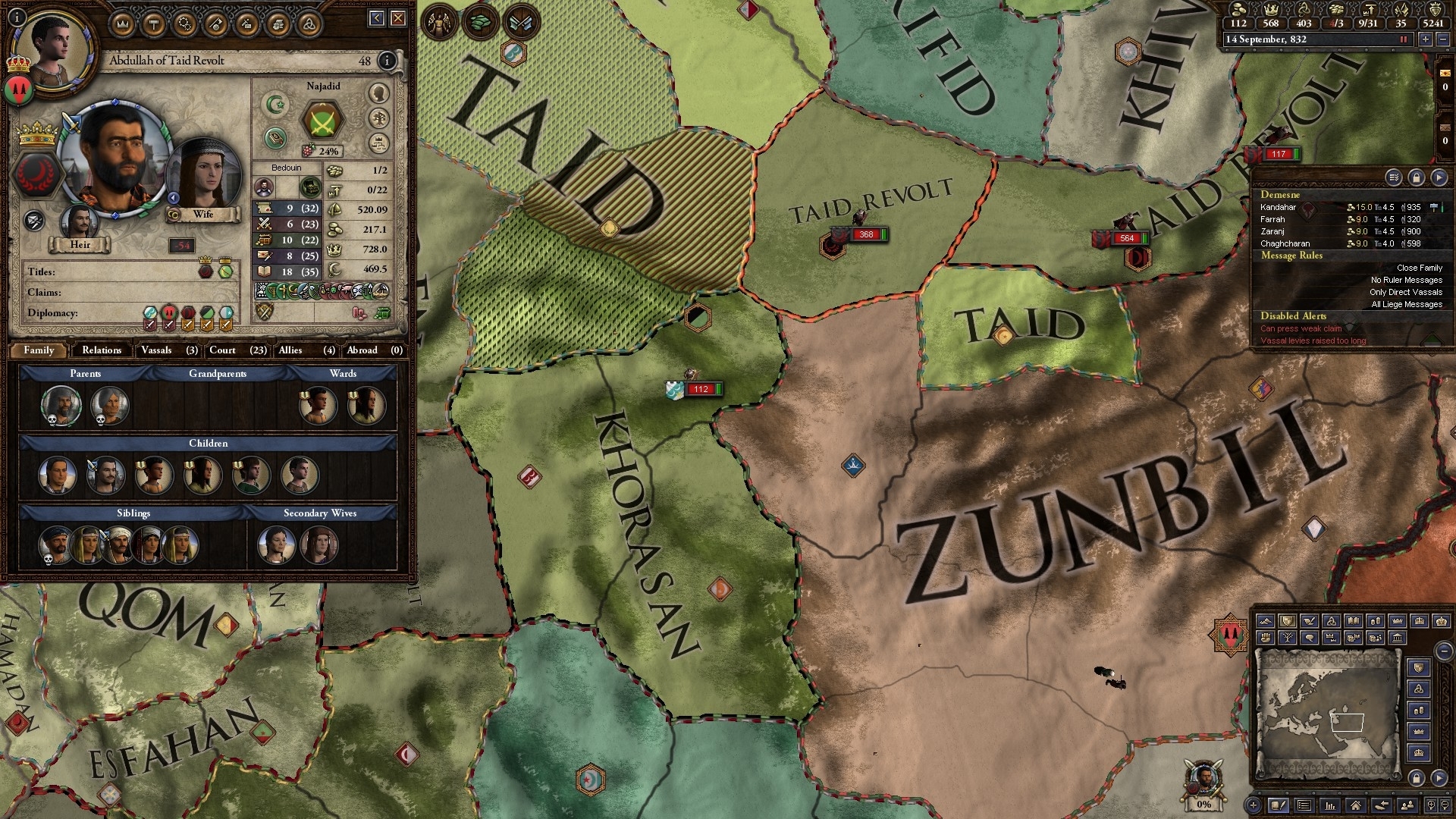  : The young Shah turned his gaze to the north yet again. It seemed the Taids could not hold on to their lands, and war spread through the realm. Ferzad turned his armies north yet again. : The young Shah turned his gaze to the north yet again. It seemed the Taids could not hold on to their lands, and war spread through the realm. Ferzad turned his armies north yet again.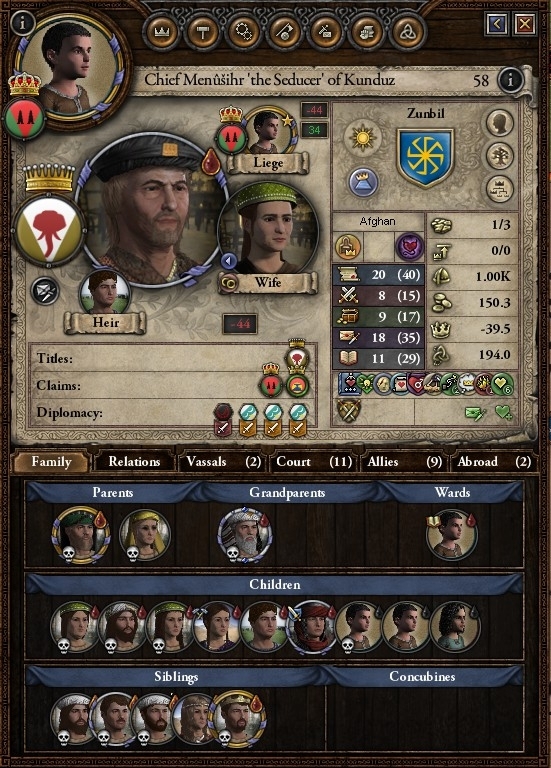  : Rustam's brother, Menusihr, ruled in the Shah's stead those days. He was a clever man, yet too far from the central bloodline to sit on the Sun Throne. : Rustam's brother, Menusihr, ruled in the Shah's stead those days. He was a clever man, yet too far from the central bloodline to sit on the Sun Throne.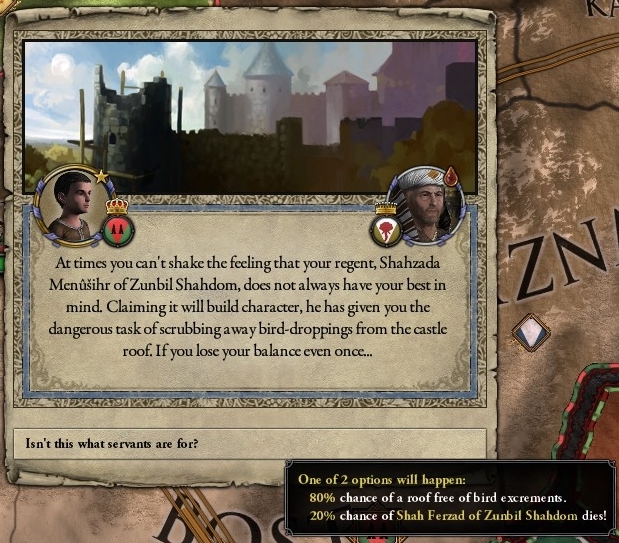  : I have heard rumours that he tried to teach the Shah humility before he became a man. : I have heard rumours that he tried to teach the Shah humility before he became a man.  : His lessons were strange, and a danger to the boy. : His lessons were strange, and a danger to the boy.  : And one day, the lessons overtook the young Shah. : And one day, the lessons overtook the young Shah.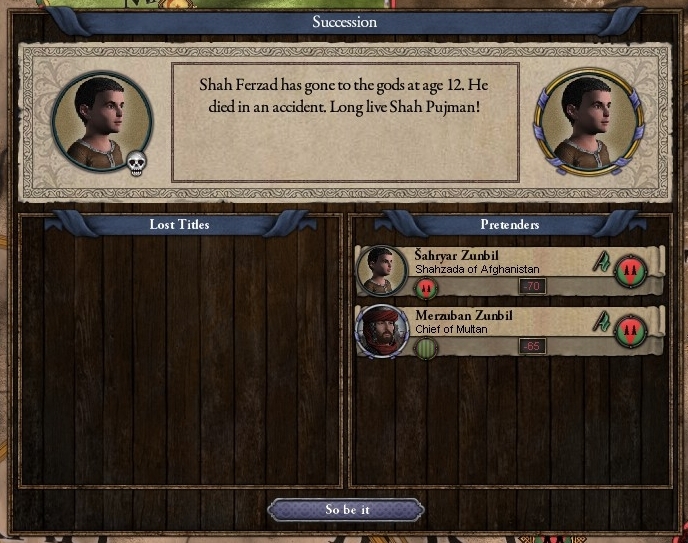  : His older brother, Pujman, now sat on the Sun Throne. : His older brother, Pujman, now sat on the Sun Throne.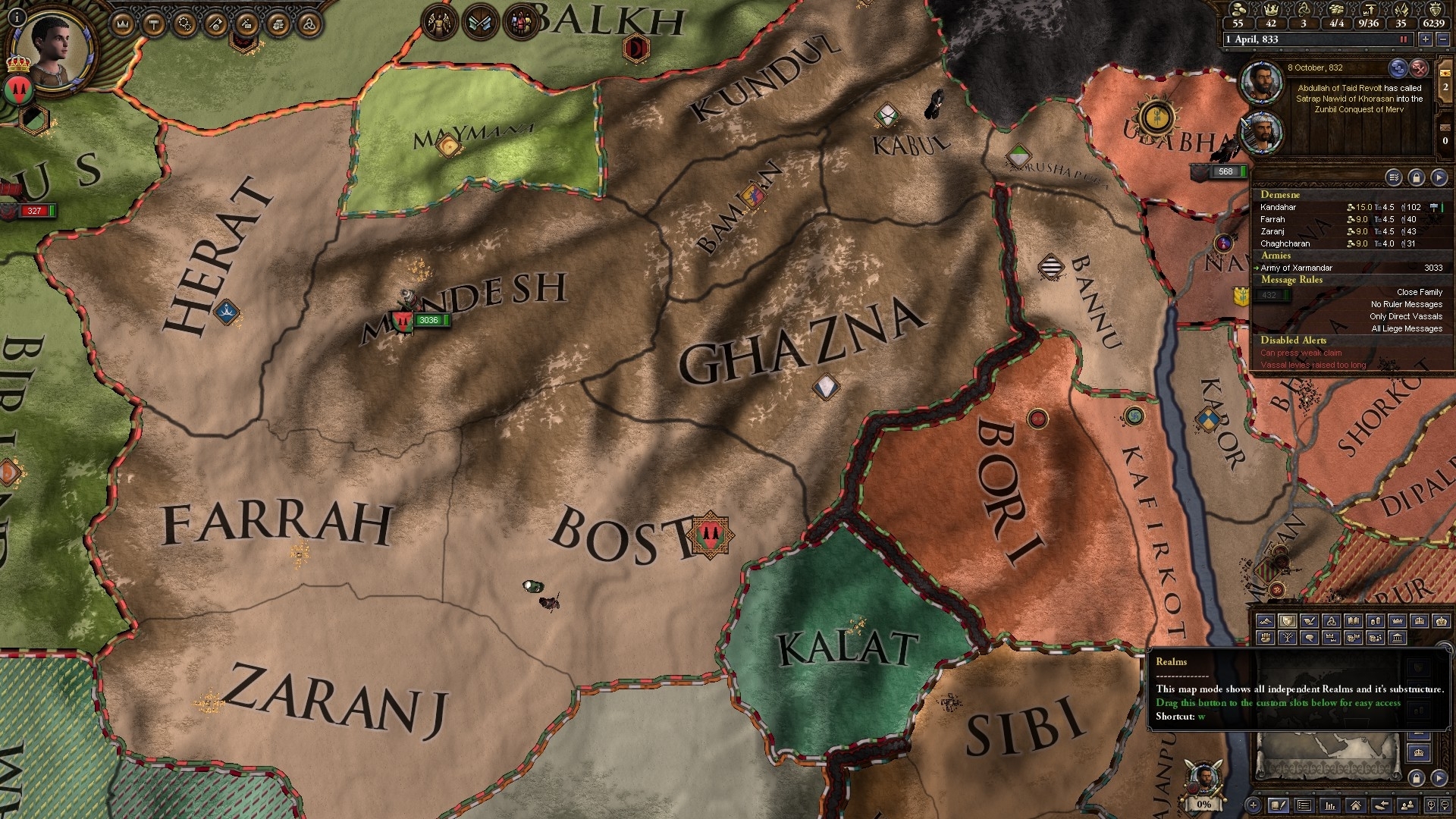  : Zunbil lands that Pujman ruled were larger than any Zunbil before him. The realm stretched from Zaranj to the Indus. : Zunbil lands that Pujman ruled were larger than any Zunbil before him. The realm stretched from Zaranj to the Indus.  : And Zun shone on deserts and mountains and riverbanks. : And Zun shone on deserts and mountains and riverbanks.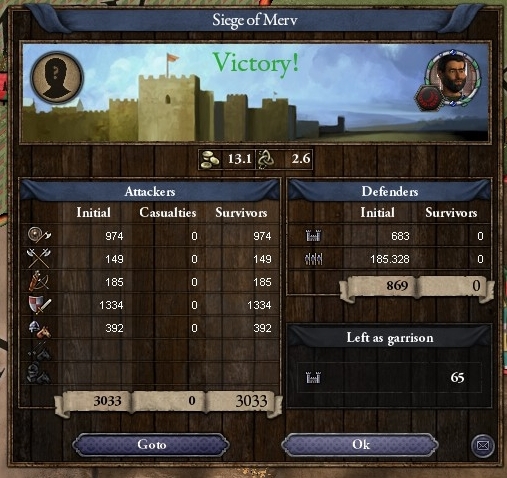  : Pujman continued his brother's work. The northern lands felt the wrath of the Justice Giver. : Pujman continued his brother's work. The northern lands felt the wrath of the Justice Giver.  : There was much kindness in the new Shah, something the realm has not seen since Jimofuta. We almost forgot that a Shah could be merciful. : There was much kindness in the new Shah, something the realm has not seen since Jimofuta. We almost forgot that a Shah could be merciful.  : That kindness did not extend to our neighbours, of course. After all, he was still a Zunbil. : That kindness did not extend to our neighbours, of course. After all, he was still a Zunbil.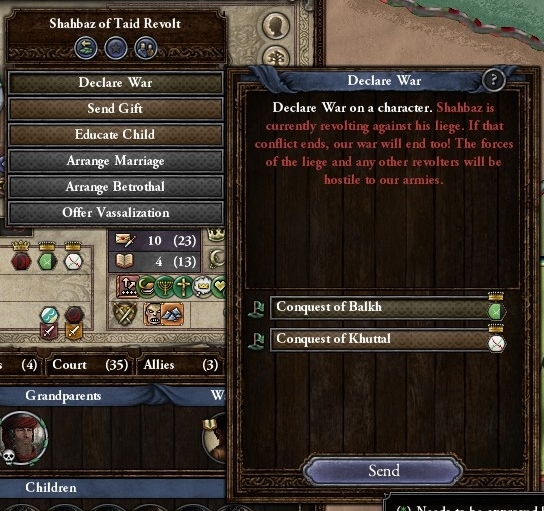  : As the northerners fought among themselves, the young Shah continued his family's work. : As the northerners fought among themselves, the young Shah continued his family's work.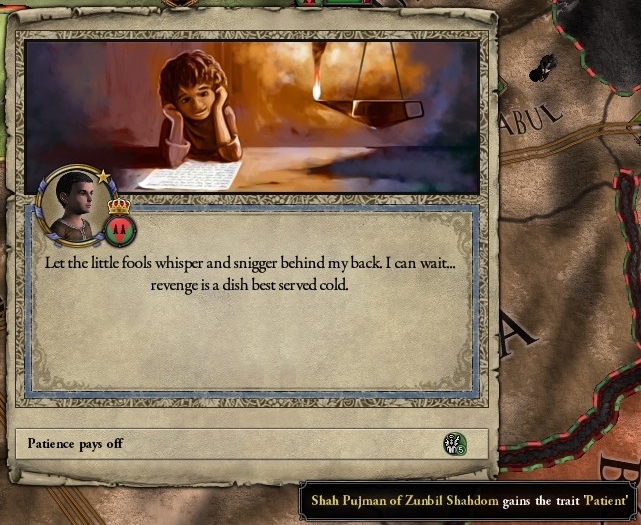  : It is most strange that the Shah grew so valiant and honourable. The Western Elders are not well known for patience and leniency. : It is most strange that the Shah grew so valiant and honourable. The Western Elders are not well known for patience and leniency. 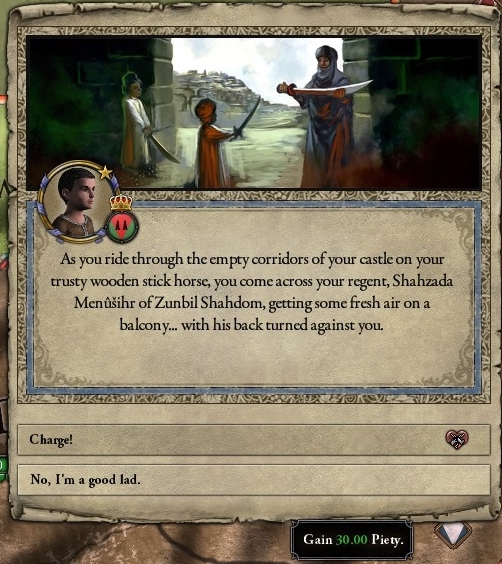  : And yet, the boy was shaping up to be a fine ruler. : And yet, the boy was shaping up to be a fine ruler. 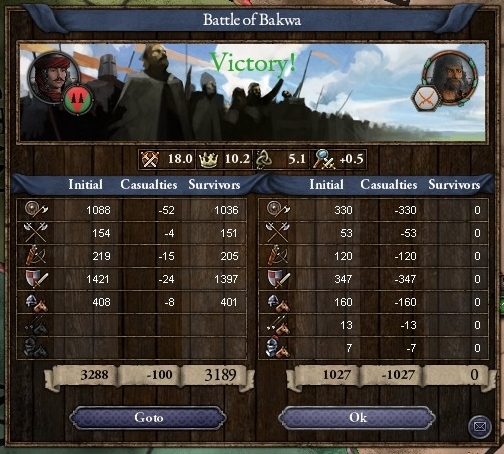  : The northerners, their realm torn by war, their children fighting each other, could not stop the march of the faithful. : The northerners, their realm torn by war, their children fighting each other, could not stop the march of the faithful.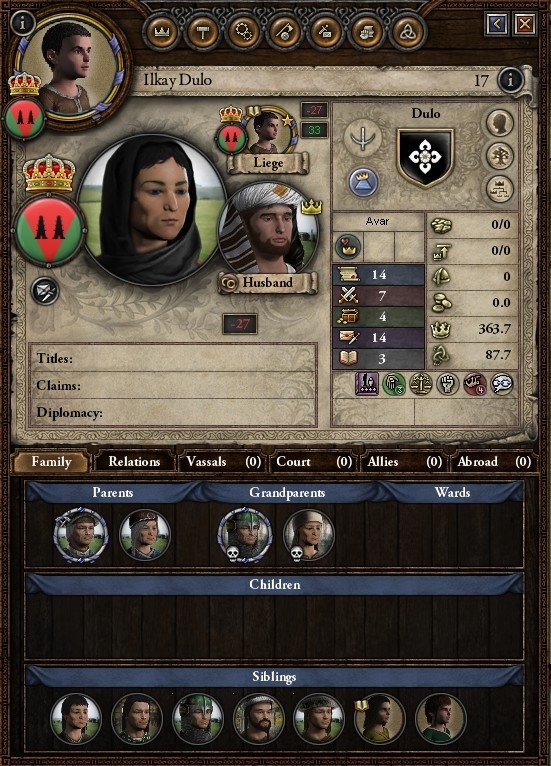  : It was at this time that the young Shah arranged for his older brother to marry a clever girl from the Steppes. He sent her to Konstantinyye to be his eyes and ears in the Greek courts. : It was at this time that the young Shah arranged for his older brother to marry a clever girl from the Steppes. He sent her to Konstantinyye to be his eyes and ears in the Greek courts.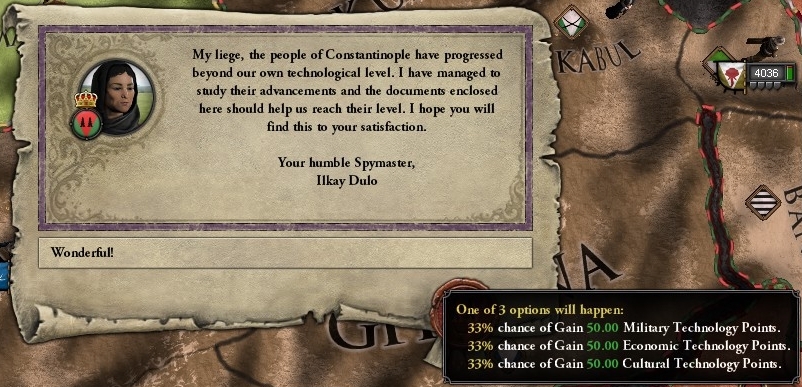  : And she sent him many letters, on war, and masonry, and law. The Shah had the Western Elders take the Greeks' lessons to heart. They debated much on the nature of the Justice Giver, and decreed that all divine is Zun, and Zun is all divine. The Muslims to the south, and the Christians to the west, they all spoke to Zun, they just spoke the wrong words. There were no other gods. : And she sent him many letters, on war, and masonry, and law. The Shah had the Western Elders take the Greeks' lessons to heart. They debated much on the nature of the Justice Giver, and decreed that all divine is Zun, and Zun is all divine. The Muslims to the south, and the Christians to the west, they all spoke to Zun, they just spoke the wrong words. There were no other gods. : Fools! Do they deny the power of the wheelgod, Buddha? Do they deny Kali's fury, or the wisdom of Hormazd? Among all the gods, Zun is Shah, for his strength is matched by none. But without testing his strength against the other gods, how would Zun be ready to defend against The Darkness? : Fools! Do they deny the power of the wheelgod, Buddha? Do they deny Kali's fury, or the wisdom of Hormazd? Among all the gods, Zun is Shah, for his strength is matched by none. But without testing his strength against the other gods, how would Zun be ready to defend against The Darkness? : These Ilkay letters seeded doubt among the faithful. They spread heresy. And the Westerners took it into their homes, and into their hearts. : These Ilkay letters seeded doubt among the faithful. They spread heresy. And the Westerners took it into their homes, and into their hearts.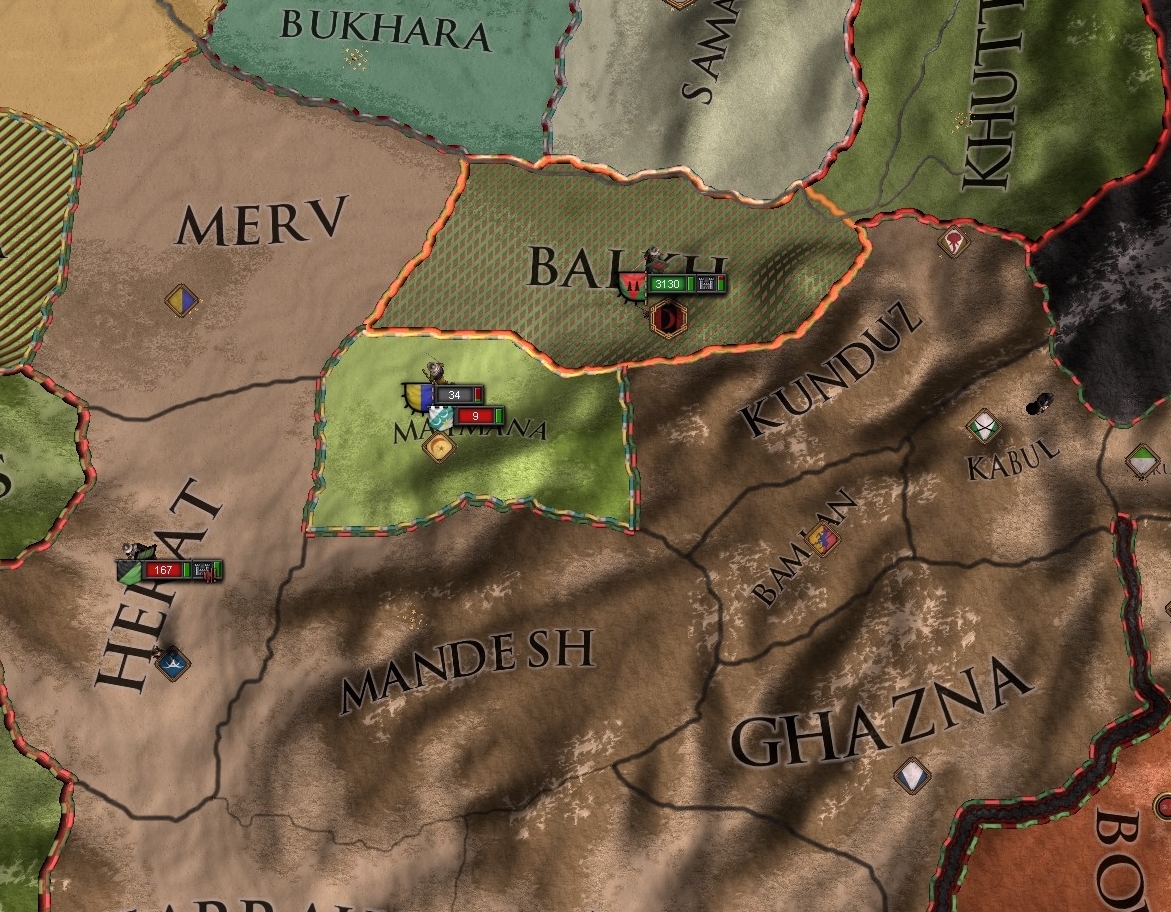  : And as that woman gave the Greeks' failed wisdom to the Elders, the faithful took Balkh. The war was almost over. : And as that woman gave the Greeks' failed wisdom to the Elders, the faithful took Balkh. The war was almost over.  : The little Shah spent his days with his mentor, a commander named Xarmandar. A good man by all accords, and kind towards Pujman. : The little Shah spent his days with his mentor, a commander named Xarmandar. A good man by all accords, and kind towards Pujman.  : But even in kindness, he had a strong hand in the Shah's education. : But even in kindness, he had a strong hand in the Shah's education.  : Pujman would not hide from his responsibilities, and he would listen to the Elders. : Pujman would not hide from his responsibilities, and he would listen to the Elders.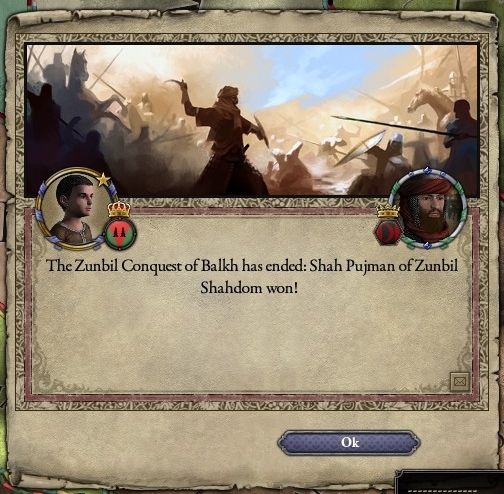  : Balkh fell. The northern rebels surrendered their arms, and faced the Taids yet again. : Balkh fell. The northern rebels surrendered their arms, and faced the Taids yet again.  : The Taids were led by a child Satrap. The Zunbils had no treaties with a child, and marched straight on Mayana. : The Taids were led by a child Satrap. The Zunbils had no treaties with a child, and marched straight on Mayana.  : His lands ravaged by war, the boy surrendered. : His lands ravaged by war, the boy surrendered.  : And the Zunbils came from the mountains, and they descended on Merv. And Zun shone on the plains, with his blessing. : And the Zunbils came from the mountains, and they descended on Merv. And Zun shone on the plains, with his blessing.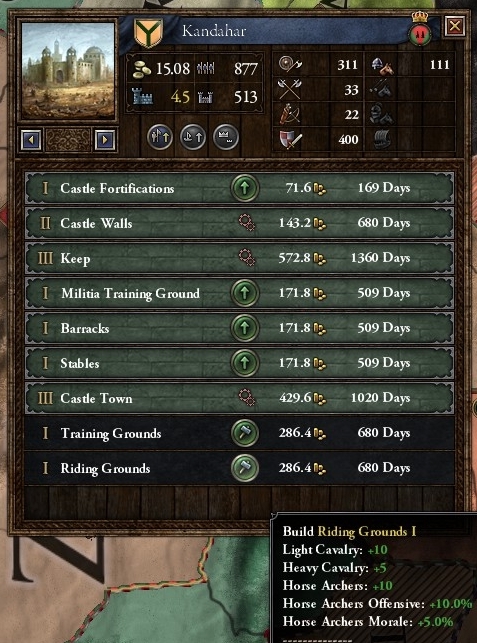  : And the Shah took the Steppe riders, and gave them land in return for training his horsemen. And none could stop the Zunbils. : And the Shah took the Steppe riders, and gave them land in return for training his horsemen. And none could stop the Zunbils.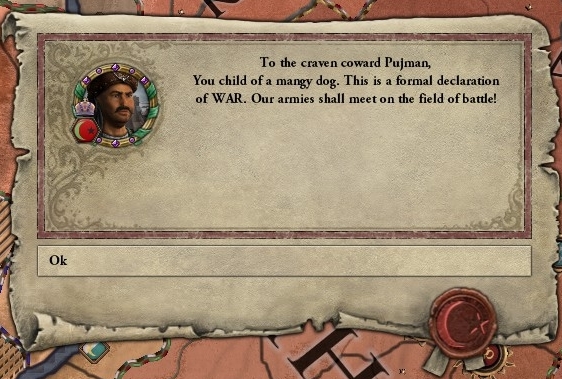  : Or so we thought. : Or so we thought.  : The Aarifids, conquerors of the accursed Abbasids, ruled as Caliphs from Baghdad. True believers in their Allah, they charged across the plains of Merv, and struck the faithful. : The Aarifids, conquerors of the accursed Abbasids, ruled as Caliphs from Baghdad. True believers in their Allah, they charged across the plains of Merv, and struck the faithful.  : The faithful trembled. : The faithful trembled.  : And the faithful fell. : And the faithful fell.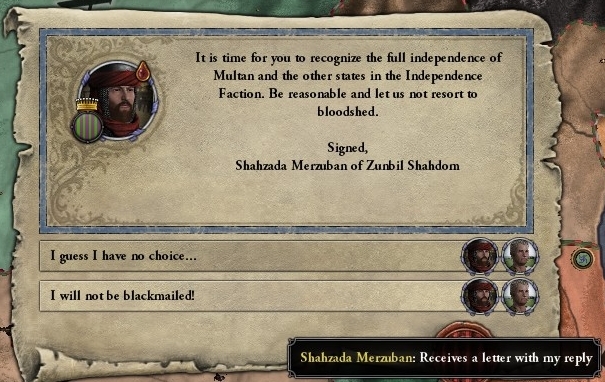  : What more proof did the people need? What else could the Eastern Elders counsel? The boy Shah was not Zun's chosen. He did not rule over the Third Sun Temple. : What more proof did the people need? What else could the Eastern Elders counsel? The boy Shah was not Zun's chosen. He did not rule over the Third Sun Temple.  : The Mountain Elders of Kabul, who often spoke of peace, and reconciliation, and teaching each other, broke the peace as well. They proclaimed Merzuban of Kabul as Zun's chosen, and blessed his armies. : The Mountain Elders of Kabul, who often spoke of peace, and reconciliation, and teaching each other, broke the peace as well. They proclaimed Merzuban of Kabul as Zun's chosen, and blessed his armies.  : A descendant of Zere from Ghazna claimed himself the true heir to the Sun Throne, and raised his men, and marched on Kandahar. : A descendant of Zere from Ghazna claimed himself the true heir to the Sun Throne, and raised his men, and marched on Kandahar.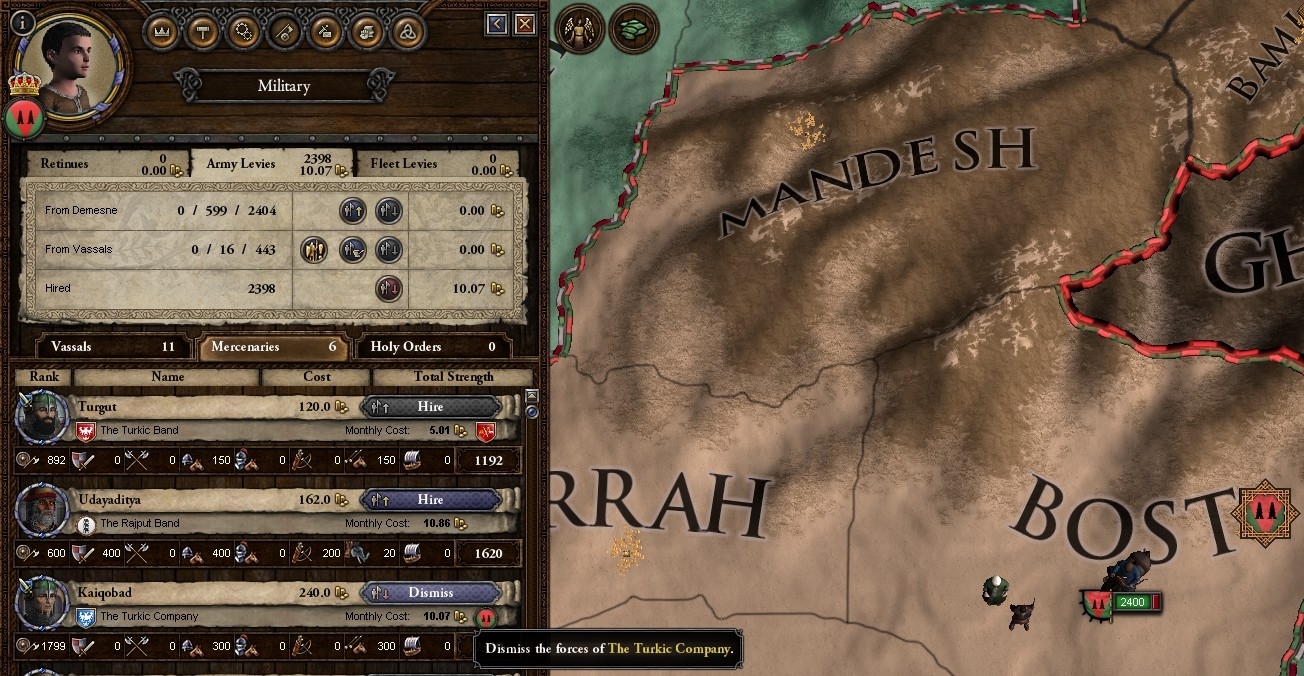  : There were no more faithful left in the capital. And so, like Zere, and like Jimofuta, Pujman called on the northern horsemen, and promised them gold and rubies from the rebels' lands. : There were no more faithful left in the capital. And so, like Zere, and like Jimofuta, Pujman called on the northern horsemen, and promised them gold and rubies from the rebels' lands.  : Even the beasts from Multan, great elephants from beyond the Indus, rampaged through Kandahar, and made foul noises at the Shah and his palace. : Even the beasts from Multan, great elephants from beyond the Indus, rampaged through Kandahar, and made foul noises at the Shah and his palace.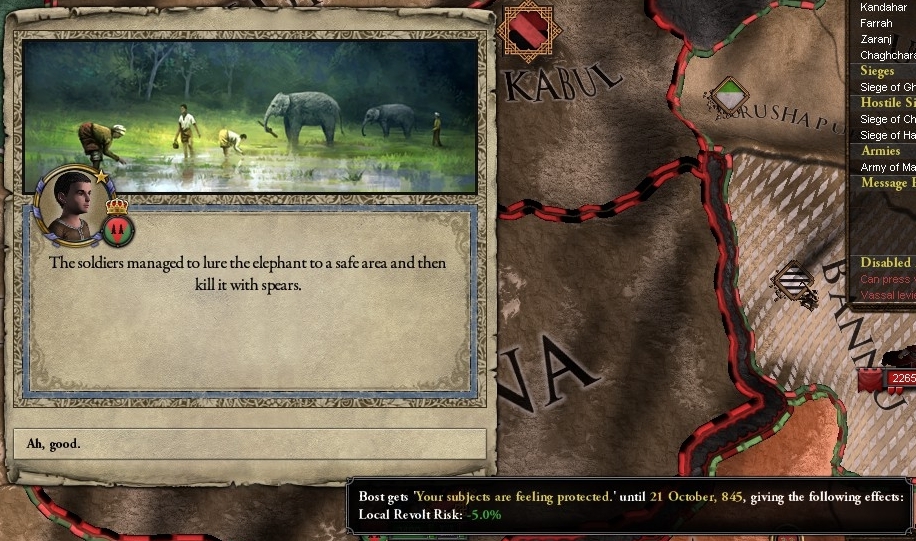  : But the Shah stood firm, and had his men kill the beast. The Western Elders named this a sign that the East shall fall before the might of Kandahar. : But the Shah stood firm, and had his men kill the beast. The Western Elders named this a sign that the East shall fall before the might of Kandahar.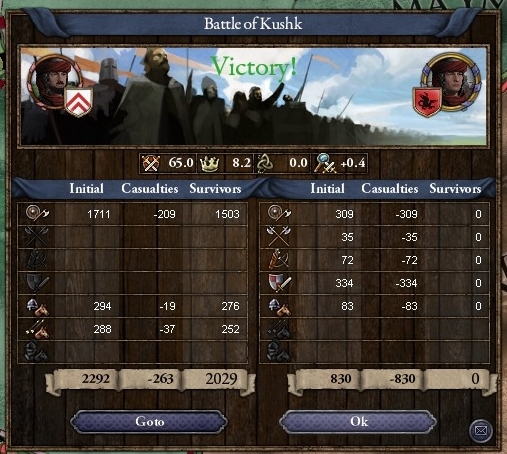  : As much as I would like to deny it, the heretics were right. : As much as I would like to deny it, the heretics were right.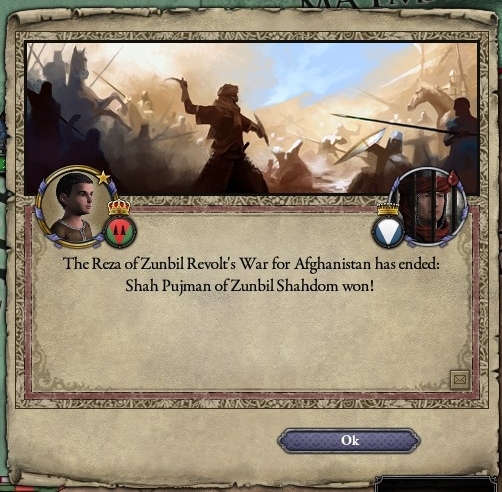  : The Turkmen horses went east and broke the rebels' spirits. : The Turkmen horses went east and broke the rebels' spirits.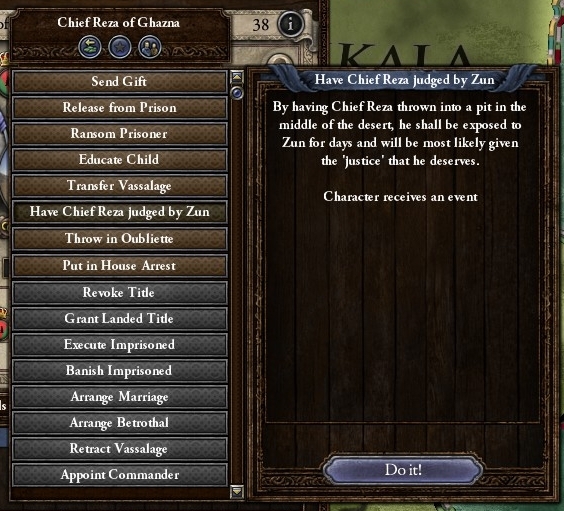  : And all mercy drained from the young Pujman. : And all mercy drained from the young Pujman.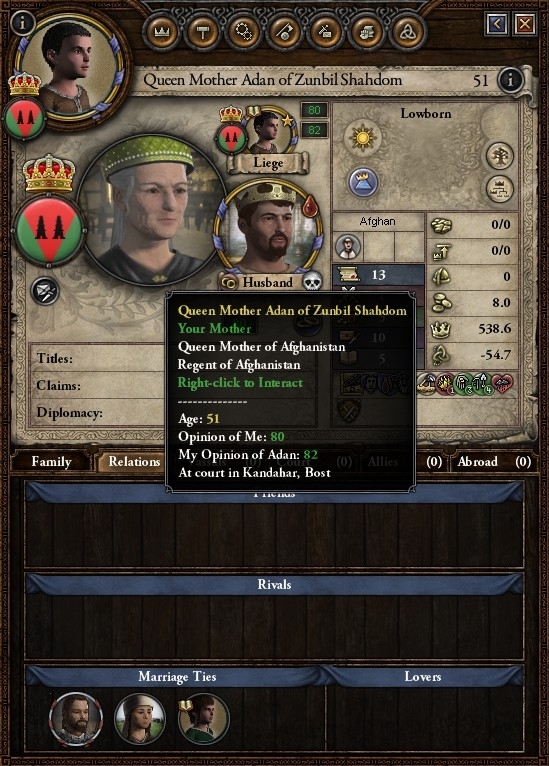  : His uncle, the murderer Menusihr, has sided with Kabul, and the boy's mother sat by the Sun Throne in his stead. : His uncle, the murderer Menusihr, has sided with Kabul, and the boy's mother sat by the Sun Throne in his stead.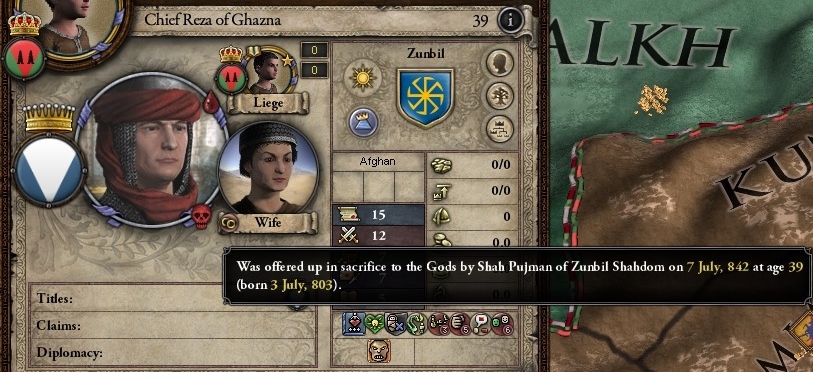  : One by one, the rebels fell before Zun's gaze. : One by one, the rebels fell before Zun's gaze.  : As Kabul fell, the rebel prince went to the pits. He would not return. : As Kabul fell, the rebel prince went to the pits. He would not return.  : And so, in the fires of civil war, Pujman became a man. A man who dedicated himself to war, in the Justice Giver's name. The Sword of Zun. : And so, in the fires of civil war, Pujman became a man. A man who dedicated himself to war, in the Justice Giver's name. The Sword of Zun.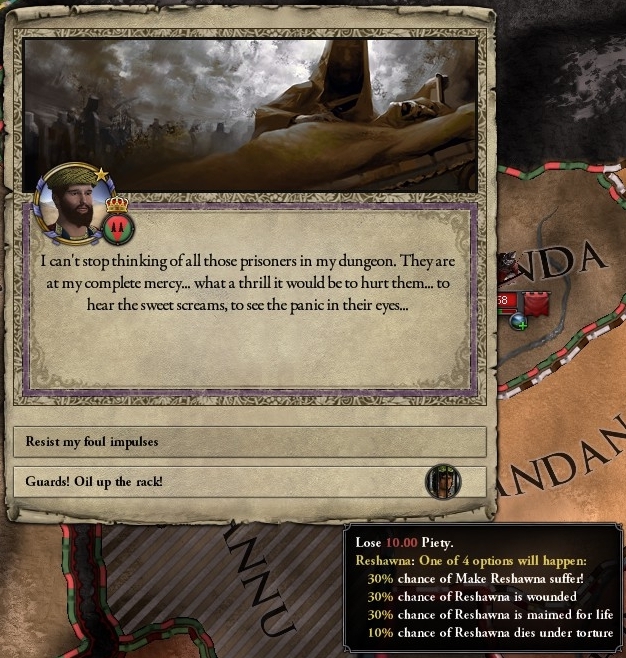  : There was nothing left of the sweet boy in the Shah. He was, after all, his father's son. : There was nothing left of the sweet boy in the Shah. He was, after all, his father's son.  : Ever eastwards, the Turkmen horses marched to the Indus. : Ever eastwards, the Turkmen horses marched to the Indus.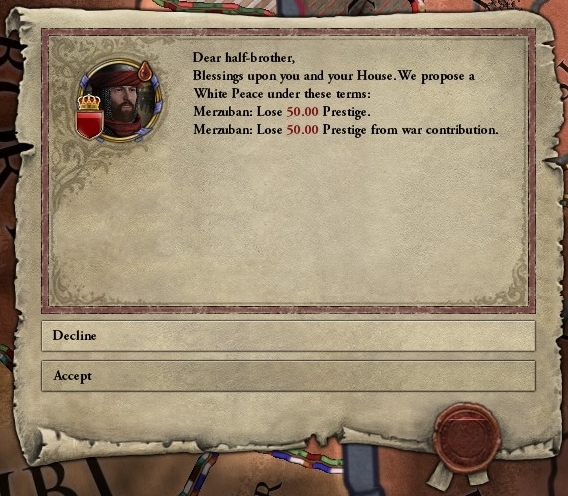  : The Multan Chief sent word to the capital that he would surrender if his men were spared. : The Multan Chief sent word to the capital that he would surrender if his men were spared.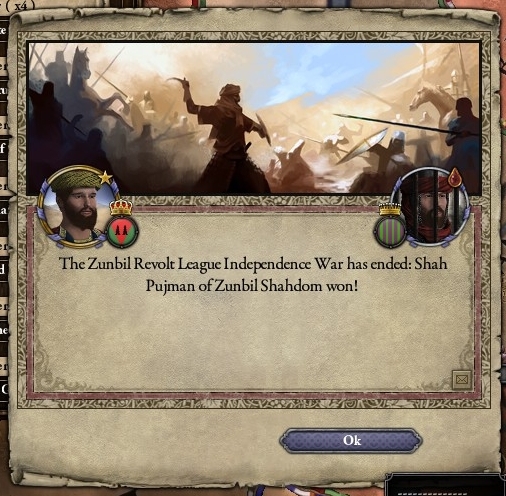  : They were not. : They were not.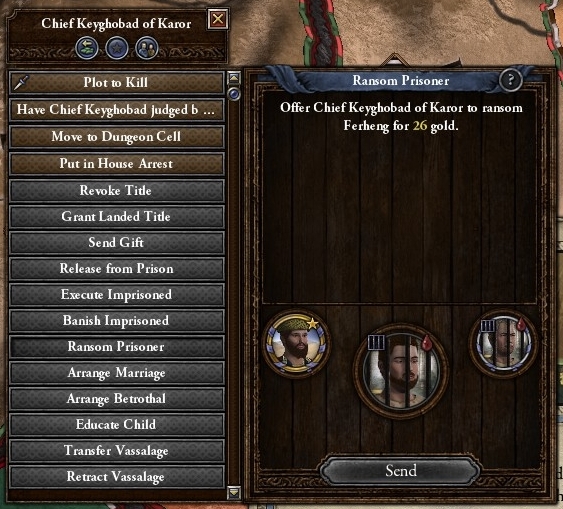  : One by one, they went to the pits. : One by one, they went to the pits.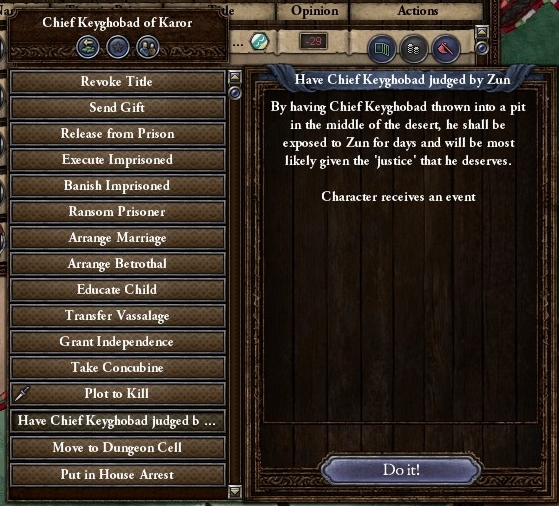  : Every Chief that spoke against him. : Every Chief that spoke against him.  : And every elder. : And every elder. : None came out. The Justice Giver had his say. : None came out. The Justice Giver had his say.  : I was not sent to the pits. Not yet. Instead, I was given the Third Sun Temple. A twisted thanks for my service to Zere and Rustam, I suppose. None of the others remained. I was the last Eastern Elder. : I was not sent to the pits. Not yet. Instead, I was given the Third Sun Temple. A twisted thanks for my service to Zere and Rustam, I suppose. None of the others remained. I was the last Eastern Elder.The Old Afghan sits, surrounded by men of all walks of life, all bound to the Caravan. If you look to the horizon, and watch them out of the corner of your eye, you can see dozens, hundreds of souls, huddled around a campfire, listening to the old man tell his stories. And yet, even surrounded by loyal followers, old compatriots and new acolytes, the Afghan is alone. There are none like him. The Great Eastern Temple stands empty. No fires are lit. No saffron fills the air. The altar holds no image of the Justice Giver. The Eastern Elders, loyal men of Zun until the end, lie dead in Kandahar. The old man nods his head, shaking off his thoughts.  : Come, it is late. Rest, we must cross many dunes tomorrow. : Come, it is late. Rest, we must cross many dunes tomorrow.He disappears in his tent. His followers shuffle off to their bedrolls, thinking on the old man's lessons. A long journey awaits them the next morning. After all, for the Caravan of the Dead, there is always a tomorrow.
|
|
|
|
History Update 4 - And then the Mongols Showed Up Last time, we tracked three major dynasties that ruled over Afghanistan up until 1219, when the Mongols showed up and ruined everything. Today, we're going to take a look at the Mongol invasion of Persia, Afghanistan, and India. First of all, if you're interested in the history of Temujin and the Mongol Khaganates, I highly recommend Dan Carlin's excellent podcast series Hardcore History. It's in-depth, informative and entertaining. We will not be focusing on Temujin uniting the clans and becoming Genghis Khan. Instead, we're just going to deal with his invasion of the Khwarezmid lands and its aftermath. 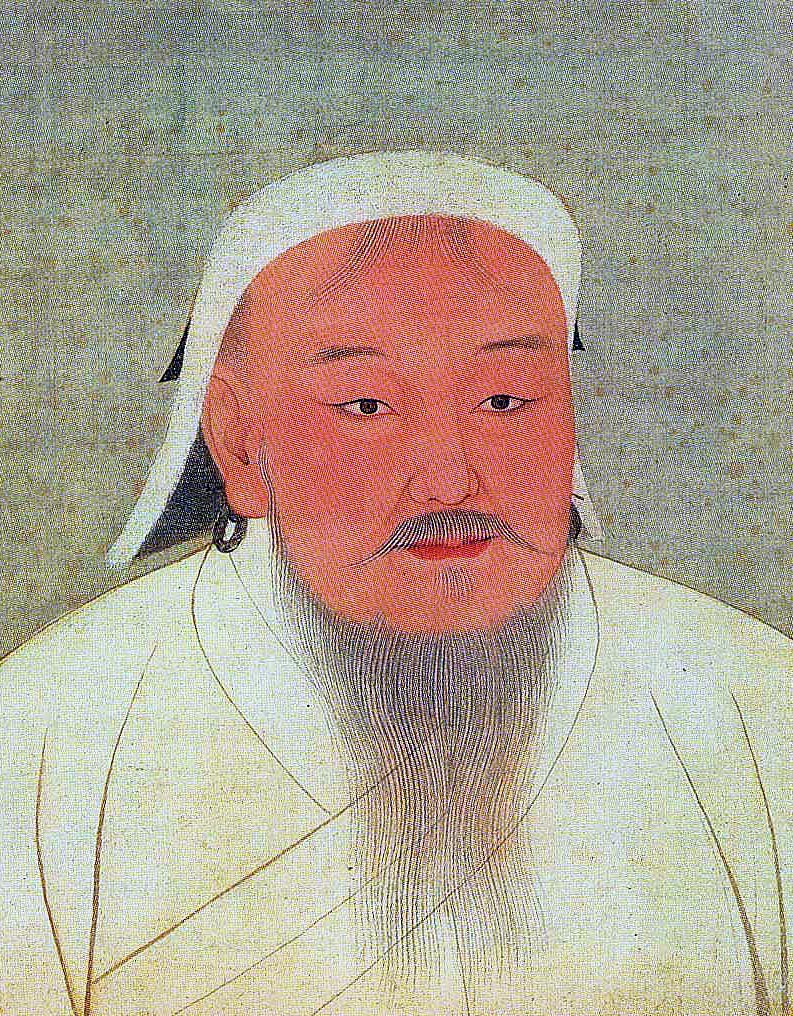 The great Khan initially sent trade emissaries to the Persians, claiming "I am master of the lands of the rising sun while you rule those of the setting sun. Let us conclude a firm treaty of friendship and peace" At the time, Genghis was involved in a war with the Jin empire in northern China. Trade seemed like it would be beneficial to both side, but Shah Ala ad-Din Muhammad had his reservations. He has heard news from the east about the brutal methods the Mongols used in their wars. So when the trade caravan, a mere 500 men, arrived in Otrar (modern Southern Kazakhstan), the men were arrested as spies. The great Khan sent another envoy, this time to meet with the Shah directly, and demanded the men released. The Shah, a totally sane and logical man, had the envoys shaved, one of them beheaded, and all the caravan men executed. The shaved men were sent back to the Khan.  The Khan was pissed at this disrespect of his rule, and rode west. He gathered an army of anywhere between 90 000 and 250 000 men (sources vary), and crossed into modern day Kyrgyzstan. He divided his army, and sent a large force to find the Shah and kill him. While the Shah was running for his life, the rest of Genghis' army engaged the Shah's forces. Genghis reached Otrar, sieged it, found the governor that captured his men, and killed him. The city's inhabitants were then systematically killed or enslaved. That's basically how the Mongols warred. The Mongols then took Bukhara and Samarkand, traversing the desert by hopping from oasis to oasis. During the capture of Samarkand, the Khwarezmid capital, he promised clemency to those soldiers that laid down their arms. When he took the city, he killed them all. The city population was then systematically murdered, and the Khan arranged the heads of the dead men in massive pyramids outside the walls. He didn't gently caress around. The Mongols took their murder train further south, where they took Balkh, Merv and Herat, treating the populace in pretty much the same fashion. 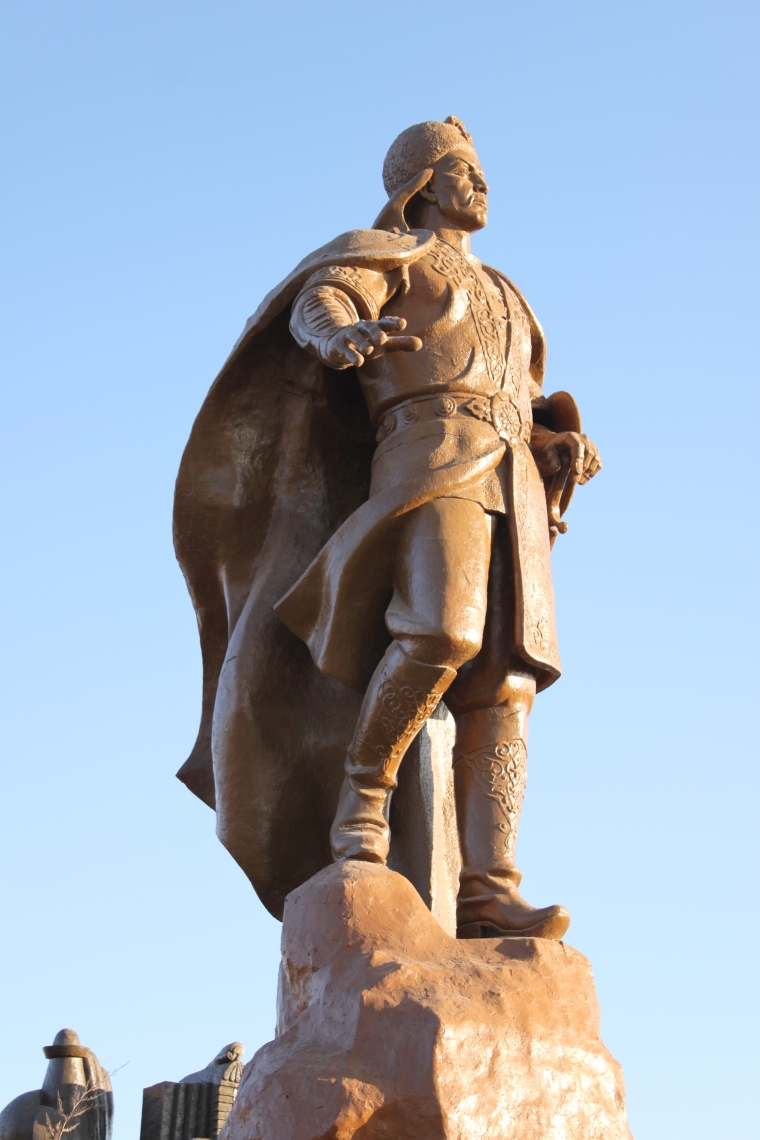 At this point, the Shah died, and his son Jalal ad-Din took over. He gathered what remained of the Empire's forces in southern Afghanistan. A large contingent of the Mongol forces went south to finish him off, and they fought outside Ghazni, at Parwan. They finally defeated the Mongol force, and then promptly went to poo poo over the victory spoils. Genghis went south himself, and destroyed Jalal's forces on the Indus. Jalal fled to India, never to be seen again. Genghis died soon after, but the Horde remained. Kublai Khan, Genghis' grandson, gave the title of Il-Khan (under-khan) to Hulegu, another grandson of the great Khan, and granted him the lands in Persia. Hulegu expanded violently into the Muslim world, but that's outside the scope of today's lesson. Hulegu's descendants held Afghanistan (and a shitload more territory) until 1335, when Abu Sa'id, the last Il-Khan died and the empire loving exploded. 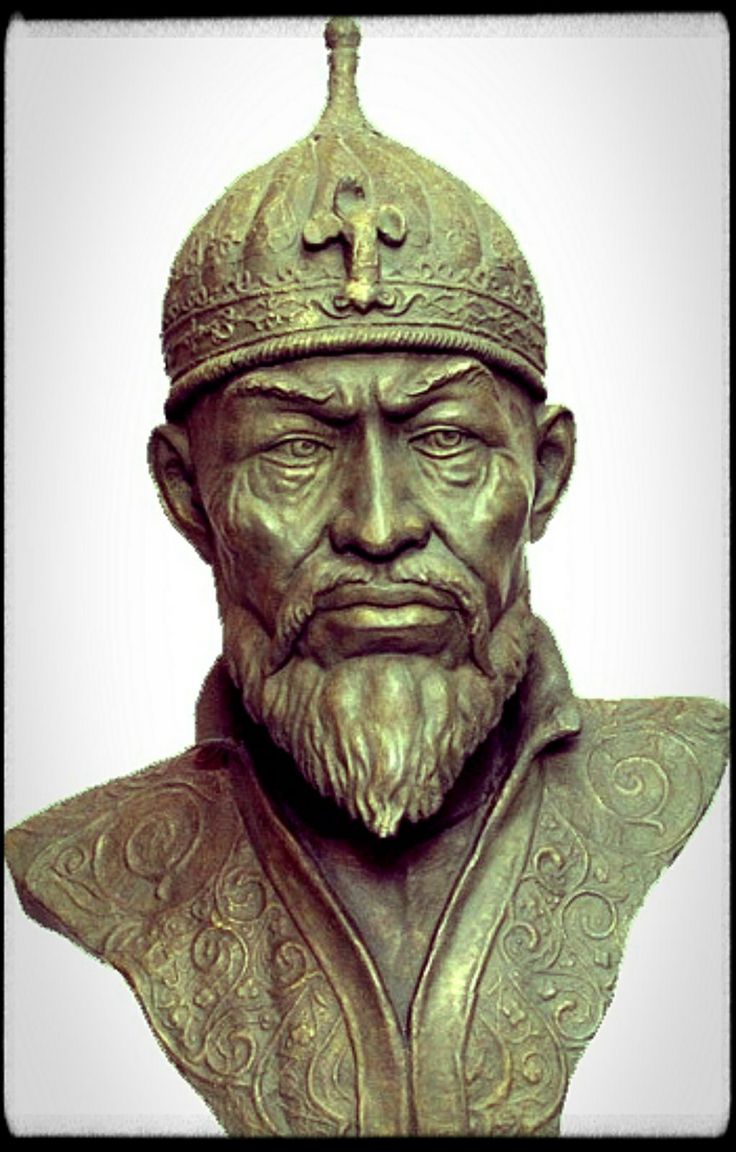 Eventually, a Turk named Timur became a commander of the Chagatai Khanate, one of the breakaway Mongol states. He won several victories, and built up the support of the army. Eventually, he practically ruled as dictator, while the Chagatais were left as figureheads. A few assassinations, and a convenient marriage to a Mongolian princess later, he was in the running for the Khanate. Then this happened: "Khan Züdei (in China) rules over the city. We now number fifty to sixty men, so let us elect a leader." So they drove a stake into the ground and said: "We shall run thither and he among us who is the first to reach the stake, may he become our leader". So they ran and Aksak Timur, as he was lame, lagged behind, but before the others reached the stake he threw his cap onto it. Those who arrived first said: "We are the leaders." ["But,"] Aksak Timur said: "My head came in first, I am the leader." Meanwhile, an old man arrived and said: "The leadership should belong to Aksak Timur; your feet have arrived but, before then, his head reached the goal." So they made Aksak Timur their prince." 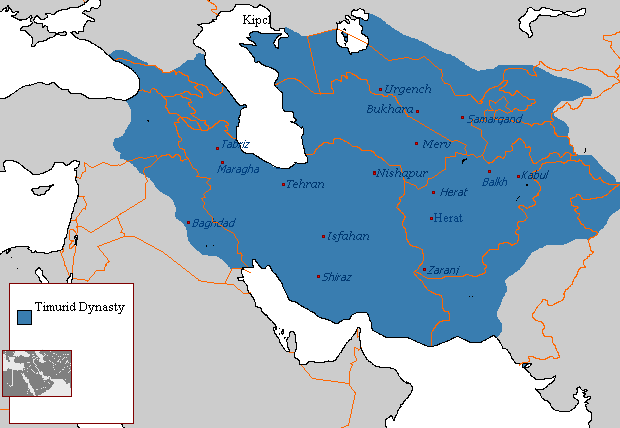 Timur became the undisputed Khan, and went on conquering. He took a lot of territory, including Persia, and became the ruler of Afghanistan, even making Herat a capital. His grandson would one day rule from Kandahar. The Timurids remained in control of the area until the early 1500s. We will leave it here for now, and deal with Mughals and Safavids next time. TL;DR: A frankly unsettling amount of murder. Mongols ended up ruling for 300 years, but that's cheating, since the ruling dynasty changed, like, six times.
|
|
|
|
Film Update 4 - What is Jerusalem Worth? In this update, we saw a massive holy war started by the Muslim Caliphate, a holy war for the Third Sun temple to the East, and watched the Old Afghan start to doubt his faith. Oh, and a shitload of civil wars happened. 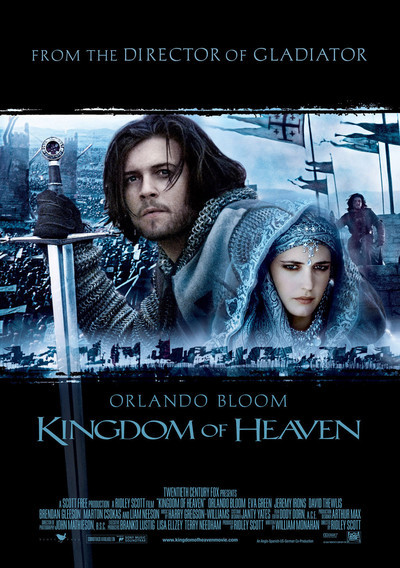 With that in mind, let's continue cheating with film suggestions, and take a look at the second half of Kingdom of Heaven. In the second half, a fanatic starts a war he cannot finish against Saladin and gets his army destroyed. As the knights evacuate Jerusalem, knowing that the Saracen army approaches, Balian stays behind and leads the defense of holy city. He holds out long enough for Saladin to guarantee safe passage to the Christians, and they all march out. Balian returns home, and avoids being drawn into the next crusade. 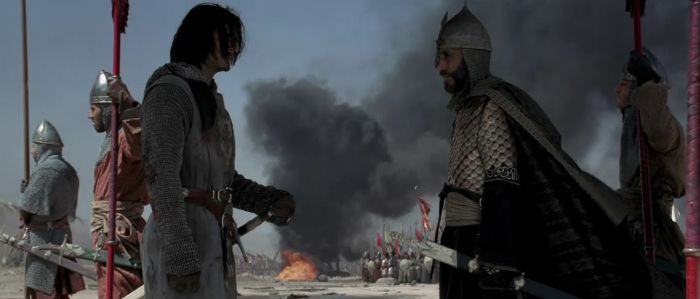 Balian as he is portrayed in the film is a very noble man. Rather than prevent war by executing Guy de Lusignan, he spares the man life. Guy, of course, immediately starts poo poo. Balian slowly loses his faith in organized religion after watching the bishop of Jerusalem be awful to everyone at all times ("Convert to Islam, repent later!"), but he is still willing to defend the city for the people. At one point, he even threatens to burn it down before Saladin can take it. A strange man, a dangerous idealist. The Christians lose Jerusalem, of course, and the remainder of the holy land, but it doesn't seem like the loss affects the cast much. I just think that's an interesting parallel with both the Buddhist holy war in the east, and, on the flip side, the Muslim holy war for Merv. Anyway, if you didn't watch this movie after the last update, I once again urge you to do so. It's very much a slow burn, but worth it. Just remember, director's cut or nothing!
|
|
|
|
Update 5 - Sunrise, Sunset In the burning afternoon sun, the Caravan marches on. Dune after dune, they march toward the sounds of the waves. ... They are low on water. The oasis didn't help as much as they thought, and in celebration, they drank too much of it. ... Eventually, even the Old Afghan starts to doubt himself. Are the waves real? Is the smell of sea salt in the air, is that real? Is it all a mirage? Yet they march on. The Old Afghan feels his feet betray him, and he falls. The younger man is by his side in an instant, giving him his water rations, shielding him from the sun with his body.  : Elder! You must rest. : Elder! You must rest. : Oh no, don't mind me. I was just - : Oh no, don't mind me. I was just -He stares straight into the sun. He thinks for a moment, and makes his decision.  : Help me up, young one. I shall tell you all I know of my homeland. The last few years. : Help me up, young one. I shall tell you all I know of my homeland. The last few years.The younger man helps the Afghan up. He looks to the sky with mistrust.  : Now, Elder? Are you sure? : Now, Elder? Are you sure? : Yes, now. Let Zun hear my story. : Yes, now. Let Zun hear my story. : After his purge of the freemen in the East, Pujman hid away in his palace for a few weeks. None saw him, not even the Western priests. Not even his wife. : After his purge of the freemen in the East, Pujman hid away in his palace for a few weeks. None saw him, not even the Western priests. Not even his wife. : After his vigil, he called on his people. He said that he spoke to Zun, and Zun told him how the realm might stand whole. : After his vigil, he called on his people. He said that he spoke to Zun, and Zun told him how the realm might stand whole. : He would call a great council of Elders, from all three of the Great Temples, and they would speak. And they would debate on Zun, and The Darkness, and pits, and the old myths. And the scribe would make all their words flesh. And a single Tome of Zun would be writ. : He would call a great council of Elders, from all three of the Great Temples, and they would speak. And they would debate on Zun, and The Darkness, and pits, and the old myths. And the scribe would make all their words flesh. And a single Tome of Zun would be writ. : And he said that Zun has one more task for him. The river Indus. It would run red with the blood of the unbelievers, and be cleansed. It would be under the protection of the Justice Giver. And it would be under the watchful eye of the Zunbils, the Watchers of the Sun. : And he said that Zun has one more task for him. The river Indus. It would run red with the blood of the unbelievers, and be cleansed. It would be under the protection of the Justice Giver. And it would be under the watchful eye of the Zunbils, the Watchers of the Sun.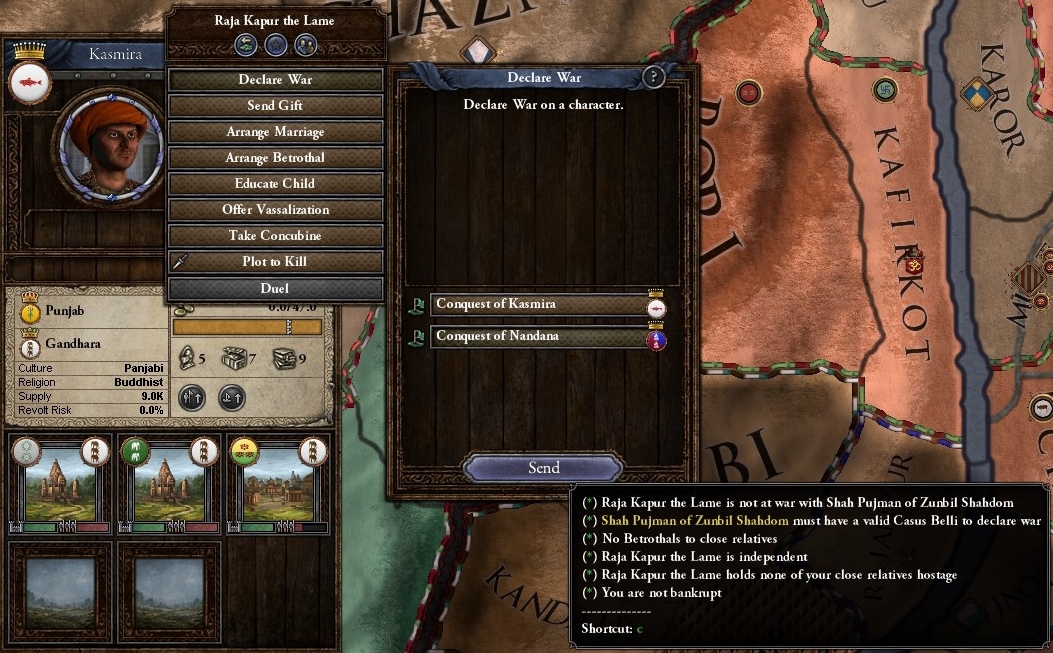  : He set his steward to organize this council, and he rode east. For the next twenty years, there was no single day of peace with the heathens. : He set his steward to organize this council, and he rode east. For the next twenty years, there was no single day of peace with the heathens.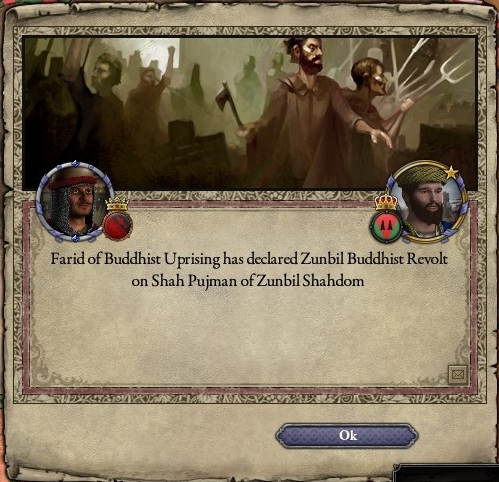  : The heathens abroad were given the same choice. Convert - : The heathens abroad were given the same choice. Convert -   : Or die. : Or die.  : He took his first wife with him. She would bear him a son. Or she too, would die. : He took his first wife with him. She would bear him a son. Or she too, would die.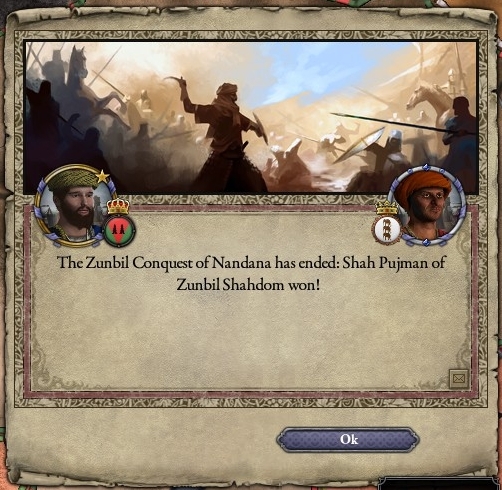  : Nandana fell quickly. In two years, the Buddhists perished. : Nandana fell quickly. In two years, the Buddhists perished.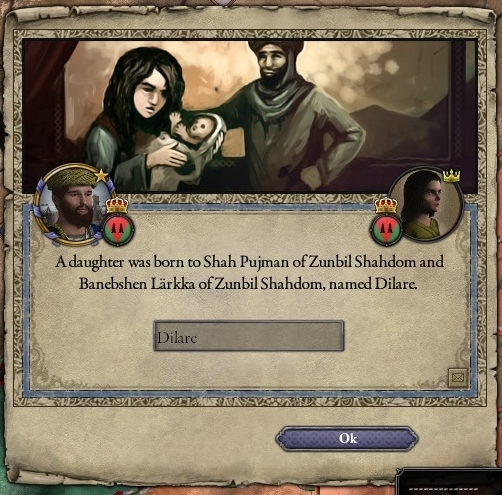  : And his wife kept trying to give him a son. : And his wife kept trying to give him a son.  : He sent news of his victory to Kandahar, and a missive to the chiefs. For the holy wars, all would give him more men, and more gold. : He sent news of his victory to Kandahar, and a missive to the chiefs. For the holy wars, all would give him more men, and more gold.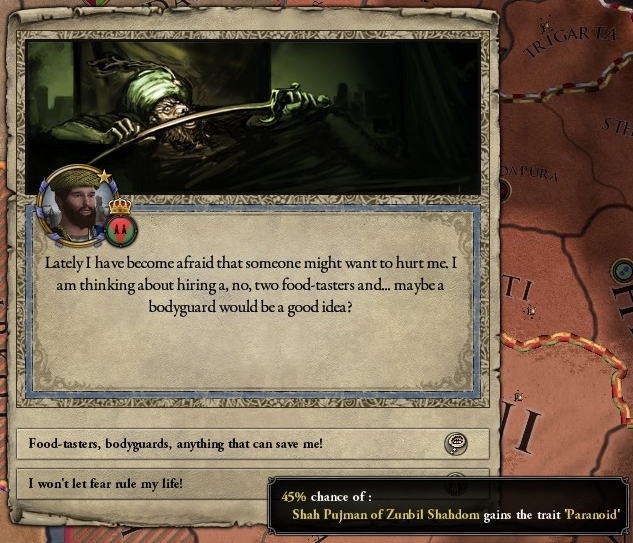  : Some chiefs spoke ill of him, but he did not know which ones. For days, he laid in bed, wondering which of his kin wished him dead. : Some chiefs spoke ill of him, but he did not know which ones. For days, he laid in bed, wondering which of his kin wished him dead.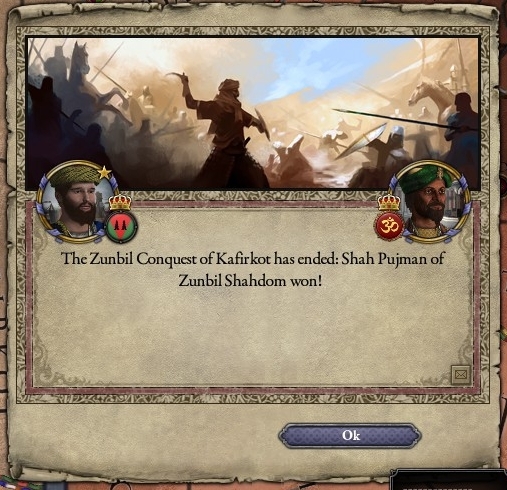  : Kafirkot fell next. The Hindus held out longer than the Buddhists. : Kafirkot fell next. The Hindus held out longer than the Buddhists.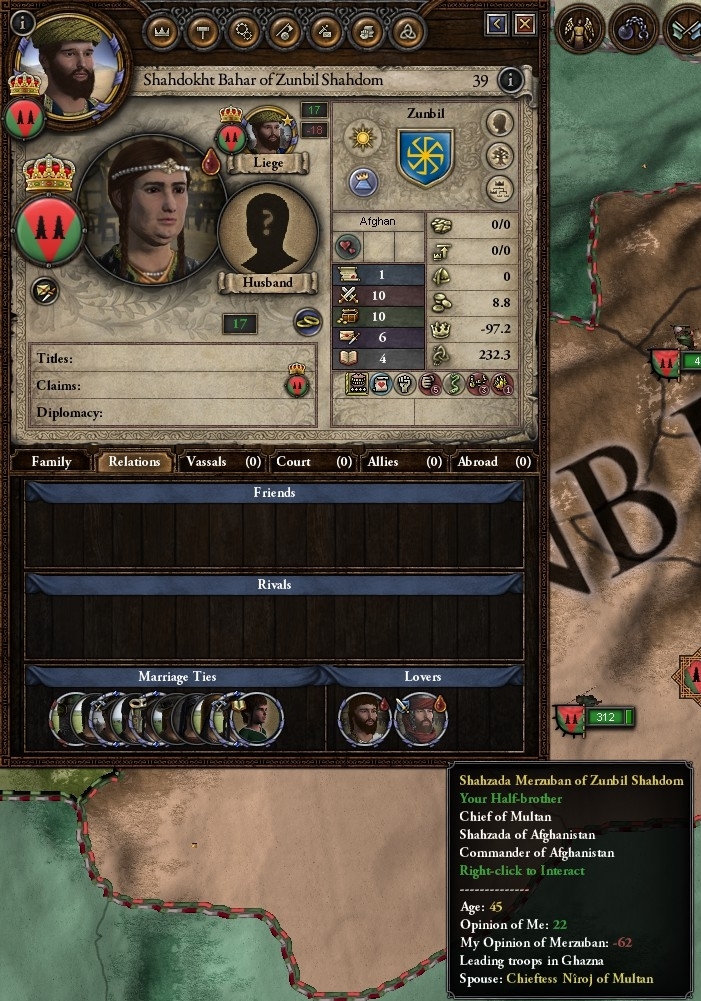  : As Pujman's royal retinue stayed in Multan, I heard rumours from the capital. Awful rumours of the Zunbil line. : As Pujman's royal retinue stayed in Multan, I heard rumours from the capital. Awful rumours of the Zunbil line.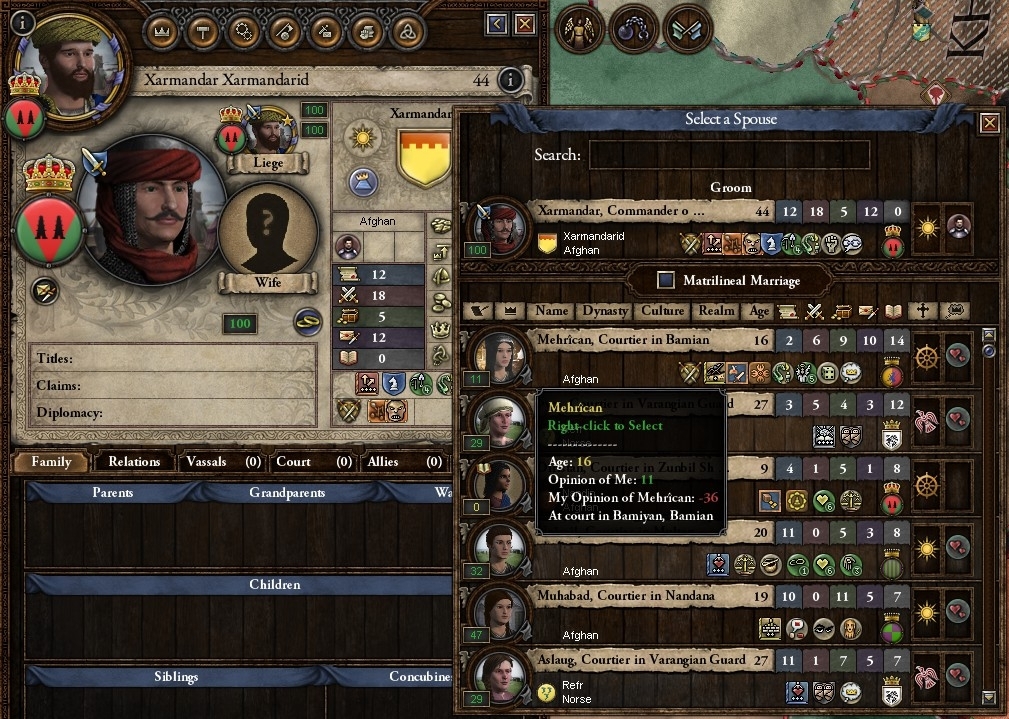  : I saw him once, in Multan. I was cleaning the temple with the acolytes, when I saw him speaking with his mentor. He wished to repay him for his upbringing. : I saw him once, in Multan. I was cleaning the temple with the acolytes, when I saw him speaking with his mentor. He wished to repay him for his upbringing.  : He did not stay long. The western bank of the Indus called him. : He did not stay long. The western bank of the Indus called him.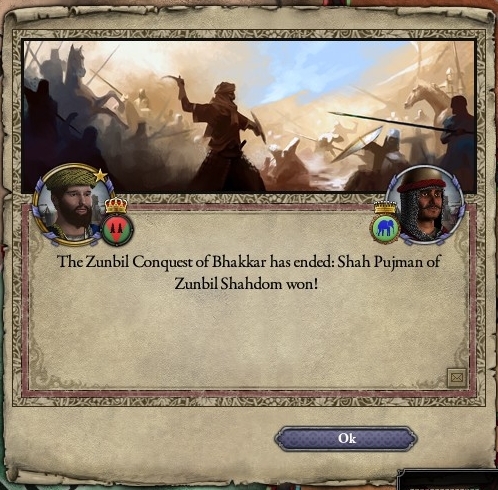  : The Hindu city states fell quickly. : The Hindu city states fell quickly.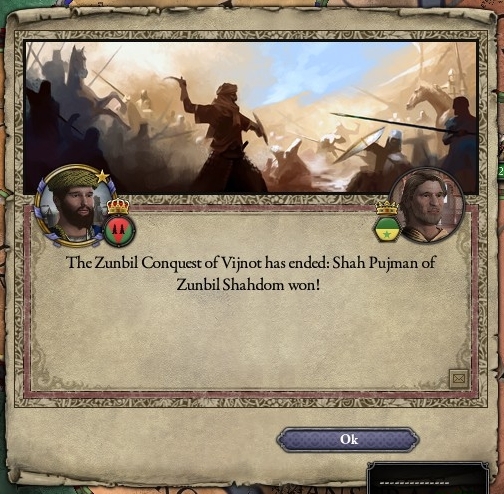  : None would stand against the faithful. : None would stand against the faithful.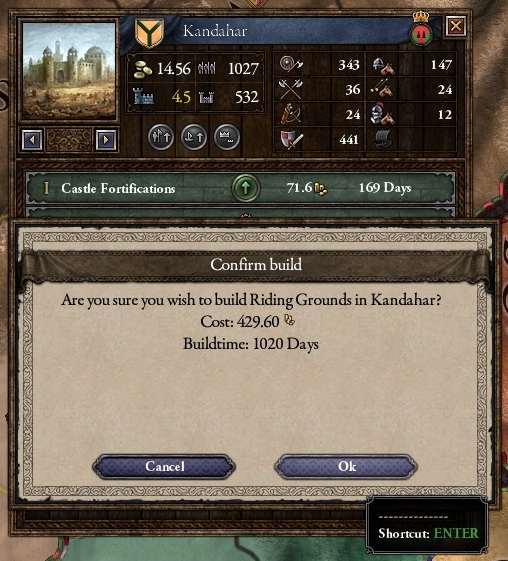  : After Vijnot fell, Pujman went to Kandahar, to rule, as was his duty. He called for more northern steppe warriors, and gave them grazing lands, in return for their service. : After Vijnot fell, Pujman went to Kandahar, to rule, as was his duty. He called for more northern steppe warriors, and gave them grazing lands, in return for their service.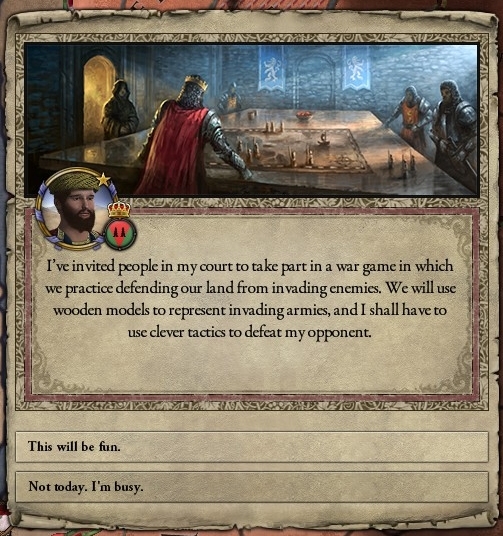  : But even in the capital, as far removed from the front as he could be in Zunbil lands, he warred. : But even in the capital, as far removed from the front as he could be in Zunbil lands, he warred.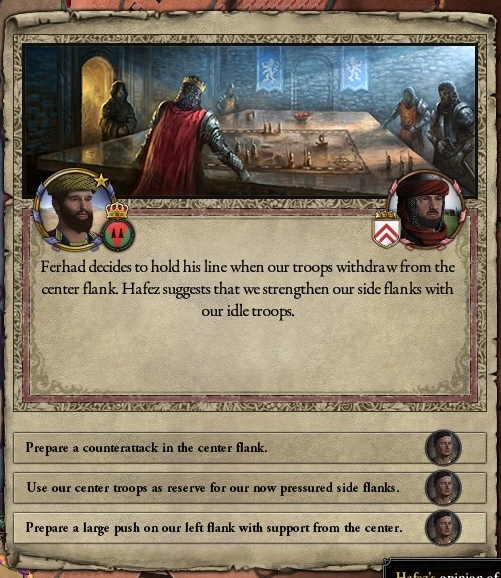  : He said he needed to keep his mind sharp. : He said he needed to keep his mind sharp.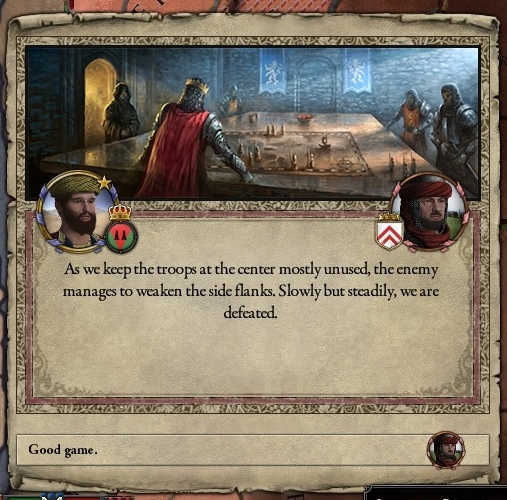  : Said he needed practice. : Said he needed practice. : I travelled west with him. No other Eastern Elders could speak on the light of the Justice Giver. I would speak at his great council. : I travelled west with him. No other Eastern Elders could speak on the light of the Justice Giver. I would speak at his great council.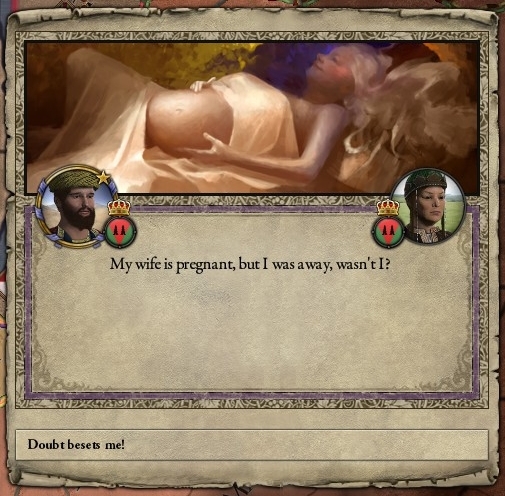  : I saw Pujman rule. I saw the questions in his eyes when his wife grew in her belly. : I saw Pujman rule. I saw the questions in his eyes when his wife grew in her belly.  : I saw him speak with his master of spies. The poor girl. : I saw him speak with his master of spies. The poor girl.  : The Shah's mentor, Xarmandar, Continued the eastern wars. Every month, there were reports of further victories. : The Shah's mentor, Xarmandar, Continued the eastern wars. Every month, there were reports of further victories.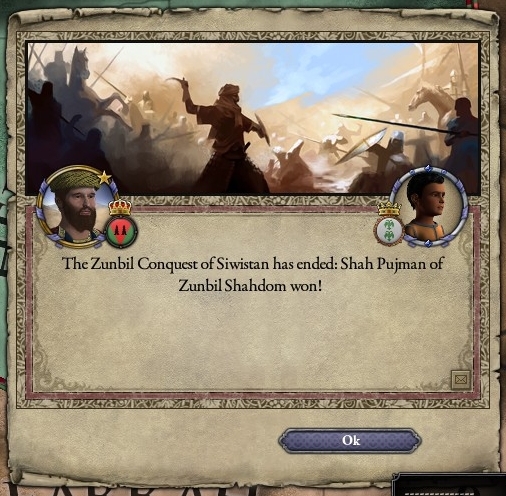  : Every month, another shore of the Indus was painted red. : Every month, another shore of the Indus was painted red.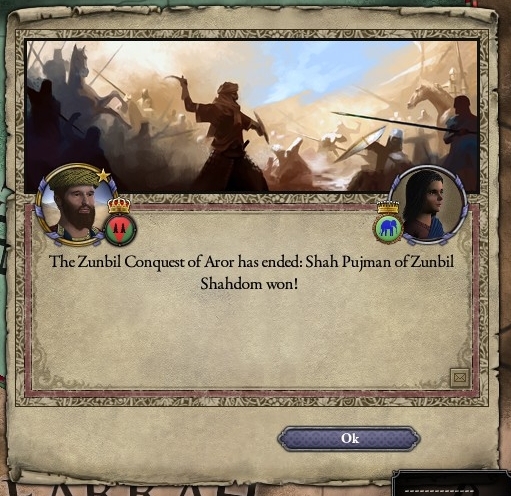  : Every month our neighbours bled. : Every month our neighbours bled.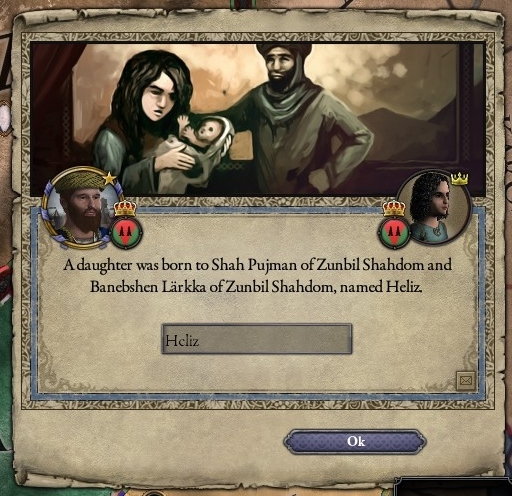  : The Banebshen gave the Shah another daughter. And I saw him look at her. And I felt the fury of the Justice Giver in him. : The Banebshen gave the Shah another daughter. And I saw him look at her. And I felt the fury of the Justice Giver in him.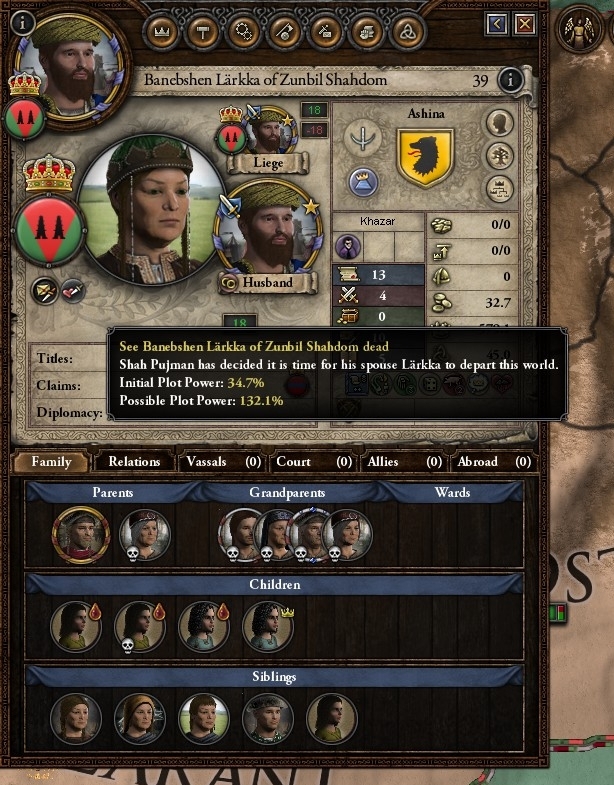  : I do not know what happened to the girl. She went for a walk in the mountains just as the Council of Elders was assembled. : I do not know what happened to the girl. She went for a walk in the mountains just as the Council of Elders was assembled. : The Shah sat on an ivory chair in the corner of the Great Hall in the Sun Palace. He did not speak. He listened to us squabble. : The Shah sat on an ivory chair in the corner of the Great Hall in the Sun Palace. He did not speak. He listened to us squabble.  : Every few days, a runner would enter the chambers as we yelled about the Hindu Gods, and whether the Persians' Ahura Mazda was Zun in a mask. He would silently give the Shah a scroll, and he would nod, and we would know that Indus bled. : Every few days, a runner would enter the chambers as we yelled about the Hindu Gods, and whether the Persians' Ahura Mazda was Zun in a mask. He would silently give the Shah a scroll, and he would nod, and we would know that Indus bled. 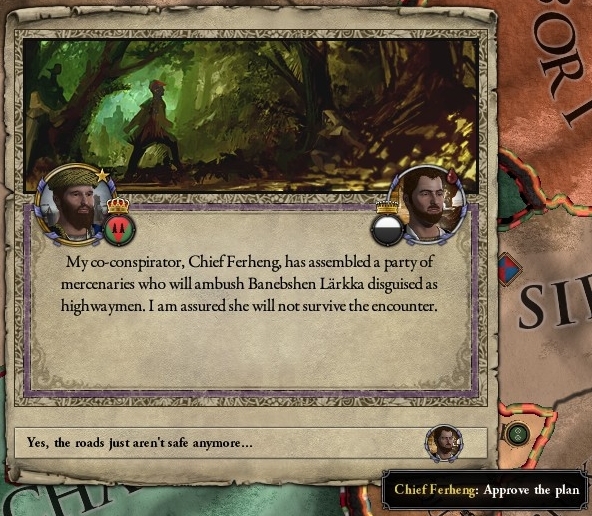  : The Indus did not bleed alone. A runner came in once, with tears in his eyes. He told the Shah that his wife was dead. : The Indus did not bleed alone. A runner came in once, with tears in his eyes. He told the Shah that his wife was dead.  : That the bandits in the mountains cut her throat after she refused to give them her jewels. The Shah said nothing, and bid us continue. : That the bandits in the mountains cut her throat after she refused to give them her jewels. The Shah said nothing, and bid us continue.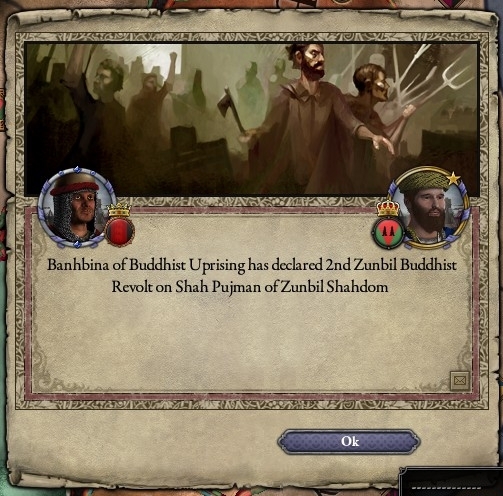  : Some runners brought news of trouble in new provinces of the Zunbil lands. : Some runners brought news of trouble in new provinces of the Zunbil lands.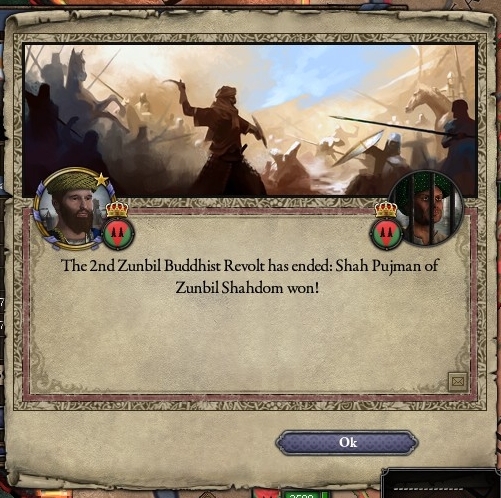  : But not for long. Xarmandar was very good at his job. : But not for long. Xarmandar was very good at his job.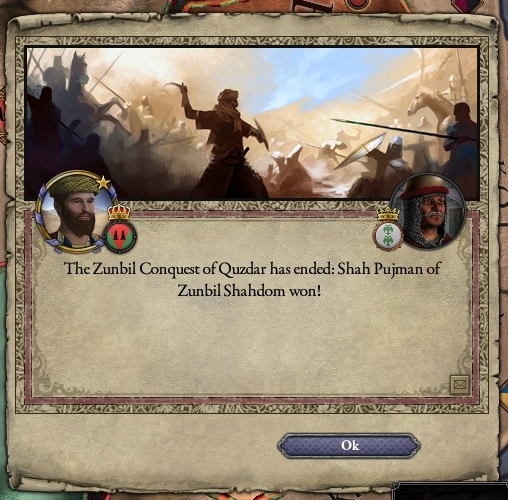  : After a few weeks, we no longer noticed the runners. : After a few weeks, we no longer noticed the runners.  : Our quarries got too heated for us to care. What does it matter which Hindu temple burned with the monks still in it? We screamed at each other over the time of daily prayers. : Our quarries got too heated for us to care. What does it matter which Hindu temple burned with the monks still in it? We screamed at each other over the time of daily prayers. : We noticed the Shah was absent from the council one afternoon. I had asked a page where he had gone, and I was told that he was getting married. But not to worry, he would return by the evening. We were discussing the true nature of The Darkness that day, I believe. : We noticed the Shah was absent from the council one afternoon. I had asked a page where he had gone, and I was told that he was getting married. But not to worry, he would return by the evening. We were discussing the true nature of The Darkness that day, I believe. : Our daily motions became routine. Prayer at breakfast, a few hours of arguing, prayer at noon. Then another meal, and more arguing. Then the sunset prayer. : Our daily motions became routine. Prayer at breakfast, a few hours of arguing, prayer at noon. Then another meal, and more arguing. Then the sunset prayer.  : One day, when a Kabul Elder was threatening to make a Kandahar Elder a eunich if he spoke of the Ilkay letters another time, another runner walked in. He whispered a message to the Shah, and he stood up. : One day, when a Kabul Elder was threatening to make a Kandahar Elder a eunich if he spoke of the Ilkay letters another time, another runner walked in. He whispered a message to the Shah, and he stood up. : He called for a stop to our Council, and that he would return in a few months' time, when we would deliberate again. : He called for a stop to our Council, and that he would return in a few months' time, when we would deliberate again. : I asked him then, what called him away. : I asked him then, what called him away.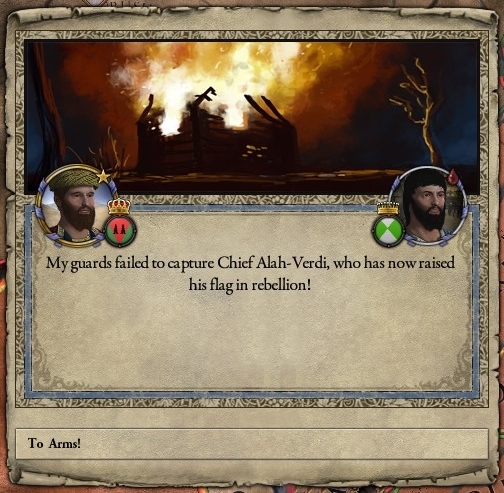  : He just said "I need to kill my cousin" : He just said "I need to kill my cousin"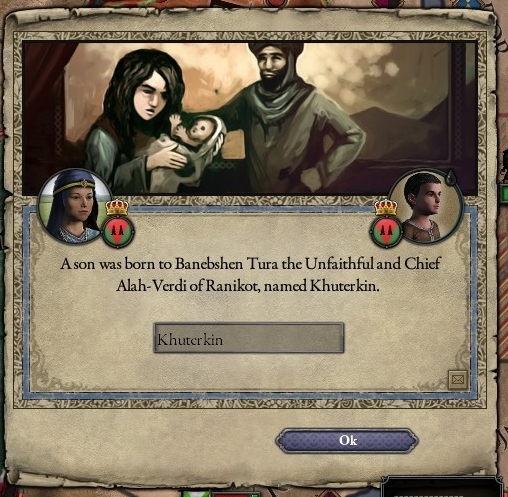  : As we spread throughout Kandahar, unsure of what to do with our time, we heard rumours. Apparently, the Shah's new wife was seduced by his cousin. Her son was not his. : As we spread throughout Kandahar, unsure of what to do with our time, we heard rumours. Apparently, the Shah's new wife was seduced by his cousin. Her son was not his.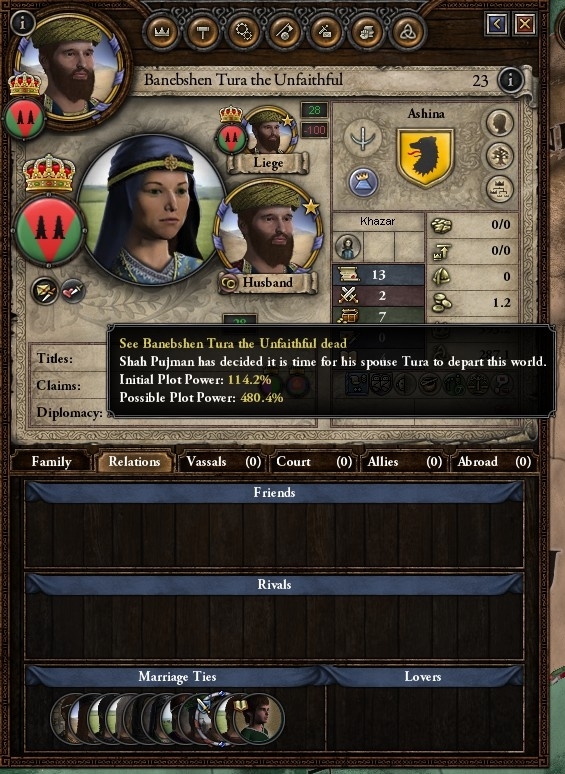  : I remembered Rustam and his wives. Indeed, the Zunbils are more alike than they think. : I remembered Rustam and his wives. Indeed, the Zunbils are more alike than they think.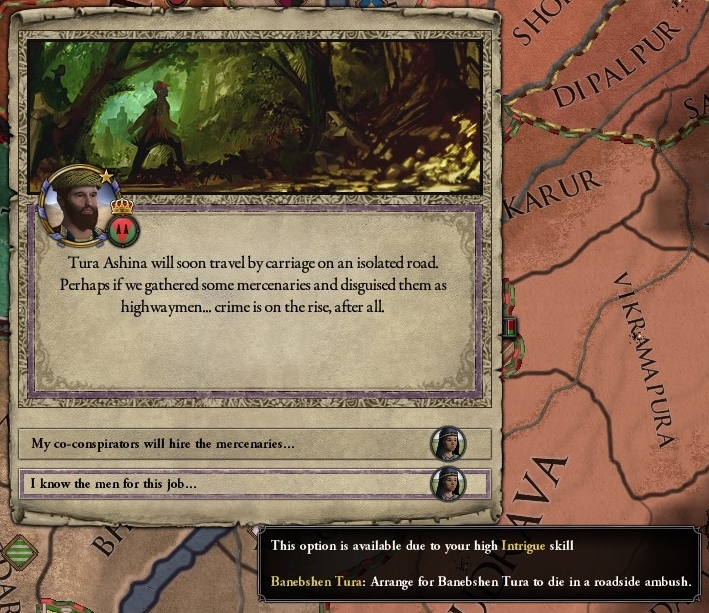  : The girl, barely twenty, went riding with the Steppe horsemen as her guard. : The girl, barely twenty, went riding with the Steppe horsemen as her guard.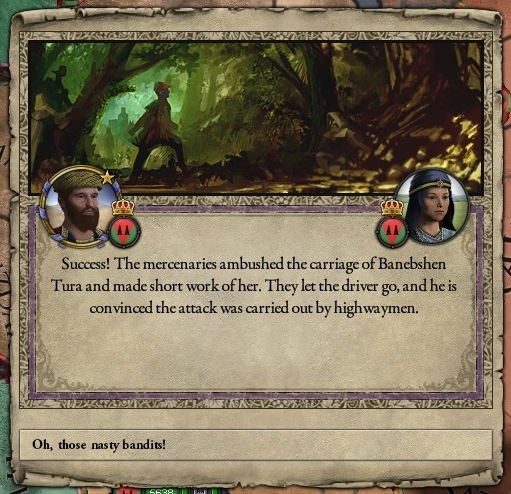  : But horsemen do not war well in our mountains. Only bandits do. : But horsemen do not war well in our mountains. Only bandits do.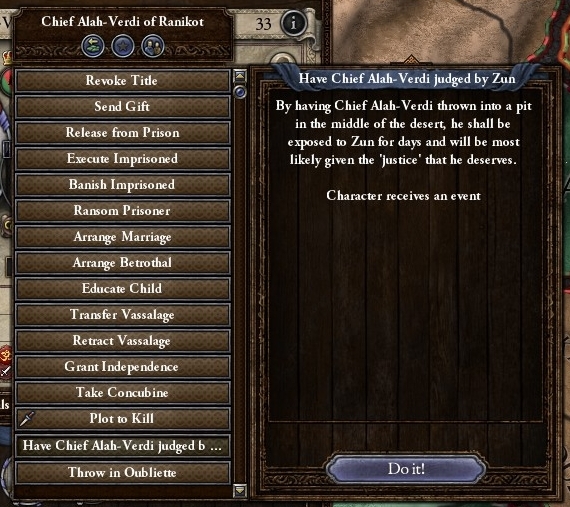  : In a month, the Shah returned. The cousin was dragged through Kandahar behind his horse. He didn't even make it to the pits. Was this a fair judgment? Is this what the Justice Giver wanted from our lords? : In a month, the Shah returned. The cousin was dragged through Kandahar behind his horse. He didn't even make it to the pits. Was this a fair judgment? Is this what the Justice Giver wanted from our lords?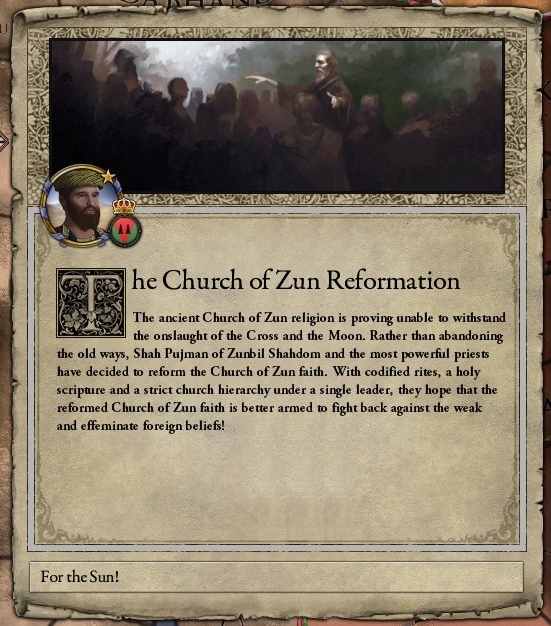  : The Council was summoned. The Shah has declared the First Temple Elders the Solar Justices, and they would sit in judgement over the pits. The Second Temple Elders were named the Stewards of Daylight, and they would gather the tithes from the faithful. The Third Temple Elders were named the Shields of the Sun, and we would punish the unbelievers. : The Council was summoned. The Shah has declared the First Temple Elders the Solar Justices, and they would sit in judgement over the pits. The Second Temple Elders were named the Stewards of Daylight, and they would gather the tithes from the faithful. The Third Temple Elders were named the Shields of the Sun, and we would punish the unbelievers. : The Shah named a young man from the First Temple the High Priest. He would hold the Festivals of the Sun, and he would bless the Zunbil lords. : The Shah named a young man from the First Temple the High Priest. He would hold the Festivals of the Sun, and he would bless the Zunbil lords. : A great collection of all the scribes wrote in the council was written, The Sun Book. None would preach of the Justice Giver without the book. : A great collection of all the scribes wrote in the council was written, The Sun Book. None would preach of the Justice Giver without the book. : I did not like the collection. The Ilkay letters were sacred texts now. As if the wife of a Zunbil spoke for Zun! As if we were to ignore the Hindu gods to the east! : I did not like the collection. The Ilkay letters were sacred texts now. As if the wife of a Zunbil spoke for Zun! As if we were to ignore the Hindu gods to the east! : I went west, to Farrah. And I preached the old ways there. : I went west, to Farrah. And I preached the old ways there.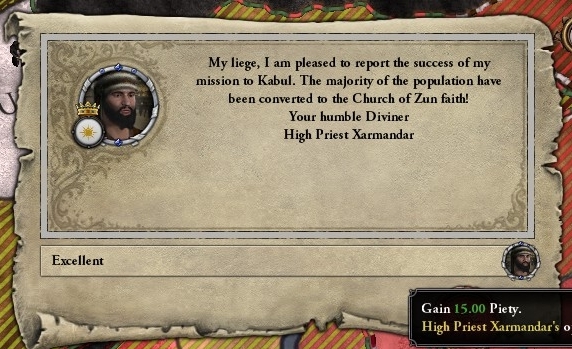  : But many took the book to heart. The young High Priest spoke in Kabul, and his words were fire. : But many took the book to heart. The young High Priest spoke in Kabul, and his words were fire.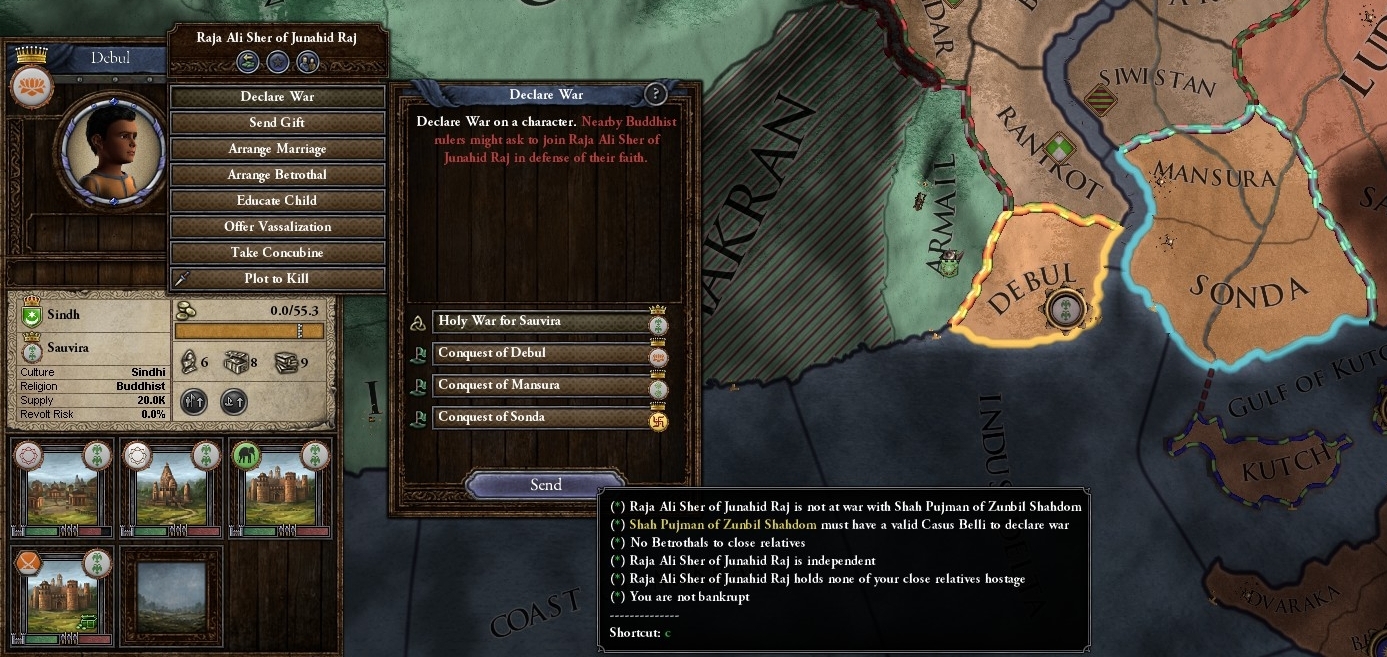  : And the Solar Justices blessed Pujman's war for the Indus. : And the Solar Justices blessed Pujman's war for the Indus.  : And many men, with no lands, and no claims, went to the Shah, and named themselves the Knights of the Sun. : And many men, with no lands, and no claims, went to the Shah, and named themselves the Knights of the Sun.  : And the Shah gave them land, and gave them masons. : And the Shah gave them land, and gave them masons.  : And in thanks, and because his cause was holy, they marched with him to the Indus delta, and they spilt the blood of the unbelievers into the ocean. : And in thanks, and because his cause was holy, they marched with him to the Indus delta, and they spilt the blood of the unbelievers into the ocean.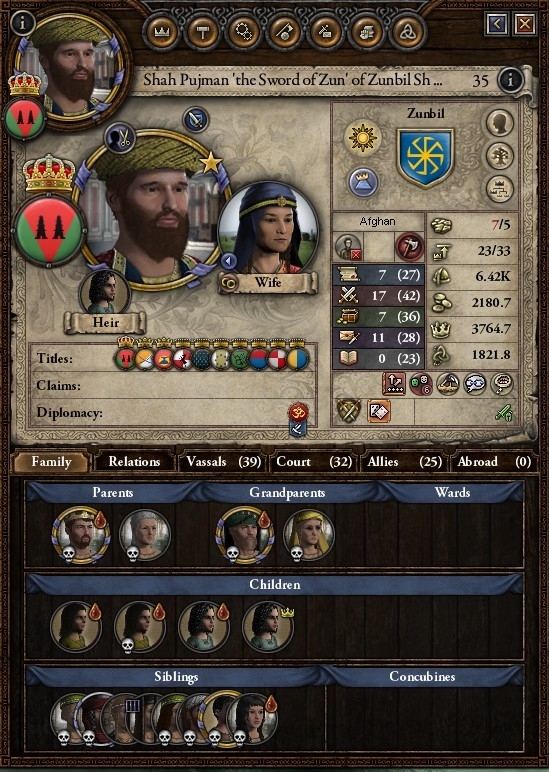  : The Sword of Zun they called him. An apt name. None shed more blood for Zun than Pujman, none killed as many women, none sent as many children to die for the Justice Giver. : The Sword of Zun they called him. An apt name. None shed more blood for Zun than Pujman, none killed as many women, none sent as many children to die for the Justice Giver.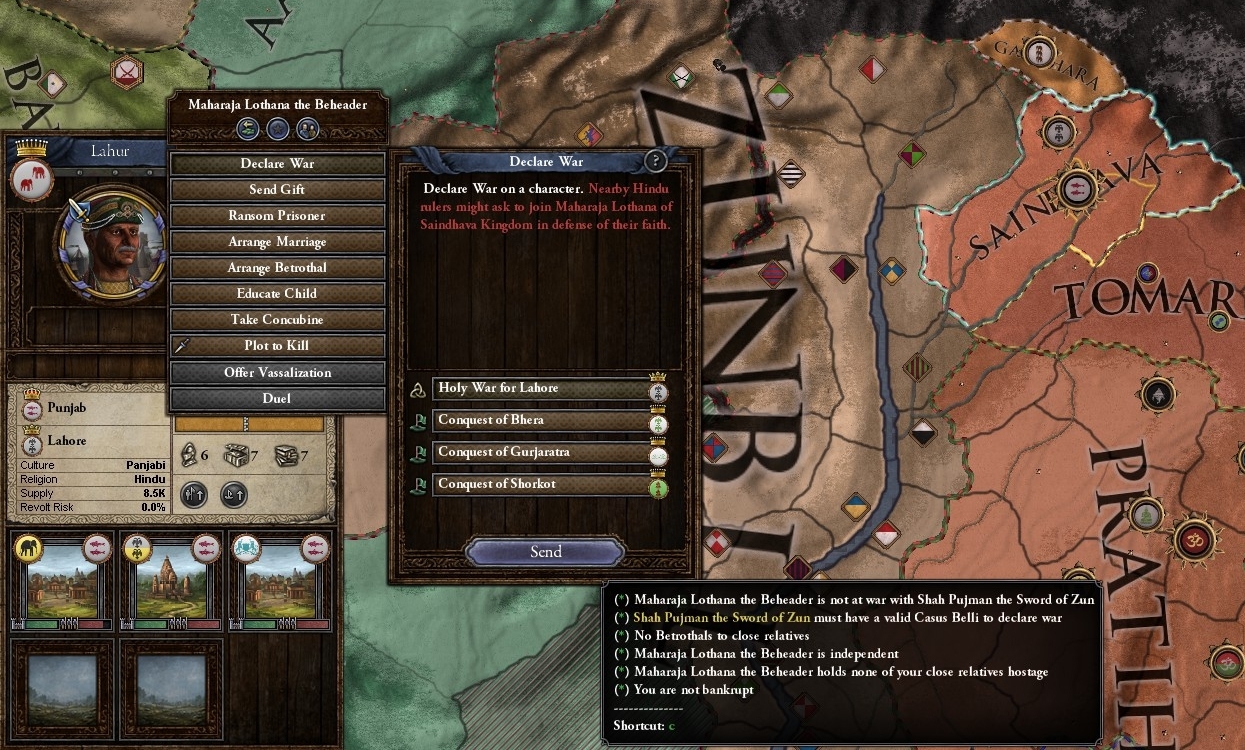  : And it was not enough. Having conquered the Indus, Pujman turned still further east. He would claim all the Punjab lands for Zun. : And it was not enough. Having conquered the Indus, Pujman turned still further east. He would claim all the Punjab lands for Zun.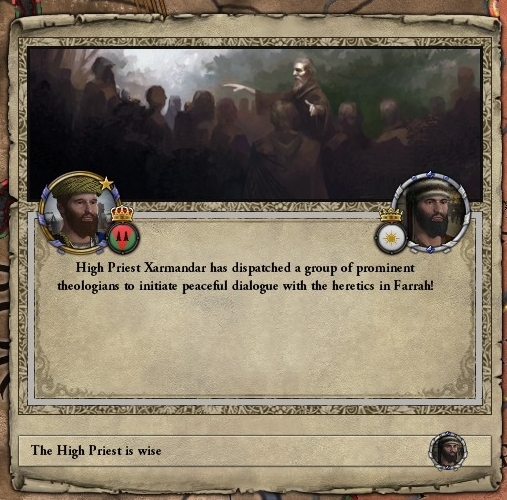  : Eventually, of course, the priests have heard of my preaching. They sent some Elders from the Kandahar Council to speak with me, to teach me the error of my ways. : Eventually, of course, the priests have heard of my preaching. They sent some Elders from the Kandahar Council to speak with me, to teach me the error of my ways.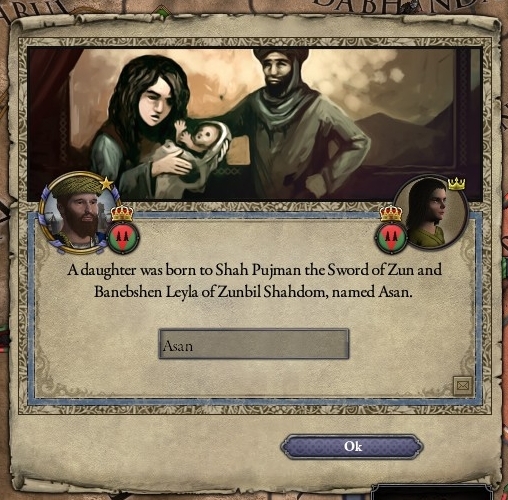  : At least I found solace in the fact that the Shah had no sons. The unbroken Zunbil line would die with him. There would be much war. : At least I found solace in the fact that the Shah had no sons. The unbroken Zunbil line would die with him. There would be much war.  : The Kabul Elders came to Farrah. They spoke to me in front of the crown, in front of my flock. They spread their lies, their cheap political tricks, through my town. I spoke the truth of the Justice Giver. And even they saw that. : The Kabul Elders came to Farrah. They spoke to me in front of the crown, in front of my flock. They spread their lies, their cheap political tricks, through my town. I spoke the truth of the Justice Giver. And even they saw that.  : As their "theologians" ran back to Kabul, we heard news. Punjab belonged to the Zunbils now. : As their "theologians" ran back to Kabul, we heard news. Punjab belonged to the Zunbils now.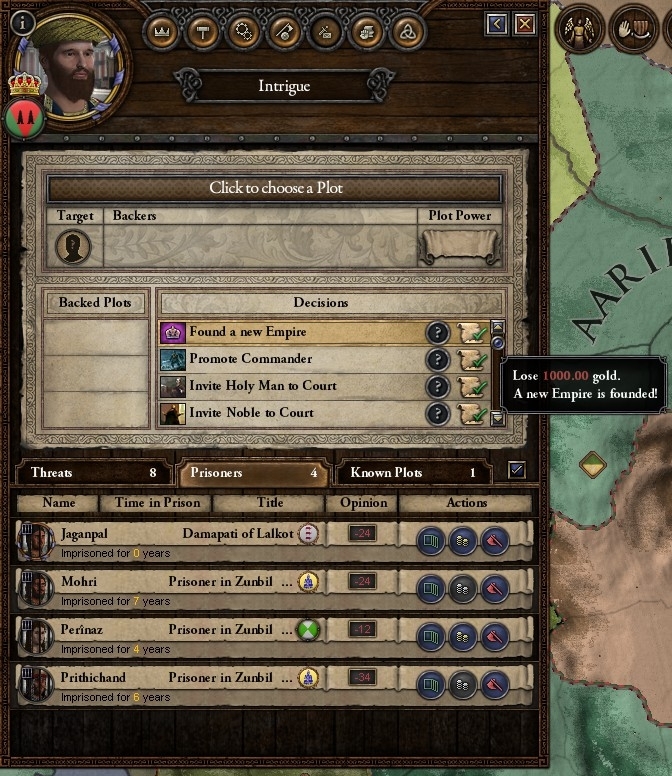  : A great celebration was called in Kandahar. Even I went to the capital to see it. : A great celebration was called in Kandahar. Even I went to the capital to see it. : In front of the Kandahar Sun Temple, Pujman carried with him three crowns: Afghanistan, Punjab and Sindh. The High Priest took the three from him, and offered them to Zun. And from the three, one was given back. A magnificent crown, with rubies of Afghanistan, kundans of Punjab and the fabric of Sindh. The Crown of Zere, they called it. : In front of the Kandahar Sun Temple, Pujman carried with him three crowns: Afghanistan, Punjab and Sindh. The High Priest took the three from him, and offered them to Zun. And from the three, one was given back. A magnificent crown, with rubies of Afghanistan, kundans of Punjab and the fabric of Sindh. The Crown of Zere, they called it. : The High Priest placed the crown on Pujman, and proclaimed that from now on, and until The Darkness consumes the world, he was the first Shahanshah of the Solar Empire of Zun. : The High Priest placed the crown on Pujman, and proclaimed that from now on, and until The Darkness consumes the world, he was the first Shahanshah of the Solar Empire of Zun.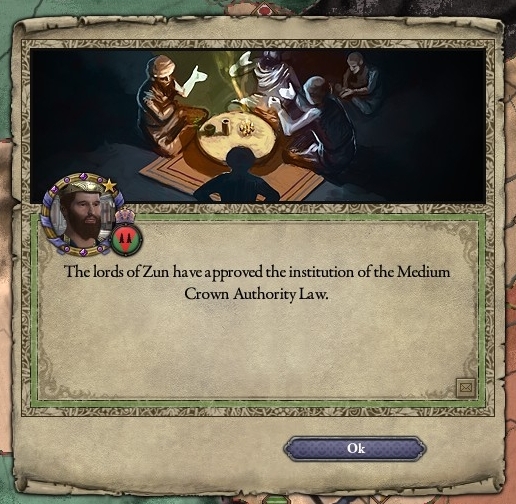  : And the Satraps from the Zunbil lands, Zunbils to a man, bent their knee and offered him their loyalty. : And the Satraps from the Zunbil lands, Zunbils to a man, bent their knee and offered him their loyalty.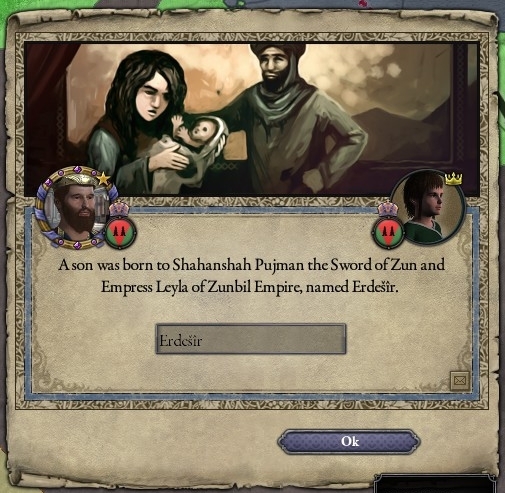  : And his wife, the Empress Leyla, a young girl from the northern steppes, brought his son and true heir to him. : And his wife, the Empress Leyla, a young girl from the northern steppes, brought his son and true heir to him. : It was done. The old Zunbils, with the wisdom of Jimofuta, were gone. These vultures ruled the land now, ruled their "empire". : It was done. The old Zunbils, with the wisdom of Jimofuta, were gone. These vultures ruled the land now, ruled their "empire".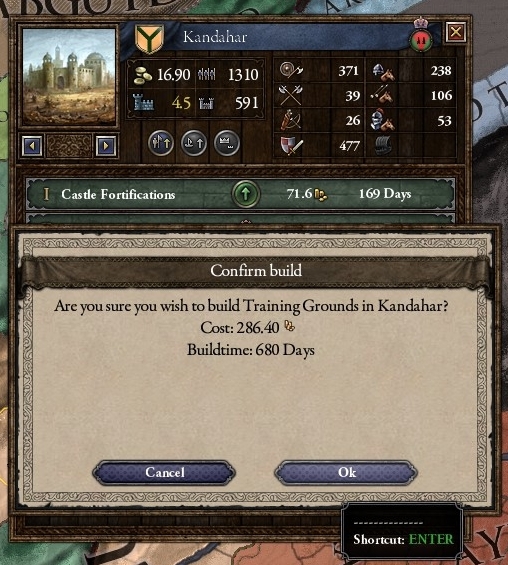  : And the Zunbil 500 was raised, men loyal to the new Shahanshah alone. : And the Zunbil 500 was raised, men loyal to the new Shahanshah alone.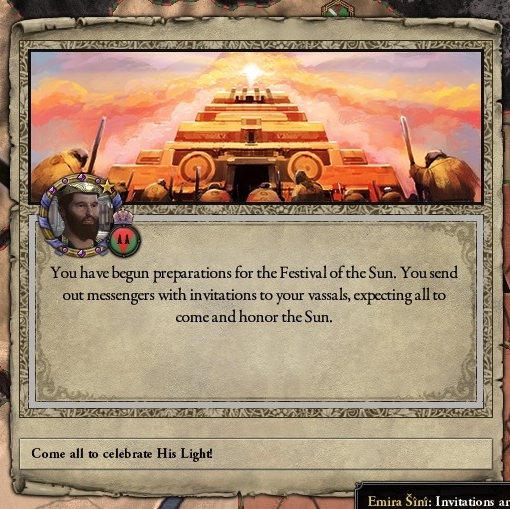  : The Shahanshah then proclaimed the First Imperial Festival of the Sun. : The Shahanshah then proclaimed the First Imperial Festival of the Sun.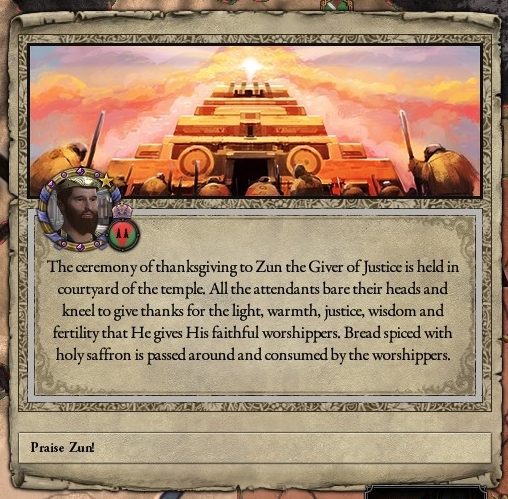  : And many men went around the temple, and many were blessed with His light. : And many men went around the temple, and many were blessed with His light.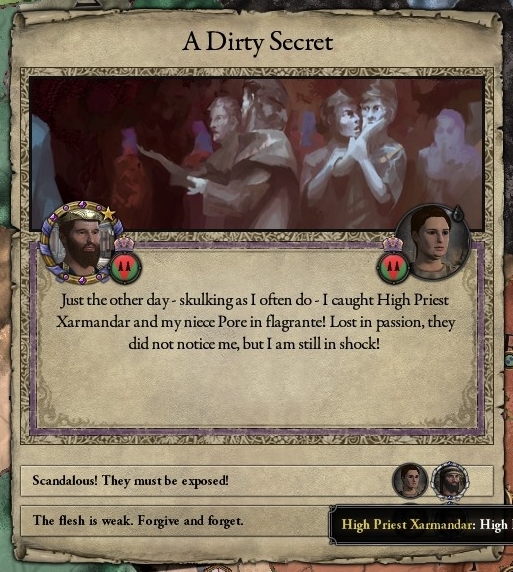  : And the High Priest, a mere boy, came up to me with a Knight of the Sun at each side. And he told me he was sorry. He told me he loved my speeches at the Kandahar Council. He told me he knew how much peace I brought to Farrah. But they knew of what he had done with the Shahanshah's nice. : And the High Priest, a mere boy, came up to me with a Knight of the Sun at each side. And he told me he was sorry. He told me he loved my speeches at the Kandahar Council. He told me he knew how much peace I brought to Farrah. But they knew of what he had done with the Shahanshah's nice. : He said he hoped I understand. : He said he hoped I understand. : The Knight of the Sun was a quick, hardened soldier. I did not even see him reach for the dagger. : The Knight of the Sun was a quick, hardened soldier. I did not even see him reach for the dagger.The Old Afghan stops, and leans on the younger man. He unravels his headscarf, and rubs the deep scar on his neck. The Sun inches its way to the horizon. The old man looks directly at it. He no longer notices the younger man.  : Tell me, Justice Giver, is this your justice? Is this how you reward your servants? I have fought for you, on the field, and in the council! I have bled for you, in the great Indus, and in front of your temple! And yet I do not sit by your side, I wander here! For countless centuries, I wander here! : Tell me, Justice Giver, is this your justice? Is this how you reward your servants? I have fought for you, on the field, and in the council! I have bled for you, in the great Indus, and in front of your temple! And yet I do not sit by your side, I wander here! For countless centuries, I wander here!The old man rips his chain off his neck. He grasps his amulet so tight that blood flows from his hands. He doesn't seem to notice.  : What more could you wish of me? What more can I give you? : What more could you wish of me? What more can I give you?He stares down at the small bronze sun in his hand. It is the last piece of him. He has nothing else. He grips it tight, and throws it to the horizon. His legs give out once more, and he collapses on the sand, cold, alone, angry and afraid. He is spent. And then the sun speaks. I wish for nothing more. The old man opens his eyes, and stares into the sun, hearing the voice of the one so dear to him, for first time in six hundred years. Your trials are over, Darwesh. You are free. With tears in his eyes, the old man smiles and stands up. Darwesh closes his eyes shut, and whispers  : Thank you, lord. : Thank you, lord.And he is gone. ... The Caravan stands without a guide. In the distance, a dune flattens, and they finally see the waves. A lone figure walks from the sea to them. Someone must always lead the Caravan of the Dead.
|
|
|
|
History Update 5 - The Road to a Nation State Last time we checked out the damage the Mongol successor states left on Afghanistan. Today, we're going to look at the changing of hands that eventually ended up with a brief nation state, controlled by Afghans alone. 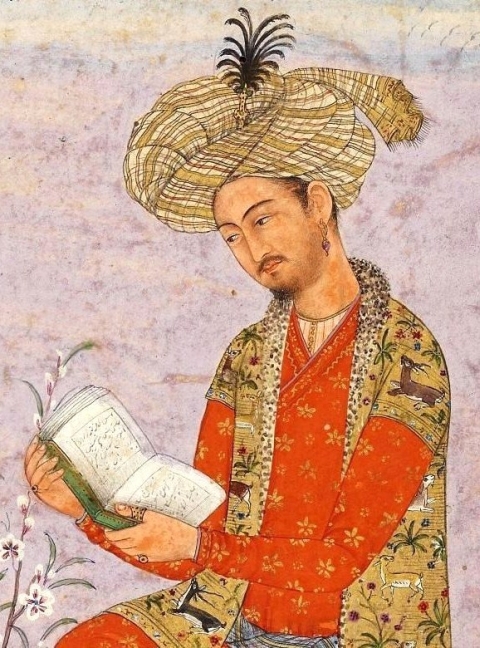 As the Timurid control over the area waned in the late 1400s, a young man came on the throne in modern eastern Uzbekistan. Zahir-ud-din Muhammad Babur took the throne at age 11, after his father fell off a wall while tending to his pigeons. almost immediately, he went to war against his uncles, who ruled nearby kingdoms, and wanted his younger brother on the throne. Babur himself was descended from Timur on his father's side, and Genghis on his mother's. Babur fought for control of Samarkand and his home city of Ferghana, eventually losing both at 18. He settled in Tashkent for a few years, gathering an army. He marched on Kabul, ruled by an infant, and took the city, forcing the local nobles to retreat couth to Kandahar. He stayed at Kabul as his relatives slowly lost their lands, leaving him with the only Timurid in power. He named himself Padshah (emperor), ruling over all of three cities. To expand east, he pledged loyalty to the Shah of Safavid Persia, Ismail, and together they went east. 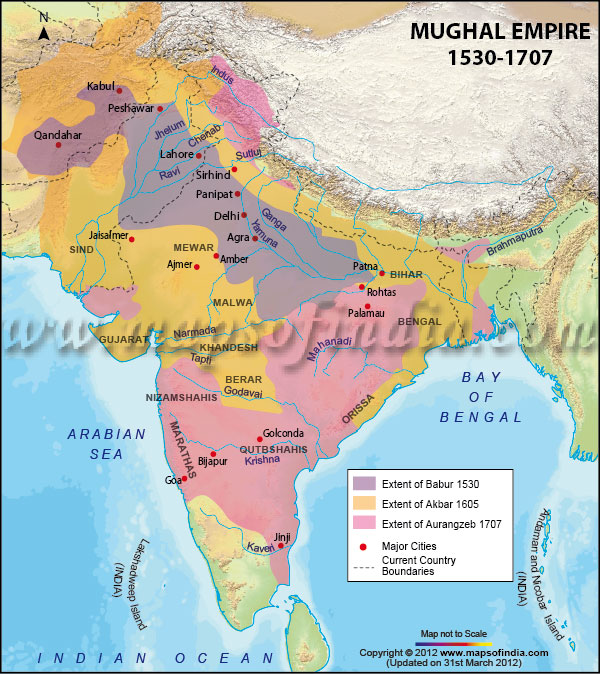 Over the next twenty years, his armies took over Punjab and the rest of Northern India. He formed a new dynasty, the Mughals (referred to as either Timurids, or Hindustani), who went on to conquer practically the whole of India. Eastern Afghanistan remained in their hands until the Persian Shah Nader sieged it in 1738.  Western Afgahnistan, however, was under the rule of the Safavid Persians. Ismail I, who worked with Babur to conquer Central Asia, was a zealous Shia man from a long line of Sufi mystics. As a young man, he proclaimed himself the Shah of Azerbaijan after avenging his father's death. He later conquered Iran, then ruled by the Ak Koyunlu, a tribal Turkic federation. Naming himself Shahanshah, King of Kings, he continued his campaigns, and conquered the Uzbeks, the Caucus, Mesopotamia and Eastern Anatolia. He disliked Uzbeks in particular, and after their ruler was killed in battle, used his skull as a goblet. 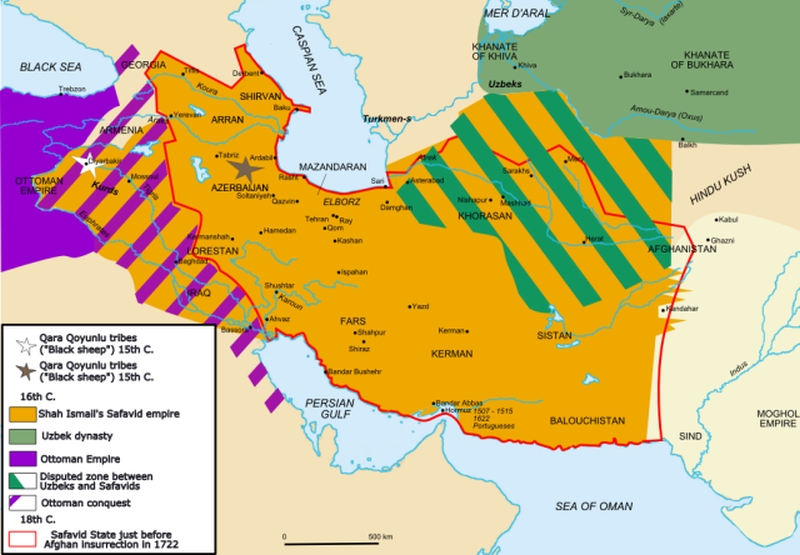 Eventually, Ismail lost a war against the Ottomans (they brought guns), and the Safavids had to settle for ruling Persia. His children continued to rule Persia until the early 1700s. Since they originated from Shia Sufi order, their empire was Shia, with a lot of conversion efforts. This is where the hero of this story comes in.  Mirwais Hotak was a tribal chief from near Kandahar. As he ruled, he saw his people suffering from forceful conversions of the Safavids that ruled the west, as well as periodic raids from the Mughals to the east. He ingratiated himself with the Persian Shah, enough to be allowed to go on Hajj to Mecca, despite being a potential political problem. While in Mecca, he urged for a fatwa against the Shias converting his people. The fatwa was granted, and he returned home. 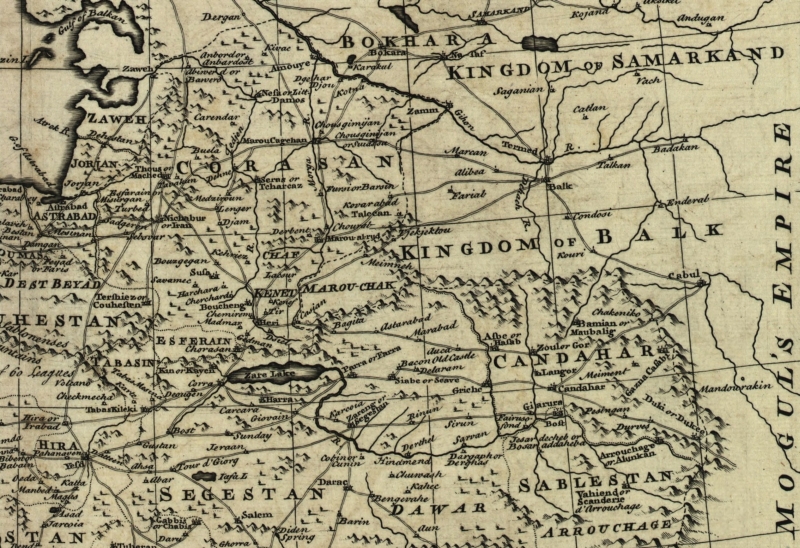 There he began to organize forces and finally, in 1709, when the city garrison was out on patrol, stormed the palace and killed Gurgin Khan, the Persian governor. He then proclaimed Greater Kandahar to be independent, refused the title of King, and was referred to as Prince of Kandahar and General of the National Troops. The Persians sent 30 000 troops to quell the rebellion, of which only 700 returned. Another army was sent two years later, and met the same fate. We will end our exploration of Afghanistan history here, on something of a happy note for once. A small Afghani state ruled by the Afghani. TL;DR: The descendants of Timur settled in India and fought the Persians for the area, only to be very briefly outwitted by a local who organized an independence movement.
|
|
|
|
Film Update 5 - Faith and Trust Today's update dealt with faith, and attempting to merge into something singular and coherent. We finally found out the Old Afghan's name and why he was hiding it. And we saw the awful things a man is capable of with faith.  With that in mind, today's movie is Life of Pi, directed by Ang Lee. More likely than not, you've heard of this movie, it got a lot of press around the Oscars two years years ago. Life of Pi deals with the travels of a young boy, trapped on a life raft with a tiger, as he tries to make it to safety after a shipwreck. Pi himself talks a lot about faith, and how different aspects of it come together. At the time of the voyage, he was a Hindu, a Muslim and a Christian all at once. While on the raft, Pi has to deal with Richard Parker, the tiger that also survived the shipwreck. Eventually they come to a sort-of understanding, with separate territory, and mutual respect for the duration of their journey.  Life of Pi is not a subtle movie. It pretty much beats you over the head with its themes, leaving very little room for doubt. However, I appreciate the themes it tries to explore. Plus, it is a very pretty movie. That's always a big plus with me. And hey, the tiger, who was done entirely with CGI, looks great. Check it out. I recommend not being very sober, it helps a lot.
|
|
|
|
The Caravan of the Dead - 869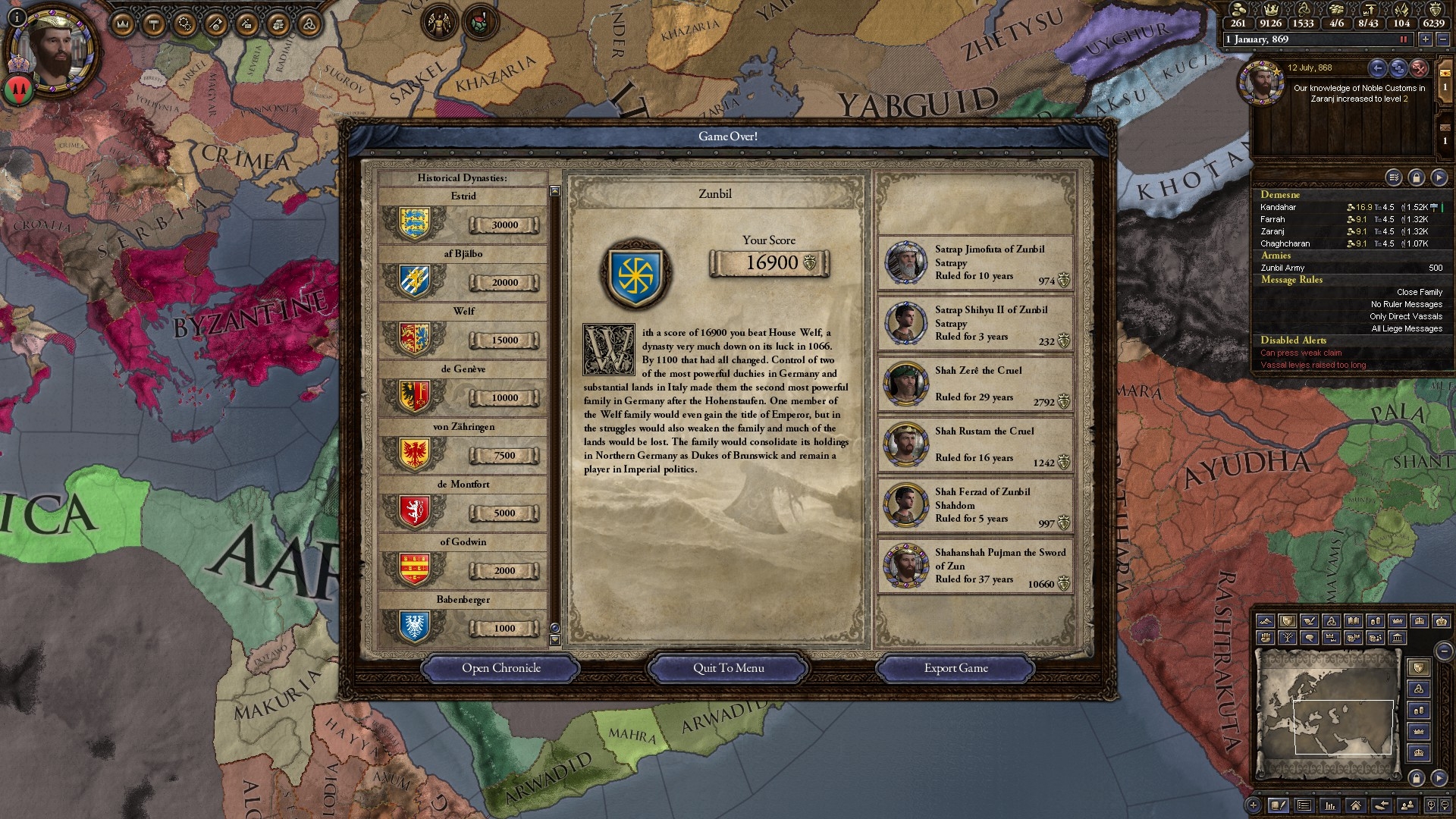 And so, with this update, we say good bye to the servants of the Justice Giver. 4 major rulers and about fifty-seven civil wars later, we leave behind a somewhat stable state, with every count being related to every other count. A perfect recipe for success and stability. 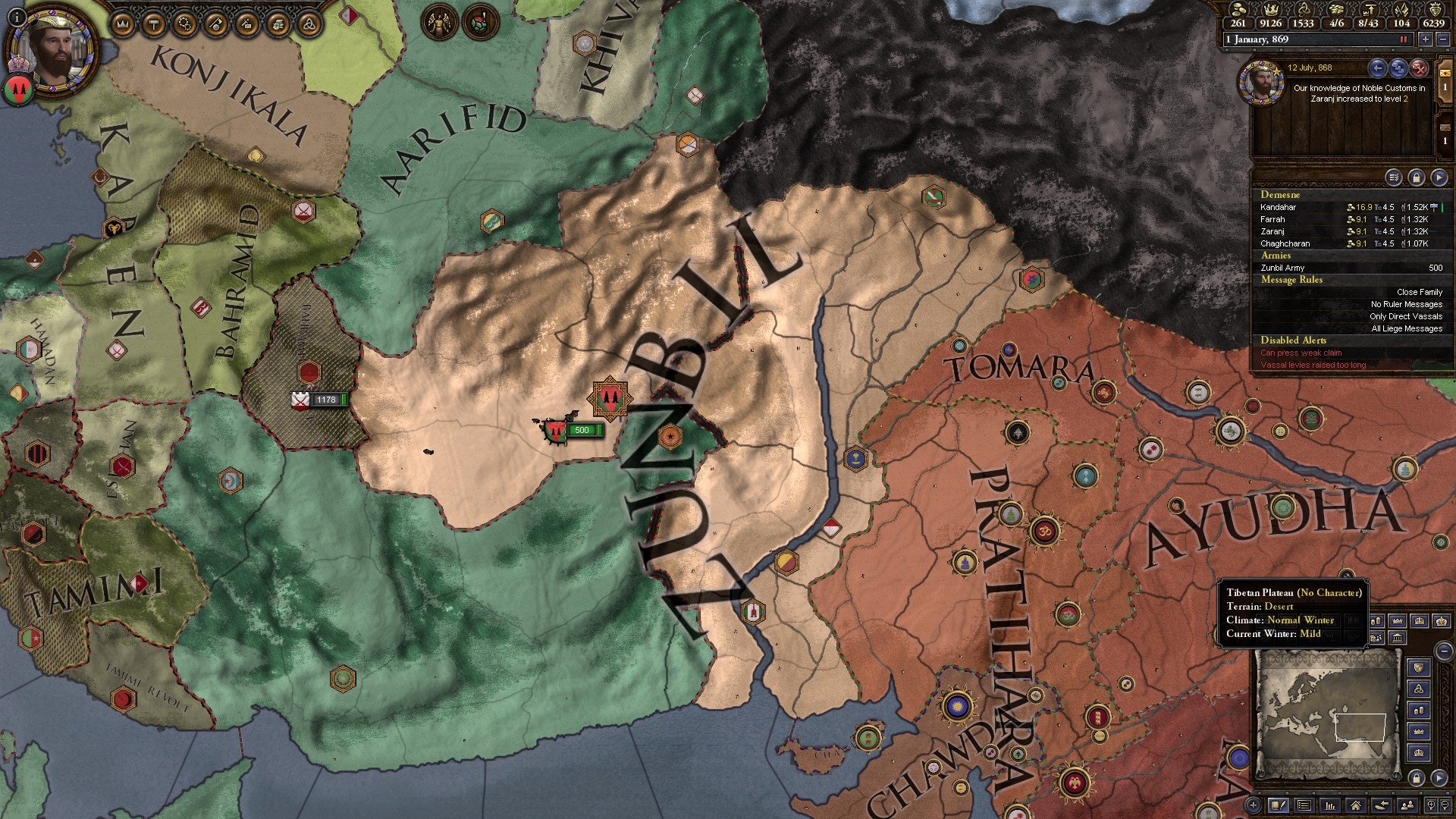 The three kingdoms of the sun: Afghanistan, Punjab and Sindh, are firmly under Zunbil control. 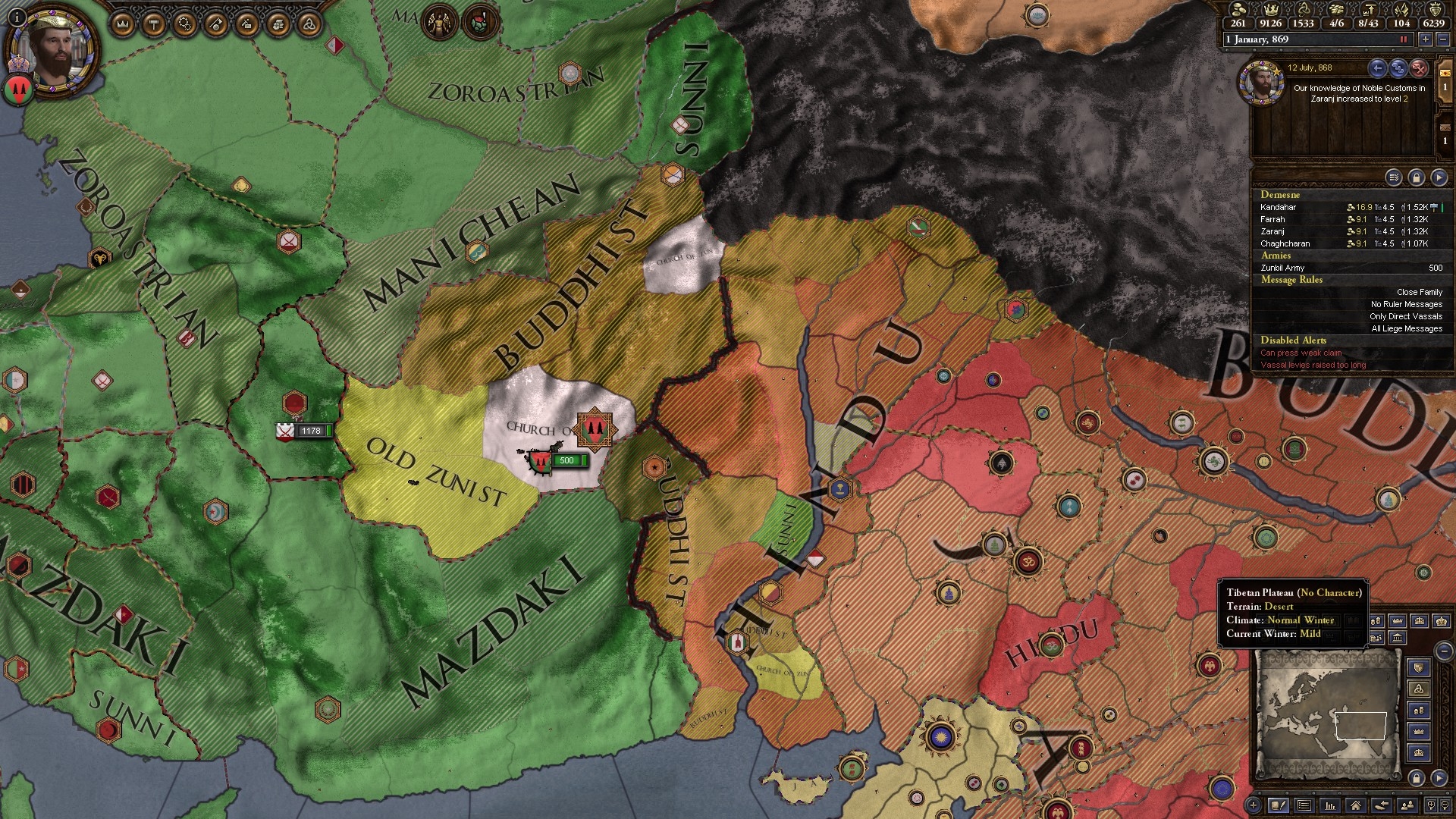 However, worship of Zun has not spread nearly as far as I'd like, probably leading to about a century of religious uprisings, if the dynasty keeps themselves together. 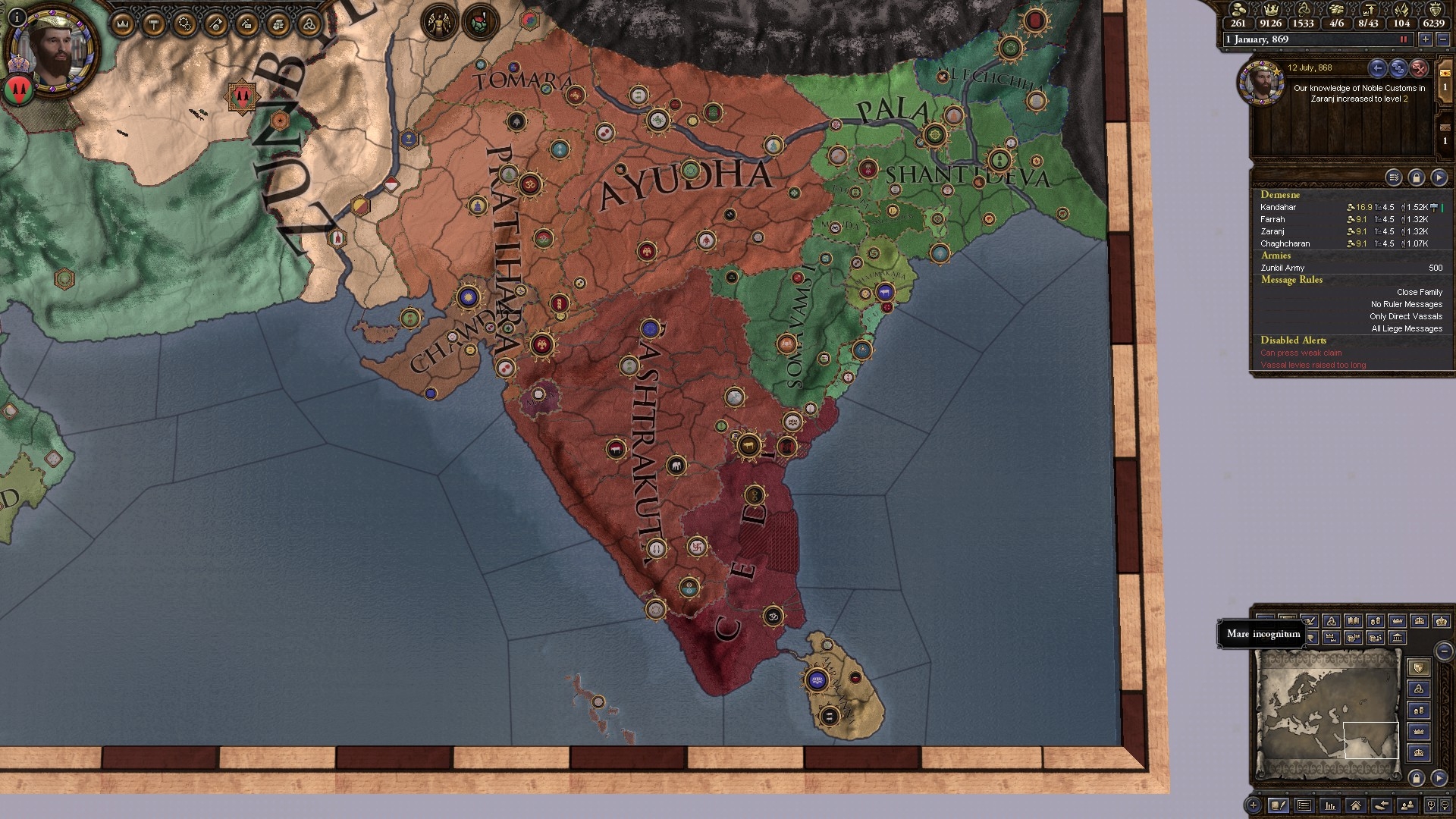 To the east, seven major Indian Kingdoms fight to form their own empires, and maybe, one day, to take the Indus back from the Sun-worshippers. 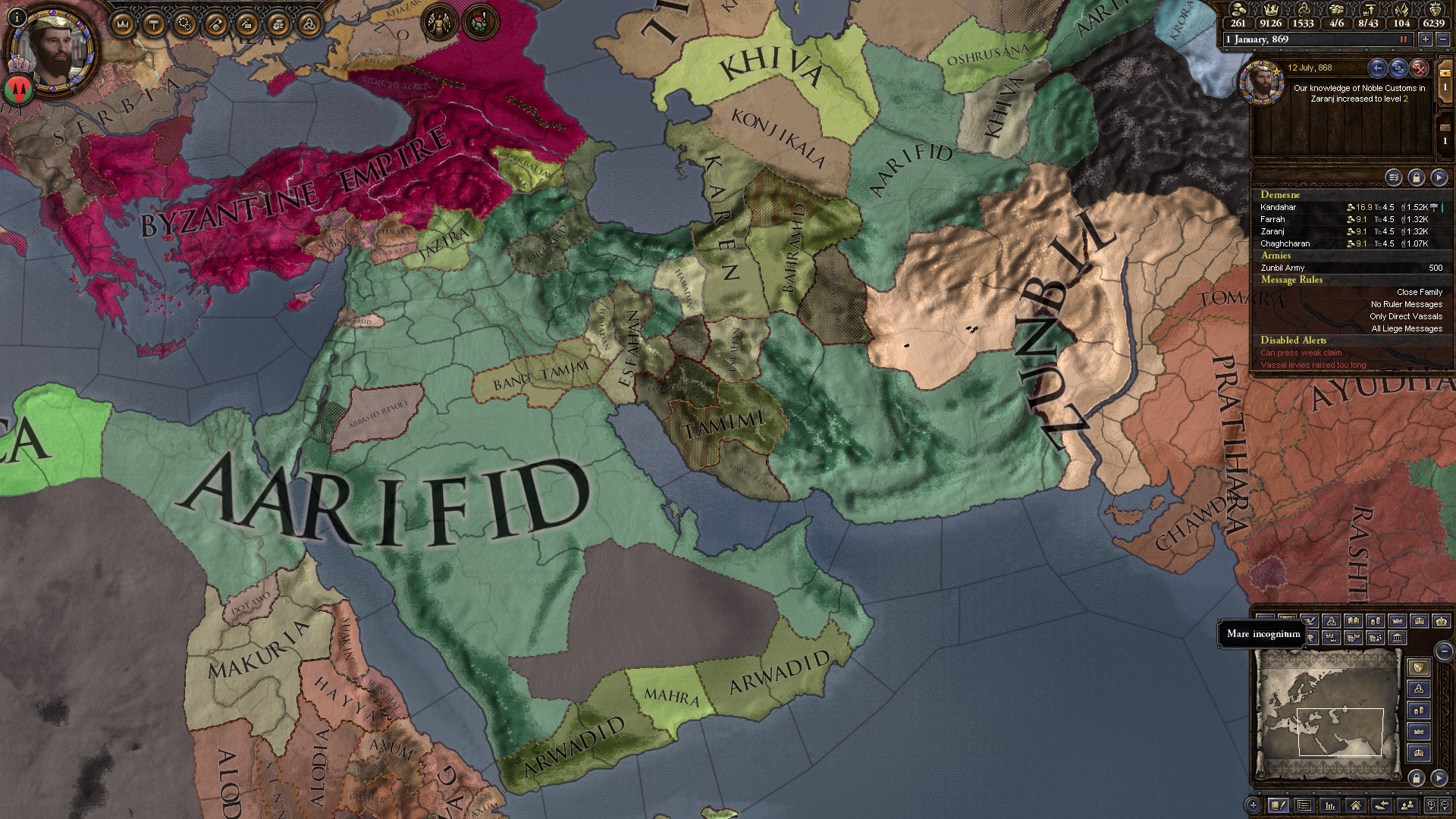 To the west, the Aarifids fight on against the Byzantines, as all Caliphs do. Whether or not the breakaway states get absorbed before the Caliph turns his gaze on Afghanistan is too early to tell. 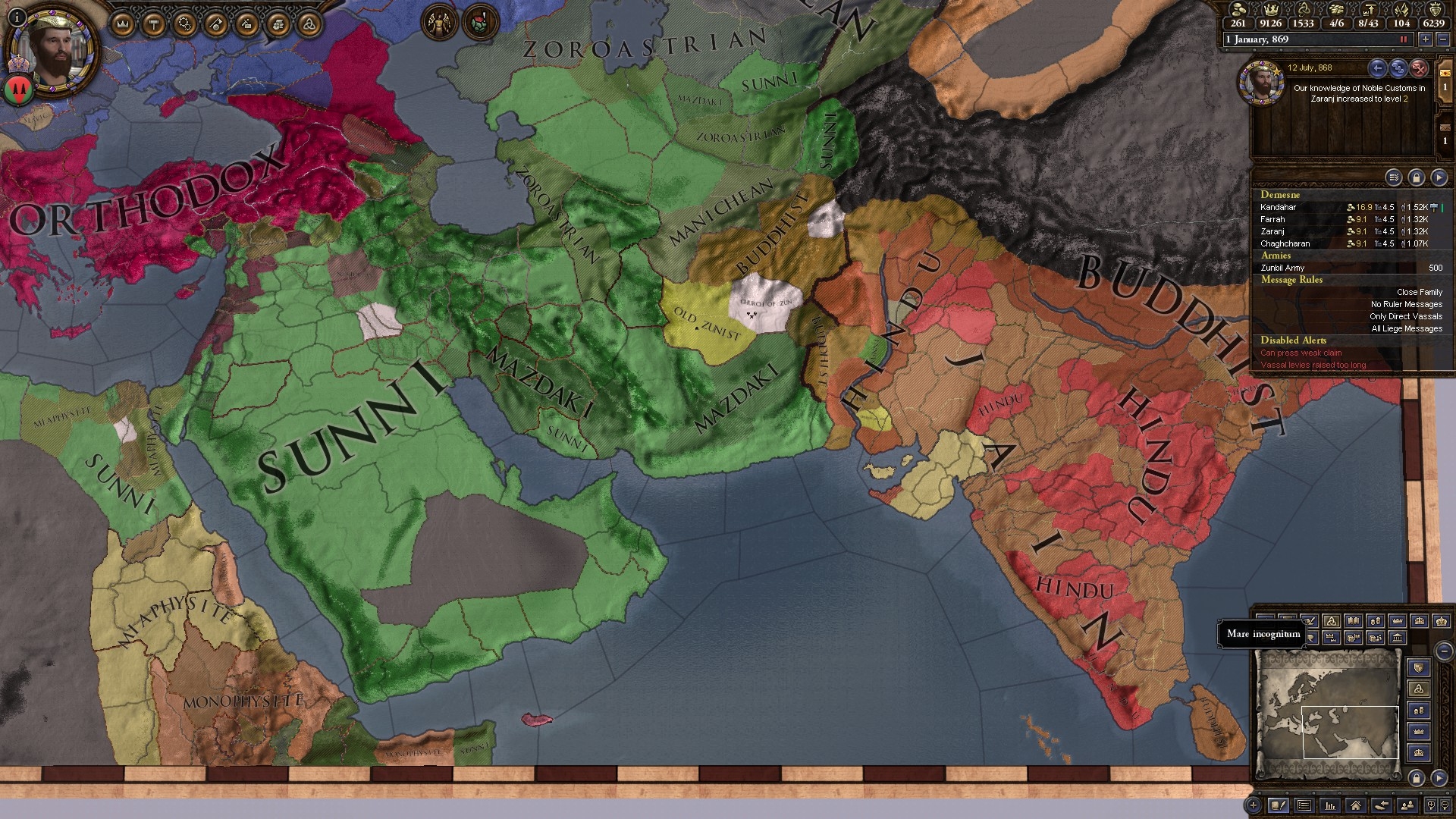 The faithful of the East continue to squabble among themselves, as always. 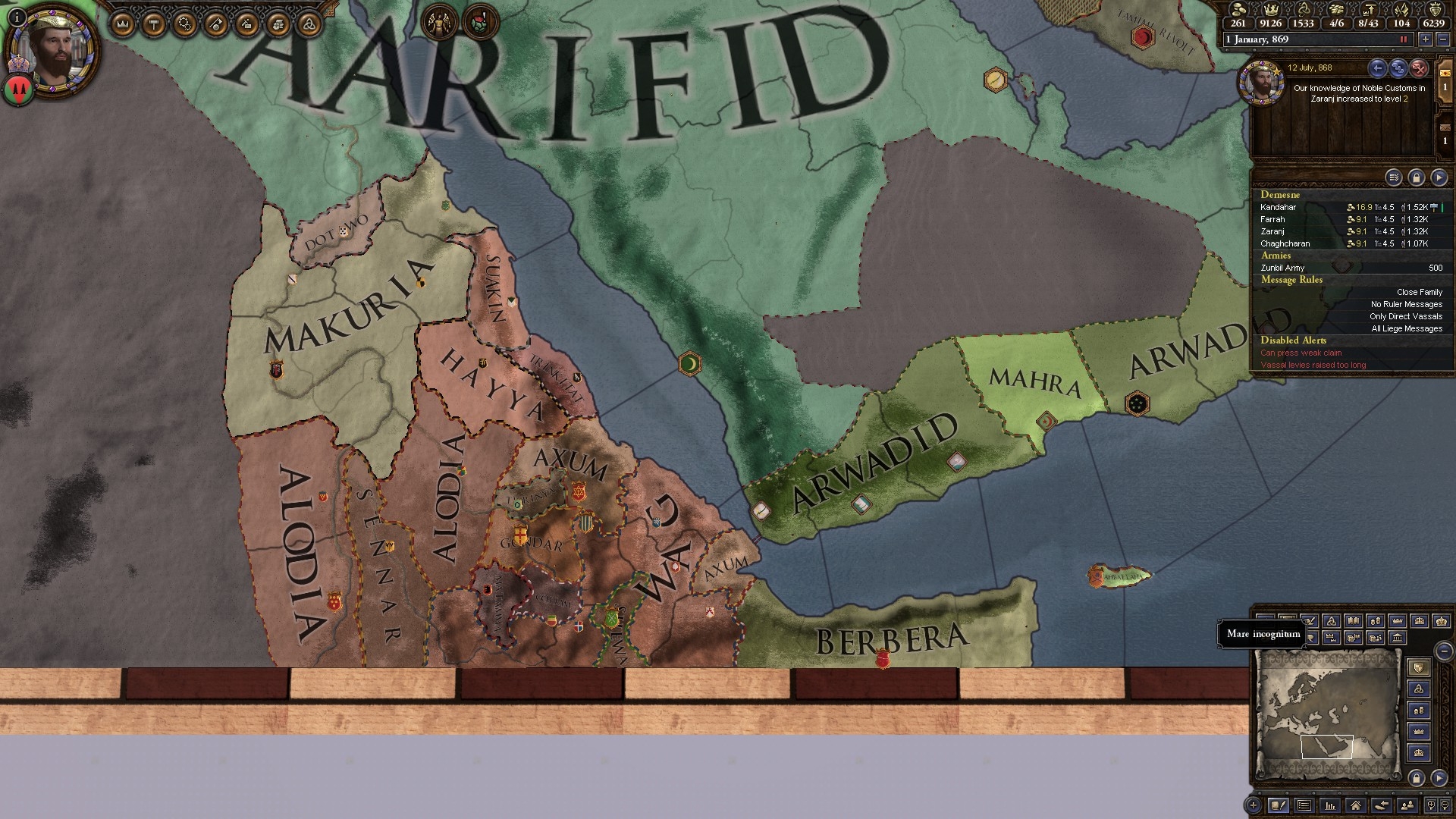 In East Africa, the Abyssinian state has shattered into a dozen fragments. 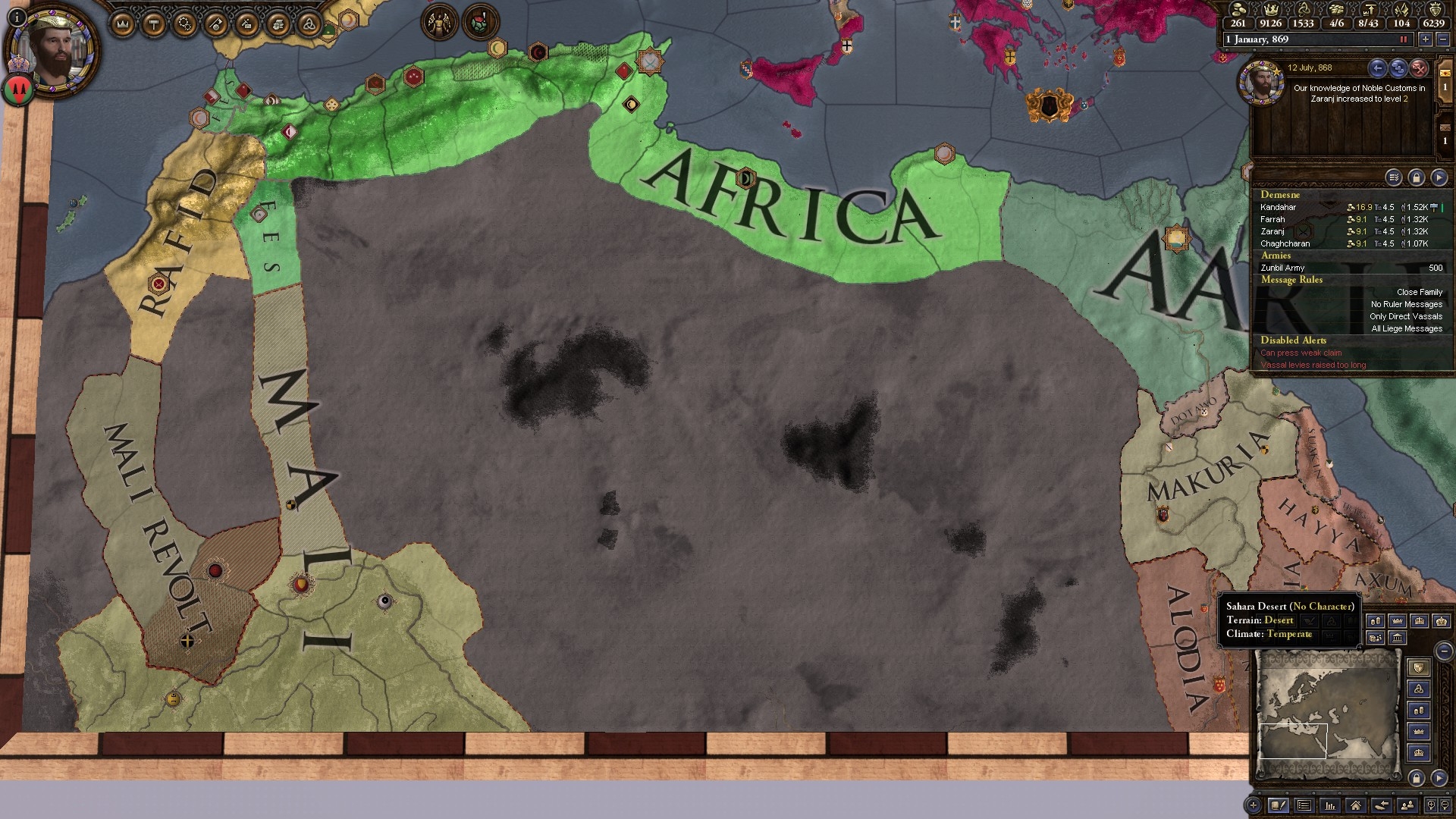 While in North Africa, two sultanates are locked in a fight for control of the long coast, as Mali fights itself. 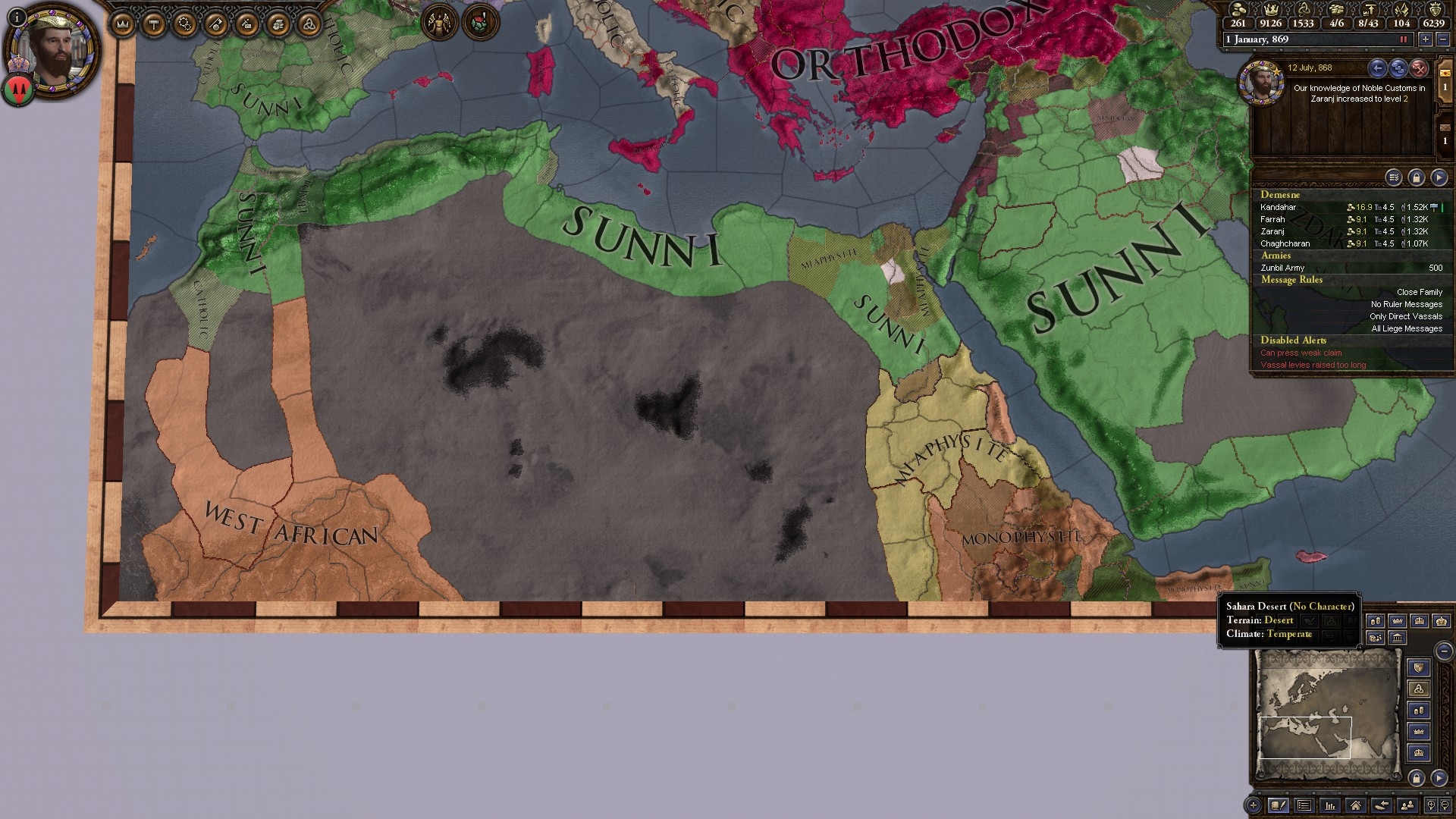 Islam reamins strong on the coast, political in-fighting notwithstanding. Mali follow their own gods, and Eastern Christians are split on the nature of god. 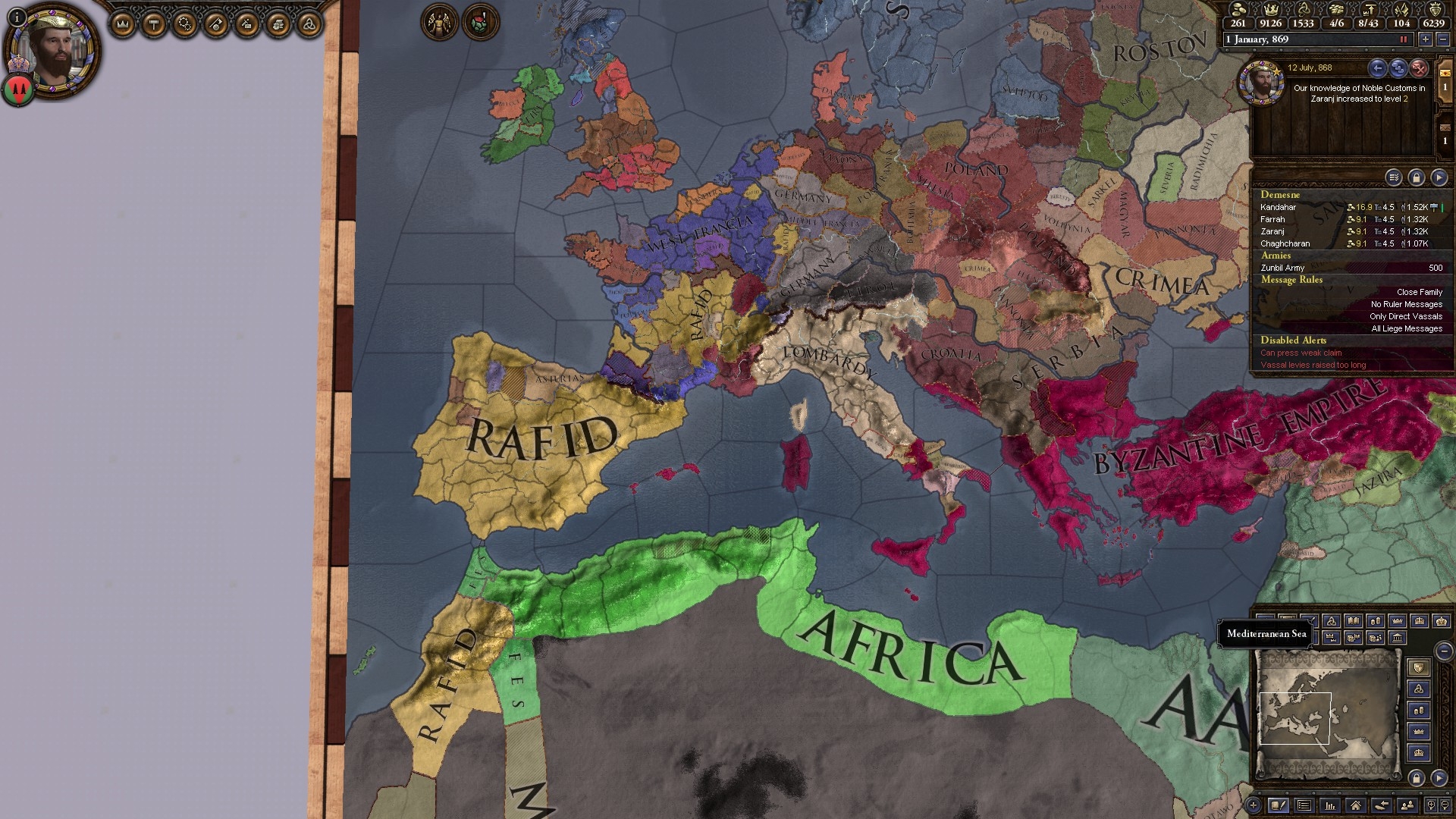 The Western Caliphate has made significant advances into Frankish territory, as the Karling children fight among themselves. The Lombards hold Italy against the heathens, and elect their kings. 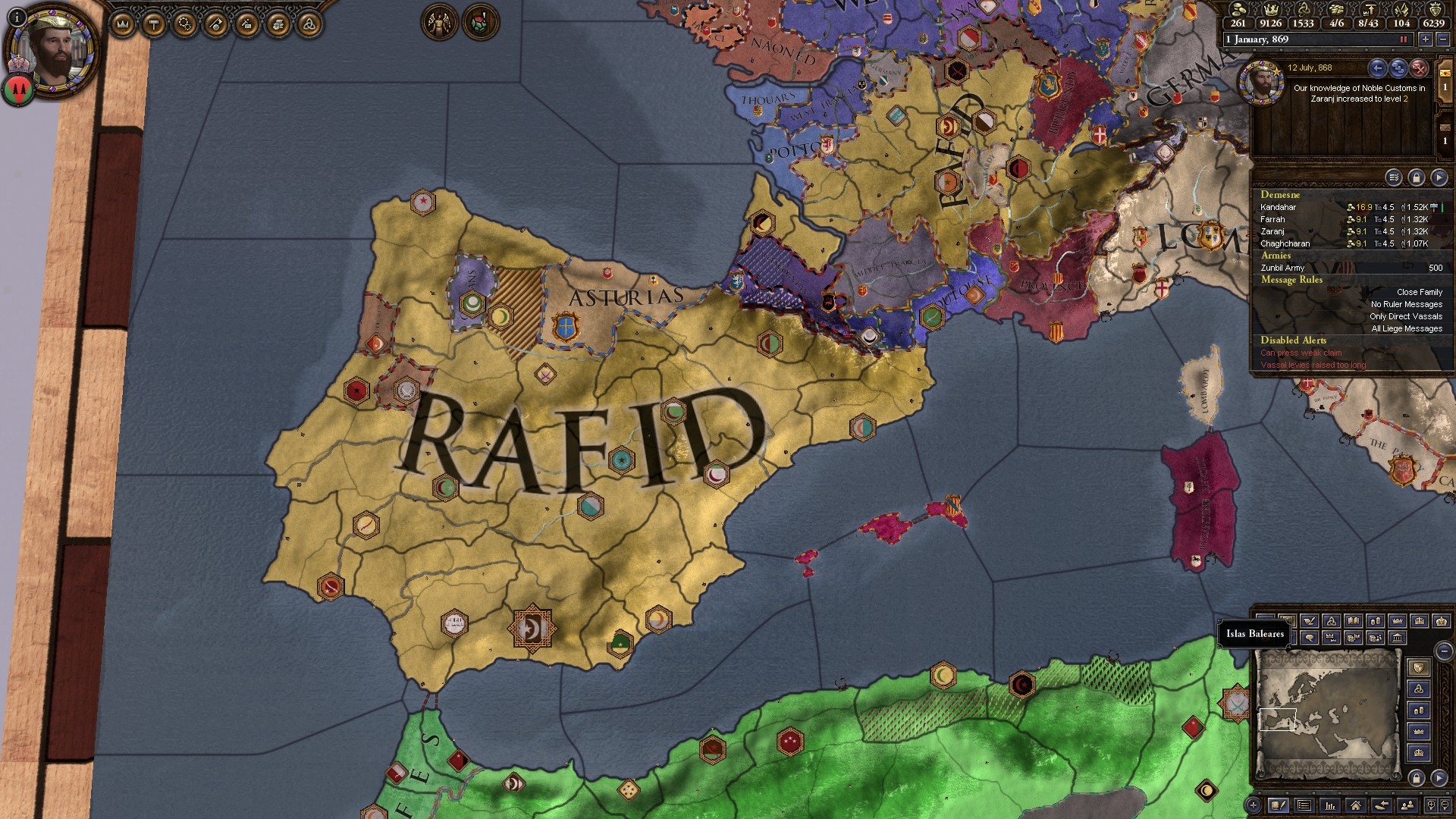 The Iberian Pennisula is in firm hands of the second western Caliphate, as Raf overthrew the decadent Ummayads twenty years ago. Minor Catholic rulers try to hold back the tide. 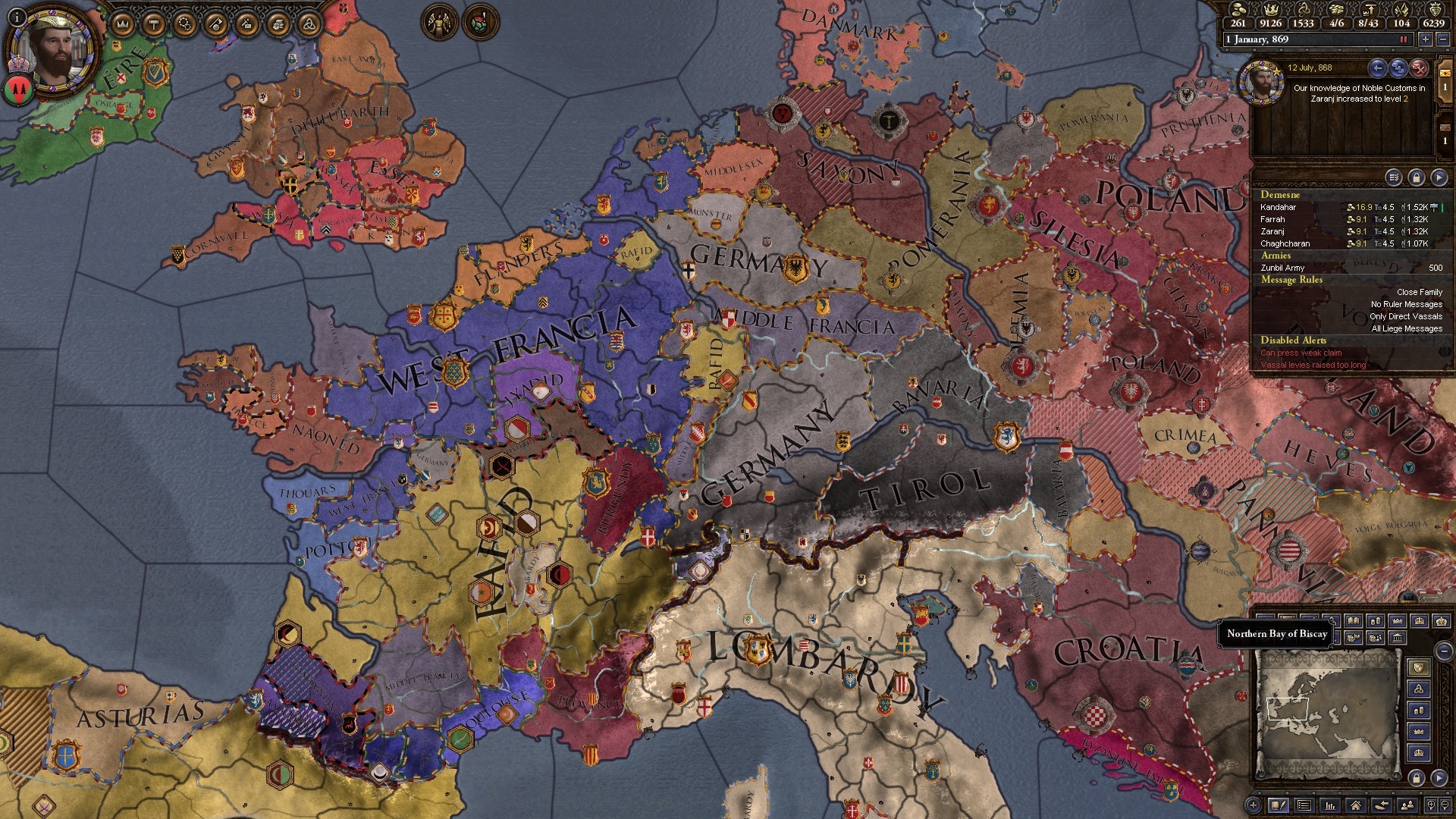 There is no great France, and no great Germany. Central and Western Europe is united only by its fight against the Sunnis. 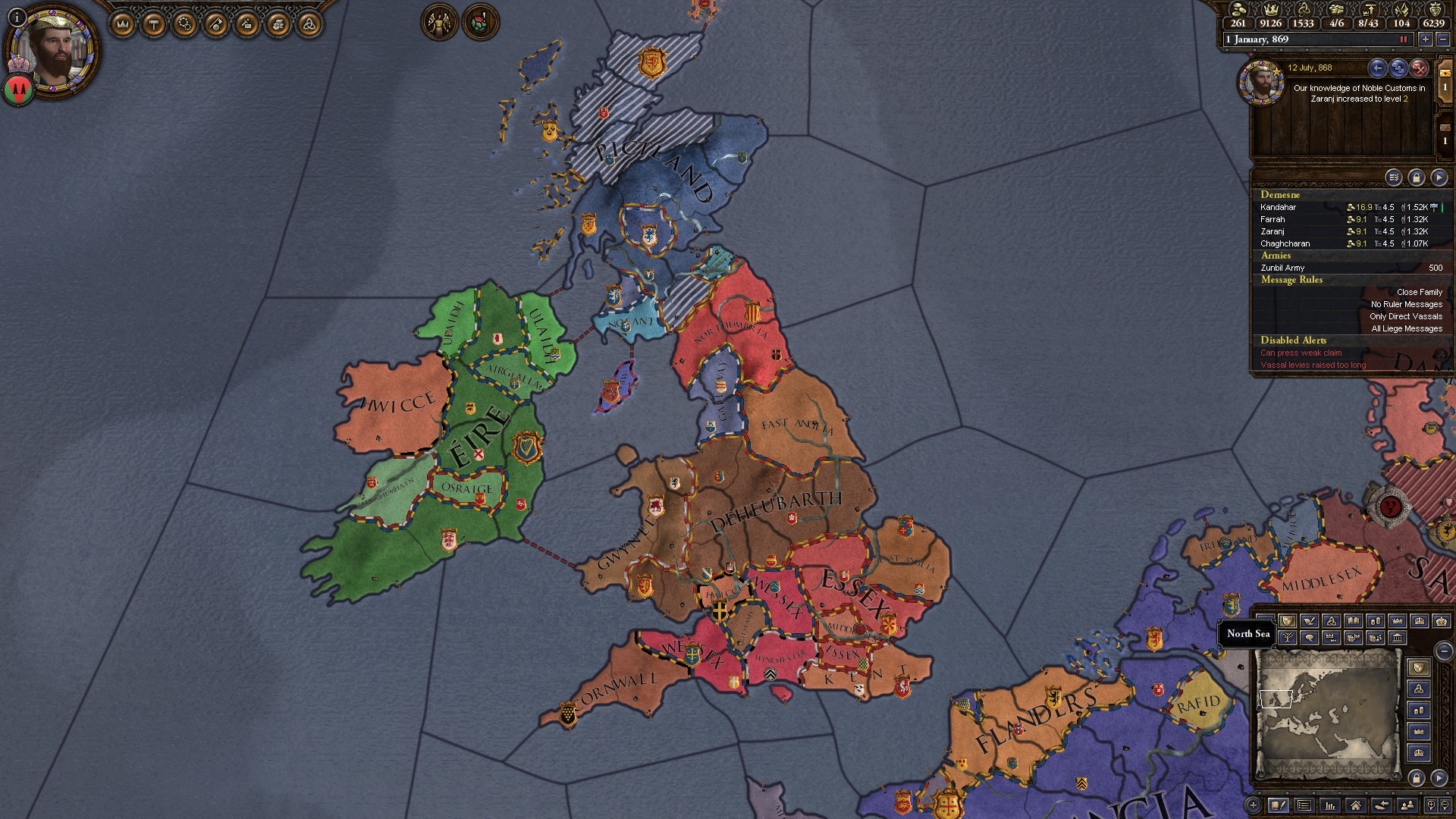 England remains, as it always was, an island of petty kings fighting their petty wars. The Picts have kept their mountains, and the people of the Eire are slowly conquered by the king in Dublin. 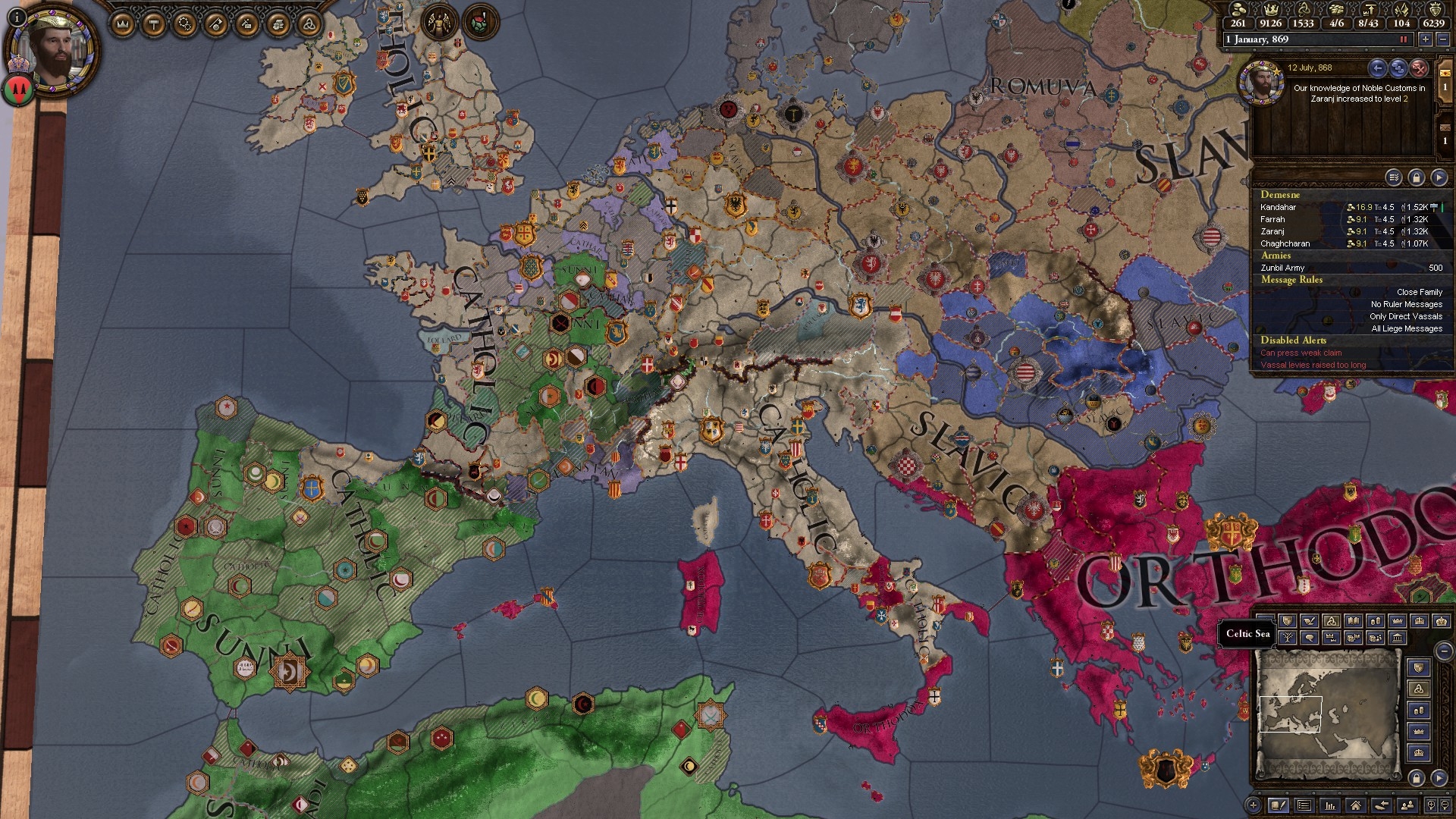 The Christians of the west have split into many branches, as the Muslims make their way north. 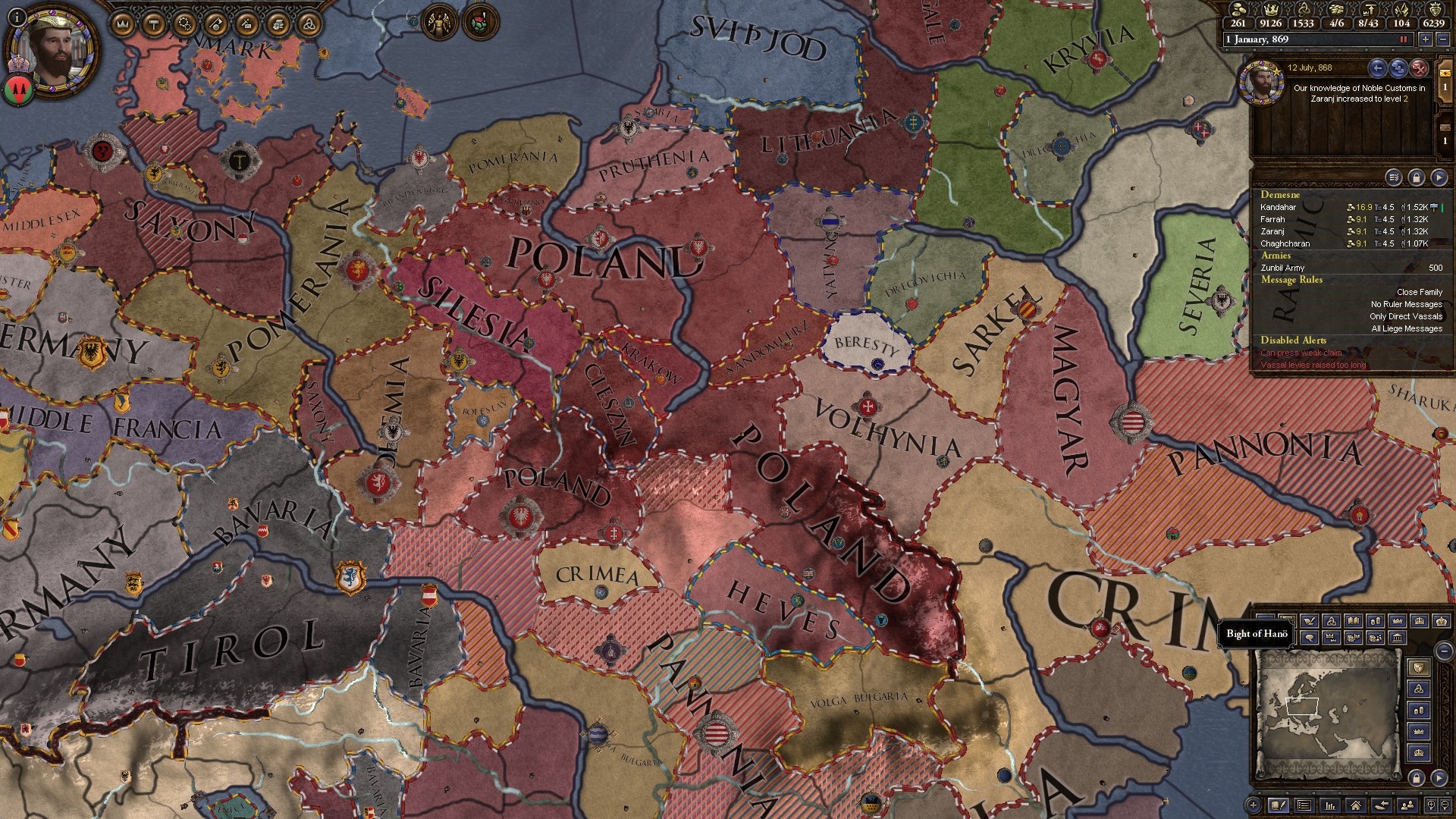 East of them, the Slavs make their kingdoms, with Poland and Pomerania being the strongest.  In the Balkans, the Slavic Kingdoms of Serbia and Croatia have broken free of the Greeks, and stand against the Catholics to the west and the Tengri nomads to the east.  The Eastern Forests are dominated by the Rostov tribe, and by the Khanate of Volga Bulgaria.  To the North, the Norsemen are united in kingdoms of Svitjod and Danmark, as the Baltic people struggle to fight against the mighty Vikings. 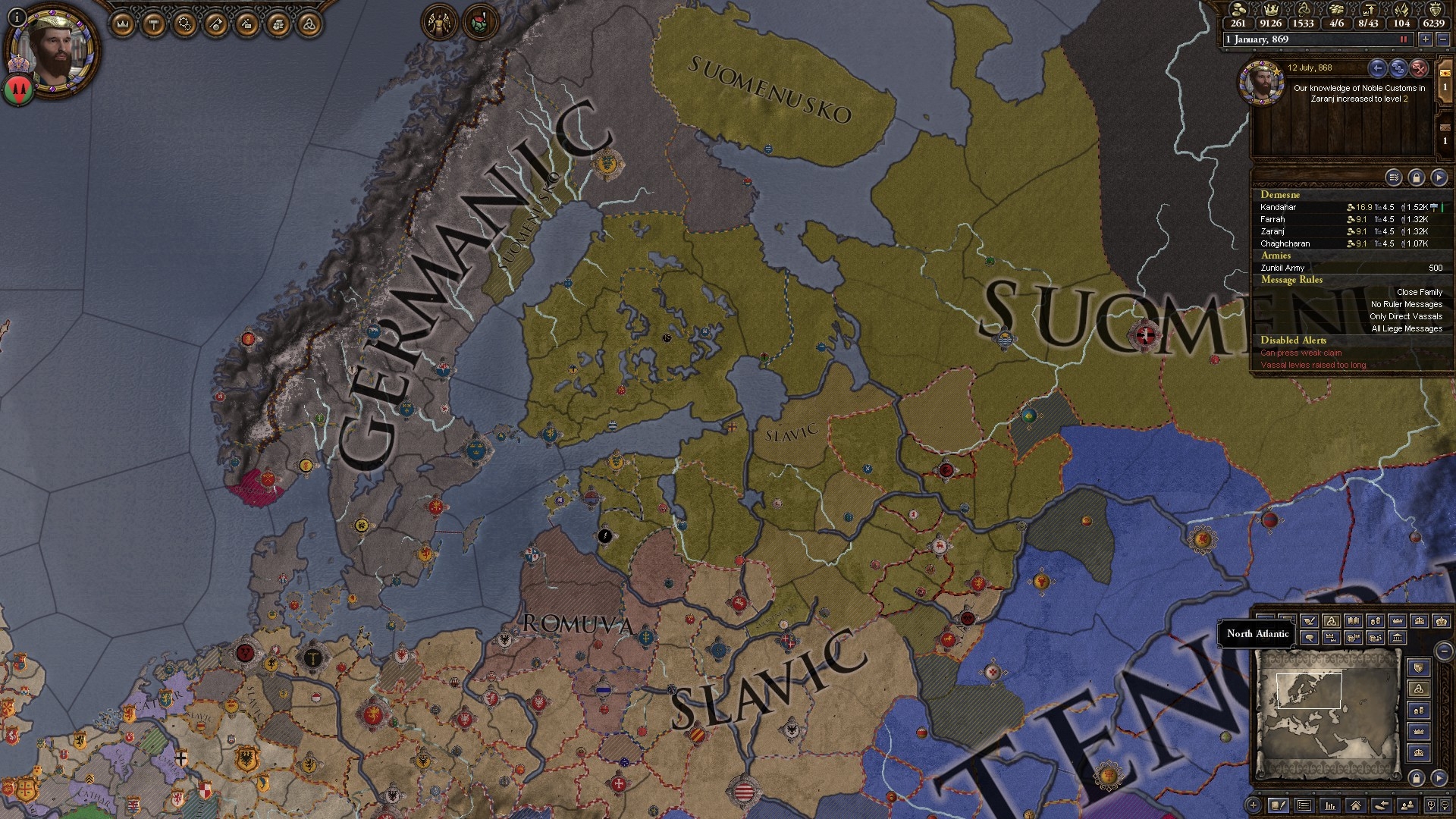 The Suomi and the Norse spread their faith, pushing the Slavs further south. 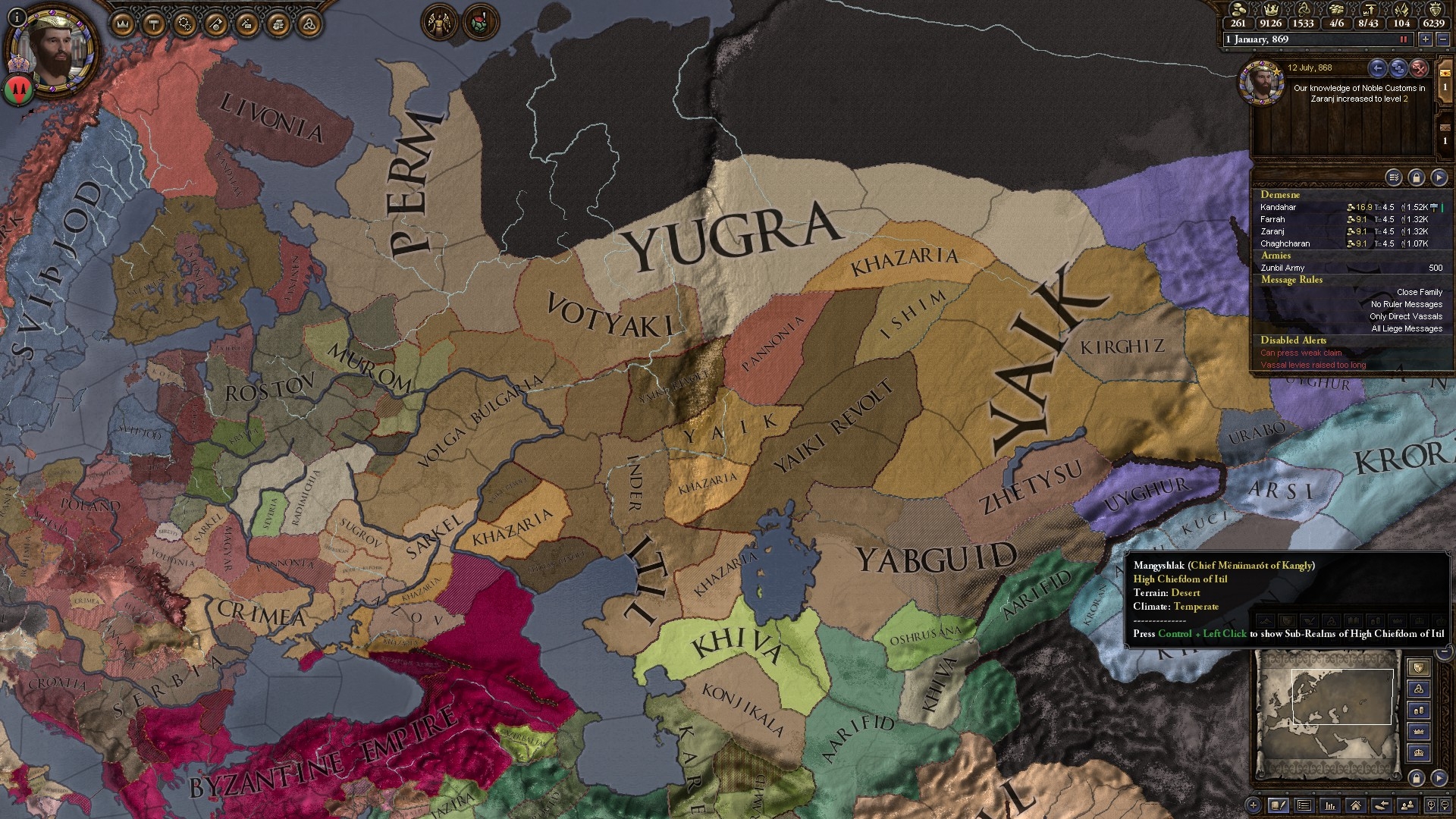 In the Steppes, the tribesmen and Nomads raid each other, neither one getting an advantage. 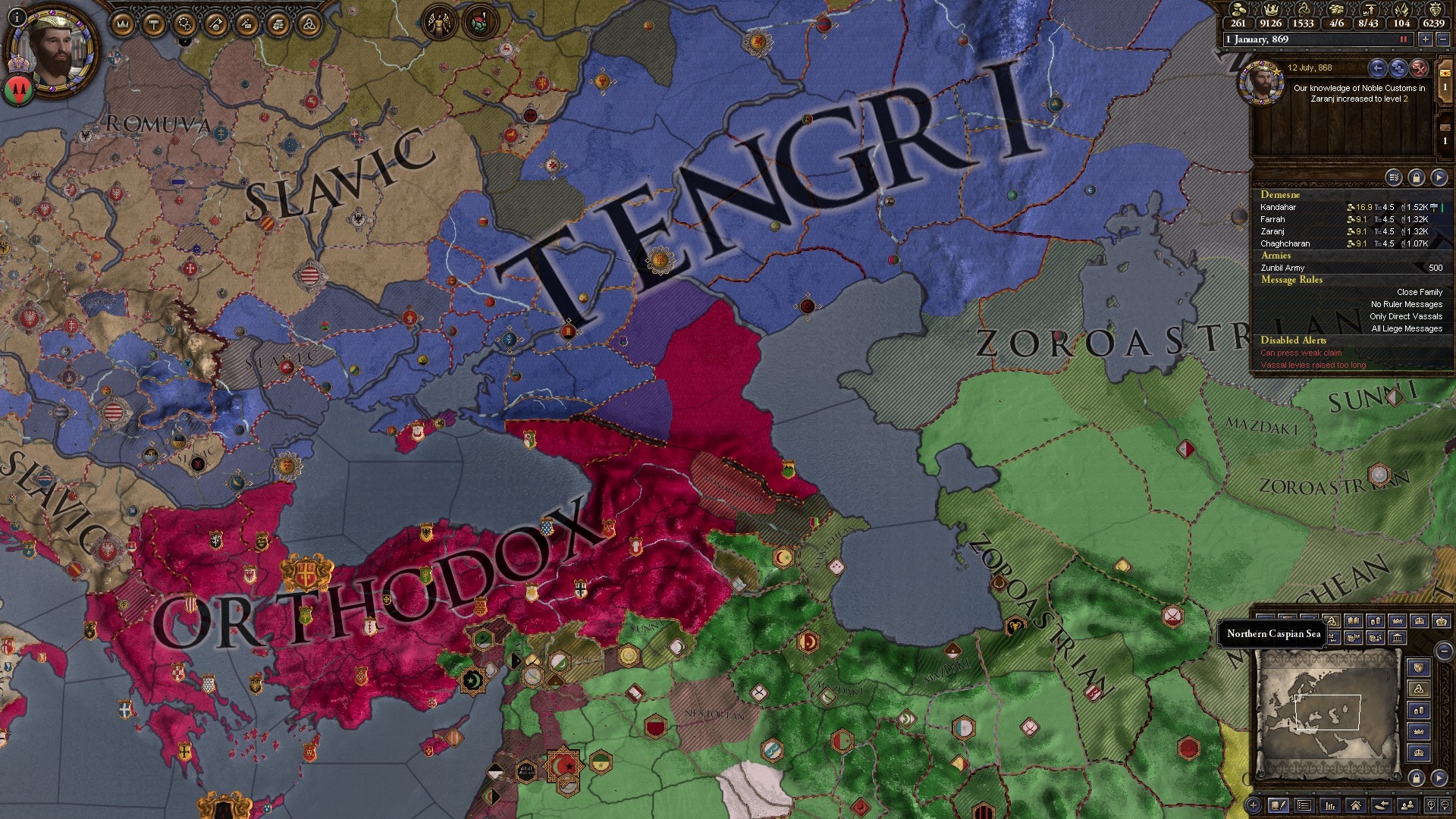 The Tengri rule the plains, and the Eastern Christians rule the mountains, as always.  In the far East, the people of the Steppes got tired of riding their horses, and have settled down.  The Manichean faith, adopted by the Uygurs when they travelled, has remained strong, as has the worship of Tengri, the sky god. ... The Caravan stands still, in awe at Darwesh's departure. In the distance, over the dunes, a tall figure walks towards them. Another elder with another tale. Another homeland. Where does this one come from? Options:  A. Lambakanna. To the far East, the ancient isle of Ceylon stands alone. Southern India is ruled by two Hindu Kingdoms, warring for the right to form an Empire, eyeing the tiny Buddhist kingdom. +The good: ++Fairly Isolated, easy to defend ++Starts as Buddhist, with massive Learning bonuses -The bad: --Small Army wtih angry neighbours --Limited war options, as with all Indian cultures 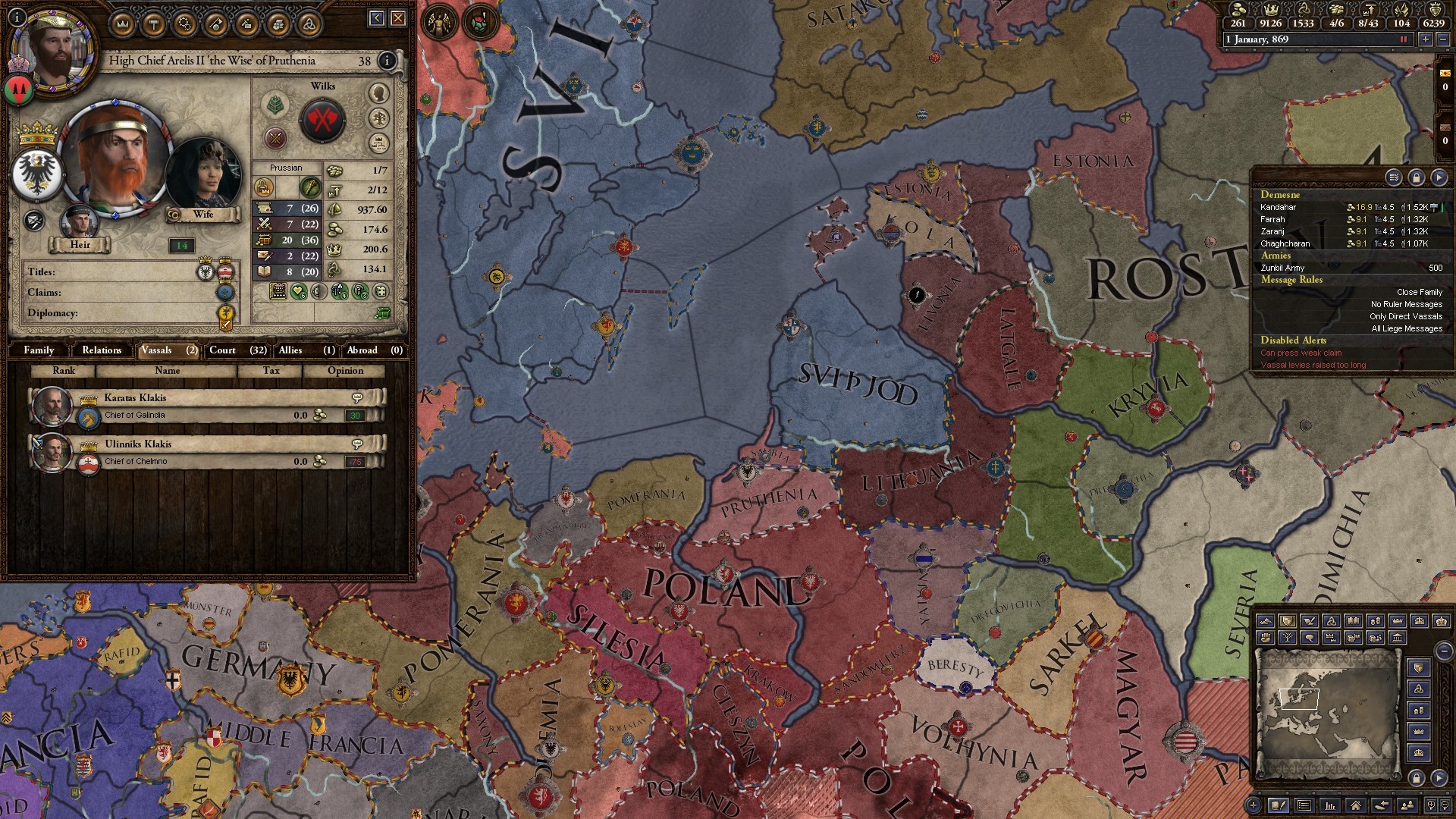 B. Pruthenia. To the North, a small Romuva tribe stands proud, surrounded by heathens, both Norse and Slav. +The good: ++Holy sites relatively close, not too hard to reform the religion ++After reforming or surrendering to Catholic preachers, can turn into a trading republic in an area with very little competition -The bad: --Pissed off Slavs on two sides, pissed off Swedes on the third, and a pissed off sea on the fourth 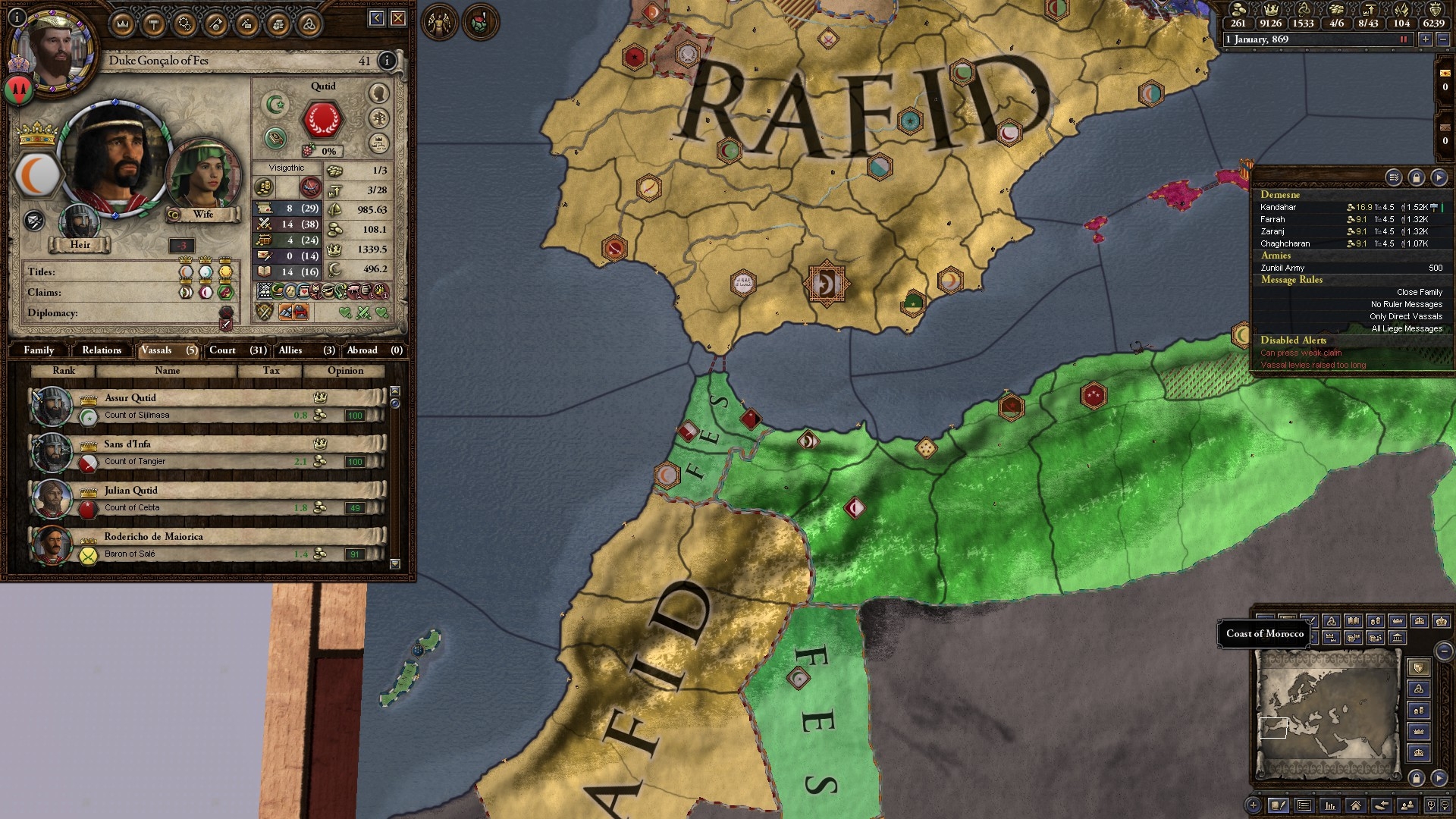 C. Fes. To the west, a Berber sea port calls for sailors from all nations +The good: ++Rafids to the north (and south) have high decadence, and are likely to go to poo poo in a civil war in the next decade or so ++Might console them to be Shia, start our own Caliphate ++Can spread the light of Islam further south to Mali ++Have awesome mythology I'm going to ramble about -The bad: --The African sultanate to the east is lean and angry. Can get gobbled up 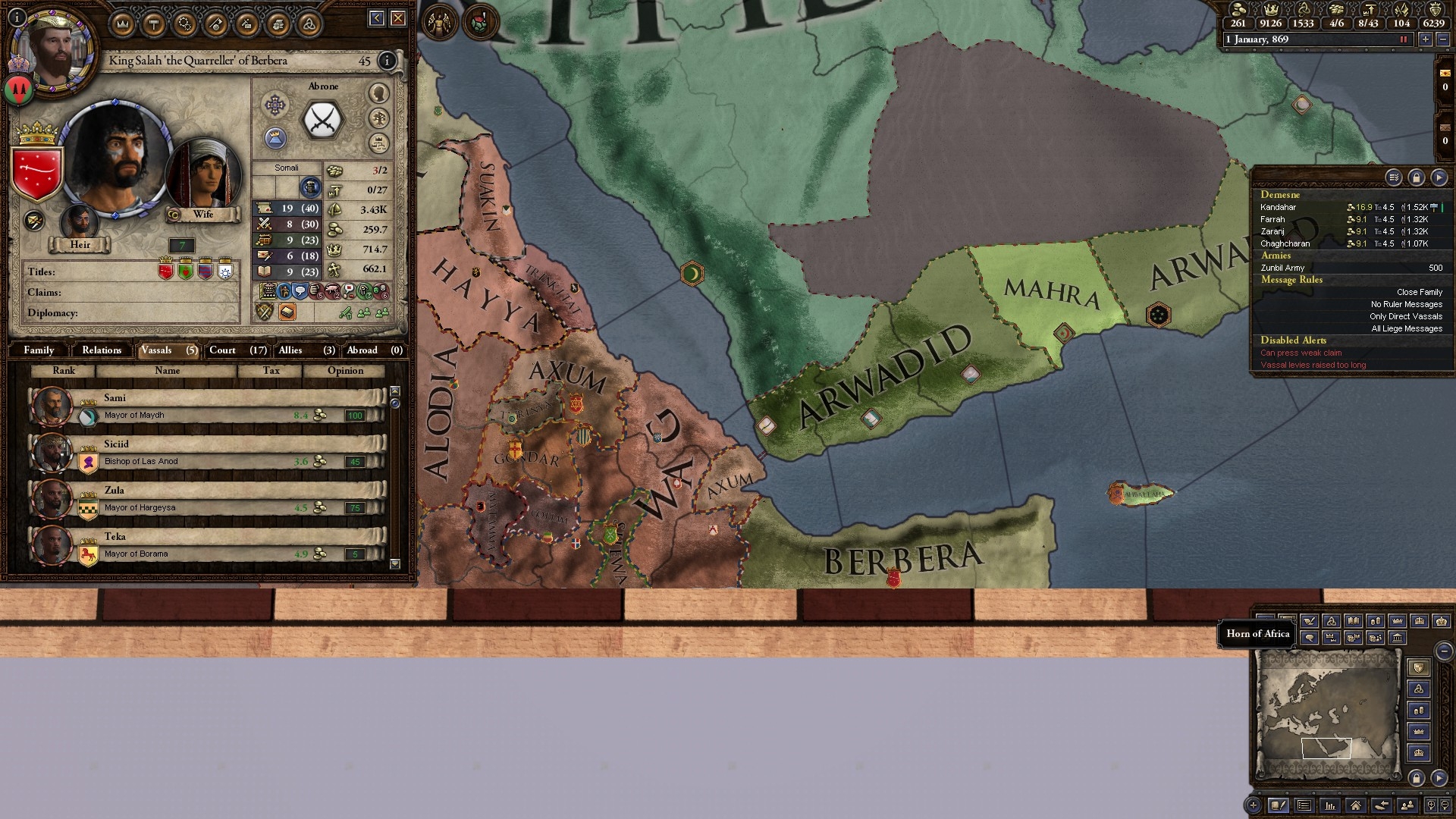 D. Berbera. On the Horn of Africa, the African Christians stand fractured, fighting among themselves. A great conqueror, a Duke, rises among them. +The good: ++Relatively isolated from Muslims at first, plenty of room to expand ++Can eventually take Egypt and restore the Coptic Pope to his rightful seat -The bad --Really low religious authority --Would eventually need to fight the Caliphate for Egypt 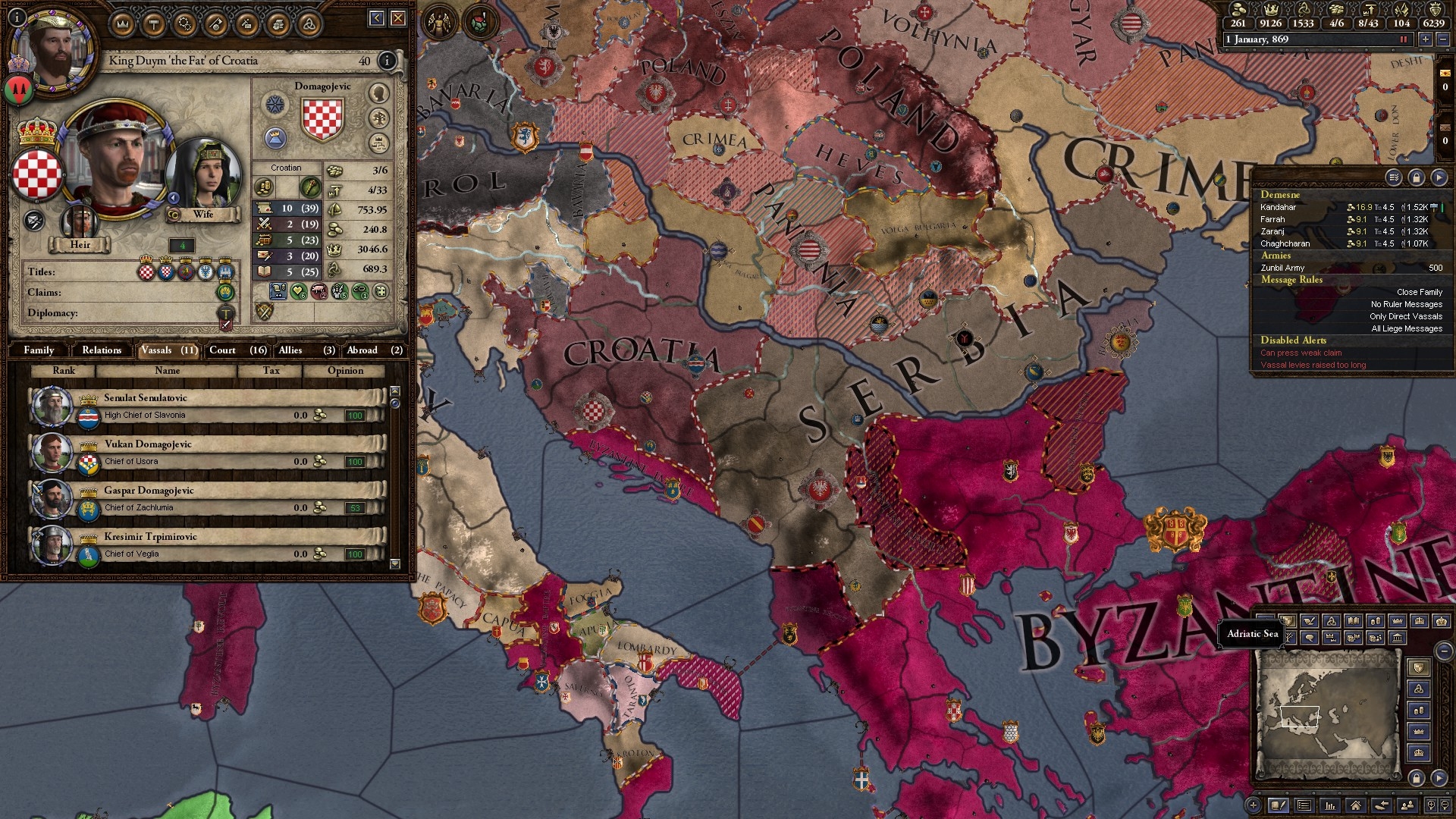 E. Croatia. The Balkans, eternal bastion of stability, broke free from the Greek yoke. The twin Slav kingdoms of Croatia and Serbia hold back the line against the Steppe pagans. +The good: ++The Byzantines have no interest in the Blakans right now, plenty of room for expansion ++Start off Feudal, with proper levies and taxes ++Plenty of nearby heathens to fight -The bad: --Very little chance to reform the Slavic faith, since none of the holy sites are anywhere near us --There are a lot of Catholics to the north and west, and they can holy war the poo poo out of us 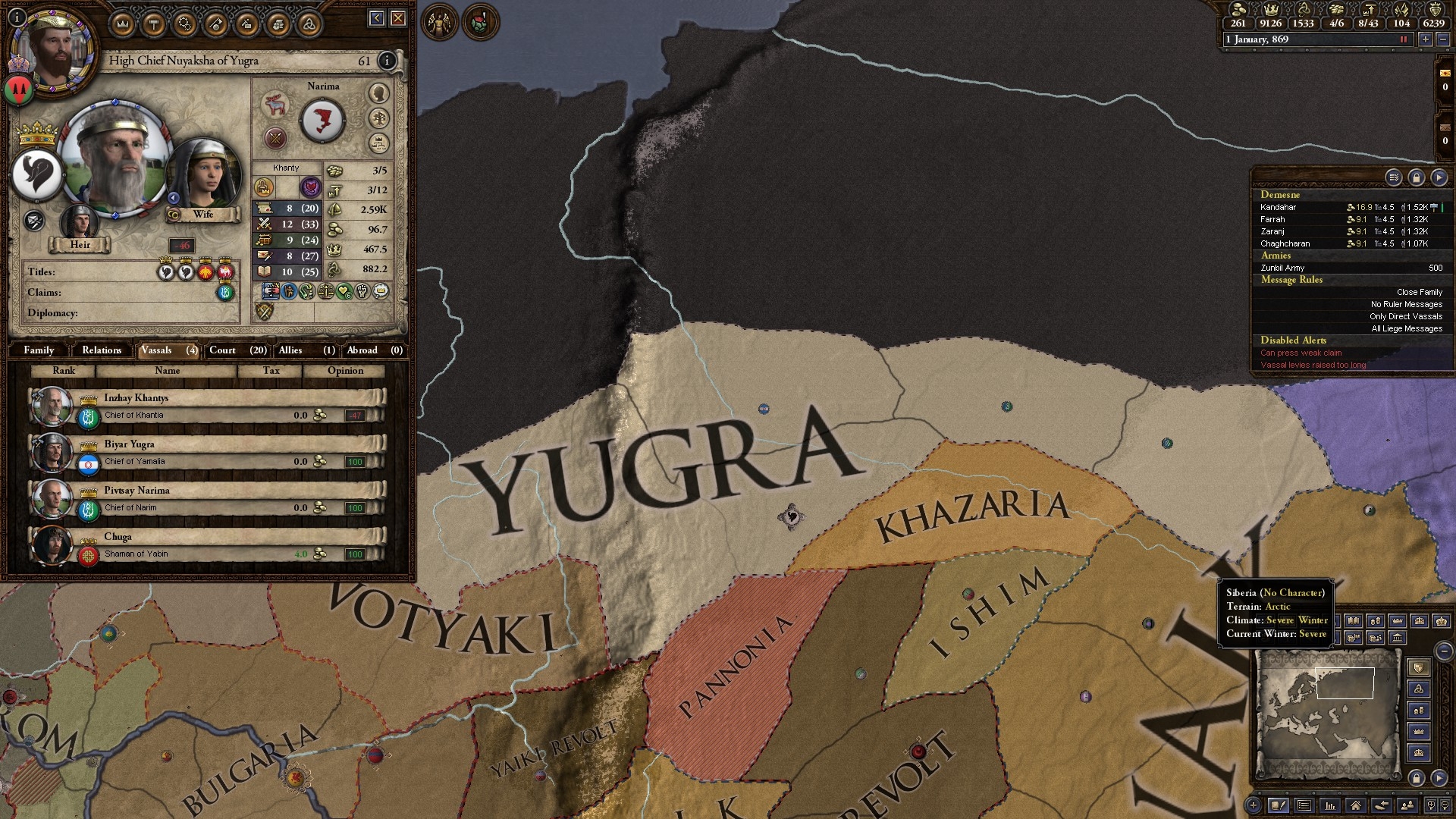 F. Yugra. In the Frozen North, the children of Ukko, the sky god, hold against the Steppe hordes. A strong tribe will unite them. +The good: ++The Suomi usually get left out of these types of LP. Let's spread the Finns throughout Eastern Europe! ++Relatively strong against neighbours ++Most holy sites conquerable, can reform -The bad: --Our provinces are dogshit, and our neighbours' provinces are dogshit --Going to war in winter sucks, and winter lasts 9 months out of the year here. 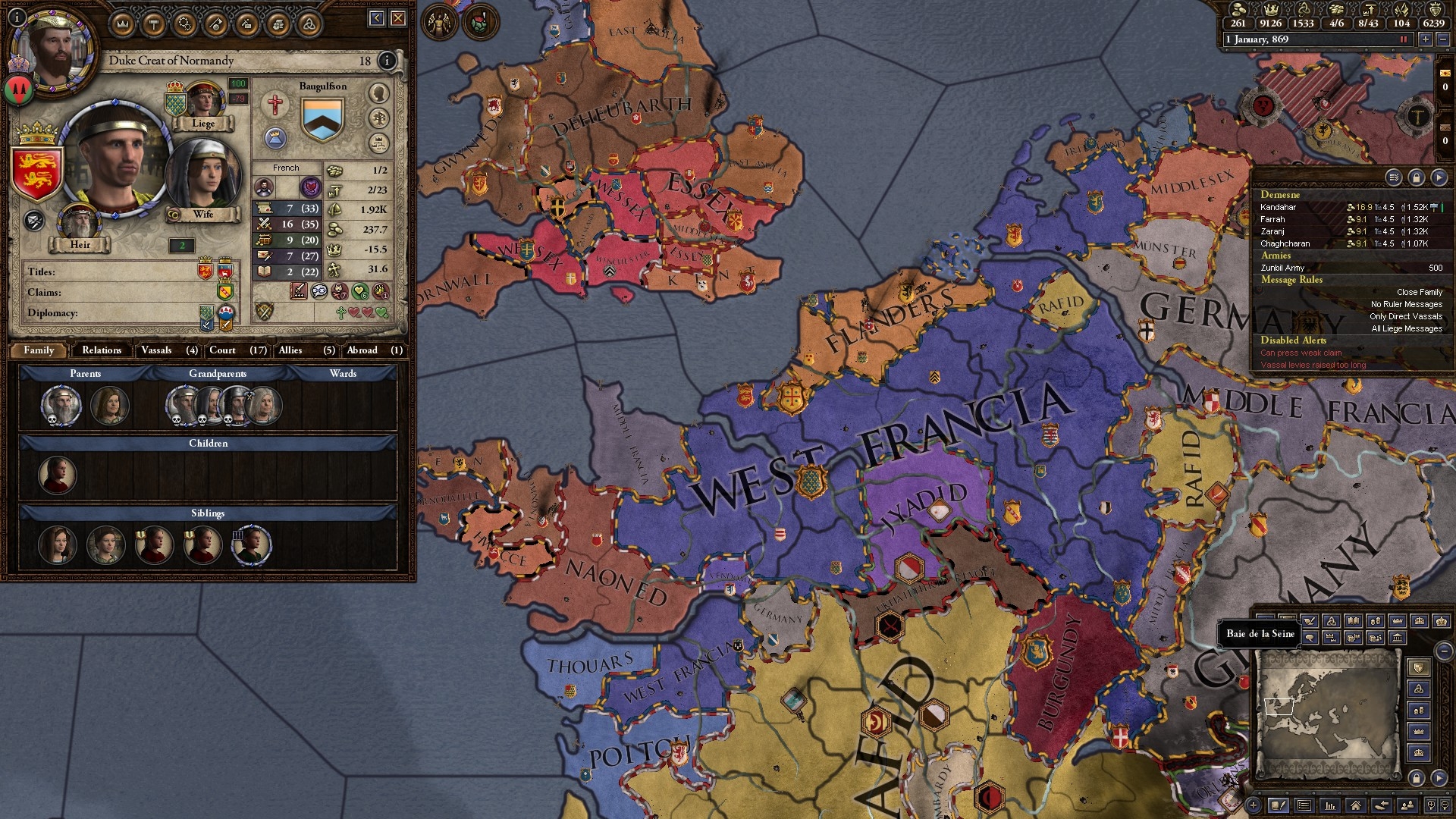 G. Normandy. The Karling king of West Francia, like his father and grandfather, has accepted the truth of the Bon Hommes. The Duke of Normandy follows his liege. +The good: ++Cathars are pretty cool. Let's piss off every Pope, and have full agnatic inheritance. ++Destroy the filthy Karlings from the inside! ++In case poo poo hits the fan, we're still protected by a big Karling, as weird a rump state as France is here. -The bad: --We're surrounded by Catholics and Sunnis (and a Lollard!). We're going to fight a lot of holy wars --Being vassals, we're still the Karling's bitch, and will get dragged into his dumb wars --Our religious authority here is almost the lowest of all options, just slightly above the Romuva. Conversion's gonna be a pain. H. A different land. The figure has travelled far to join the caravan. It wishes to share tales of its homeland. Update: The vote is over, and we'll be taking over as the Cathar Duke of Normandy. Kayten fucked around with this message at 06:13 on Aug 5, 2015 |
|
|
|
Yugra. We've seen what men raised by the sun can do, now it's time to see the men the roof of the world creates.
|
|
|
|
My vote is for C, Fes. It's the awesome mythology that sealed the deal for me. While Lambakanna is tempting, my recent run of eventually becoming the Samrat Chakravartin has demonstrated to me the futility of trying to get much done in India; it can be done, but you end up with brief periods of excitement interspersed with years and years of slog. Pruthenia or Berbera would be okay too, though, so if either of those win I won't cry about it. E: truth be told I won't cry about any of them if they're as entertainingly written as the LP has been so far!
|
|
|
|
ShootaBoy posted:Yugra. Pretty much this but you should console them to be nomads if they're a tribe. We've gotten Zun on the forums now, let's get horses, because horses are cool and make it hilariously easy to bulldoze everyone around you.
|
|
|
|
Normandy. Looks like this is one of those Charlemagne starts where the Umayyads hit Catholicism hard enough that it started to crack. Another good push could break it forever. Also gender equality. Sindai fucked around with this message at 08:49 on Aug 4, 2015 |
|
|
|
D. Berbera Coptics don't get nearly enough love.
|
|
|
|
C. Fes sounds pretty rad to me.
|
|
|
|
Great job so far! Really enjoyed the Afghans and the Zunbils. Looking forward to the next part. G sounds like the best option. If the Karlings can't bring about a strong and powerful Francia, the Cathars will.
|
|
|
|
G. Normandy. A Cathar play-through sounds really cool.
|
|
|
|
ShootaBoy posted:Yugra. I agree with this horsefaced man.
|
|
|
|
NewMars posted:D. Berbera This
|
|
|
|
I've never actually seen a Cathar playthrough, so G. Normandy.
|
|
|
|
G. Normandy. That map of Western Europe is fugly, let;'s fix that.
|
|
|
|

|
| # ? Apr 25, 2024 19:54 |
|
Rodyle posted:Pretty much this but you should console them to be nomads if they're a tribe. We've gotten Zun on the forums now, let's get horses, because horses are cool and make it hilariously easy to bulldoze everyone around you. I'm gonna put off horses for a few centuries, still getting a hang of the nomads.
|
|
|









